|
| Statement by Minister of Foreign Affairs of the Republic of Serbia Nikola Selaković at the meeting of the UN Security Council on the report on the work of UNMIK |
|
18. Oct 2022.
Mr. President,
Madam Special Representative,
Ladies and gentleman,
It gives me honor to address this distinguished body once again and to discuss the latest report of the Secretary-General on the work of the UNMIK.
I would like to thank the Secretary-General and the Special Representative for submitting the report. We take note of the efforts that Ms. Ziadeh makes in performing this very responsible duty, especially bearing in mind the necessity of a comprehensive overview and the complexity of the situation on the ground.
I also take this opportunity to underline that the Republic of Serbia highly values the activities of UNMIK in Kosovo and Metohija, established under UN Security Council Resolution 1244. We advocate for its continued operation in an unchanged and undiminished scope and capacity, especially bearing in mind that the Mission has not yet achieved the main goal of its mandate - a peaceful and normal life for all citizens of our southern province.
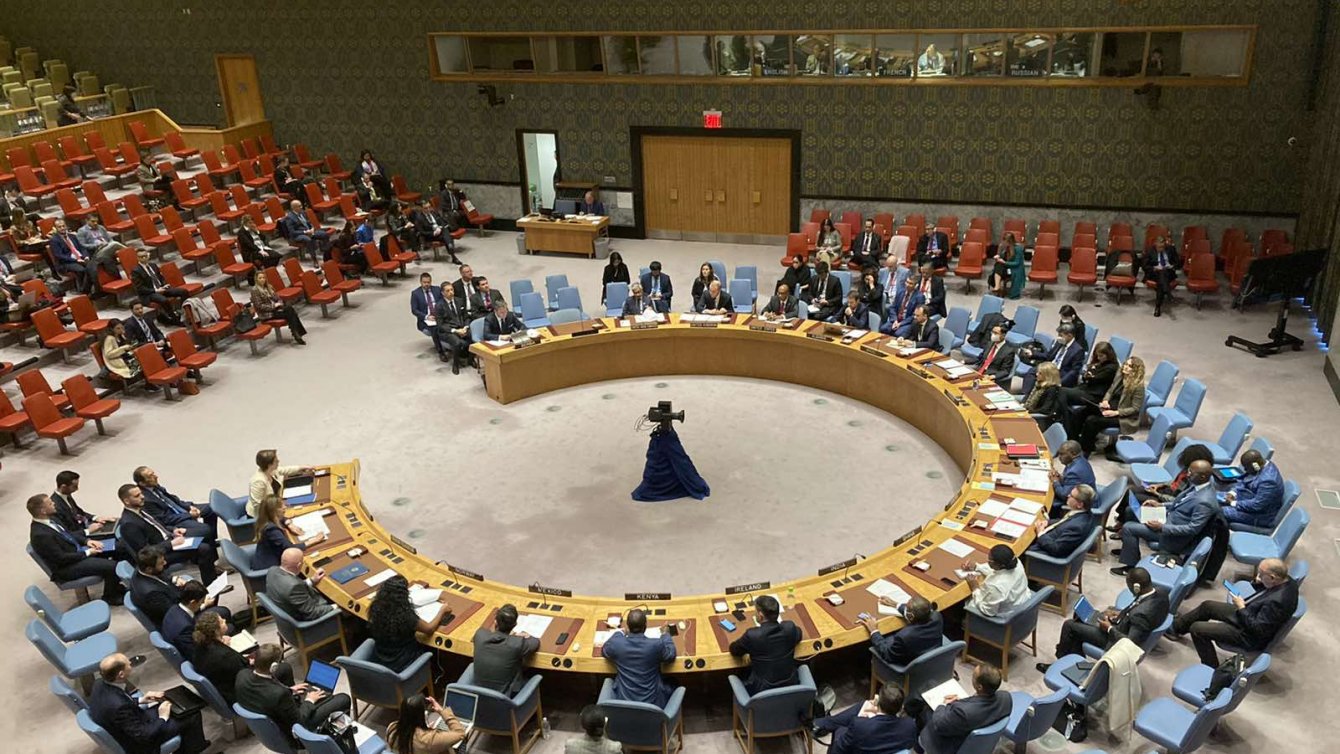
Ladies and gentlemen,
Unfortunately, the last few months have not brought more stability in Kosovo and Metohija and the situation in the Province is not exactly as presented in the report. Unilateral moves of Pristina continue to consciously and systematically deepen ethnic differences, causing discrimination against the non-Albanian population. To our knowledge, 105 ethnically motivated attacks have been recorded since the beginning of this year. In addition, Pristina is actively working on administrative and bureaucratic obstacles, by taking measures that were not agreed upon in the dialogue as the basic mechanism for negotiations and reaching solutions between Belgrade and Pristina. Pristina’s approach is problematic in many ways. This irresponsible conduct of Pristina is consciously sabotaging the efforts not only of Belgrade, but also of the EU and other involved parties of the international community, with the clear intention of achieving two goals - the first being to avoid the implementation of assumed commitments. The second, the ultimate and far more alarming goal is the intimidation, marginalization and persecution of Serbs.
In all previous statements before this this distinguished body, Pristina focused on what happened in the past while failing to mention, which is painful to witness, how non-Albanians in Kosovo and Metohija live today. Serbs are still intimidated in different ways, forced to leave their homes, villages and cities. Those displaced are discouraged from returning to where they were born and lived their lives.
The provisional institutions work systematically to remove and erase as much as possible of the cultural and national diversity that is left. At the same time, Pristina is consciously fueling inter-ethnic tensions using all available methods.
Attending religious celebrations seems to be a crime in Kosovo and Methohija. It is the case of Nikola Nedeljković who was arrested for allegedly "inciting ethnic hatred and intolerance", but actually his imprisonment was for attending the St. Vitus Day (Vidovdan) celebration.
Nikola was sentenced to eight months in prison without any material evidence. On the other hand, let me remind you that even to this day there is not a single perpetrator held legally accountable for the more than 1,000 Serbs killed since 1999. Due to planned intimidation, almost all towns and villages in Kosovo and Metohija are ethnically cleansed. Representatives of Pristina are ignoring the suffering, insulting the open wounds of the Serbs who had to leave their ancestral homes, and I underline, there are more than 200,000 of them. Such conduct has not change for last 23 years and is in complete opposite to the democratic values and principles that the provisional institutions of self-government often promote in their statements.
Therefore, I consider it necessary to emphasize that the true political will of the involved international actors and Pristina is necessary in order to create the conditions for the beginning of the end of discrimination on a national basis and common life in the Province.
Esteemed members of the Security Council, I would like to draw your attention to the rigid, problematic and extremely irresponsible conduct of the other negotiating party within the dialogue. In achieving the above-mentioned goals, Pristina applies the so-called policy of reciprocity, a well-thought-out, malicious strategy that, unfortunately, was not constructed independently. By continuously insisting on mutual recognition as a central part of the dialogue, the so-called policy of reciprocity demonstrates the essential unwillingness of the current political leadership of Pristina to find any compromise solution. Let me remind you that the talks between Belgrade and Pristina did not start with last elections in Pristina, but have been in progress for 11 years since the technical dialogue started (8 March 2011). Therefore, we assess as inadmissible attempts to disregard the current format of the dialogue, and annul the agreements only because they are not to the liking of the current political factors. It is unacceptable that the current geopolitical circumstances are being used to simply erase what has been painstakingly worked on for years. Belgrade, I underline, was institutionally involved in the dialogue from the very beginning, while the commitment of the other side has varied and continues to vary depending on the political option that is in power.
The harsher political rhetoric and narrative of the current leadership of the provisional institutions of self-government in Pristina are accompanied by concrete destabilizing steps. In the reporting period, measures on license plates were imposed, disguised as attempts at alleged integration into society.
Let me remind you again, there was no agreement on such measures in the dialogue between Belgrade and Pristina. I believe, ladies and gentlemen, that even today we will hear from the representative of Pristina that their side has fulfilled all obligations, but the decision on re-registration of license plates shows that Pristina is not only failing to fulfill what has been agreed upon, but it nullifies the results of the dialogue, creating a new crisis all over again. The effect of such forcibly imposed measures is best illustrated by the fact that since the decision was made a single-digit number of re-registered vehicles with Serbian license plates has been recorded, of which only two are Serbs from the north of Kosovo and Metohija. This is another indicator that Pristina does not enjoy full support, but that, on the other hand, it continuously provokes the natural reaction of the Serbian population, which cannot endlessly be subject to the arbitrariness of temporary institutions.
I believe that even today we will hear already known narrative of representatives from Pristina who try to present every reaction of the Serbs in Kosovo and Metohija as an activity organized by Belgrade in alleged attempts at destabilization. Such claims are simply not true. Serbia, for its part, cannot in any way contain the revolt present among the non-Albanian population of Kosovo and Metohija. It is an undeniable fact that citizens' protests represent a voice against many years of institutional violence and the deprivation of rights of the non-Albanian population, which, in this case, is denied the right to peaceful enjoyment of private property acquired in a legal manner.
Pristina does not cease in its attempts to confiscate property, and, as is well-known, one of the targets is the Serbian Orthodox Church. By calling into question the return of property to the Dečani Monaster Pristina paradoxically does not execute the decisions of its own so-called Constitutional Court.
Ladies and gentlemen,
I thought for a long time how to best illustrate the true picture of everyday life of the non-Albanian population in Kosovo and Metohija. I will mention only some of the facts. Numerous ethnically motivated incidents, hate speech, intimidation, violations of the right to a fair trial, threats to the right to freedom of movement and religious rights, desecration of churches and graves were recorded in the last reporting period as well. The frequent attacks on the sites of the Serbian Orthodox Church are also unacceptable, and especially the humiliating attitude towards the Serbian cultural and spiritual heritage, including the 4 monuments that have been inscribed on the UNESCO World Heritage List. Numerous administrative and technical barriers are imposed on priests and monastic communities, making it difficult and even impossible for them to survive on church properties.
When it comes to civil rights, try to imagine that the basic political and civil right to vote has been taken away from you.
This is precisely what the Serbs in the Province have experienced along with frequent intimidation and violent incursions of the ROSU special forces, which are an instrument for the implementation of Pristina's goals under the pretext of allegedly fighting crime.
In December last year Bratislav Nikolić the president of municipality of Štrpce has been detained, as suspected of the organized crime and corruption - still not charged, kept in detention unit in Podujevo, only for the reason to make additional and final pressure on the Serbian community living in the enclave of Štrpce. How can this be justified as the fight against crime when special forces are used to raid village festivals, schools and kidnap drivers of ambulance transporting infusion containers and medicines? What are the motives behind and how can one rationalize these actions? Just try to imagine and put yourself in the shoes of Ms. Dragica Gašić, the only Serbian returnee in Djakovica. Imagine that you are still not allowed to buy bread because of your origin and nationality, because you live in a municipality that the local Albanians proudly consider forbidden to non-Albanians. Imagine that as many as eleven Albanian civil society organizations demand your expulsion, as well as a ban on any non-Albanian ever returning to that town. Then you will realize the level of intimidation that Serb returnees are facing. It will be clear to you why the percentage of returnees is below 2% and why it is still one of the lowest in the world. Let me pose a question - are these the characteristics of a society that presents itself to the world as a fully fledged democracy and a factor of stability in the region?
We are aware that the dialogue has a wider dimension and that it can affect the situation in the entire region.
This is reflected in every statement given by Serbian officials, including the President of the Republic of Serbia, Aleksandar Vučić. "It is better to negotiate for a hundred years than to fight for a day" are the words of our President that best describe the policy of peace, reconciliation, and regional cooperation pursued by the Serbian leadership, which is guided by the vision of building a common and prosperous future of the Balkans.
I believe that it is a duty of today's leaders to create a clear common vision for the future generations. Such a vision was shown by the leaders of Belgrade, Skoplje and Tirana by creating Open Balkan, an initiative from the region for the region, which is already producing concrete results. Serbia has on several occasions reached out to Pristina inviting it to join this initiative. We counted on an awareness of the importance of economic connectivity and progress for the benefit of the citizens of the entire Balkans. However, our invitation was not met with understating from the other side.
Ladies and gentlemen,
We categorically reject Pristina's argumentation regarding the alleged unconstitutionality of the formation of the Community of Serb Municipalities. It is clear that Pristina's attitude towards this obligation reflects its attitude towards the Serbian people in the Province. It also indicates that Pristina is against Serbian people being organized as an ethnic community and thus exercising their collective rights.
The aim of their approach, as a preferred model, is a community without Serbs, such as those in Pristina, Djakovica or Pec, or some similar localities in the Province. For our side, it is unacceptable that Pristina has refused to fulfil its obligations and discuss the formation of the Community of Serb Municipalities for as much as 3,470 days but I assure you that, regardless of this fact, Serbia will not give up on its efforts to find a compromise solution for the current situation.
I will remind you that the representatives of Pristina, although they often repeat in their statements that the case of the so-called Kosovo is a fait accompli, continue not to be recognized by the majority of UN member states for 14 years now. If the so-called Kosovo's independence is a reality, how come that we have the dialogue? And how come that Belgrade is faced with increasing pressures as regards the need for mutual recognition? What the current political leadership of Pristina refuses to accept is that Belgrade cannot be left out in the search for a final solution. The same also applies to the case of the increasingly frequent indications about Pristina's upcoming membership in international organizations. Will these moves help to create the necessary atmosphere for dialogue? Are we, in this way, rewarding Pristina's destructive behaviour and refusal of dialogue? Our view is that the attempts of the so-called Kosovo to join international organizations are an unacceptable act and Serbia will work decisively against such steps.
During the last session in April this year, we could hear the calls of some members of the UN Security Council to reduce and even terminate UNMIK, with the explanation that Pristina has its own functional institutions. However, the circumstances I have presented to you and the situation on the ground remind us again that international presence in our southern province is still necessary. In this regard, we support the efforts made by UNMIK, KFOR, EULEX and OMIK within their mandates. The Serbian and other non-Albanian population in Kosovo and Metohija has the highest confidence in the international presence and considers it a guarantor of security, which additionally confirms that international missions need to remain engaged in an undiminished scope and capacity in accordance with UN Security Council Resolution 1244.
In conclusion,
I would like to point out that lately in all international forums we keep hearing calls for respect of the principles of the UN. We support the territorial integrity of all UN member states. But, what about Serbia? I would like to ask the esteemed members of this distinguished body whether the need to implement the principles of the UN Charter applies only to some or all of its members? As a country that consistently respects international law and still suffers the consequences of it being violated, we believe that the UN Charter and international law, including the territorial integrity and sovereignty of states, should be respected by all and apply indiscriminately to all UN member states.
Ladies and gentleman,
It was this body that more than two decades ago adopted Resolution 1244, which confirmed the territorial integrity of Serbia. This fact did not prevent certain countries from recognizing the so-called “Kosovo” and thus violating the UN principles, but also the resolution that they adopted, by adjusting international law to their interests and goals. Precisely because of this, the more and more frequent mentioning of the case of "Kosovo" is an indication that the precedent made opened a Pandora's box, because the strength of each principle rests on its full and universal application and unconditional adherence.
You will notice that I posed a lot of questions in my statement and I express hope that today we will hear answers to at least some of them from you, esteemed members of the UN Security Council and representatives of Pristina, because the inhabitants of Kosovo and Metohija, of any nationality, whether they are Serbs or Albanians deserve it.
All the inhabitants of Kosovo and Metohija have every right to expect an improvement in the atmosphere and the reduction of tensions on the ethnic level, which are a prerequisite for a normal life. For such a step to be made, we need constructiveness, which is not lacking on the Serbian side, genuine support of international actors. I emphasize that Serbia has always been and remains deeply committed to finding a sustainable solution by peaceful means, for the sake of peace, stability and a common future.
Thank you. |
|
|
| Participation in ,,Africa Week” at UNESCO |
|
On the occasion of Africa Day, the Minister of Foreign Affairs of the Republic of Serbia Mr. Nikola Selaković sent a special message to all Ministers of Foreign Affairs of African countries, emphasizing Serbia's true commitment to further deepening comprehensive cooperation with countries of Africa.
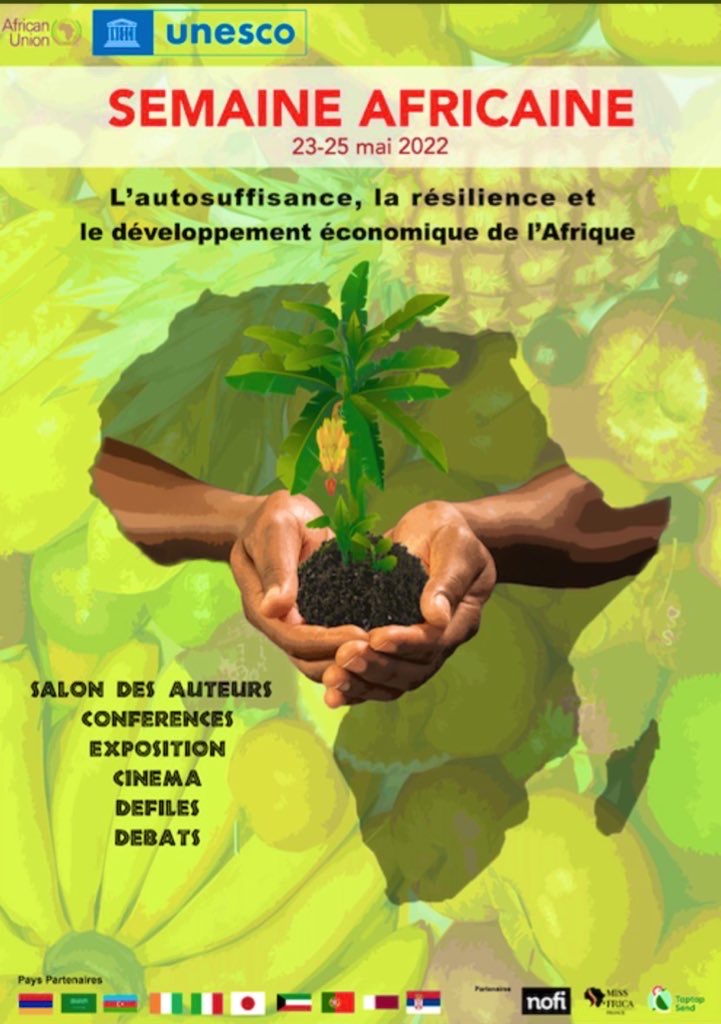
The Permanent Delegation of the Republic of Serbia to UNESCO actively participated once again in the celebration of ,,Africa Week” at UNESCO, held from 23rd to 25th of May 2022.
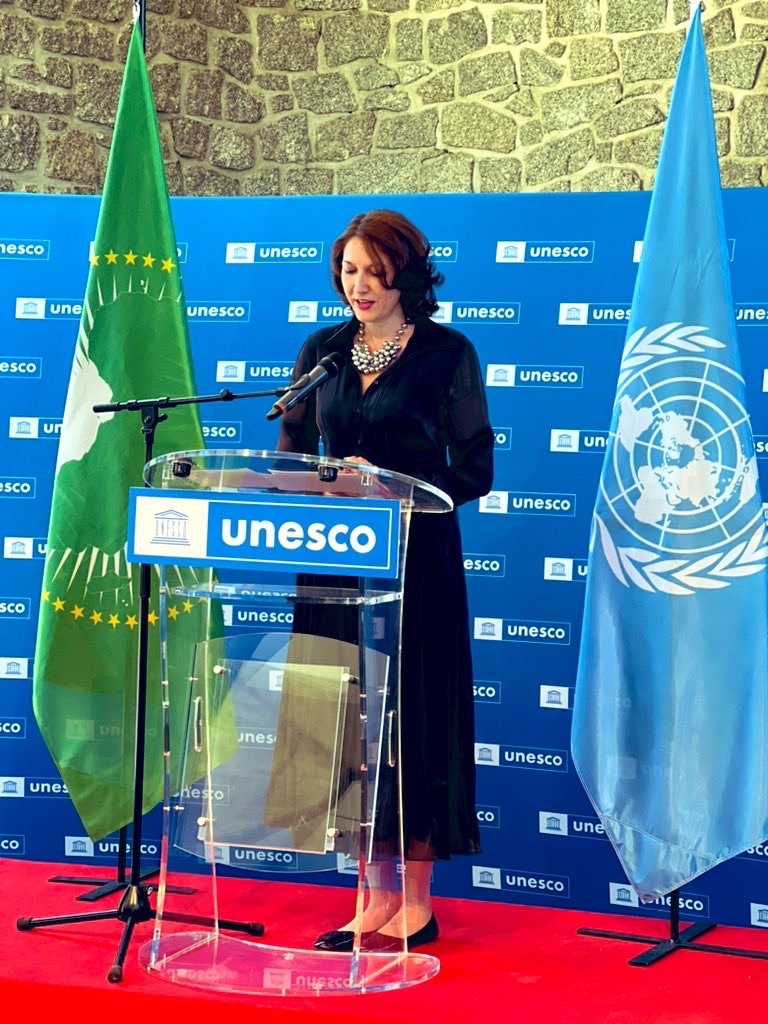
The Permanent Delegate of the Republic of Serbia to UNESCO, Ambassador Tamara Rastovac Siamashvili, participated in the celebration during an event called "Africa in the World". On that occasion, in her speech, she pointed out the importance we give to the longstanding friendship between Serbia and African countries, as well as the strong commitment for further strengthening partnership and cooperation in all areas, from economy to education, and from culture to science. She also outlined that the Day of Africa coincides with the Day of Friendship with the Peoples of Africa, which is celebrated in the Republic of Serbia on 25th of May each year. This day for us is a symbol of a sincere desire to build and foster relations between our country and Africa. She added that Serbia strongly supports the activities that UNESCO is carrying out in African countries, especially those in the context of UNESCO’s Global Priority Africa. She also emphasized the importance of investing in education and youth, and mentioned the scholarship program that Serbia has been providing for many years to students from African countries who want to continue their studies in Serbian universities.
|
|
|
| Participation of the Republic of Serbia in the plenary debate of the 214th session of the UNESCO Executive Council |
|
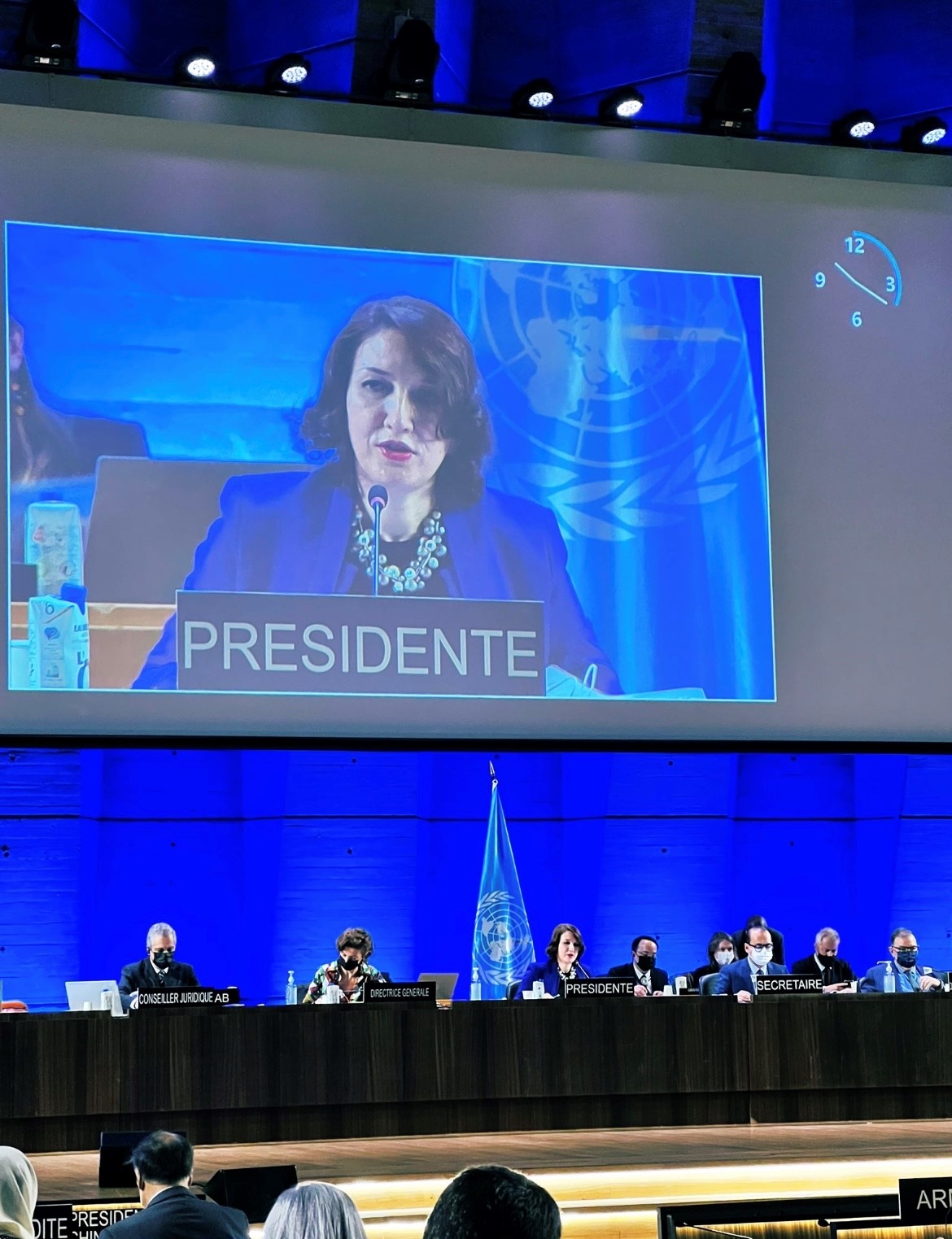
The Permanent Delegation of the Republic of Serbia to UNESCO participated in the 214th session of the UNESCO Executive Board chaired by the Permanent Delegate of the Republic of Serbia to UNESCO, Ambassador Tamara Rastovac Siamashvili, which took place from 30th March to 13th April 2022. During the plenary debate, the Delegation highlighted in its speech that the Republic of Serbia strongly believes in multilateralism and international cooperation, and supports the actions taken to strengthen UNESCO as a credible organization that implements the 2030 Agenda for Sustainable Development in all spheres of its mandate.
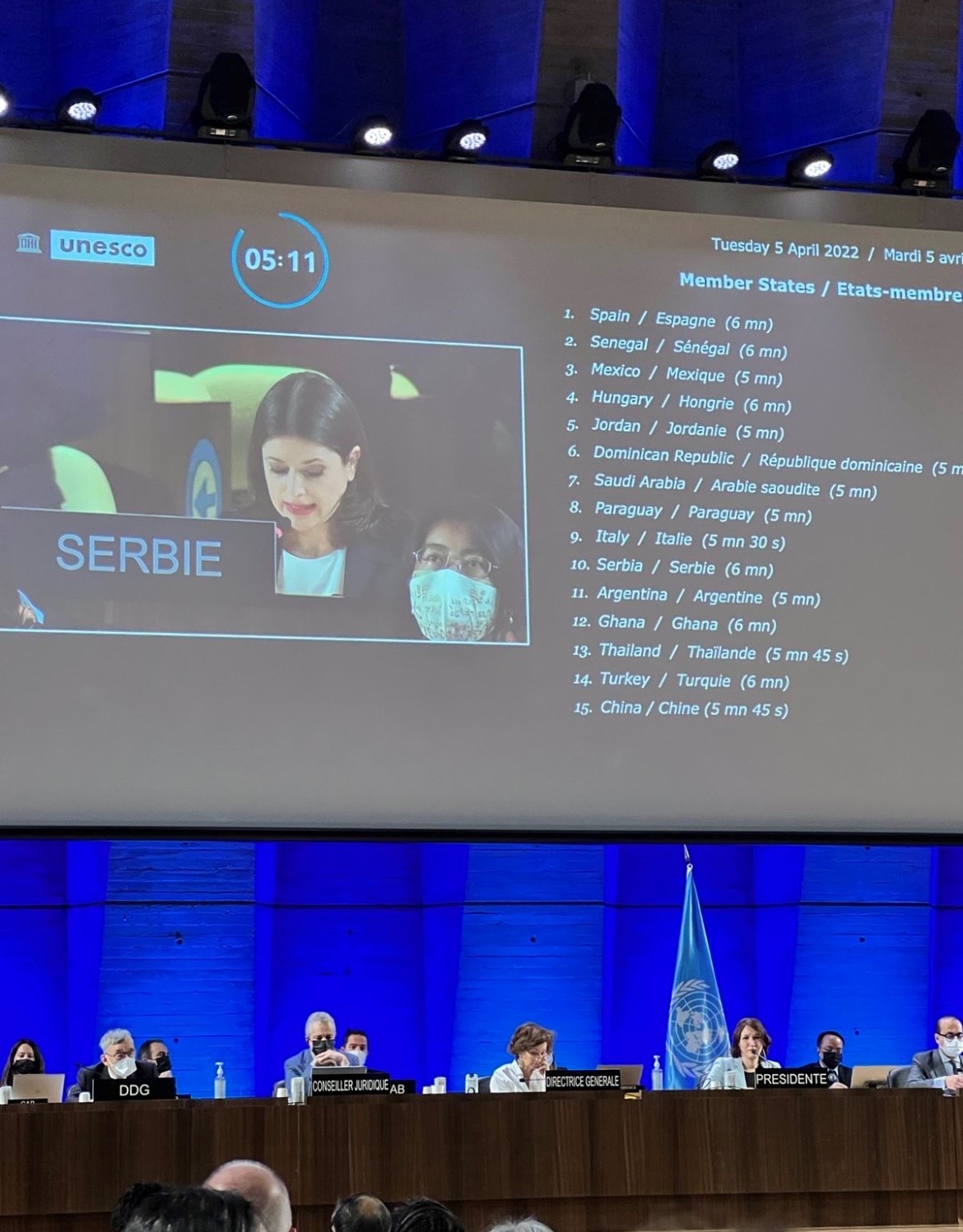
The Permanent Delegation of the Republic of Serbia to UNESCO emphasized the importance of UNESCO’s activities in relation to the Global priorities and priority groups of the Organization. Additionally, the Permanent Delegation participated in the sessions of the Finance and Administrative Commission (FA) and Programme and External Relations Commission (PX) of the UNESCO Executive Board.
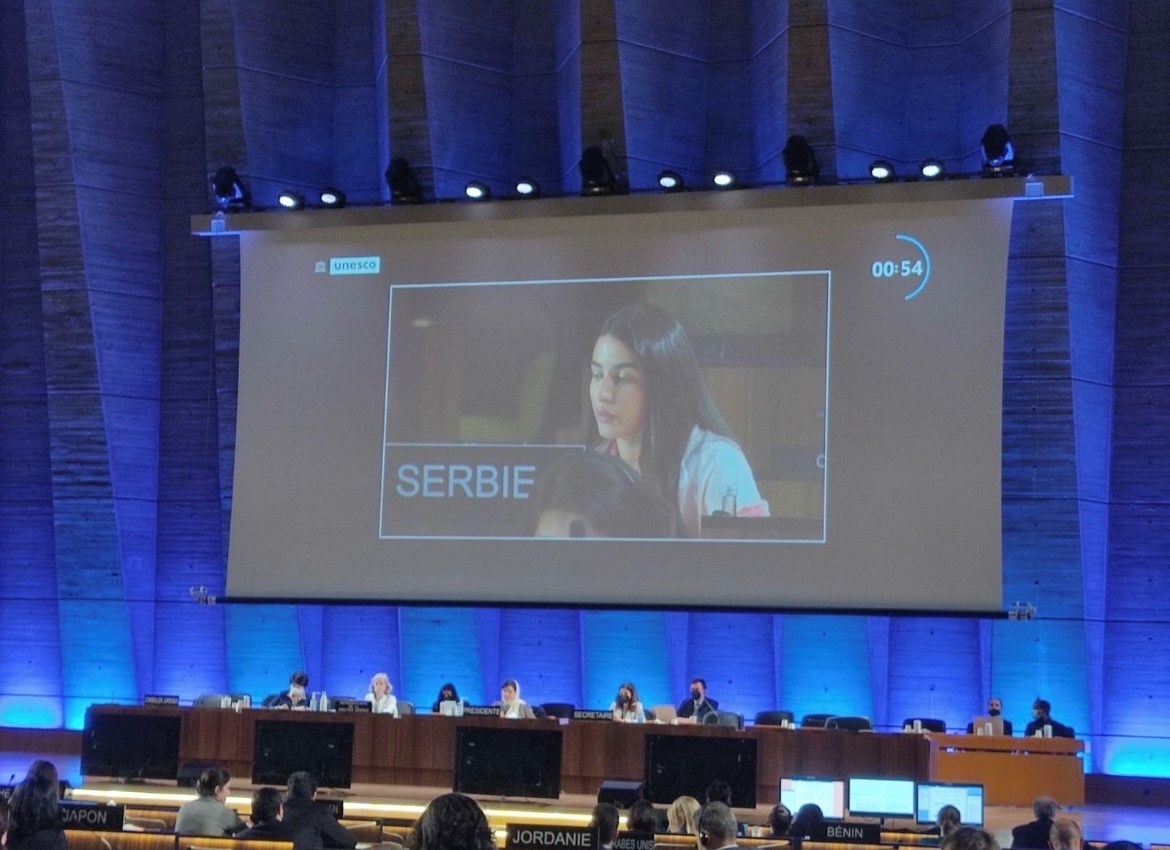
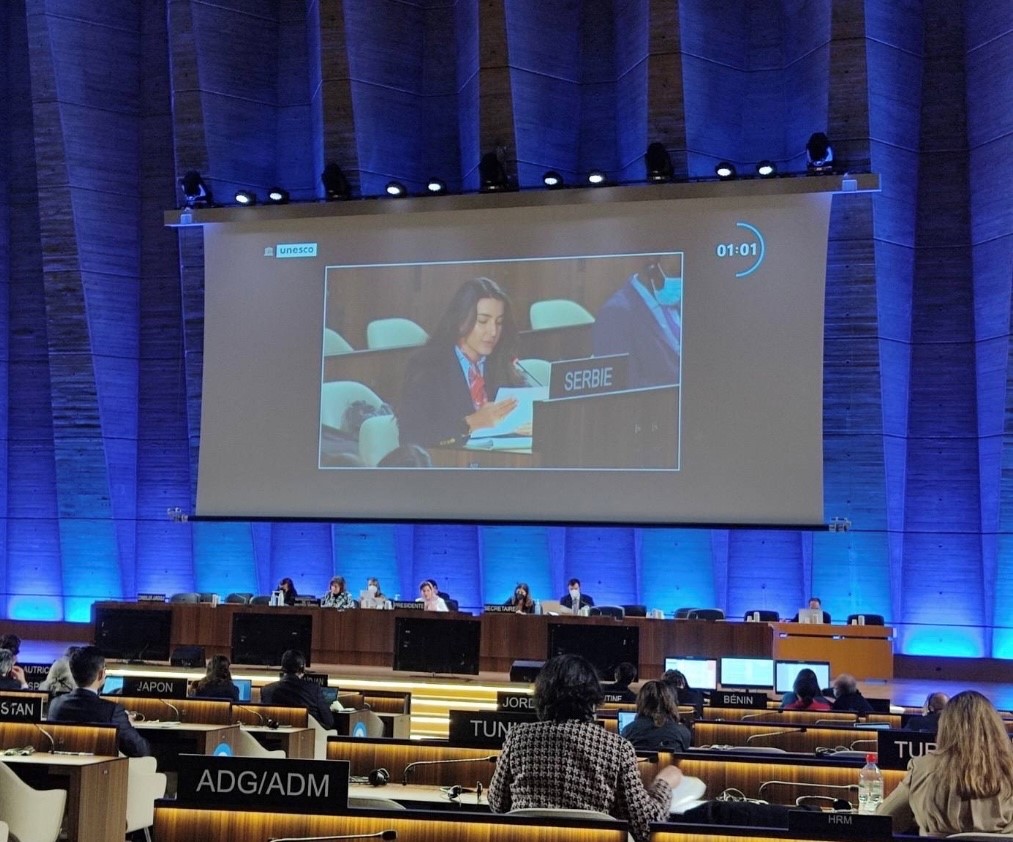 |
|
|
| Belgrade to get Centre for Fourth Industrial Revolution |
|
7 February 2022
Prime Minister Ana Brnabic attended today in Geneva the signing of the Agreement on the Establishment of the World Economic Forum Centre for the Fourth Industrial Revolution in Serbia, the first of its kind in the Western Balkans.
The agreement was signed at the headquarters of that forum by Director of the Office for Information Technologies and eGovernment Mihailo Jovanovic and Managing Director and Head of the Forum's Centre for the Fourth Industrial Revolution Jeremy Jurgens.
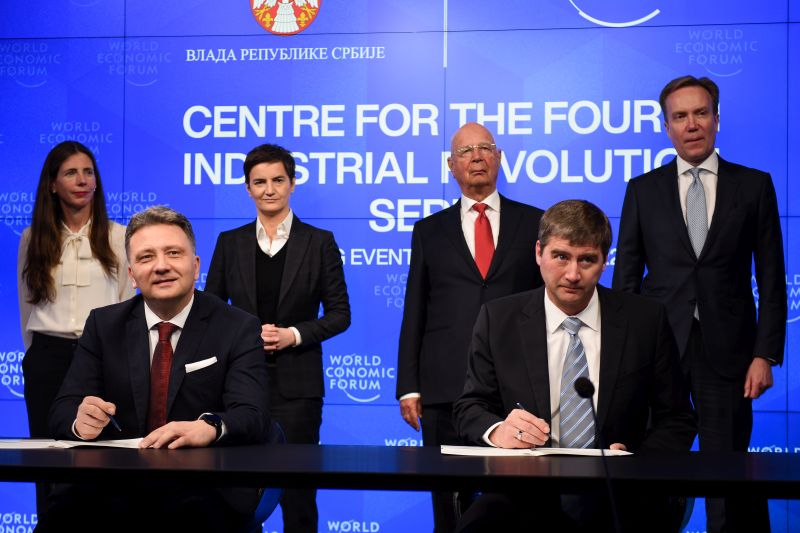
The centre in Serbia will be the 16th in the network of centres of the World Economic Forum in the world and the first in the region of the Western Balkans.
The new centre will start operating on 1 March and will function as a non-profit organisation and a platform for public-private partnership and cooperation for the Fourth Industrial Revolution, while the focus of work will be on artificial intelligence and bioengineering.
This centre will work within the Serbian government’s Office for Information Technologies and eGovernment and will cooperate with scientific institutes, state institutions and the private sector.
The signing of this document was also attended by founder and Executive Director of the World Economic Forum Klaus Schwab and President of the World Economic Forum Borge Brende, with whom Brnabic had previously met.
Addressing the press, Brnabic pointed out that this agreement is the result of many years of joint work between Serbia and the World Economic Forum.
We started talking in 2018, signed a Memorandum of Understanding, then 2020 hampered us a bit, but we continued to plan in 2021 and here we are today, she said.
According to her, the centre will be focused on the development of artificial intelligence, biomedicine and biotechnology, and on the ways in which digitalisation can raise the productivity of companies and the entire economy.
This is what further leads to higher salaries, a better standard of living, as well as to an economy that is mainly based on knowledge, creativity and innovation, Brnabic emphasised.
Today, we have received great recognition for everything that Serbia has done in the field of digitalisation, development of high technologies and paradigm shift – from an economy that was based on labour-intensive investments to digital development.
That is why this agreement shows that Serbia has been recognised as one of the leaders in the economy and IT industry in the last six years, the Prime Minister pointed out and assessed that this is the announcement of the beginning of an even closer cooperation between Serbia and WEF.
She added that they will have a joint meeting with the 16 WEF centres for the fourth industrial revolution in the world every month, at which they will talk about what each of them is doing, since each has a different focus.
That is how we will hear what everyone is doing every month, learn from each other and I am sure that the centre in Belgrade will be one of the best, the Prime Minister said.
According to her, this gives us visibility, the opportunity to further establish Serbia as an investment destination, a country good for living and investing in new technologies and knowledge.
Jovanovic said that the ecosystem formed around the centre will use the infrastructure of the National Platform for the Development of Artificial Intelligence, the Centre for Genome Sequencing and the future bioeconomic centre – BIO4 Campus.
Izvor/Foto: Tanjug |
|
|
| Election of the Ambassador of the Republic of Serbia to UNESCO as the Chairperson of the Executive Board of UNESCO |
|
Paris, 26/11/2021
At today's 213rd session of the Executive Board of UNESCO, Ambassador H.E. Tamara Rastovac Siamashvili, Permanent Delegate of the Republic of Serbia to UNESCO, was elected by secret ballot as the Chairperson of the Executive Board of UNESCO for the period of 2021 till 2023.
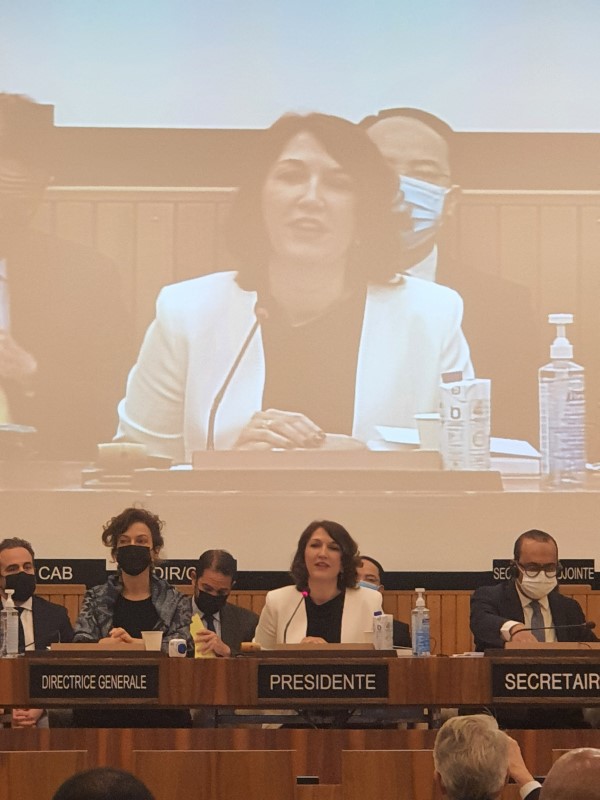
This election is another confirmation of the impressive reputation that the Republic of Serbia and our Permanent Delegation to UNESCO enjoys in this Organization. This is also the first time in history that the Republic of Serbia has the honor of charing this extremely important body of UNESCO.
|
|
|
| UNESCO’s role extremely important for preservation of Serbian heritage in Kosovo and Metohija |
|
12 November 2021
Prime Minister Ana Brnabic stated today that severe examples of endangering the Serbian cultural, historical and spiritual heritage in Kosovo and Metohija are proof of the important role of UNESCO in protecting and preserving heritage.
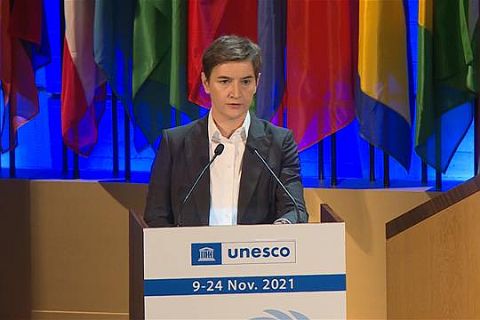
At the 41st session of the General Conference of UNESCO in Paris, Brnabic emphasized that four jewels of the Serbian medieval cultural heritage in Kosovo – Visoki Decani, Pec Patriarchate, Gracanica and Bogorodica Ljeviska, have been preserved thanks to the fact that they are inscribed on the endangered world heritage list. Hundreds of other sites and monuments are endangered.
The Serbian heritage in Kosovo and Metohija is of immeasurable importance, not only for the national identity of Serbia, but also as a part of the esteemed European and world heritage, she underlined.
Source/Photo: www.srbija.gov.rs
|
|
|
| Address of the President of the Republic of Serbia at the United Nations climate change conference COP26 held in Glasgow |
|
2nd November 2021
"Your Excellences,
distinguished delegates,
dear Sarah,
At the very beginning, I feel obliged to thank Prime Minister Boris Johnson and Her Majesty’s Government for exceptional hospitality.
I feel privileged to represent the Republic of Serbia at this important place and at the highest-level world forum, in working on the most important topic of today – promoting climate awareness.
We all agree that we must make investment into climate and environment.
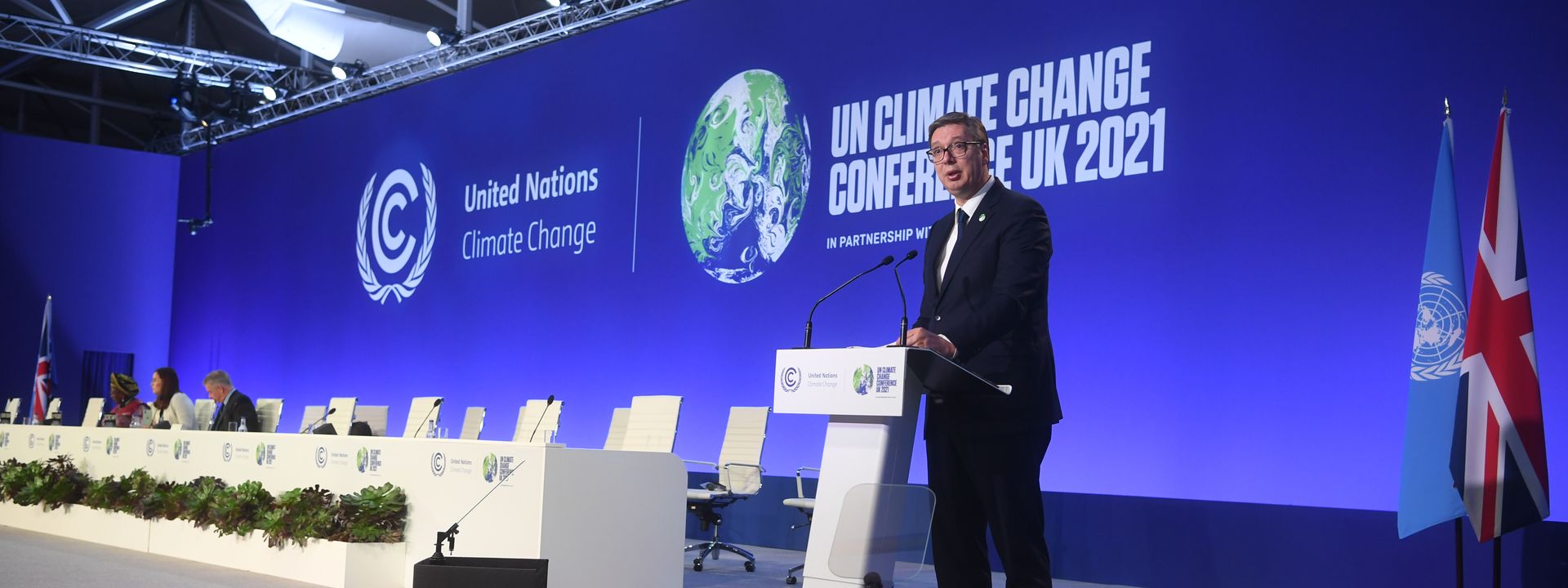
We all, likewise agree, that future generations must be educated in order not to repeat the mistakes we made, by hurting the only Planet that makes life possible.
I am very honoured that the Republic of Serbia is co-chairing this year’s Conference as a Non-EU representative of the Eastern Europe Group.
In concrete terms, we see the special contribution of our expert team in finalising negotiations on the implementation of Article 6 of the Paris Agreement, which refers to the establishment of the global market and non-market mechanisms for reducing greenhouse gas emissions, as well as to remaining provisions referring to advanced transparency framework and common timeframes for Nationally Determined Contributions, which are the key provisions of the Agreement that have not yet been covered by the decision that is to be adopted by the Conference, i.e. all member states.
We, therefore, believe that this is an exceptional opportunity for Serbia to give its full contribution to the finalization of negotiations, which, we hope, will secure full implementation of the Paris Agreement.
As a result of strong economic development, modelled for Serbia by 2050, the impact of the implementation of climate measures to employment will be optimal, through new jobs creation and creation of new industries which have not existed so far.
One billion euros was raised at the first green bonds auction in Serbia, which clearly confirms the trust of international investors in our green agenda, but also to the economic and political stability of our country.
Incomes from green bonds issuance will be used for financing renewables, energy efficiency, sustainable water management, prevention of pollution and circular economy development and biodiversity preservation.
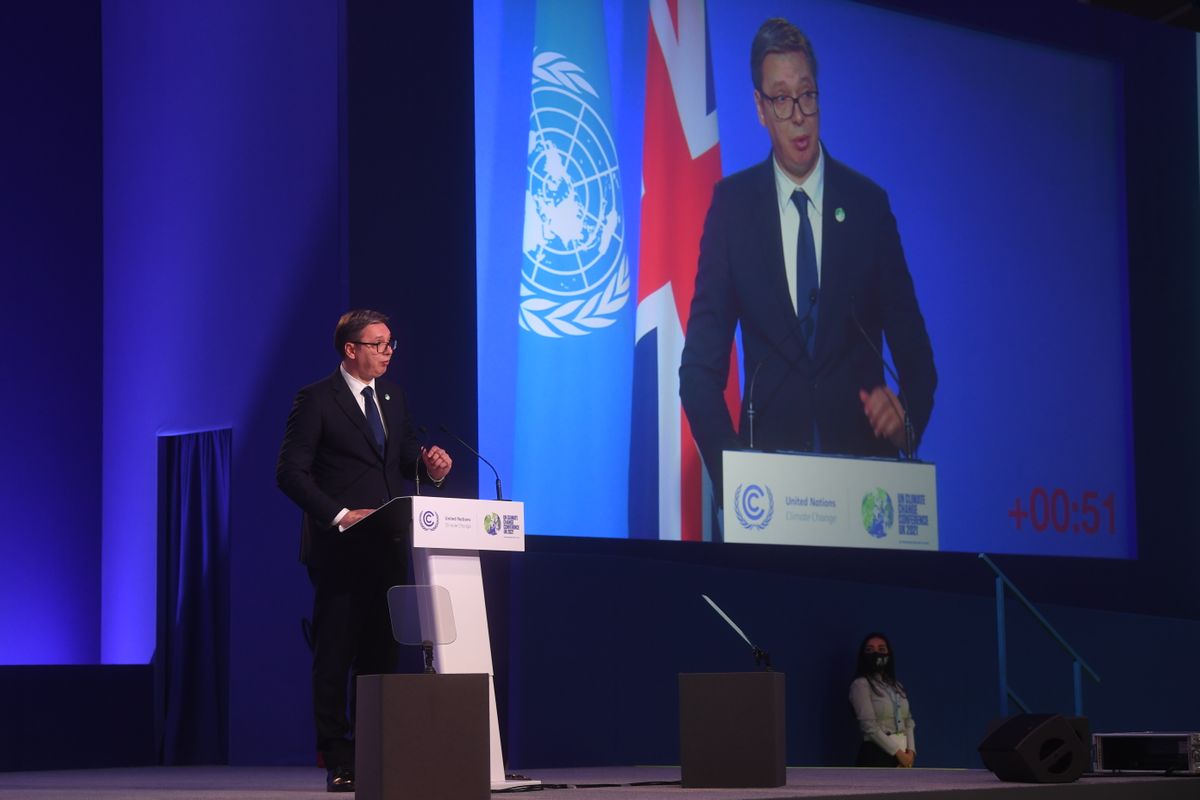
And as you can see, dear friends, my people made a terrific speech for me, but I am going to add a few more words and a few more questions for those that are coming from big powers and that haven’t answered yet several questions:
Number one is: how are we going to finance all these activities?
We’ve heard the story of trillions of dollars that are at our disposal. My question would be: what would be the interest rate, what would be the terms for taking these amounts of money, and actually how are we going to tackle that issue?
Number two: how are we going to treat the nuclear power plants? Are we going to shut them all or are we going to build them more?
Then, how are we going to build more renewables if we already started endorsing populist movements against wind parks, new hydropower plants, and are we going to put in jeopardy the level of our public debt to GDP ratio if we raise huge amounts of money?
How are we going to treat natural gas, and how are we going to secure decent prices of natural gas and electricity power as well?
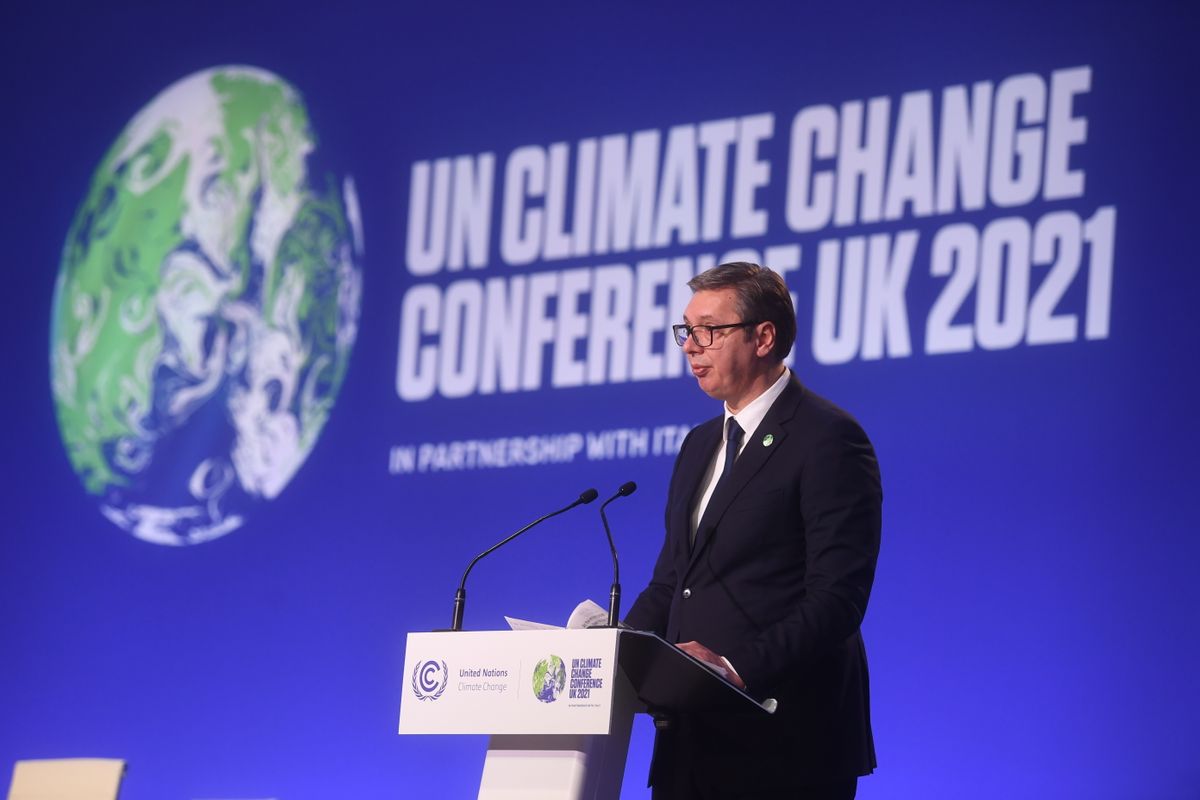
And, I came here using an electric car from Edinburgh to Glasgow. But, how are we going to do mining and refining of lithium, nickel, cobalt and many other very important minerals?
In the end, we all know what is our final aim, what is our final target. But, it’s not a fairytale – we’ll have to work a lot, we’ll have to be 100 per cent dedicated, and we’ll have to be more honest with each other.
The health of people living in Serbia depends directly on the implementation of this Agenda, just like the health and life of each living being on Earth depends on arrangements that will be reached here and on national implementation of the respective arrangements.
Perhaps it is the right time to listen and hear the cry of Mother Earth because if we lose this race against time, our children will inherit an irreparably polluted Planet.
Thank you very much for listening to me."
Source: www.predsednik.rs
Photo: Dimitrije Goll |
|
|
| Selaković in UN SC: Dialogue and the implementation of the agreements reached are the only right way to resolve all open issues |
|
15th October 2021
Distinguished President of the Security Council,
Esteemed members of the Security Council,
Distinguished Special Representative,
I would like to thank Secretary-General of the United Nations Mr. Guterres and Special Representative of the Secretary-General and Head of UNMIK Mr. Tanin for the report submitted and for their efforts made towards the implementation of the UNMIK mandate. I would also like to thank the members of the Security Council for the continued attention they have devoted to the issue of Kosovo and Metohija. The Republic of Serbia highly values the activities of the Mission of the United Nations in Kosovo and Metohija and supports it in carrying out its work as efficiently as possible, pursuant to the UN Security Council Resolution 1244, and undiminished in scope, aiming to build and preserve lasting peace, stability and security in the Province.
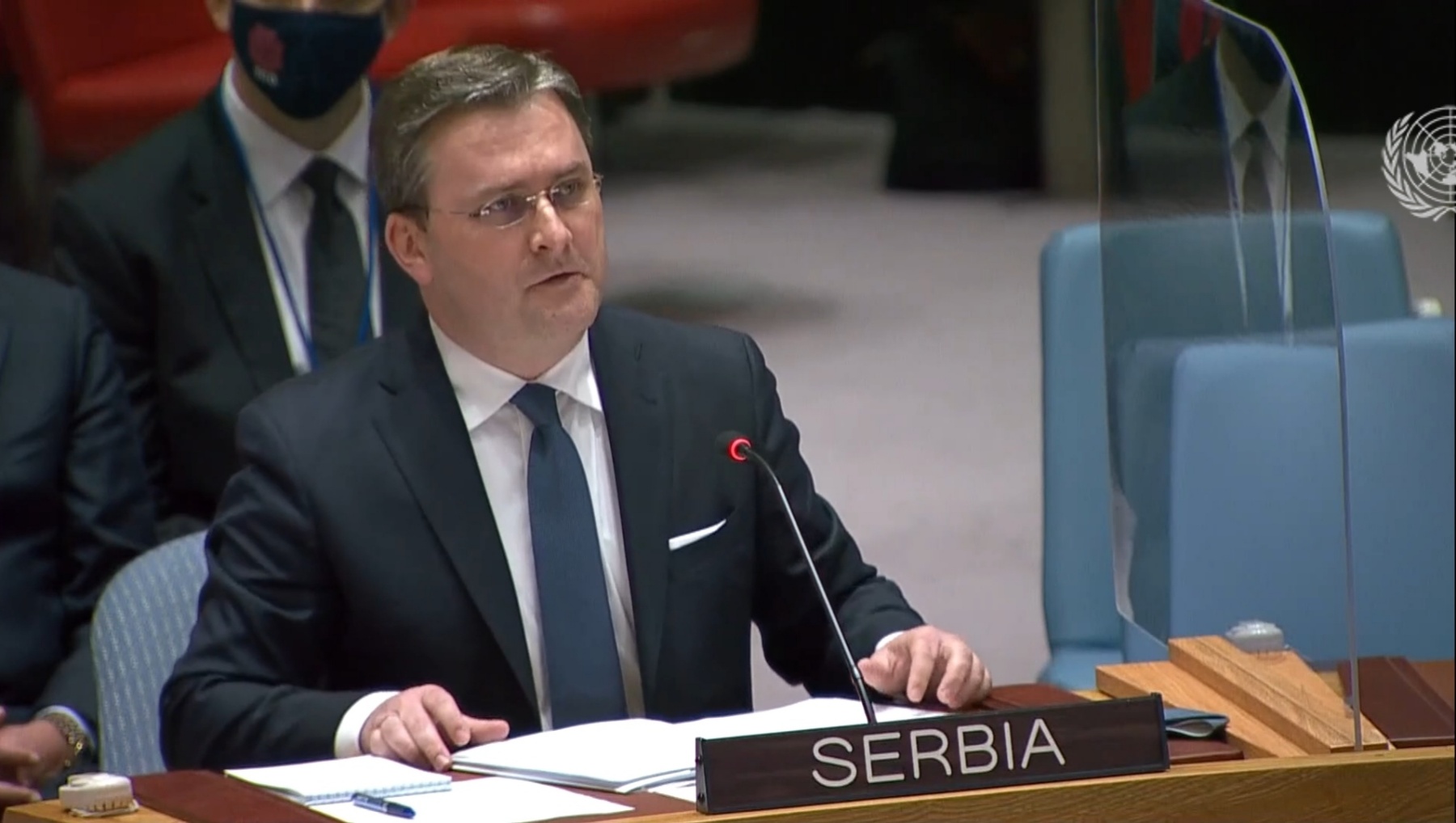
Mr. Tanin,
Please accept the expressions of our gratitude for your engagement and the cooperation we achieved during your term of office.
Mr. President,
Deep regret and concerns are raised by the fact that the security situation in Kosovo and Metohija in the past period has been marked by an increasing number of various ethnically motivated attacks and incidents targeting Serbs, which was also stated in the Report; that the provisional institutions of self-government (PISG) in Pristina continue to take unilateral steps and refuse to implement the agreements reached in the Brussels dialogue; and that institutional discrimination against Serbs, attacks on the sites of the Serbian Orthodox Church and the undermining of the economic sustainability of Serb communities in the Province have continued.
We are witnessing that dangerous provocations by Pristina are taking place every day, at an accelerated pace, thus seriously threatening the safety of Serbs in Kosovo and Metohija and directly violating the agreements and arrangements reached within the Brussels dialogue.
The latest violent incursion of the so-called ROSU units into the northern part of Kosovska Mitrovica, on 13 October, is the ninth incursion of its kind. Tear gas, shock bombs and unbridled violence are becoming a matter of everyday life for Serbs in the north of Kosovo and Metohija, and that must be stopped immediately.
In the last attack with firearms and chemicals used by Pristina special forces, 71-year-old Verica Djelic died as a result of chemicals used in the intervention, 10 unarmed civilians were wounded, one of them 36 years old Srećko Sofronijević was critically wounded in the back with of an automatic rifle. A three-month-old baby, who miraculously remained unharmed, was also the target of the shooting.
The false excuse for the latest unilateral action, as EU High Representative for Foreign Affairs and Security Policy Josep Borrell called it, was the fight against organized crime and smuggling. Ladies and gentlemen, Serbia is strongly against organized crime and smuggling, but the members of the UNSC should know that such an important and general global goal, which we all share, was cynically used for an armed attack on unarmed civilians, which began with an automatic rifle raid of pharmacies in which patients of Serbian and other nationalities are supplied with vitally important medicines. Four days before the local elections in Kosovo and Metohija, in order to gain votes in an irresponsible and inhumane way, fully motivated by separatist goals, the current PISG regime used medicines on which people’s lives depend to prove its position on the status contrary to UNSCR 1244.
Only a few days earlier, another provocation on the part of Pristina led to a dangerous crisis, when personnel of the so-called ROSU unit, armed with long firearms and reinforced with armoured vehicles, were deployed to administrative crossings between central Serbia and Kosovo and Metohija - Brnjak and Jarinje – in order to remove Serbian license plates and replace them with temporary ones, thus violently preventing the free movement of citizens.
These events do not fall within the reporting period covered by the latest Report of the UN Secretary General on the work of UNMIK, but it is incumbent upon us to address them on this occasion, in order to have everyone understand how dramatic the situation on the ground has been and how serious the consequences of Pristina's unilateral actions can be.
The incursions of heavily armed Pristina police formations, composed exclusively of Albanians, into the north of Kosovo and Metohija, under various pretexts and motives, with the use of excessive force, are provocations that have an extremely dangerous potential to destabilize the already sensitive security situation on the ground. The goal of the latest incursions of Pristina’s special force personnel into the north of the province was to provoke the Serbs and additionally intimidate them with a demonstration of force, as well as to provoke Belgrade to react hastily in some way.
It is obvious that with such moves Pristina aims to erase the 10 years of dialogue, which is the only way to resolve open issues. These provocations once again demonstrate that the provisional institutions of self-government in Pristina, not only do not intend to implement everything agreed in the Brussels dialogue, but that their goal is to completely deny dialogue as a means of resolving problems. An effective response to Pristina's lack of credibility and their dangerous play with fire, which could have unforeseeable consequences, cannot be provided by calling on "both sides" for constructiveness and restraint, which has long been a manner in public communication of some important factors in the international community. There is only one source of destabilization, it has a name – and that is the provisional institutions of self-government in Pristina - and after the events of 13 October, it is clear that it can and needs to be stopped by urgent and decisive action of the international community. It is now quite obvious that these are no longer sporadic and isolated provocations by Pristina, but that this is an organized campaign of ethnically motivated violence and discrimination against Serbs.
We also express our concern over the latest imposition of tariffs by Pristina on certain products originating from central Serbia, which was made public on 8 October. We remind you that the unilateral decision of Pristina to impose duties on products from central Serbia in November 2018 resulted in a de facto complete trade blockade and a long-term stalemate in the dialogue between Belgrade and Pristina. In contrast to Pristina, which persistently seeks to raise barriers towards central Serbia through unilateral acts, Belgrade is persistently and consistently working to liberalize the flow of people, goods, services and capital, which is the basic goal of our "Open Balkan" initiative. North Macedonia and Albania joined this initiative, but Pristina did not.
Distinguished members of the Security Council,
In the period from March to September this year, which is covered in the latest Report, close to 100 ethnically motivated attacks were carried out against Serbs, their private property, religious and cultural heritage sites. The increase in the frequency of attacks was accompanied by the strengthening of the intensity of ethnically motivated violence, which more and more often targets children, the elderly, women, the few returnees present there, as well as churches and other property of the Serbian Orthodox Church.
This systematically intensifies the ubiquitous sense of insecurity of the remaining Serbs, but also deters potential returnees, who are in fact being told that local Albanian communities can attack them with impunity and prevent them from returning to live in their own homes.
The most striking example of the position of Serbs in Kosovo and Metohija is the case of the displaced person Dragica Gašić, who moved into her apartment in the municipality of Djakovica again in early June. In that town – to which local Albanians proudly refer as a place forbidden to Serbs - Ms. Gašić, on her return, first faced physical and verbal attacks by citizens of Albanian nationality living there. Instead of being provided protection, that seriously ill woman then became a victim of institutional persecution as well, that the local self-government bodies and the police unleashed against her. Since this is a person who is the first and only Serb returnee to Đakovica after more than twenty years, it was to be expected that, at that moment, at least civil society organizations would attempt to protect her rights. However, NGOs from Djakovica soon joined the activities aimed at the expulsion Ms. Gašić, including those receiving funding from international donors for projects related to strengthening democracy and the rule of law.
I must also mention the latest attack on the house of the only remaining Serbian woman in the center of Pec, retired teacher Rumena Ljubić, whose windows were stoned twice in just 24 hours on 13 October.
Dragica's and Rumena’s fate is a frightening reflection of the real situation of human rights that almost every one of over 200,000 displaced Serbs and non-Albanians would face in Kosovo and Metohija - provided that they gather the courage to return to their homes in the Province after more than twenty years. I would like to remind you again that since 1999, only around 1.9% of internally displaced Serbs and other non-Albanians have achieved a sustainable return to Kosovo and Metohija.
Therefore, I believe that the aforementioned will encourage the members of the Security Council and the international presence on the ground to devote priority attention in the future
to the issue of the return of displaced persons, which is an important part of the UNMIK mandate under UN Security Council Resolution 1244.
I therefore thank the Secretary-General in particular for keeping this extremely important issue in focus and for calling again, in the conclusions of his Report, for the creation of conditions for the sustainable return of internally displaced persons and the sustainable reintegration of returnees.
Distinguished members of the Security Council,
Serbian medieval monuments in Kosovo and Metohija, including monuments that, due to their exceptional value but also constantly being subject to threats are inscribed on the UNESCO List of World Heritage in Danger, are still among the most endangered cultural heritage in Europe.
I wish to recall that there are over 1,300 Serbian churches and monasteries in Kosovo and Metohija. Attacks on Serbian cultural and religious heritage are at the same time attacks on the identity of Serbs in the Province and directly affect their sense of safety.
A striking example of disrespect for Serbian cultural and religious monuments in the Province is the case of the Visoki Decani monastery. The monastery, which has been the target of attacks and shelling several times since 2000, is still secured by KFOR forces due to being under a threat. It is faced with a series of hostile actions, and the perpetrators are not deterred by the fact that this is a World Heritage Site. Despite frequent declaratory statements, even the decision of the so-called "constitutional court" of the PISG in Pristina five years ago confirming ownership of Visoki Decani Monastery over 24 hectares, is not respected. We welcome the assessment made by the UN Secretary General in his Report.
Dear Mr. President,
The Republic of Serbia remains committed to finding a compromise political solution, as prescribed under Resolution 1244, which will ensure lasting peace and stability. We firmly believe that dialogue and the implementation of the agreements reached are the only right way to resolve all open issues.
As a state committed to the respect for international law and a member of the United Nations, Serbia opposes any attempt at establishing an artificial balance between the parties in the dialogue, as well as the relativization of responsibility for unilateral acts.
We note with concern that not even eight years after reaching the Brussels Agreement, the establishment of the Community of Serb Municipalities has not been initiated, although Belgrade has fulfilled all its obligations under that agreement.
There are also numerous and repeated examples of Pristina violating or obstructing agreements reached in dialogue, in the areas of energy, justice, freedom of movement and visits by officials.
One such example is the verdict sentencing Ivan Todosijevic to two years in prison, which is also pointed out in the Secretary General's Report. The Brussels Agreement was directly breached, which was also stated by the representatives of the European Union. With its conduct Pristina caused immeasurable damage to the reconciliation process in Kosovo and Metohija.
Despite the interpretation from the European Commission that this is a violation of the Brussels Agreement, because Todosijevic had to be sentenced by a panel consisting of the majority of judges of Serbian ethnicity, Pristina still does not take any action in this regard.
Pristina also continued with the practice of banning Serbian officials from entering the territory of the Autonomous Province of Kosovo and Metohija.
We believe that it is important that the international community, and especially the European Union, as the guarantor of the agreement, firmly insists that the provisional institutions of self-government in Pristina start implementing all the agreements reached.
Distinguished members of the Security Council,
As before, the Republic of Serbia remains fully committed to resolving the issue of missing persons, as also demonstrated through full cooperation with relevant international mechanisms as well as participation in the work of the Working Group on Missing Persons. We expect that the representatives of the provisional institutions of self-government in Pristina will fulfill their obligations.
Bearing in mind everything I delivered here today in my address, we hold the position that the international presence in Kosovo and Metohija, pursuant to UN Security Council Resolution 1244, is still necessary. In addition to UNMIK, the presence of KFOR as the main guarantor of security and EULEX, due to its engagement in the field of the rule of law, is also important. I would like to emphasize once again that Serbia fully supports respect for international law, comprehensive implementation of UN Security Council Resolution 1244 and activities of UNMIK in an undiminished scope and with adequate financial resources, so that the Mission fulfills the mandate entrusted to it under the Resolution.
Thank you.
|
|
|
| Selaković: Strong energy of freedom-loving peoples and states could be felt in Belgrade |
|
12. Oct 2021.
Minister of Foreign Affairs of Serbia, Nikola Selaković, said today that the two-day commemorative meeting marking the 60th anniversary of the first conference of the Non-Aligned Movement showed not only that the movement has not become obsolete, but that it appears fresher and younger than it was 20 or 25 years ago.
At the joint press conference with his Azerbaijani colleague Jeyhun Bayramov that was held after the meeting, Minister Selaković pointed out that very strong energy of freedom-loving peoples and countries could be felt at the conference in the previous two days.
According to Minister Selaković, he is especially pleased with the fact that messages of peace, solidarity and desire for joint engagement in building the world based on tolerance and mutual respect were heard from Belgrade this time as well.
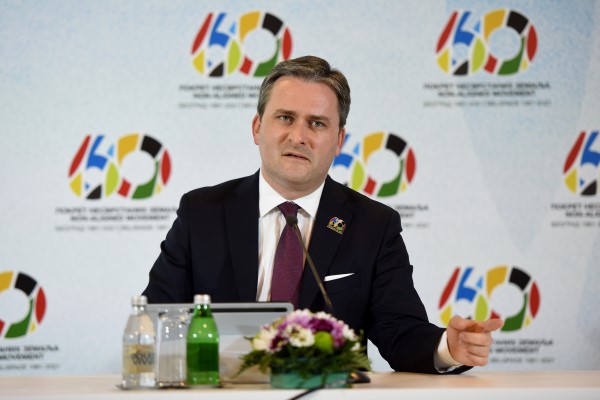
“In the previous days, we heard some bitter statements from other parts of the world that are not represented in the NAM that the Movement has become obsolete. Unusually strong energy was felt during the conference, the energy of freedom-loving peoples and states, committed to the values of the UN Charter, the principles defined in Bandung and further defined in Belgrade, who want to live in an orderly world, where their voice is equally valued as the voice of all others”, stated Minister Selaković.
“The movement has not become obsolete, but is fresher and younger today than it was 20 or 25 years ago. Thank you from the bottom of my heart for coming to the conference and for showing respect for Serbia and Azerbaijan”, Selaković said.
Minister Selaković also expressed great satisfaction with the fact that Serbia was given the honour of being the co-organizer of the gathering, even though it has an observer status within the NAM, and said that he was proud of how we managed to organize such an exceptional and very successful event, despite the coronavirus pandemic.
Selaković especially thanked the friendly Republic of Azerbaijan, President Ilham Aliyev and his esteemed colleague, the Minister of Foreign Affairs of Azerbaijan, Jeyhun Bayramov, of whom he said is a great friend of Serbia.
“It is a special pleasure that, despite some pessimistic expectations, we managed to gather a total of 120 delegations in Belgrade in the previous two days. After the UN General Assembly, we can say that this was one of the largest multilateral gatherings this year”, said Minister Selaković.
The head of Serbian diplomacy emphasized that such a response of NAM members, observers and guests testifies to the respect that the movement enjoys.
The presence of 120 delegations at the gathering in Belgrade, says Selaković, is a proof of respect for the gathering, but also a testimony of commitment and respect for Serbia and Azerbaijan as co-organizers of the conference.
The head of Serbian diplomacy said that he met with numerous traditional friends and partners from the Non-Aligned Movement on the sidelines of the conference, all with the aim of deepening cooperation.
Minister Selaković thanked the presidents of Serbia and Azerbaijan, Aleksandar Vučić and Ilham Aliyev, for their support, as they supported the organization of this great event without any hesitation.
According to him, more than 6,500 people participated in the organization of the meeting, and the event was covered by more than 300 representatives of the media.
Minister Selaković also reminded of the founders of the NAM, stated that Josip Broz Tito was a political genius of the 20th century and thanked the descendants of some of the founders for attending the conference and making it even more successful.
Speaking on behalf of the movement's presiding country, Azerbaijani Foreign Minister Jeyhun Bayramov stated that the gathering in Belgrade was excellently organized, thanking the Serbian government, Serbian Foreign Minister Nikola Selaković and President Aleksandar Vučić.
“Our joint efforts have given a special result and we can be satisfied with what has happened here in the past two days. The delegations commended Azerbaijan and Serbia for the initiative to organize such an important event”, Bayramov said.
The Azerbaijani Minister referred to the statements by the participants in the gathering, who reminded of the original values of the NAM and confirmed the importance of multilateralism, international cooperation and solidarity in the world. |
|
|
| Participation of the Republic of Serbia in the plenary debate of the 212th session of the Executive Board of UNESCO |
|
During the 212th session of the UNESCO Executive Board, which is being held from 6th to 20th October 2021, Ambassador Tamara Rastovac Siamashvili, Permanent Delegate of Serbia to UNESCO, spoke on behalf of the Republic of Serbia on the plenary debate which has been held on 12th October 2021. In her speech, she pointed out, among other things, that the Republic of Serbia strongly advocates the strengthening of multilateralism based on rules and international solidarity. In that context, she also referred to the High-Level Commemorative Meeting, which the Republic of Serbia, together with Azerbaijan, is hosting on October 11th and 12th 2021, in Belgrade on the occasion of the 60th anniversary of the First Conference of the Non-Aligned Movement held in Belgrade in 1961.
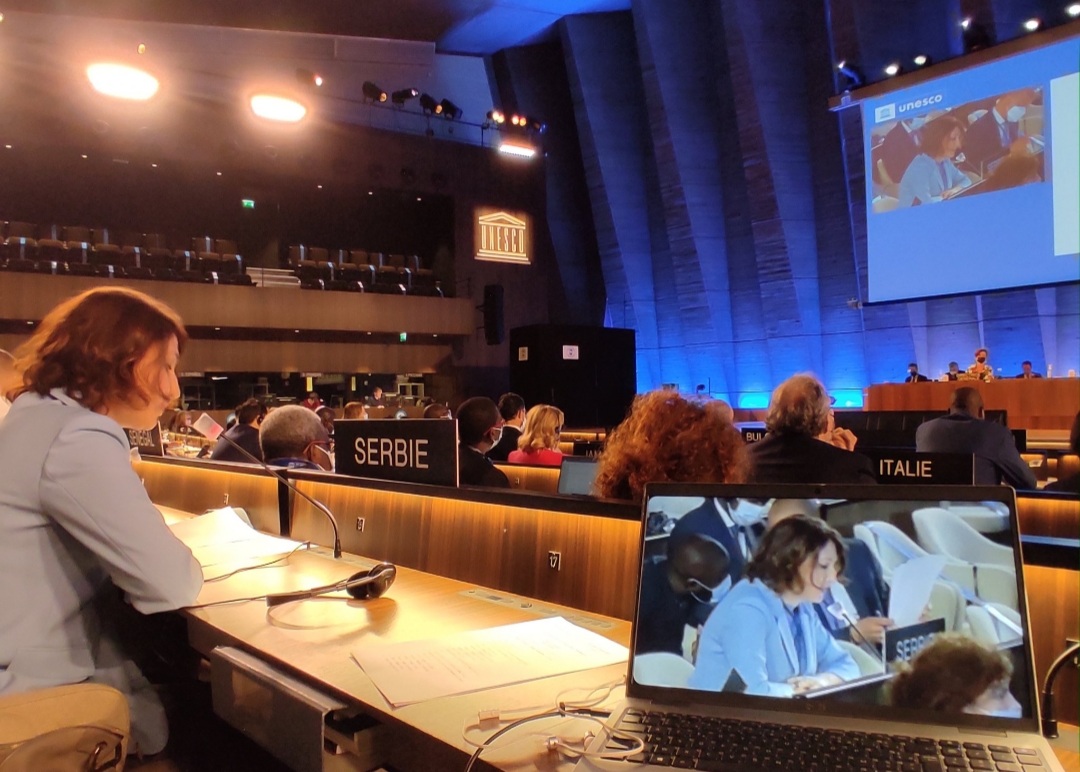
She underlined that this remarkable gathering, attended by delegations from 105 countries and 11 international organizations, would send important messages that international cooperation, based on respecting the principles of the United Nations, is the only way to achieve the overall well-being and prosperity of mankind and that peace is the basis for the development of cooperation weather it is political, cultural or economic.
She addressed the main issues on the UNESCO agenda, such as strategic transformation, implementation of UNESCO's global priorities and activities in relation to priority groups, with special focus on Africa and small island developing countries, adoption of the Draft Medium-Term Strategy and Program and Budget of the Organization and the Recommendations on the Ethics of Artificial Intelligence. She emphasized the importance that Serbia dedicates to the matters of education, protection of cultural heritage, freedom of the media, improvement of media and information literacy, safety of journalists, as well as the promotion of the diversity of cultural expressions.
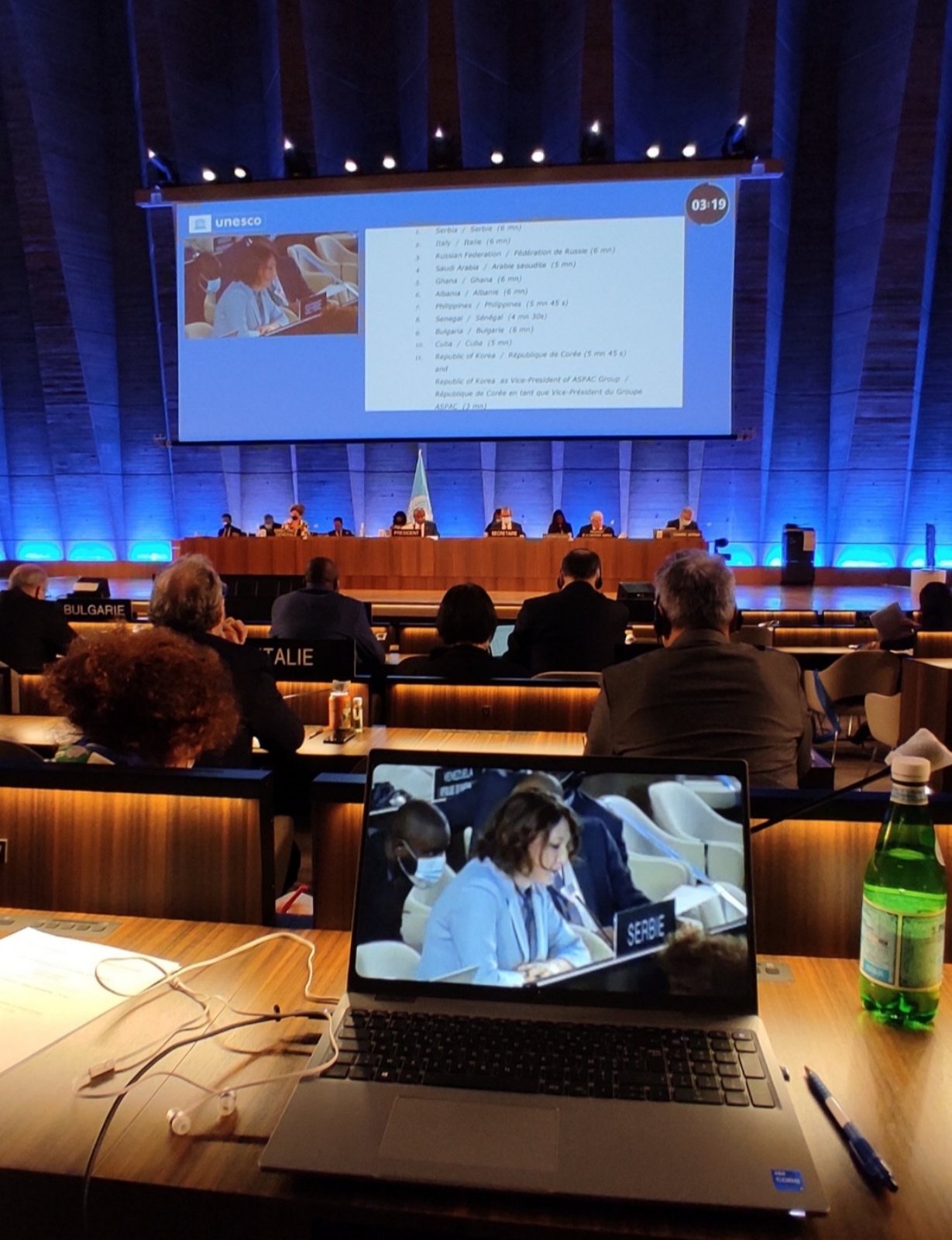
She underlined that in these challenging times, it is crucial to ensure that the spirit of consensus and dialogue continues to prevail in UNESCO in order to preserve and promote its unique role in achieving the goals of international peace and welfare through the development of cooperation in the fields of its mandate. |
|
|
| VUČIĆ: WELCOME HOME: SERBIA A RELIABLE PARTNER TO ITS FRIENDS |
|
With the words “welcome home”, the President of Serbia, Aleksandar Vučić, began his address today at the opening of the Commemorative Meeting on the occasion of the 60th anniversary of the first Summit of the Non-Aligned Movement (NAM).
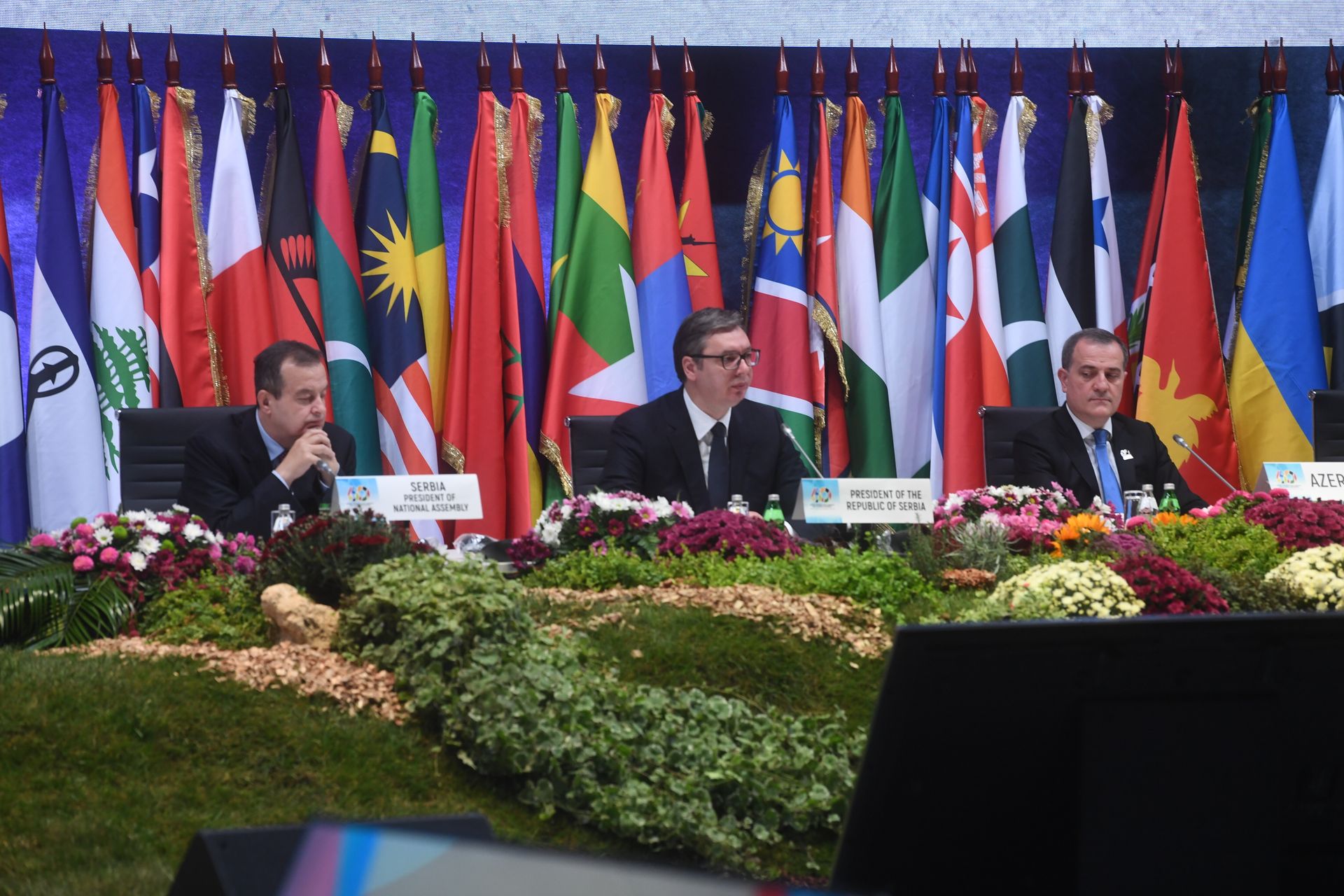
“I hope that we will not only discuss the past, but also the future that we want to build together. The world of dialogue, compromise, and peace is still possible and attainable”, he said.
Belgrade has been, is and will continue be a proud host to all human beings who carry peace within themselves. The basic idea around which our predecessors gathered when they founded the Movement was peace. Peace is the basis for the development of cooperation, whether politicalor economic”, Vučić pointed out.
He said that he was especially glad for having the opportunity to see friends from distant countries, for whom the difficult situation with Covid-19 was not an obstacle to travel to Belgrade, which showed the importance they attach to this organization.
It is a great personal privilege and honour for Serbia that we gathered here in Belgrade, where we will make sure that you feel at home. I am convinced that Belgrade, as a centuries-old symbol, a crossroads of civilizations and religions, a meeting point between East and West, can inspire you to dialogue and encourage you to build new bridges of cooperation”, Vučić said.
He emphasized that international cooperation, while respecting fundamental principles, is the only path towardsthe development and prosperity of humanity, and pointed out that the UN Sustainable Development Agenda 2030, according to him, highlights and promotes three principles – peace and security, development and human rights.
“Serbia, as the legal successor of Yugoslavia, the founder of the UN and the NAM, is a proud promoter of the policy of multilateralism and respect for international norms.
Vučić pointed out that the Movement is based on common principles that have never lost their significance, and that it played an essential role in preserving peace and security in the world, in the process of decolonization, which promoted equality and social and economic development of all countries.
He also said that today it is not enough to nostalgically remember the golden age of the Movement, but that we must work together on fulfilling the goals that will lead towards the future of equals, where the same rights shall apply to everyone, and this is the direction the Movement has taken from its beginning and for which everyone should strive even today.
“We are advocating this, not because it is a question of the interests of individual countries, but because it is one of the biggest civilizational steps that the world must take if it wants to survive, and not as a kind of camp of which only the rich have the key”, Vučić said.
The President said that the right to decide one’s own destiny is not a sin, but a right that must belong to everyone, regardless of the strength and power at theirdisposal.
He noticed that the world today is much different from the one in 1961, since globalization, interdependence and the development of new technologies have made the planet smaller, making an impact on everyone’s lives.
“The challenges we face today know no boundaries, and their nature is more complex. That is why we need to work more than ever on the development of multilateralism, because no country is isolated and cooperation is the only way to prosperity”, Vučić said.
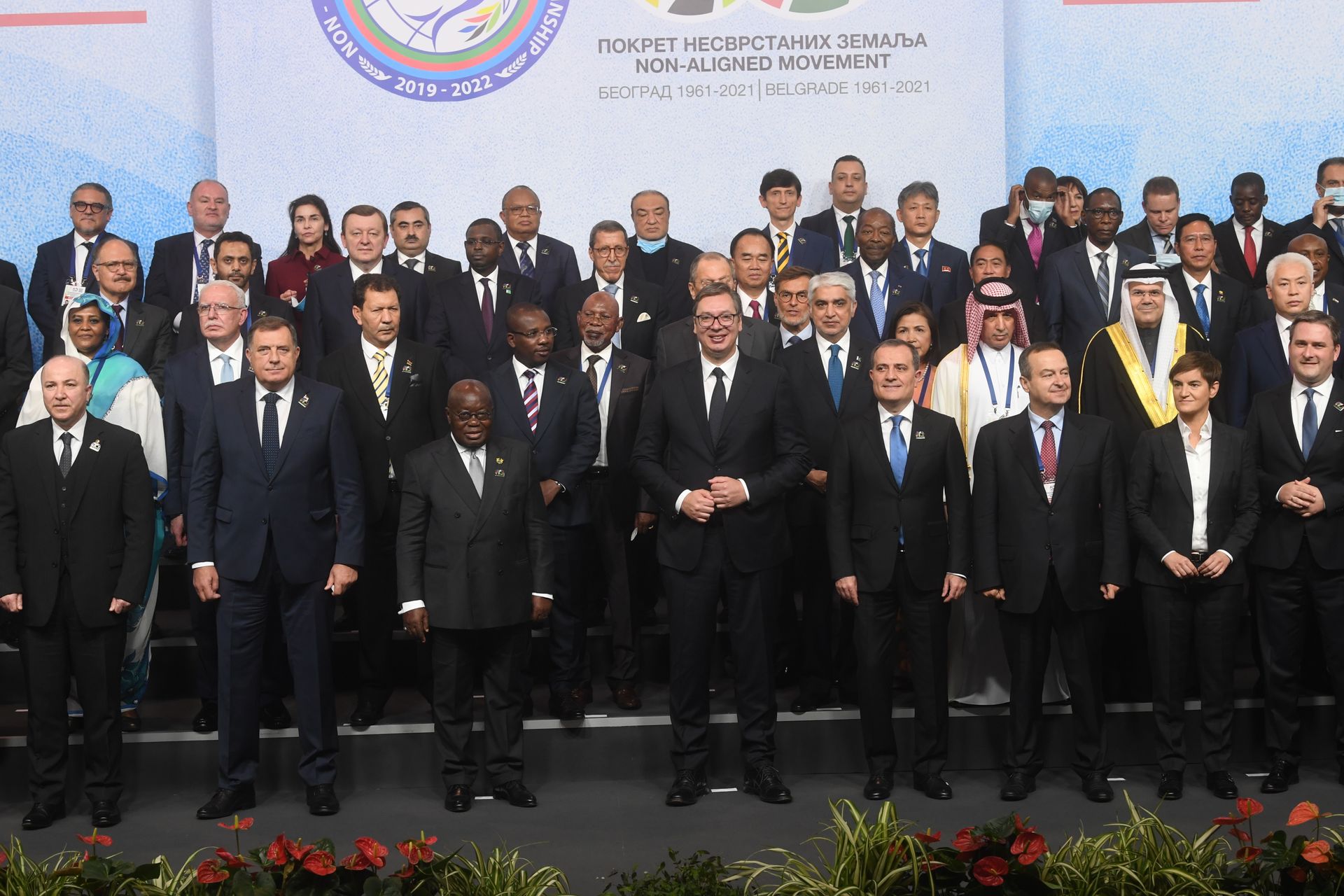
That, he says, is the basis on which, despite the differences, members of the Movement stand, the Movement which is a symbol of the freedom-loving part of the world, ready to fight for freedom, independence and sovereignty.
“I believe that this indeed is something worth fighting for. Serbia knows best how difficult it is, because of all the struggles it is waging to preserve its sovereignty and territorial integrity, to resolve the issue of Kosovo and Metohija”, Vučić said.
The President said that in this way, Serbia defends the universal principles on which the UN Charter is based, the principles of international law, but also some of the most important values of the Movement.
Vučić said that Serbia remains committed to finding a compromise solution that would guarantee lasting peace in the province, convinced that it is a reflection of our strengths, not weaknesses, and stressed that Serbia is an independent state, which makes its own decisions, a reliable partner to all of its friends, always ready to extend a hand of cooperation.
On that note, he reminded that in the past period, Serbia selflessly helped everyone who needed it, with more than a million vaccines against Covid-19, more than half of which were donated to African and Asian countries, adding that our country will continue to do so, until the coronavirus becomes a thing of the past.
“You have a loyal friend in Serbia, and these are not empty words. Despite all the pressures, Serbia will never turn its back on friends”, Vučić underlined.
He also reminded that the Movement was conceived with the idea of SFRY, Egypt and India, that peace cannot be ensured by divisions, but by striving for collective security and ending the domination of one country over another.
President Vučić concluded by quoting an African proverb, saying “If you want to go fast, go alone. If you want to go far, go together”, which he believes corresponds fully to the character of this Movement.
Source TANJUG
Photo: www.predsednik.rs |
|
|
| Selaković in New York with 28 foreign ministers on economic successes of Serbia and K&M situation |
|
25 September 2021
The Minister of Foreign Affairs of Serbia, Nikola Selaković, has stated that in New York he introduced foreign ministers of 28 countries to economic success of Serbia but also to the situation in Kosovo and Metohija, which he also discussed with the Russian Minister of Foreign Affairs, Sergey Lavrov, who told him that we could count on the support of the Russian Federation, with regards to Serbian interests in K&M.
Summarizing results of his visit to New York within the session of the UN General Assembly, Minister Selaković says that one of the last meetings was with Minister Lavrov, which was their third meeting in the previous nine months.
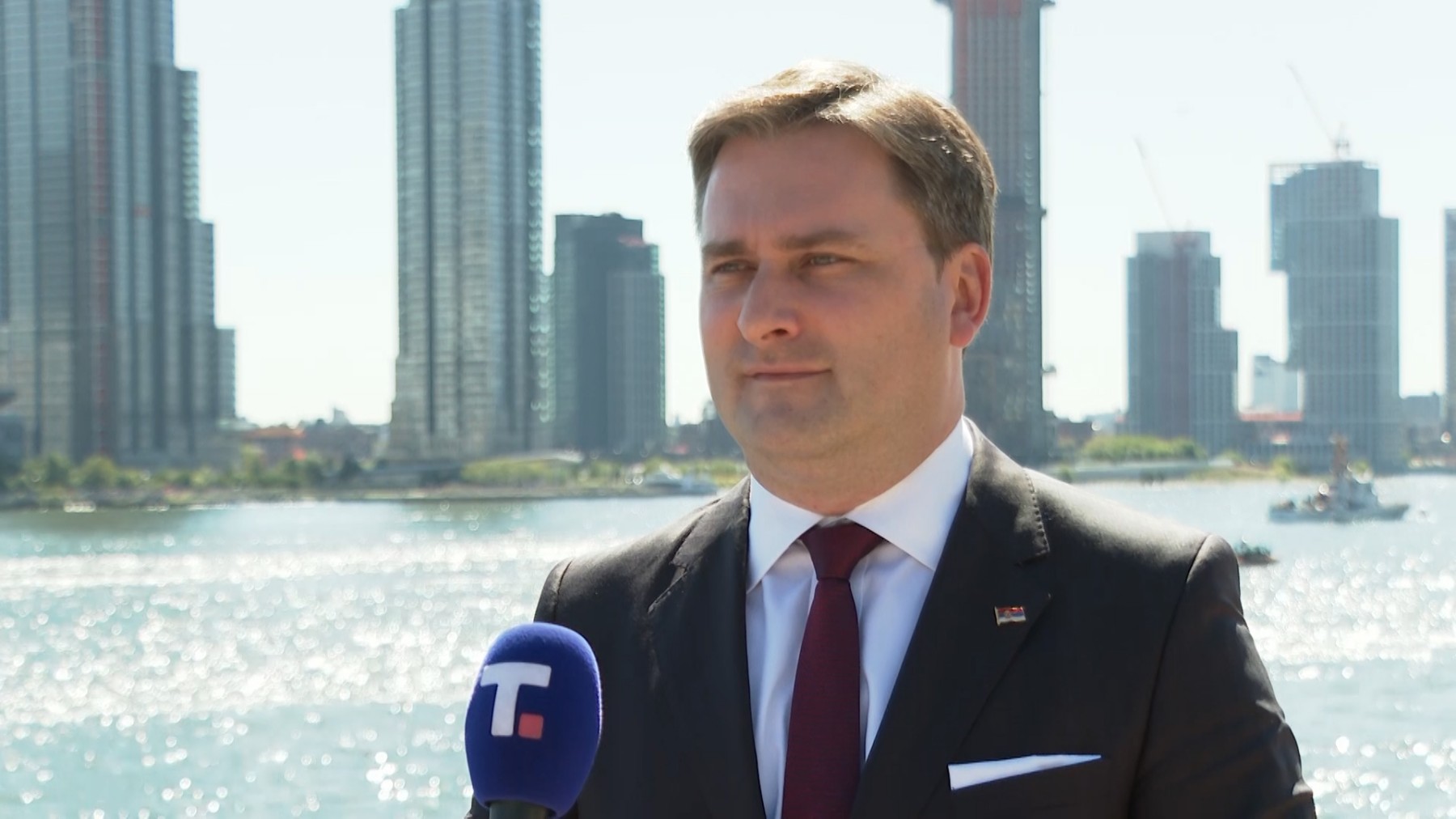
The Serbian Foreign Minister says that he surely used this opportunity, too, to introduce Minister Lavrov to the latest events in northern Kosovo and Metohija, the situation of the dialog between Belgrade and Priština and very clear and unambiguous attitude of President Aleksandar Vučić regarding the continuation of the dialog and subsequent events in K&M.
“We discussed the principled support of the Russian Federation, which is constantly present not just in Moscow, Belgrade, in the field, but also here in the East River, by the delegation of the Russian Federation as the permanent member of the UN Security Council. Of course, we will continue to maintain this type of dialog. What Minister Lavrov said was that we could count on the support of the Russian Federation in future with regards to our interests in K&M”, highlighted Minister Selaković.
He said that he had had the opportunity in New York to hold 33 meetings, of which 28 with ministers of foreign affairs, whom he had introduced also to topicalities related to the latest events in Kosovo and Metohija, but also to our principled position regarding the observance of the international public law, territorial integrity and sovereignty.
Minister Selaković said that his colleagues at the meetings had praised the substantial and fantastic success of Serbia in the consolidation of the economic sphere and transformation of what had been on the edge of collapse and economic disaster seven years before to the fastest growing economy in Europe, which Serbia was in the past two years.
He said that most of his interlocutors had supported our reforms and expressed great respect toward what President Aleksandar Vučić and Serbia had done in the previous period.
Many of them, says the Serbian Foreign Minister, showed great interest in the manner in which Serbia organized the figth against Covid 19.
“It was a great pleasure and pride to represent the Republic of Serbia in all these meetings. Many of my colleagues confirmed their arrival to Belgrade to the Conference on 11th and 12th October, which is dedicated to the 60th anniversary of the foundation of the Non-Allied Movement”, said Minister Selaković.
He emphasized that it was not just the evidence of how much they had cared to come to Belgrade to the conference, but also to see and witness the Serbia which after several decades of attempts to fight different challenges rose to its feed, was economically consolidated and turned towards its traditional friends.
“That is a great deal and our country will surely during October be one of the spots on Earth of greatest importance for multilateralism, for cooperation among the countries which share the same values, the values entered into the UN Charter and which are based on the promotion and fight for peace, equality, observance of the international public law and rights of every country to pursue its path to happiness and better and more ordered society in compliance with the wishes of its population”, said Minister Selaković.
He said that the Minister of Foreign Affairs of Azerbaijan, Jeyhun Bayramov, would come to Belgrade to the conference on the occasion of the Non-Allied Movement adding that we had strategic cooperation with Azerbaijan and frequent contacts.
“We agreed to realize as soon as possible after the Belgrade conference his bilateral visit to Serbia”, added Minister Selaković.
He said that it had been agreed to intensify the cooperation and finalize the agreements which should be signed and after that realized when the meeting of Serbian President Aleksandar Vučić and Azerbaijan President Ilham Aliyev took place.
Minister Selaković says that the Ministry of Foreign Affairs had recently received its sector for economic diplomacy and there were great expectations from it and one of the tasks was to deepen the cooperation with Azerbaijan. |
|
|
| Telephone conversation of President Vučić and General Secretary of NATO |
|
26 September 2021
The President of the Republic of Serbia, Aleksandar Vučić, has discussed today by phone with the General Secretary of NATO, Jens Stoltenberg about, as the General Secretary said, worrisome situation in northern Kosovo and Metohija.
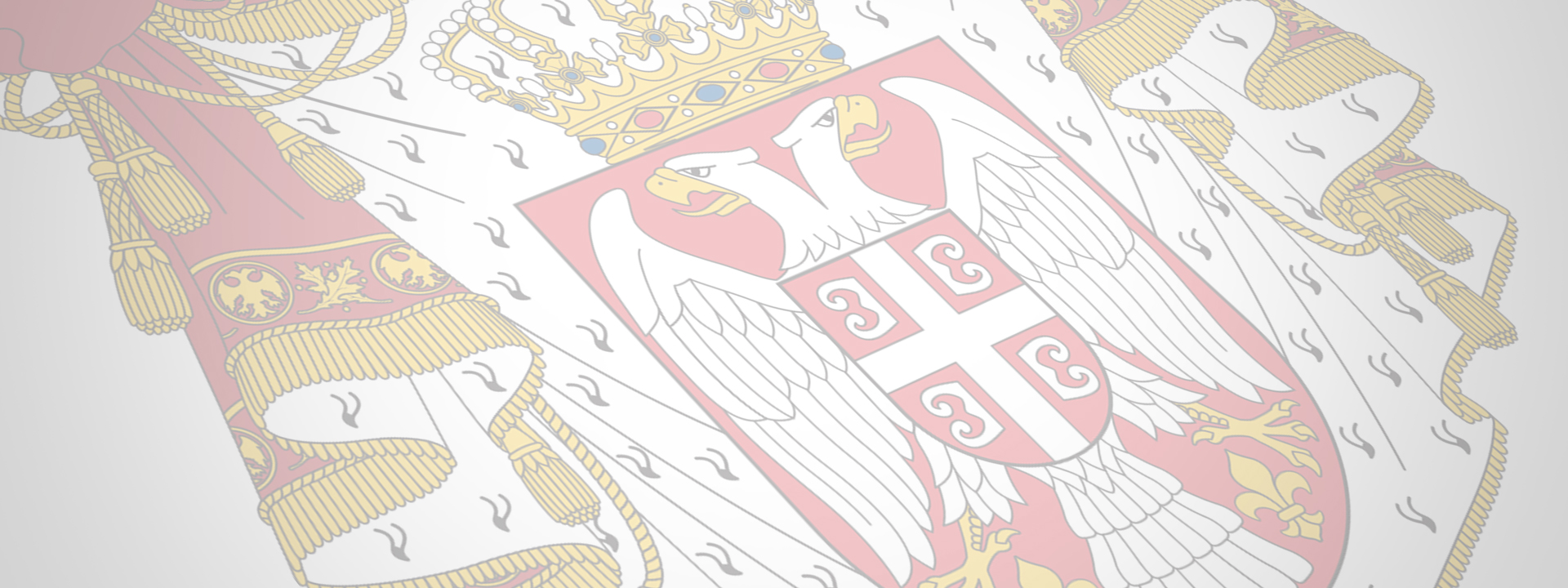
President Vučić said that Serbia had not violated either Brussels Agreement or Resolution 1244 by anything, by any single move or in any manner jeopardized peace preservation.
“The complete occupation by armored vehicles of northern Kosovo and Metohija has lasted for seven days and it is conducted by Priština and everyone in the international community “are thunderously silent”, said Serbian President. “However, everyone is worried all of a sudden when they spot Serbian helicopters and airplanes at the territory of central Serbia, because apparently they should not exist, or should not take off until they receive the approval from Kurti or someone from the international community”, says President Vučić.
Serbia observes all international agreements it signed, Serbia will always conduct responsibly and seriously, but Serbia is still asking when the formation of SMC will start and when Kurti’s armored units will be withdrawn from northern Kosovo and Metohija.
Finally, with the gratitude to General Secretary Stoltenberg for the fair relation and wish to listen to the Serbian side, President Vučić asked about the norm and international regulation violated by Serbia? Today, yesterday or any time?
The two interlocutors agreed to stay in constant touch due to necessity of the preservation of peace and stability in the entire region.
Source/Photo: www.predsednik.rs |
|
|
| Pristina seriously jeopardised regional stability |
|
25 September 2021
Prime Minister Ana Brnabic warned today that Pristina has seriously jeopardised local and regional stability after sending heavily armed special units to the north of Kosovo who are exerting ` against the peaceful Serbian population.
Brnabic spoke at the general debate of world leaders, as part of the 76th session of the UN General Assembly in New York.
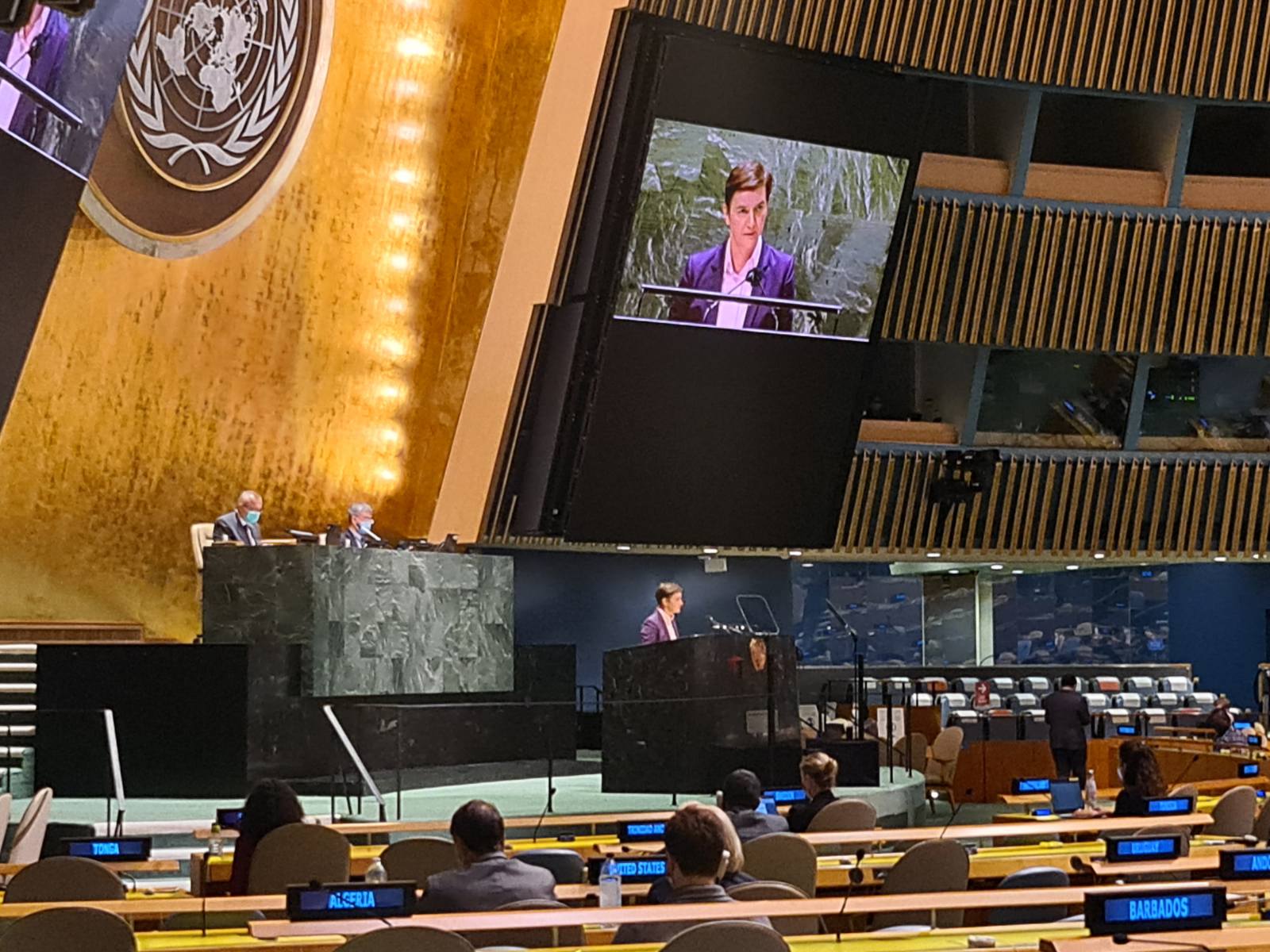
We bring the Prime Minister's speech in its entirety:
Mr. President,
Mr. Secretary General,
Excellencies,
Ladies and gentlemen,
I have the great honor to address you today on behalf of the citizens of the Republic of Serbia.
Esteemed Excellencies Mr. Abdulla Shahid, Mr. Volkan Bozkir and Mr. António Guterres, I would like thank you for the active engagement, dedication, and leadership you have shown during these difficult times for the United Nations and all of humanity.
Serbia shares your conviction and we remain fully committed to supporting your efforts.
This year, we come together at a decisive moment in our history.
Covid-19 has shaken our foundations to the core.
At the same time, we are increasingly witnessing and experiencing effects of climate change.
And, finally, we are seeing significant shifts in global partnerships and alliances, trade wars between traditional partners and allies, protectionism instead of openness and free market, and overall uncertainty at an unprecedented scale.
Some of the pressing and extremely emotional issues that we have locally, in the Balkans, are still unresolved and while we are trying – and Serbia is especially dedicated to this – to change the future by working together and creating alliances, through initiatives such as the Berlin process or Open Balkan, others are trying to disrupt these processes, and instead of focusing on the future, they want to recreate the past – whatever the cost of that may be.
But, let me start with COVID:
COVID-19 pandemic has exposed critical weaknesses in the architecture of global governance. It has threatened to erase the progress many nations have achieved in recent years.
It has placed nations at a junction between isolation and collaboration, between panic and hope, between chaos and order.
The pandemic questioned some of the basic tenets of the open and cooperative international order.
Global exchanges, international communication, cross-border trade have all seen a vast decrease.
Curfews, restrictions on freedom and lockdowns of entire societies have created uncertainty in many segments of the individual lives of our citizens or – for that matter – our own individual perception of what freedom in today’s world even means.
For Serbia, this pandemic threatened to undermine everything we have been doing for the past 7 years, to crush all of the results and accomplishments of difficult reforms we initiated in 2014, and to propel us back to the times of high unemployment, rising public debt, uncontrollable deficit, and overall desperation.
Much as in any other country, COVID-19 has tested our nations’ resiliency and, this time, unlike during the global financial crisis – which was of much more limited scope and incomparable in consequences to COVID-19 pandemic – Serbia stood strong.
The reforms we undertook in the pre-COVID times made us more resilient than ever.
The fiscal consolidation, the budget surplus we had, efficient and predictable investment environment, became a lifeline that saved us from a recession during the pandemic and one that ensured we could support our citizens and our economy during these, most difficult of times.
Despite the effects of the crisis, Serbia has managed to preserve financial and economic stability. In 2020, we recorded a decline in GDP of only 0.9% – one of the best results in Europe. Our public debt remained below 60% of our GDP, average salary continued to grow by almost 10%, while despite the pandemic the number of people employed increased by over 3%.
The recovery in this year has been stronger than expected – our GDP will grow approximately 7%, and perhaps even stronger.
Prior to the pandemic, we have opened our borders to investment, technology, and ideas, and we managed to create peaceful and stable environment that allowed us to pursue rapid domestic transformation, with innovation and knowledge-based economy as the foundation.
The innovative advances we had made allowed us to diversify our capabilities when the virus hit – through e-Government, online education and digital textbooks, or central software system for a successful vaccination rollout.
We invested heavily in health infrastructure and strengthened the health system in order to respond to the current crisis, eternally grateful to the health care workers for their dedicated struggle.
Our decision to put geopolitics aside, and people at the center of our policies, is the reason we were able to acquire vaccines quicker than most other nations.
We did not discriminate between manufacturers, did not care whether vaccines are from the East or from the West, but chose to negotiate with all vaccine manufacturers deemed safe by regulators. This openness gave us the ability to purchase vaccines from around the world, giving our citizens the unique freedom to choose which vaccine they prefer.
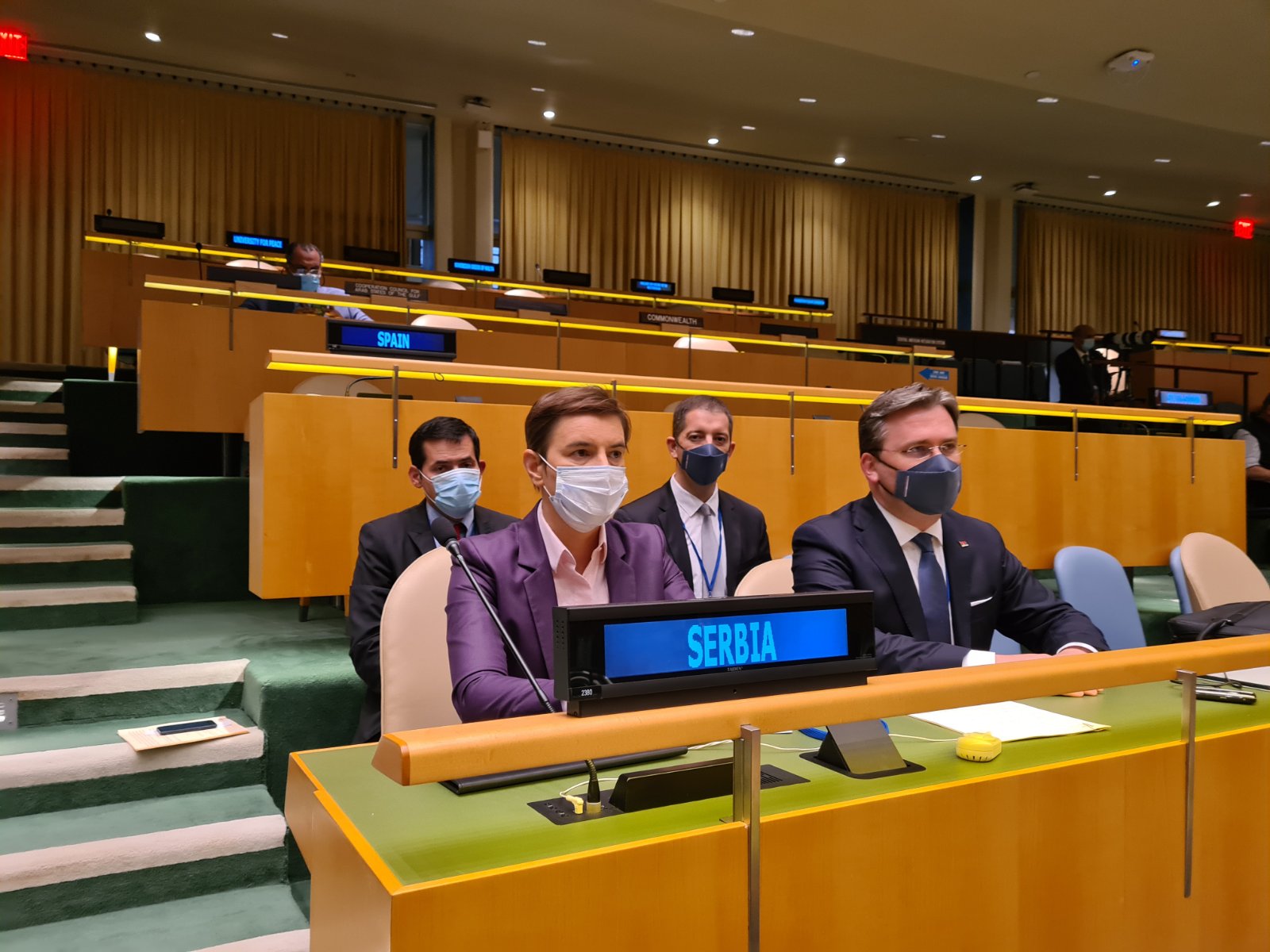
Excellencies,
Serbia believes in solidarity between nations, multilateralism and helping others when in need.
Since the beginning of this year, we have made it our mission to support our neighbors, and all those in need, with COVID-19 vaccines and we have also allowed foreign nationals to come to Serbia to receive the vaccine which will protect their lives.
In total, Serbia has donated or allocated over a million doses of vaccines – of which 230.000 doses to the region; 300.000 doses for foreign nationals which came to Serbia to get vaccinated; and additional 570.000 doses to countries of Africa and Asia.
We will keep doing so, to the greatest extent possible, and until COVID-19 is behind all of us.
That is why we have also taken steps to acquire the technology to produce at least two types of COVID-19 vaccines to help improve global access so we can all be safe and victorious.
However, as stated by dignitaries of some of the largest nations during this General Assembly, there are other pressing issues that all of us need to keep addressing without any delay and in a bold manner – and that is climate change.
Serbia has redoubled its efforts to make our country safer and cleaner for its citizens, and by doing so, contribute to the fight against climate change and for environmental protection.
We are strongly committed to the implementation of the sustainable development goals and the Paris Agreement on Climate Change. We are committed to global efforts and will continue to work actively to meet our obligations under the UN Framework Convention on Climate Change.
We are about to submit our revised Nationally Determined Contributions to contribute to this critical global effort. We have already announced our intention to reduce greenhouse gasses for at least 33.3% compared to 1990, and 13.2% compared to 2010, which we are currently incorporating into our energy and climate strategic documents.
We work strategically on planning and investments in this sector. These investments are extremely expensive, requiring years and decades of commitment and a systemic approach - but we are clearly set on the path of this transformation.
Ladies and gentlemen,
Of all the challenges we face, the most worrisome for Serbia is the maintenance of peace and stability in the southern Serbian province of Kosovo and Metohija.
For more than two decades, we have been constantly drawing international attention to the problems that non-Albanian population is facing in Kosovo and Metohija. Physical safety, respect for and protection of human rights, especially of minority communities, are far from satisfactory.
We are now witnessing a constant increase in the number of attacks targeting Serbs, their property and religious heritage in Kosovo and Metohija.
To illustrate, there were 55 such incidents in 2014, 62 in 2016, 71 in 2020, and 100 since the beginning of this year. The total number of attacks in 2020 has already been surpassed by June of this year.
According to the UN, Kosovo and Metohija is still the territory with the least number of returnees (internally displaced Serbs) of all post-conflict areas in the entire world!
I will give you just a few examples to depict how life of Serbs in Kosovo and Metohija looks like.
On the 11th of May the house of Radoje Pumpalović, 81-years old returnee to Kosovo in the village of Dubrava, in Istok municipality, was attacked. This was the 5th attack on him in the same year. Again… he is 81 years old.
Since June 2021, multiple attacks were carried out against Dragica Gašić, 59-years old woman, the first Serb returnee in Đakovica after 22 years since the end of the conflict. Attacks include stoning of her apartment, banning her from shopping for food in the local store and petitions by civil society organization demanding her eviction from the city.
On 2nd of July, in the village of Gobulji near Vučitrn, a group of Albanians attacked 13-year old Nikola Perić. The attack occurred when he was returning home from the school playground with three friends.
Attacks on Serbian medieval churches, monasteries and monuments in Kosovo and Metohija, make them some of the most endangered cultural heritage sites in Europe.
Monastery Visoki Dečani was recently listed, by Europa Nostra, as one of the 7 Most Endangered Heritage Sites in Europe in 2021. The Advisory Panel of Europa Nostra noted that Dečani is the only monument in Europe under robust military protection for a continuous period of 20 years, although it constitutes a monument of ultimate historical and cultural importance for Europe and the world.
This spiral of violence occurring in Kosovo and Metohija culminated at the beginning of this week. On the pretext of enforcing new license plate rules, Priština dispatched heavily armed special units to the north of the province. This is yet another brutal violation of the Brussels Agreement, and this irrational show of force has ignited a major crisis. It disrupted the supply of food and medication to Serb communities in the north of the province. Local Serbs who peacefully gathered to protest this measure were met with tear gas and police brutality, thus seriously threatening local and regional stability.
Despite of all the challenges and daily provocations, Serbia remains strongly committed to finding a compromise-based solution that will ensure lasting peace and stability.
Dialogue and the implementation of the agreements reached – are the only proper way to resolve all open issues.
However, almost 9 years after reaching the Brussels Agreement, as the 1st agreement on normalization between Belgrade and Priština, the establishment of the Community of Serb Municipalities – the backbone of this agreement – has not yet even begun.
I would like to appeal, once again, to the international community, and especially the European Union, as the guarantor of the Brussels Agreement, to firmly insist that the Provisional Institutions of Self-Government in Priština start implementing all of the agreements reached.
The Republic of Serbia, by defending its sovereignty and territorial integrity, at the same time defends international law, the UN Charter, legally binding UN Security Council Resolution 1244, and the supreme authority of the Security Council when it comes to the preservation of international peace and security.
We attach special importance to the activity of the UN mission in Kosovo and Metohija and expect it to continue to implement its mandate in the Province in accordance with this resolution.
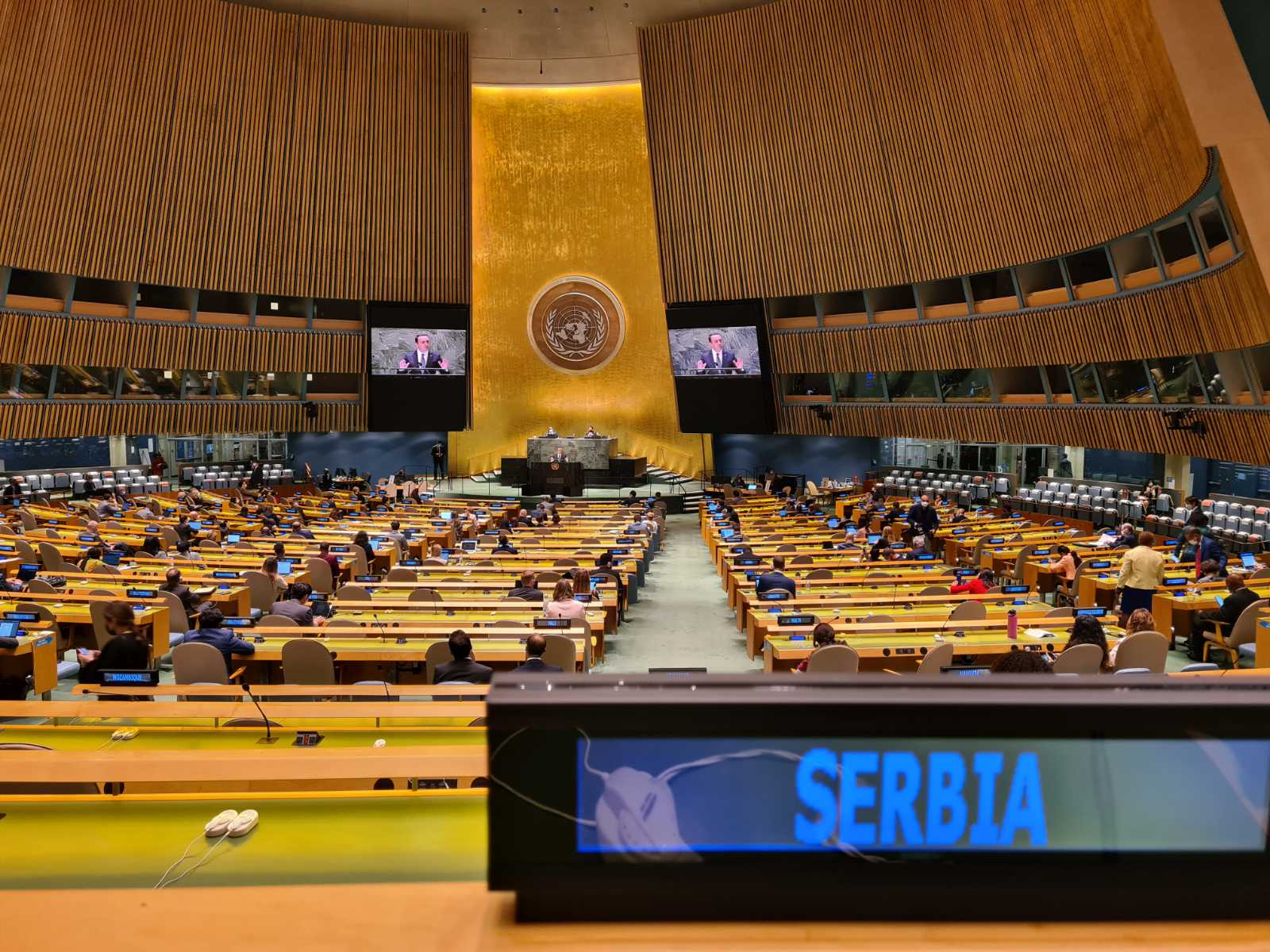
Dear friends,
Our generation shares the common destiny of the modern world, which is becoming increasingly complex in terms of geopolitics, technology, health, climate. In the face of these challenges, Serbia will continue nurturing international partnerships, on a predictable and transparent basis.
We will continue pursuing the rule of law reforms on our EU path, which is our strategic foreign policy goal. We see this as inseparable from achieving sustainable peace, stability and prosperity.
We will host, together with the Republic of Azerbaijan as the current chair of the Non-Aligned Movement, a commemorative high-level event marking the 60th anniversary of the First Non-Aligned Movement Conference, which was held in Belgrade in 1961. We are very much looking forward to hosting our friends from all parts of the world in Belgrade in October this year.
We will further enhance cooperation across the Balkans, through the Open Balkan initiative and Berlin process, by opening borders, harmonizing differences, and further integrating our region.
In conclusion,
Over the past 7 years, Serbia has been transformed: we sparked an economic revival, created opportunities for young people, cultivated a tech boom, and improved Serbia’s position abroad. The progress we have made has allowed Serbia to better face and survive the pandemic.
The world now faces a turning point. The recovery from COVID-19 and sustainable reconstruction will not proceed if issues, new and old, are not handled by joint forces and collaborative international actions.
This pandemic taught us one important lesson: unless all of us are safe, no one is safe – so we can either win together, all of us – regardless of how rich or poor, large or small, from Europe, Asia, Africa, America or Australia, or fail together.
But, if anything, the COVID-19 pandemic, as well as the issue of climate change, should have taught us to stand together.
Thank you.
Source: www.srbija.gov.rs
|
|
|
| Prime Minister Brnabic at Global COVID-19 summit organised by White House |
|
22 September 2021
Prime Minister Ana Brnabic participated today at the Global COVID-19 summit, organised by the White House, which was opened by US President Joseph Biden.
The video messages are attended by a large number of world leaders and officials of international organizations, including UN Secretary General Antonio Guterres, European Commission President Ursula von der Leyen, British and Canadian Prime Ministers, Boris Johnson and Justin Trudeau, German Chancellor Angela Merkel and many others.
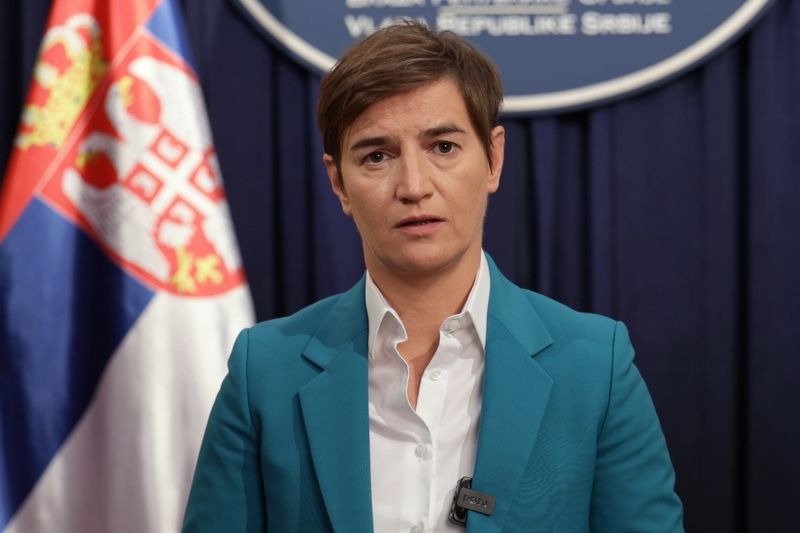
In the message, the Prime Minister pointed out that Serbia was among the first European countries to procure a covid vaccine, and that she was the first European Prime Minister to receive the vaccine.
Thanks to years of investment in digitalisation and development of eGovernment, we have managed to organise a complicated and complex vaccination process very efficiently and in a way that it is focused on citizens, she explained.
However, as she added, from the very beginning we were aware that this is not just a matter of our citizens and only our struggle. In the fight against the COVID-19 pandemic, we are all safe or no one is safe.
That is why, in addition to procuring vaccines for our citizens, we donated vaccines to the citizens of the Western Balkans, but also to other countries, she reminded and specified that Serbia donated 230,000 doses of vaccines to the region, we vaccinated foreign citizens in Serbia with approximately 300,000 doses and set aside we have 570,000 doses of vaccines for countries in Africa and Asia.
Brnabic mentioned that Serbia has already started the production of covid vaccine from one manufacturer, and that it will start production from another by the end of the year, because in that way we want to help and support all people and countries that need vaccines.
This is a pandemic in which we will either win together or lose together, but we must fight together, the Prime Minister repeated.
That is why Serbia supports the goals of this global summit, she emphasised, and expressed her gratitude to the United States of America and President Biden for organising the summit and supporting joint efforts in the fight against the COVID-19 pandemic.
Vaccines are the only way out in the fight against the pandemic, concluded Brnabic.
|
|
|
| Participation of the representatives of the Permanent Delegation of the Republic of Serbia to UNESCO in the plenary meeting of the Non-Aligned Movement in this Organization |
|
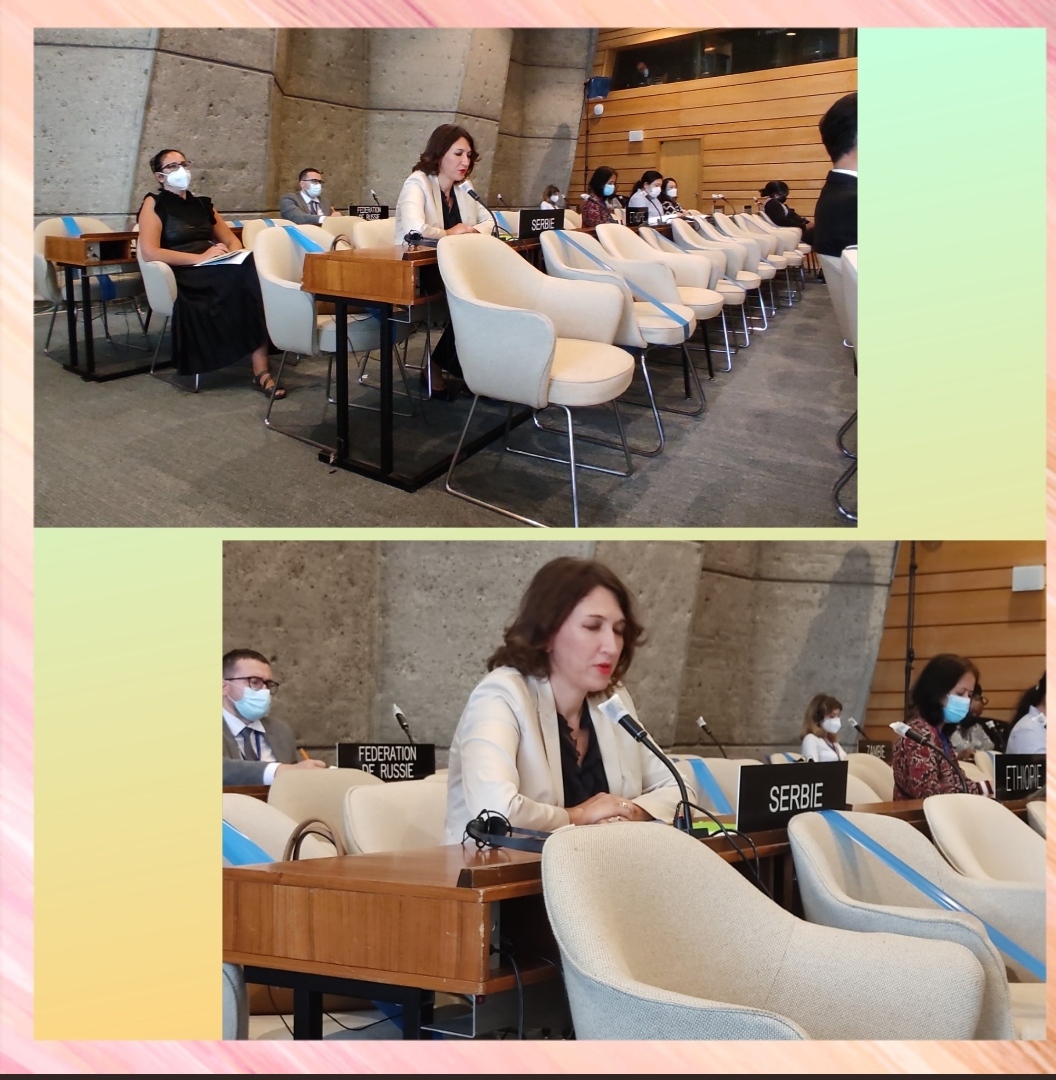
Representatives of the Permanent Delegation of the Republic of Serbia to UNESCO participated on 10th September 2021 at the plenary meeting of the Non-Aligned Movement (NAM) in this Organization. On that occasion, ambassador Tamara Rastovac Siamashvili announced the holding of a high-level commemorative meeting in Belgrade on the occasion of marking the 60th anniversary of the First NAM Summit, which was also held in our capital. The meeting will be held on 11th and 12th October 2021, organized by the Republic of Serbia and Azerbaijan as the current NAM Chair. With references to the historical and current role of NAM and the symbolism of Belgrade as its birthplace, ambassador Rastovac Siamashvili underlined the readiness of the Republic of Serbia to further deepen our ties and cooperation with NAM members and build new bridges between us, including in UNESCO’s field of competences. |
|
|
| Marking the Remembrance Day of all Serbs who died and were expelled in the armed operation "Storm" |
|
5 August 2021
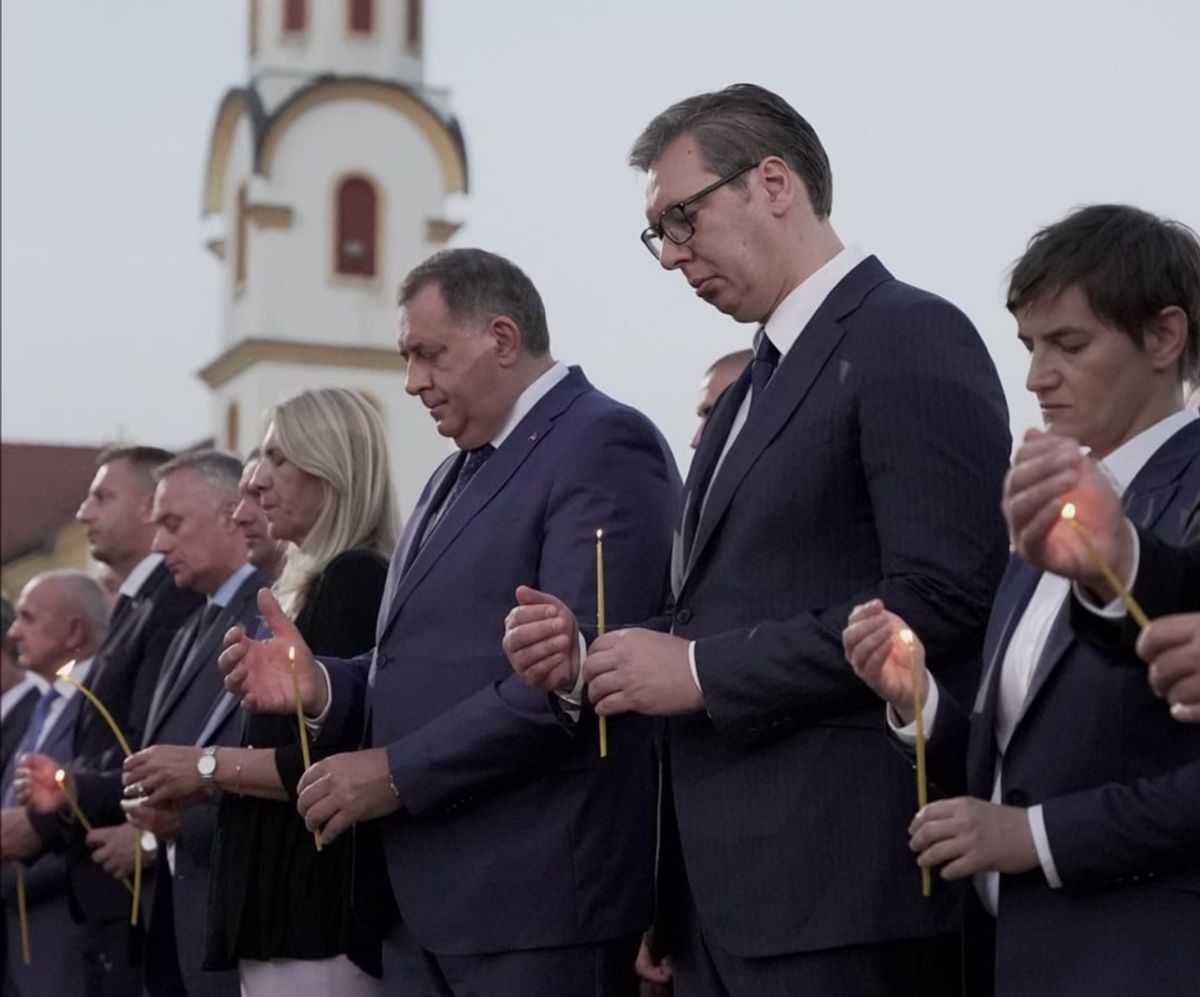
The President of the Republic of Serbia, Aleksandar Vučić, attended the marking of Remembrance Day of all the victims and expelled Serbs in the armed operation "Storm" and said that Serbia remembers!
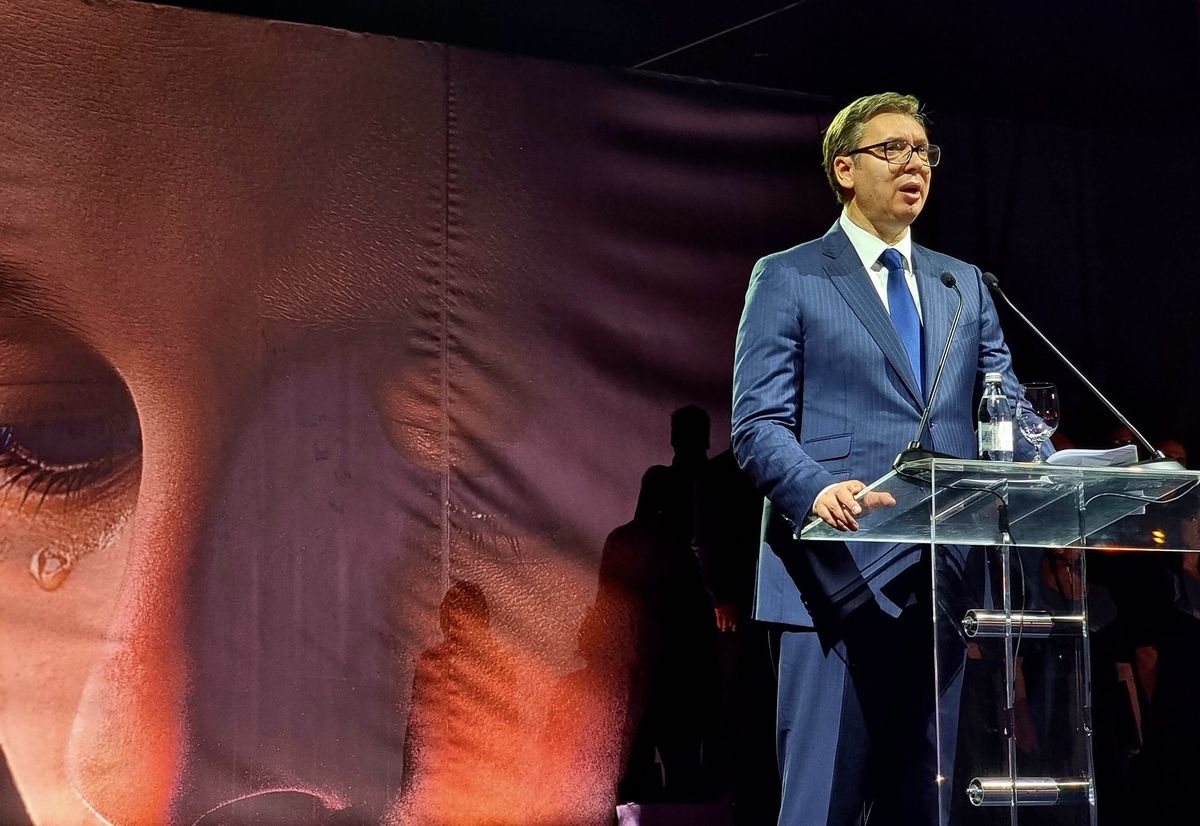
"Today, when we remind ourselves again of what happened in August 1995, the terrible pogrom, the expulsion of more than 250,000 Serbs, the exodus and ethnic cleansing, we, at the same time, and finally, remind ourselves of who we are, what we are, where we come from and where we are going. Thank you all for being here together tonight and for showing how much we love our people", said President Vučić, adding that we will not forget any of the things that the Krajina people had to go through.
"For us, these are not just terrible numbers of victims", said President Vučić and emphasized that Serbia will not forget.
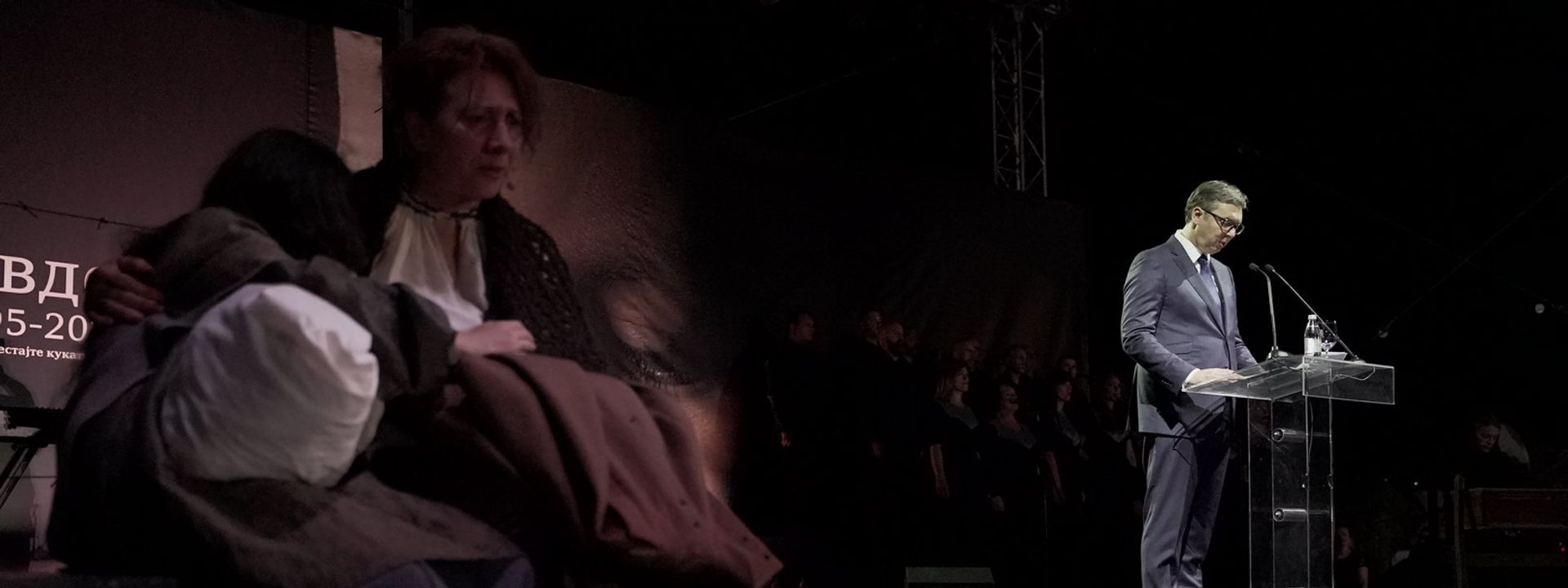
"History has never been rewritten like today. That is why I want to remind us all not only of what others have done to us, not wanting us to exist, but also of what we have done to ourselves, just as if we ourselves did not want to exist", said the President, noting that we must never again allow Serbia to forget its silent heroes.
President Vučić emphasized that we must never again cover our eyes, ears, and mouths in front of something that truly was a pogrom and the downfall of all humanity.
"Pretending that this is not true, avoiding saying it, is a crime not only against the victims, but also against ourselves, every living Serb, people from Krajina, as well as Serbia and its future", said President Vučić and underlined that people can stand up straight and live with themselves and the others without hesitation, fear and doubt, only if they remember.
President Vučić pointed out that Serbia must fight for peace and cradles with children, as well as that not remembering annuls and erases us from the history and the future, depriving us of the right to tomorrow.
"Our mission is a happy future for us and for the new generations! Today's Serbia is based on a clear identity and a culture of remembrance", said President Vučić and reminded that everything that had been neglected for decades had been done, and that a strong Serbia has become the master of its own destiny.
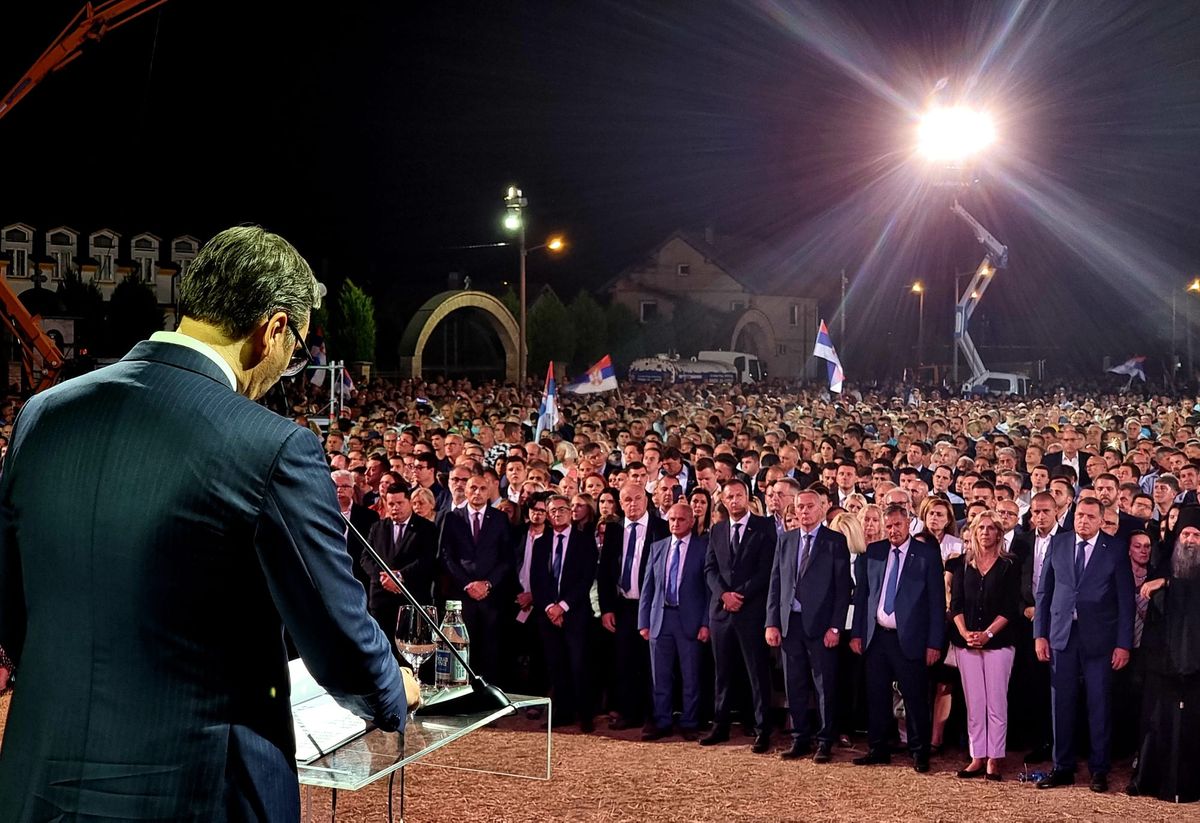
"Eternal glory to you, Serbian martyrs who perished in the "Storm" and all other pogroms. Your children are in their Serbia, taken care of, loved and successful. Sleep peacefully, Serbian falcons, the future of your children is our vow", concluded President Vučić and thanked everyone who showed that night how much they love their country and that Serbia remembers.
Source: www.predsednik.rs
Photo: www.predsednik.rs |
|
|
| Serbia has achieved great success in the field of digitalization |
|
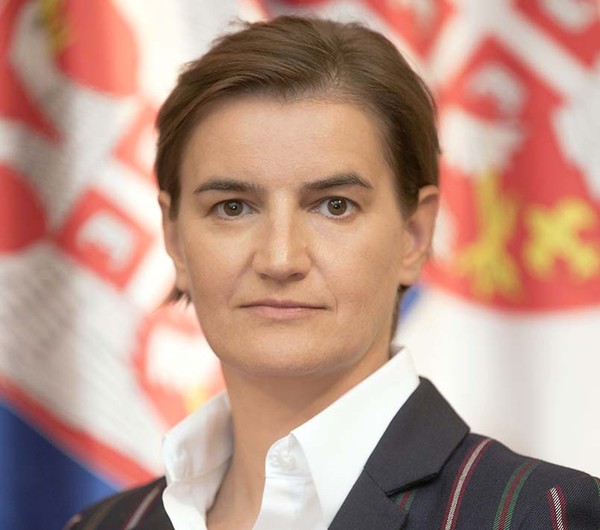
20 July 2021
The Prime Minister of the Republic of Serbia, Ana Brnabić, stated at a gathering dedicated to digitalization and the IT sector, which was held in New York, that since she became Prime Minister, she is most proud of Serbia's success in the field of digitalization.
Brnabić, who is on a two-day visit to the United States, said that when she was elected Minister of Public Administration and Local Self-Government in August 2016, she wanted to do everything to change the public administration and what bothered her as a citizen.
She stated that, when she took office as Prime Minister, she knew what her priorities were and that first of all, digitalization needed to be raised to a higher level, that the education reform was supposed to begin, as well as work on strengthening the economy.
I believed in a country that believes in its people, because the Serbian people are creative. From 1 June 2017, we started working as an e-Government, i.e. we started exchanging data electronically, said the Prime Minister.
According to her, our citizens no longer had to go to, say, the Tax Administration, and since then, the public administration has exchanged 50 million documents, which means that citizens did not have to go from office to office for 50 million papers.
Brnabić pointed out that she is proud of what has been done in the field of education since she became the head of the Government, specifying that in September 2017, programming was introduced as a compulsory subject in primary schools.
Nobody believed that we could do that, but we cooperated with the private sector and some social organizations and we succeeded. At the moment, we are far ahead of numerous countries in Europe and the world, said the Prime Minister.
The Prime Minister pointed out that she was most proud when the cornerstone was laid for the science and technology park in southern Serbia, noting that so far, our country has four science and technology parks.
She pointed out that Serbia has since become one of the most successful countries in the world in the field of technology, and that according to some parameters, it is among the ten countries in the world, or among the five, assessing that this is proof that the country can change quickly.
Answering the question about vaccination, the Prime Minister emphasized that our country has never seen it as a geopolitical issue, but as a health issue.
According to her, Serbia talked with producers from both the East and the West and was among the first European countries to sign agreements with the company Pfizer-BioNTech and Sinopharm.
Unfortunately, many countries have viewed this issue as geopolitical. It did not matter to us, as long as the vaccines were safe, the Prime Minister emphasized and added that this was not the end of Serbia's success, because good organization was also needed.
Brnabić explained that the organization is another important thing in vaccination, because it is a logistically very difficult process, adding that, with the help of digitalization, success has been achieved and that everything we did in the previous years has paid off.
She stated that Serbia quickly established a system through which citizens could express interest in vaccination against the coronavirus and choose which vaccine they wanted to receive, as well as to be informed by a message when to go and get vaccinated.
Now I can log in on my phone, to see how many people have received the vaccine, how many more have registered, so that the effects of digitalization are obvious. We have made everything very efficient and easy for our citizens, the Prime Minister explained.
Answering the question of what she can tell other countries of the world about how to progress faster, Brnabić said that it is important to invest as much as possible in digitalization and education.
You need to teach children how to think, not what to think. Not all children will become IT experts, but what they can learn is an algorithmic way of thinking and how to make decisions, she said.
The Prime Minister mentioned investing in high-speed internet and providing infrastructure for start-ups as an important thing for progress, because more and more economies will be based on start-ups and innovations, emphasizing that people should be helped to start companies and implement their ideas.
Speaking about social networks, she pointed out that fake news has become the biggest problem on these networks and that it will remain so for some time.
This is the biggest challenge I face as Prime Minister, especially during the corona virus pandemic, she said, adding that social networks are also a great opportunity for politicians to communicate with citizens.
Source: www.srbija.gov.rs
Photo: www.srbija.gov.rs |
|
|
| President Vučić: We have decided – our goal is the EU, but China is an important partner |
|
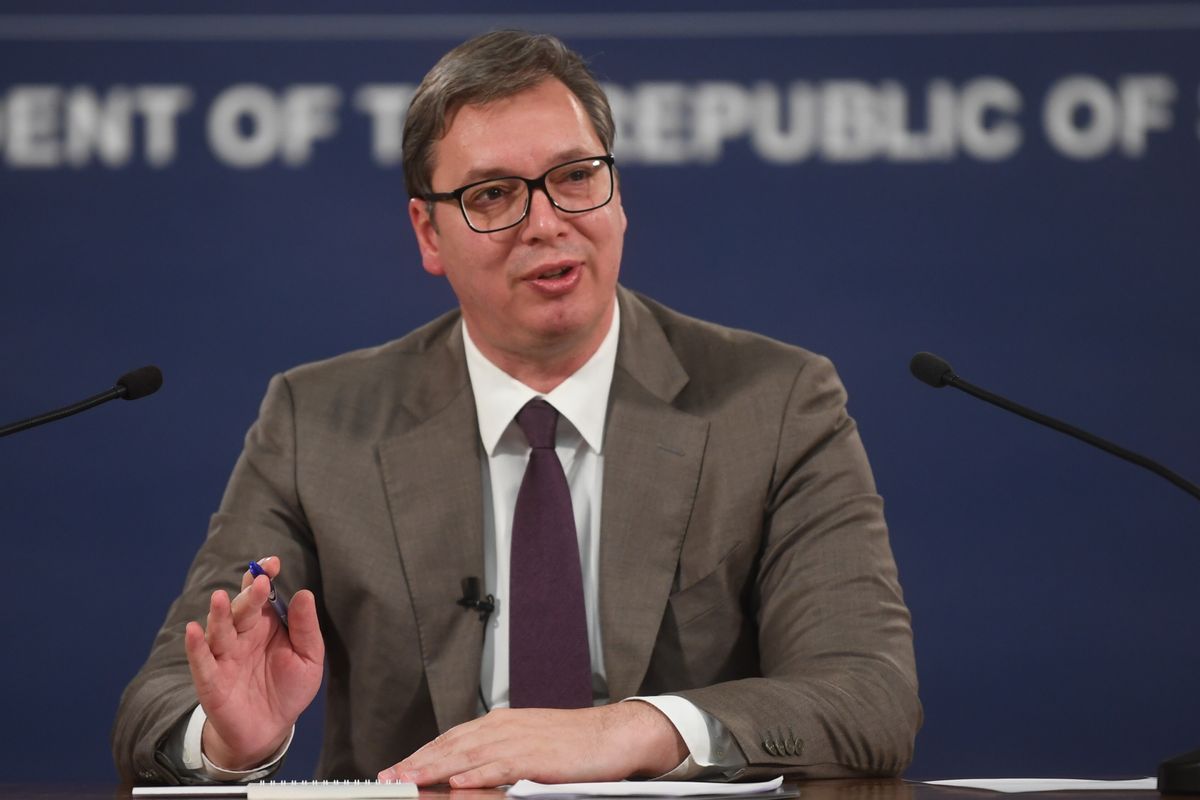
22 July 2021
We have decided – our goal was and remains the EU, Serbian President Aleksandar Vučić said in an interview with the German daily "Handelsblatt", adding that there is no alternative for Serbia, but also stressing that China is an important partner for Serbia, and that the task of the state is to take care about the interests of its citizens.
He thus answered the question of what Serbia will choose once it has to choose between close relations with Beijing or the EU. Vučić emphasized that Serbia wants to become a full member of the EU.
"We are connected by history, common culture, EU members are already undoubtedly our most important partners", he explained and added that the trade exchange between Germany and China is 3,000 times higher than between Serbia and China, and, as he noted, even despite that, Serbia's business operations with China are portrayed as a problem.
To the statement that the German Chancellor Angela Merkel did not congratulate the 100th anniversary of the Communist Party of China, and that he did so, he replied that Serbia is not Germany, but a small country. On additional insistence on what Serbia will do if it has to choose between the EU and China, he underlined that Serbia has already decided, that its goal was and remains the EU membership.
"Our biggest investors are from the EU. The EU accounts for 67% of our trade while 17 percent of the trade is with countries of the region that are all on the way to the EU. We cannot survive without the EU", he added.
"But can we do a lot of good things with China – of course. And we do that, just like Germany does", Vučić pointed out, and to the remark that the quality of the Silk Road projects was being criticized, primarily because of Chinese workers, he answered that the quality of roads or bridges, which Serbia is building with China, is excellent.
"We give jobs to those who submit the best offer to us. That is why I tell Europeans who criticize Chinese projects in our country – offer us a project for one euro more and you will get it", he emphasized.
In that regard, he pointed out that Serbia is building a railway to Northern Macedonia with 600 million euros of EU aid, stating that that offer was better than China's.
"There is often talk of a 180-kilometer railway to Budapest through the territory of Serbia, which is financed by China. But the railway that is being built with the help of the EU from Belgrade to the northern Macedonian border is twice as long and no one is talking about it. It is all too political", he stated.
Asked whether he welcomes the plans of the EU and the USA regarding an alternative initiative to the Silk Road, Vučić said that he supports everything that brings advantages to our region.
"The Chinese want to expand their presence everywhere, but many processes in the West are, frankly, more efficient and without problems. We still have a lot to learn from the West, but we are getting there", Vučić said.
He pointed out that China was an important partner for Serbia and added that when the consolidation of state finances began in 2014, our country received good conditions from China for development projects.
He also stated that a competition for a copper mine was announced in eastern Serbia, at the request of the EU, that no European company had made an offer for six months, and that it had then been taken over by the Chinese.
"Our job is to take care of our people", he said.
He reminded that the Serbian economy grew by 52% in eight and a half years, which for the EU means that Serbia could be a strong member and engine for the entire region.
Explaining how Serbia is developing so well economically, he pointed out that Serbia has an excellent workforce, which speaks English, that society and administration are digitalized, and that it has the most flexible labor law in Europe, as well as consolidated public finances.
He reminded that previously the public debt was at 78% of GDP, and that today it has been reduced, thanks to the strong growth of the economy, to 52%.
"We can afford to give investors an incentive to come", he added, emphasizing that Serbia offers investment assistance, but that, for example, subsidies were not the motive for the arrival of the development center of the company Continental.
He pointed out that, five or six years ago, only Serbia started using the dual education system in this region, which Germany, Switzerland and Austria also use, that tens of thousands of people are in dual education, and that this is appreciated by foreign investors, who, in addition, can work closely with universities as well.
Germany, he stated, is the most important trade partner and the largest investor.
We started with the arrival of small textile companies from Turkey, and now primarily large German companies are coming. Today, 71,000 people work in German companies in Serbia", he explained.
Vučić said that the European perspective is very important for investors, stating that Nidek, Toyo Tires or Mitsubishi are coming from Japan to Serbia because our country is on a stable European path.
Asked if he believes that Serbia will become an EU member in the foreseeable future, he said that he does not complain.
"It is certain that if we had received 45 billion euros of EU aid, we would have been much further economically. Instead, we received 1.6 billion euros from the EU. We are used to achieving our successes on our own", said Vučić.
The President of Serbia reminded that in Croatia, salaries used to be 2.2 times higher than in Serbia, and today they are only 1.7 times higher.
"We are closing the gap with our own efforts. If we were to become a member of the EU, then we would certainly not ask for the biggest subsidies", he assures.
He said that the Serbian path follows the German path to Europe, and that Serbia wants a fair chance.
"I believe Merkel's words. She is at the end of her term and I would not have to praise her anymore. But she gave us stability, freedom of travel to the EU, helped us with the migrant crisis in 2015, and asked the Minister of Economy Altmeier and others to work closely with us", he reminded.
Asked if there were any indications that the new German government would support Serbia in the same way, Vučić expressed confidence that it would be the same.
"I know Armin Laschet, I talked to him while he was the Minister-President of North Rhine-Westphalia. He is very smart and understands the situation in the Balkans, and he will certainly continue Merkel's policy towards our region as the new chancellor", he added.
Vučić also expressed his belief that Russia, if Serbia's accession to the EU were concretized, would not react similarly as in the case of Ukraine, as this is a sovereign decision of Serbia.
To an additional question in this regard, Vučić pointed out that whenever he met with Vladimir Putin, and there were 18 or 19 meetings, he told him that he was grateful for the traditionally close friendship with Russia, but also that Serbia is on a clear course towards the EU.
"He asked if it was our choice and I answered that EU membership is indeed our goal", he added.
When it comes to "Kosovo", Vučić emphasized that a compromise is needed regarding this issue.
"Only in this way can there be sustainable peace. Serbia wants peace, me as well. Let's stop with the madness of the past. Only then can the whole region become the engine of new growth for Europe", said Vučić.
Source: Tanjug
|
|
|
| Participation of ambassador Tamara Rastovac Siamashvili at the event on World Heritage Education Towards a Sustainable Future |
|
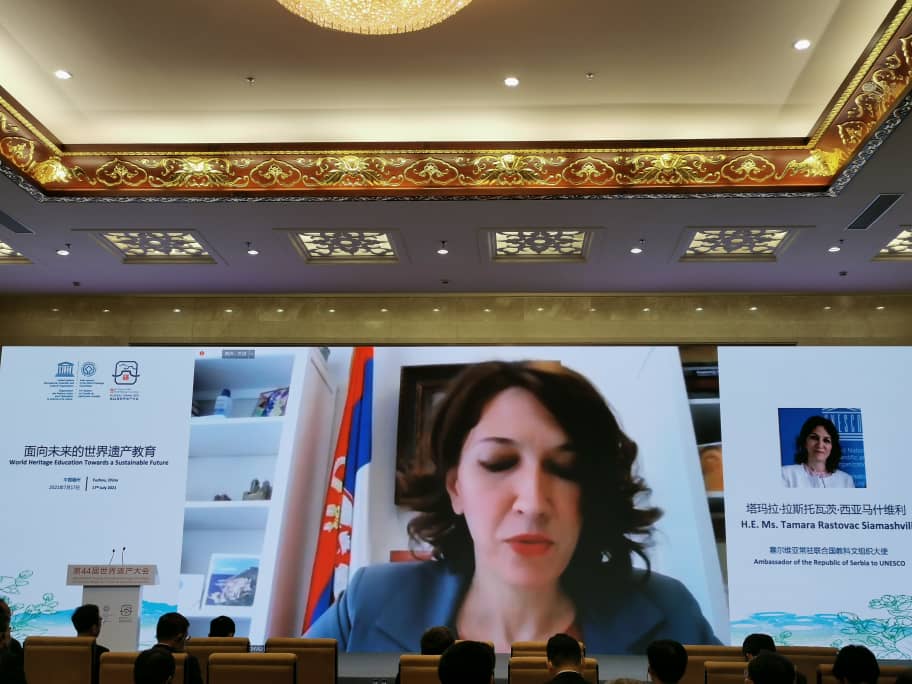 On 17 July 2021, ambassador Tamara Rastovac Siamashvili participated at the event on World Heritage Education Towards a Sustainable Future on the sidelines of the Extended 44th session of the World Heritage Committee. The event was organized by the Ministry of Education of the People's Republic of China, the National Commission of this country for UNESCO and the UNESCO Culture Sector. Ambassador Rastovac Siamashvili spoke at a high-level panel, which was attended also by the Ministers of Education of China, Ethiopia and Pakistan, Minister of Higher Education and Scientific Research and the President of the Egyptian National Commission for UNESCO, Deputy Ministers of Education on Namibia and Thailand, Deputy Permanent Secretary in the Ministry of Education of Tanzania, ambassador of Cuba to UNESCO, Deputy Director of the UNESCO World Heritage Center and representative of Fuzhou municipality government. The event was opened by the Chairperson of the Executive Board of UNESCO, the Deputy Director - General of UNESCO and the Chairman of the Extended 44th session of the World Heritage Committee (Vice Minister for Education of China and Director of the National Commission of China for UNESCO). On 17 July 2021, ambassador Tamara Rastovac Siamashvili participated at the event on World Heritage Education Towards a Sustainable Future on the sidelines of the Extended 44th session of the World Heritage Committee. The event was organized by the Ministry of Education of the People's Republic of China, the National Commission of this country for UNESCO and the UNESCO Culture Sector. Ambassador Rastovac Siamashvili spoke at a high-level panel, which was attended also by the Ministers of Education of China, Ethiopia and Pakistan, Minister of Higher Education and Scientific Research and the President of the Egyptian National Commission for UNESCO, Deputy Ministers of Education on Namibia and Thailand, Deputy Permanent Secretary in the Ministry of Education of Tanzania, ambassador of Cuba to UNESCO, Deputy Director of the UNESCO World Heritage Center and representative of Fuzhou municipality government. The event was opened by the Chairperson of the Executive Board of UNESCO, the Deputy Director - General of UNESCO and the Chairman of the Extended 44th session of the World Heritage Committee (Vice Minister for Education of China and Director of the National Commission of China for UNESCO). |
|
|
| Address by the President of the Republic of Serbia at the session of the United Nations Security Council |
|
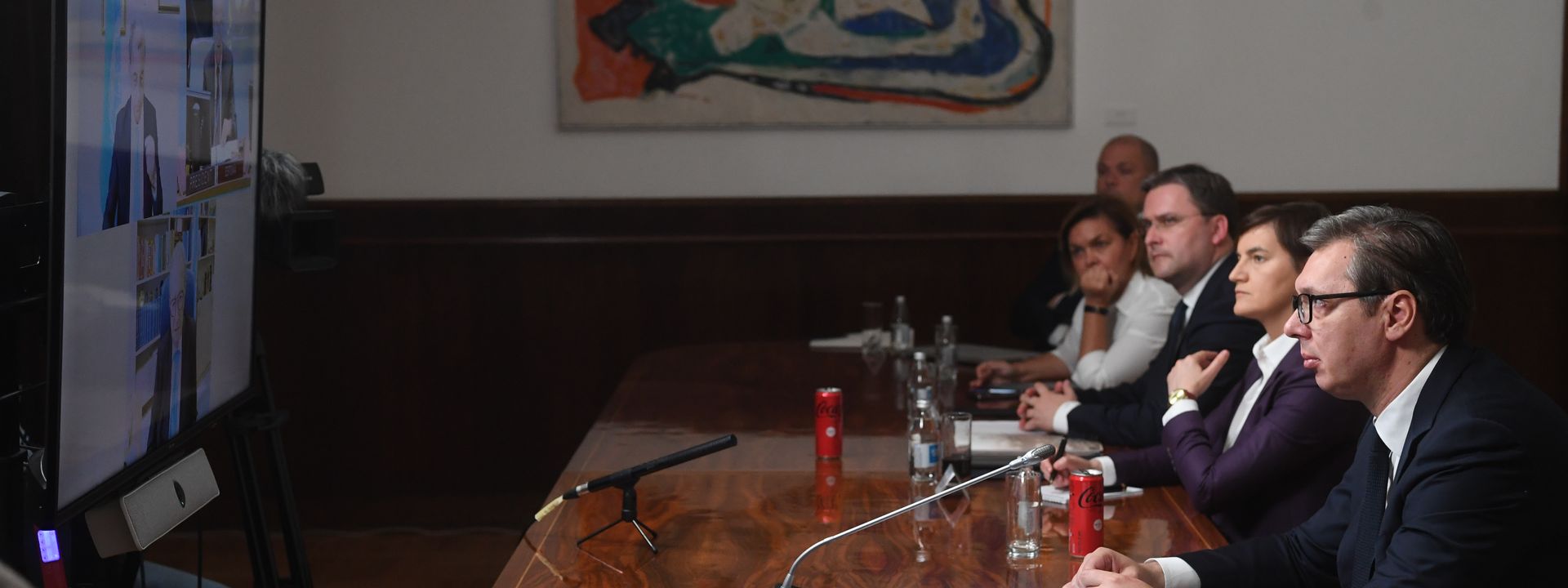
Dear Mr. President, ladies and gentlemen, members of the delegations
I would point to a few ongoing issues in my speech that refer to the competences of the Mechanism, namely, the possibility of serving the sentences passed by the ICTY and Mechanism in the Republic of Serbia, with the current practice of disabling early release of the sentenced persons as well as obligation of the Mechanism regarding protection of sentenced persons.
The second part of the speech will be dedicated to issues that are opened by the six –month Report on the work of the Mechanism by Mechanism President Mr. Agius and Report by the Chief Prosecutor Mr. Serge Brammertz, especially regarding current cooperation of the Republic of Serbia and the Mechanism. |
|
|
| Election of the Republic of Serbia to the membership of the Intergovernmental Committee for the Protection and Promotion of the Diversity of Cultural Expressions |
|
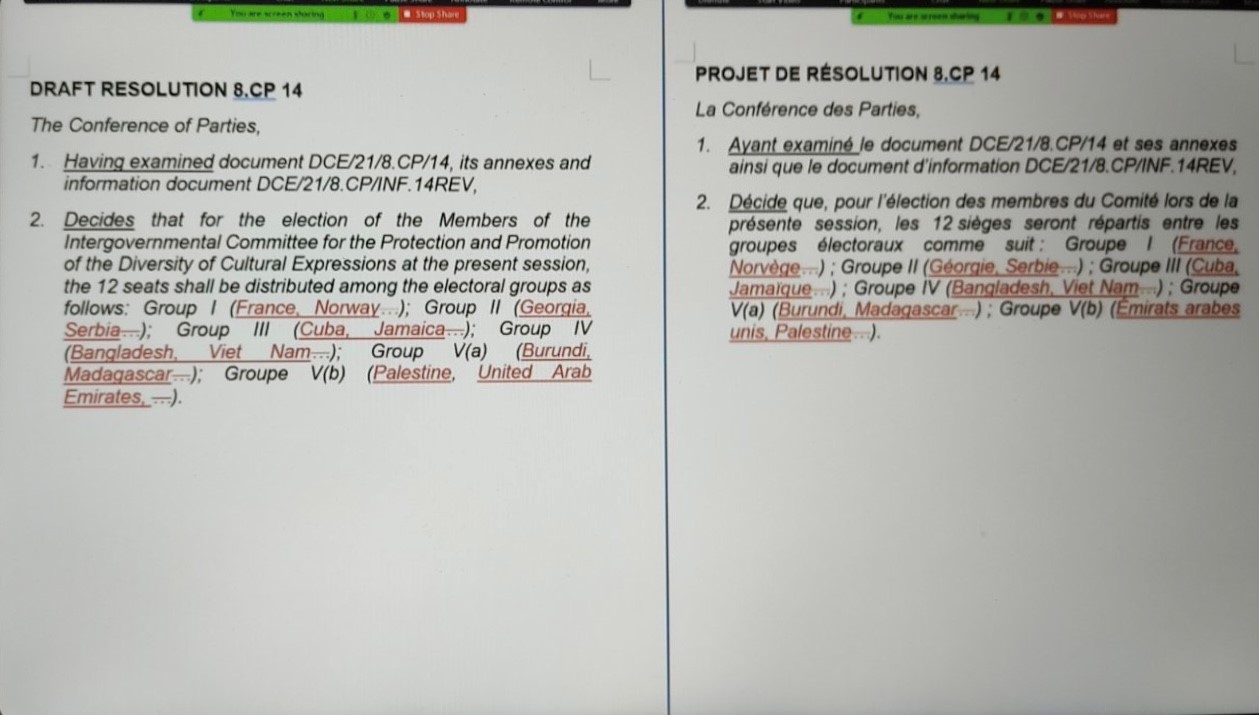
At the 8th Conference of the States Parties to the Convention on the Protection and Promotion of the Diversity of Cultural Expressions, on 4th June 2021, the Republic of Serbia was elected as a member of the Intergovernmental Committee for the Protection and Promotion of the Diversity of Cultural Expressions, with a mandate from 2021 to 2025.
The Republic of Serbia is strongly committed to this Convention and since 2009, when ratified it, has made great efforts to achieve its goals, such as creating stimulating conditions for the development of creative industries and initiatives of civil society organizations in the field of culture, development of participatory cultural policies, strengthening of international cultural cooperation, promotion of artistic freedoms and gender equality policies, as well as making various forms of cultural expressions more accessible, including through their digital presentation.
Through membership in this important body, the Republic of Serbia will continue to promote and actively contribute to the implementation of the Convention on the Protection and Promotion of the Diversity of Cultural Expressions. |
|
|
| Participation in the “Africa Week” at UNESCO |
|
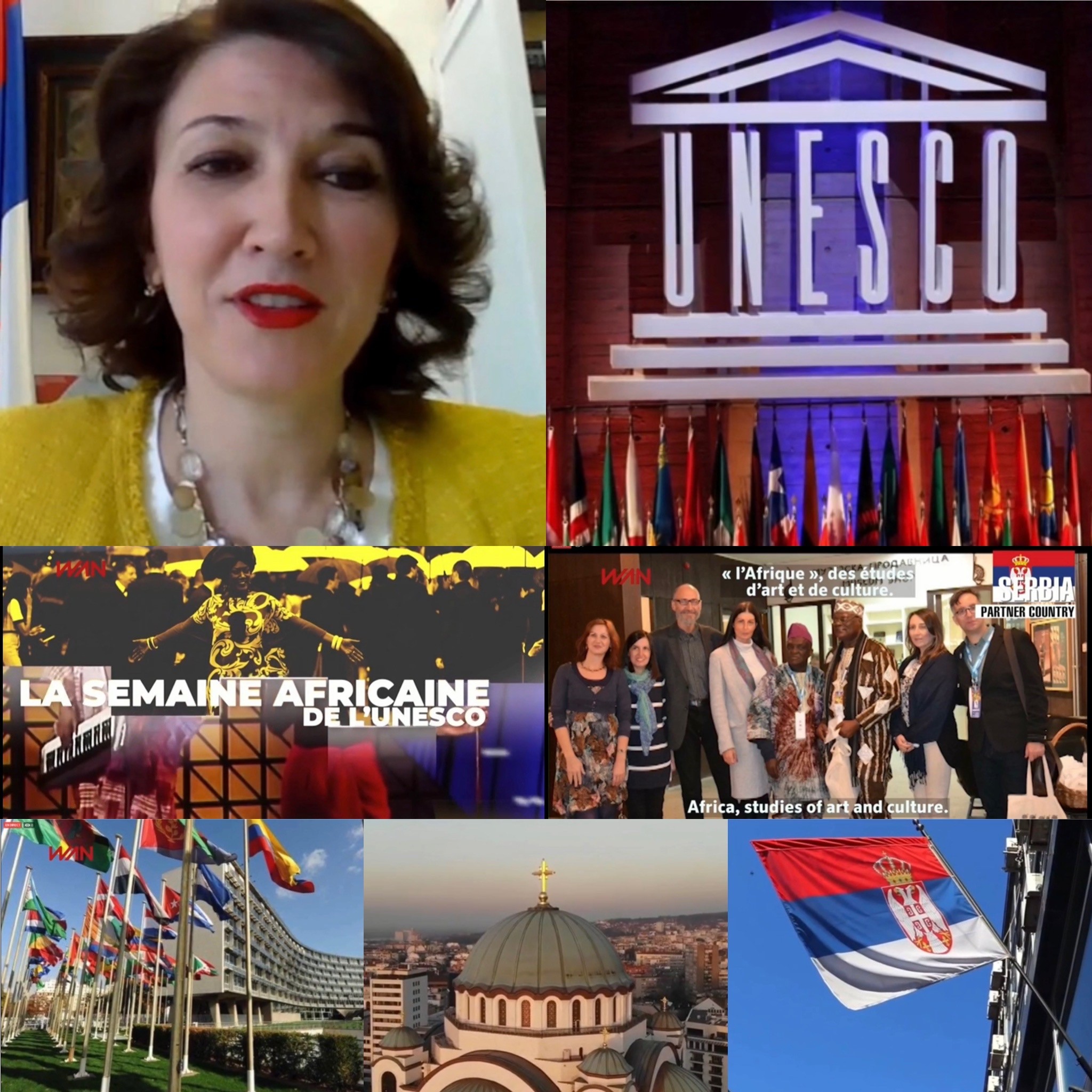
The Republic of Serbia is pleased to have taken an active part in this year's celebration of "Africa Week" at UNESCO in virtual format (25-29 May). As part of this event, which was financially supported by the Republic of Serbia, the Permanent Delegate to UNESCO, ambassador Tamara Rastovac Siamashvili, spoke on the topic of cooperation between Serbia and African countries.
On that occasion, she emphasized the importance and value of the long-standing traditional friendship between Serbia and African countries, as well as our commitment to further deepening comprehensive cooperation in all areas, from economy, education, culture to science. She also stated that Africa Day coincides with the Day of Friendship with the Peoples of Africa, which is celebrated every year in Serbia. She underlined that for us, this day is, above all, a symbol of a sincere desire to build and nurture relations with Africa. She emphasized that Serbia is strongly committed to the activities that UNESCO is carrying out in African countries and its Global Priority Africa. Video material about the Museum of African Art in Belgrade was also shown. |
|
|
| Virtual Conference "Contemporary Art of Africa in the Era of the Pandemic" |
|
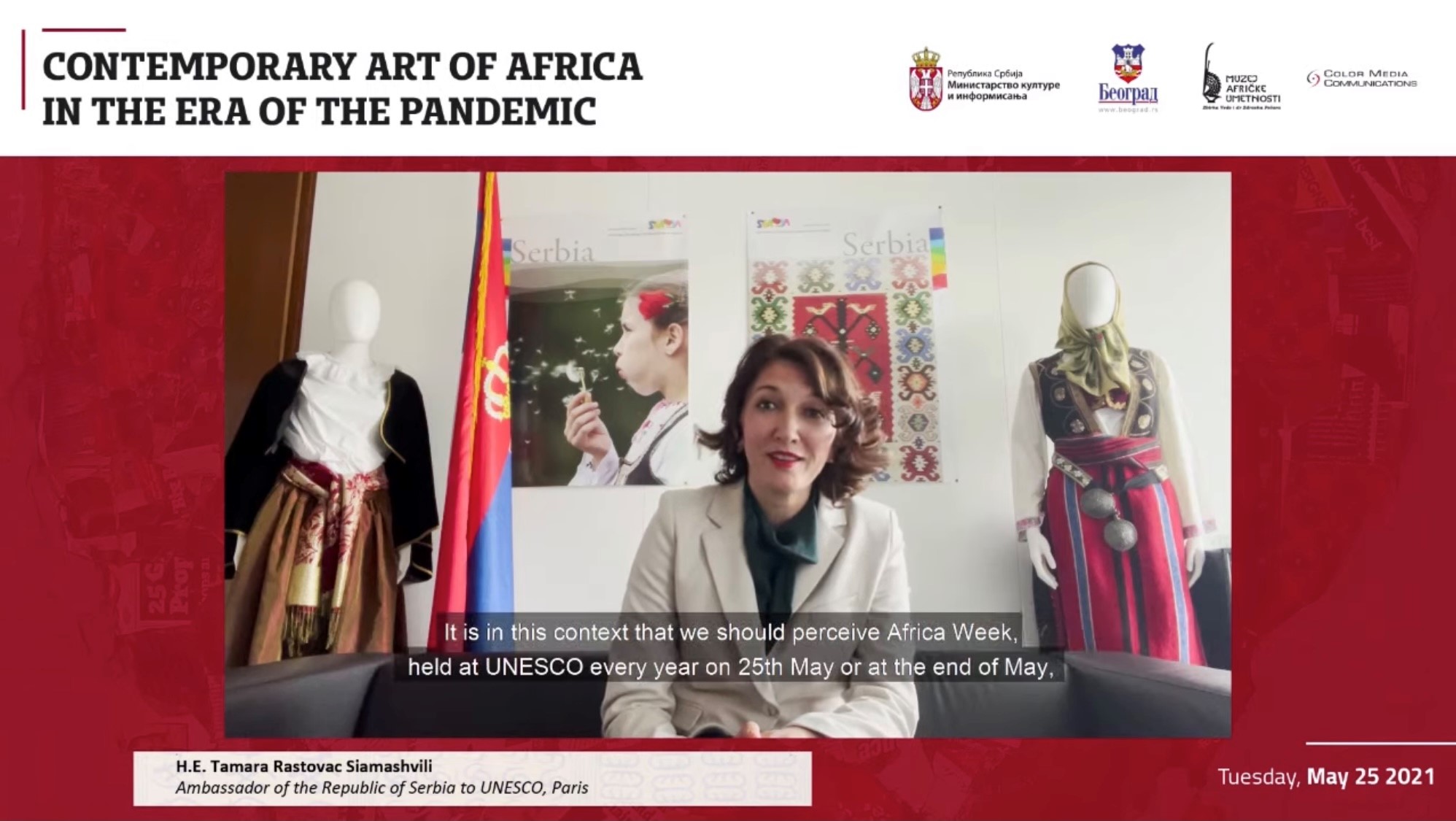
Ambassador Tamara Rastovac Siamashvili participated in the virtual conference "Contemporary Art of Africa in the Era of the Pandemic", organized on 25th May 2021 by the Museum of African Art in Belgrade and Color Media Communications on the occasion of Africa Day. She presented the activities of Serbia in UNESCO in connection with UNESCO’s Global Priority Africa, as well as the organization of "Africa Week". |
|
|
| Minister Selaković presented the new e-Consulate service |
|
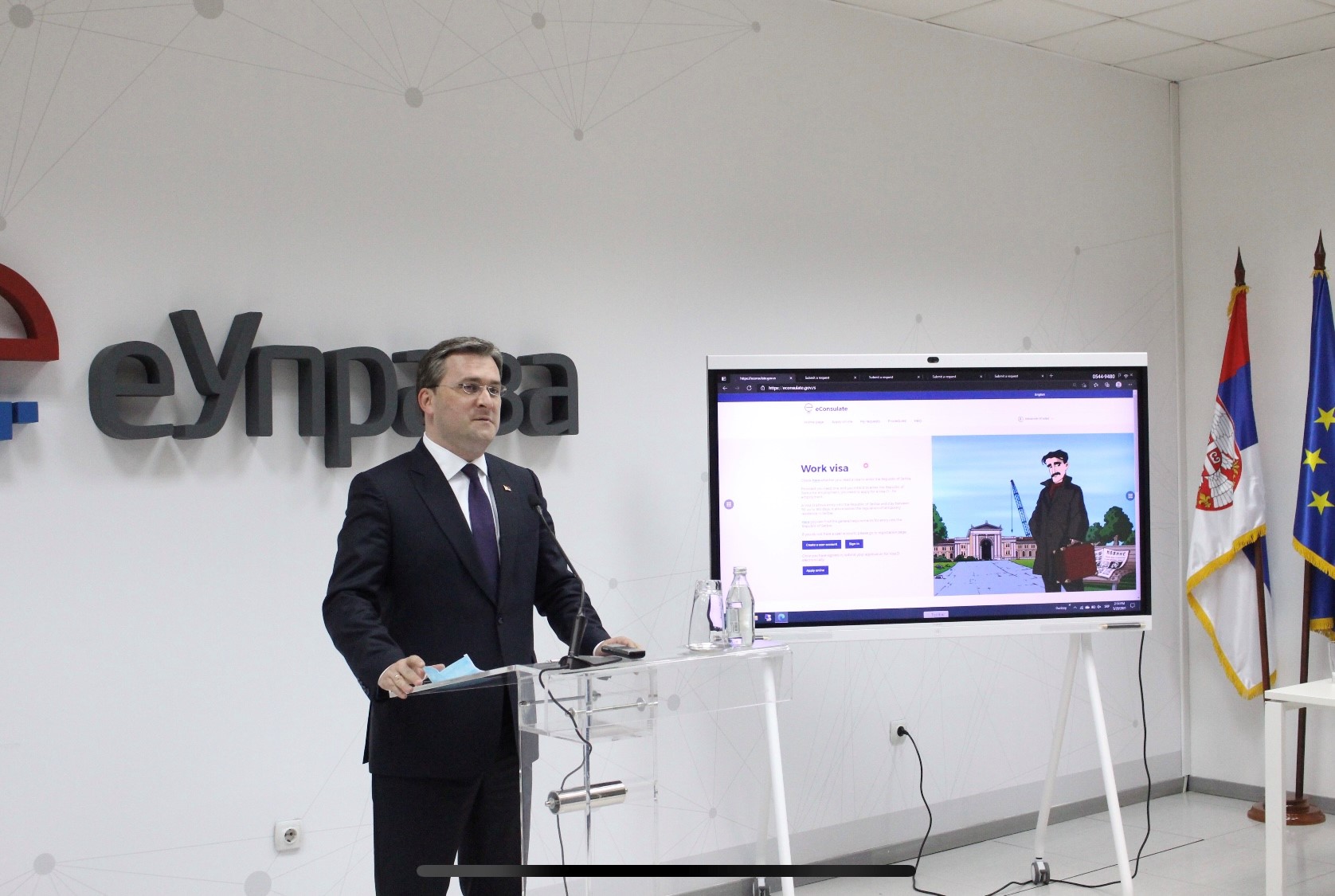 A new service of the Ministry of Foreign Affairs "e-Consulate" was presented in Belgrade today, intended for foreign citizens who apply for a visa and aspire to come to Serbia to work. A new service of the Ministry of Foreign Affairs "e-Consulate" was presented in Belgrade today, intended for foreign citizens who apply for a visa and aspire to come to Serbia to work.
On that occasion, Minister of Foreign Affairs of the Republic of Serbia Nikola Selakovic said that this service was one of the indicators of good development of our country, which, as he pointed out, was becoming a magnet for serious foreign companies, which brought a large number of workers from other countries to work in Serbia.
"Not to be pretentious, but completely realistic, this service represents a turning point in the functioning of our system. E-Consulate and digitalization of the procedure for issuing work visas for foreign citizens who want to work in Serbia, is the first electronic service offered by the Foreign Ministry, and I can promise you that this is indeed our first, but by no means the last e-service", Selakovic emphasized. |
|
|
| Statement by Minister of Foreign Affairs Nikola Selakovic |
|
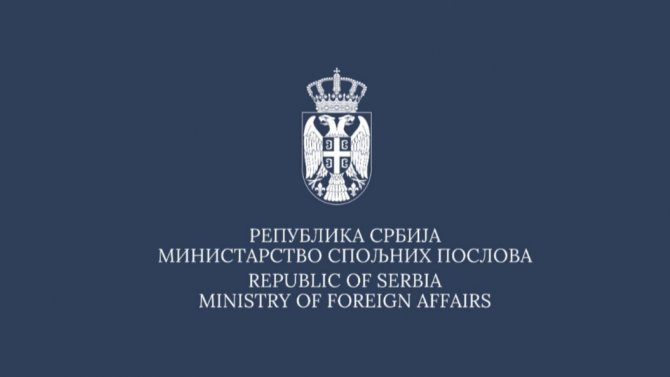 The Visoki Decani Monastery is one of the greatest Serbian holy sites and, sadly, one of the most endangered monuments of world culture in Europe and in the world, and the fact that the provisional institutions in Pristina request from the "Europa Nostra" organization to remove it from the UNESCO list of seven most endangered cultural heritage sites in Europe, speaks volumes about their intentions. The Visoki Decani Monastery is one of the greatest Serbian holy sites and, sadly, one of the most endangered monuments of world culture in Europe and in the world, and the fact that the provisional institutions in Pristina request from the "Europa Nostra" organization to remove it from the UNESCO list of seven most endangered cultural heritage sites in Europe, speaks volumes about their intentions.
That something is not in danger is proven by actions and not by calls on Twitter or political pressures. This is especially not proven by confiscating 24 hectares of monastery property, building a highway next to the monastery despite a court decision, armed attacks, terrorist graffiti on the monastery walls or verbal threats to the brotherhood.
The Visoki Decani Monastery and the brotherhood of Abbot Sava Janjic are constantly receiving threats, and this is the most frequently attacked site of the Serbian Orthodox Church in Kosovo and Metohija despite being under constant protection of KFOR forces. The very fact that the monastery is constantly guarded by KFOR personnel speaks volumes about the assessment of the United Nations and their military mission in Kosovo and Metohija about the level of threat to the monastery itself. After all, the reports of UNESCO, the State Department and other institutions and organizations testify to that.
The state of Serbia will continue to help the Visoki Decani Monastery, and all other churches and monasteries in the Diocese of Raska and Prizren in Kosovo and Metohija, but also to point out to the world, in UNESCO and at every opportunity, that the Serbian and world cultural heritage is endangered in territory of our southern province.
The Visoki Decani Monastery is without a doubt a part of the Serbian and world cultural heritage which has a special significance and exceptional value for Serbia, and our state will use all possible diplomatic and legal mechanisms to protect it. |
|
|
| Meeting of Electoral Group II with the Director General of UNESCO |
|
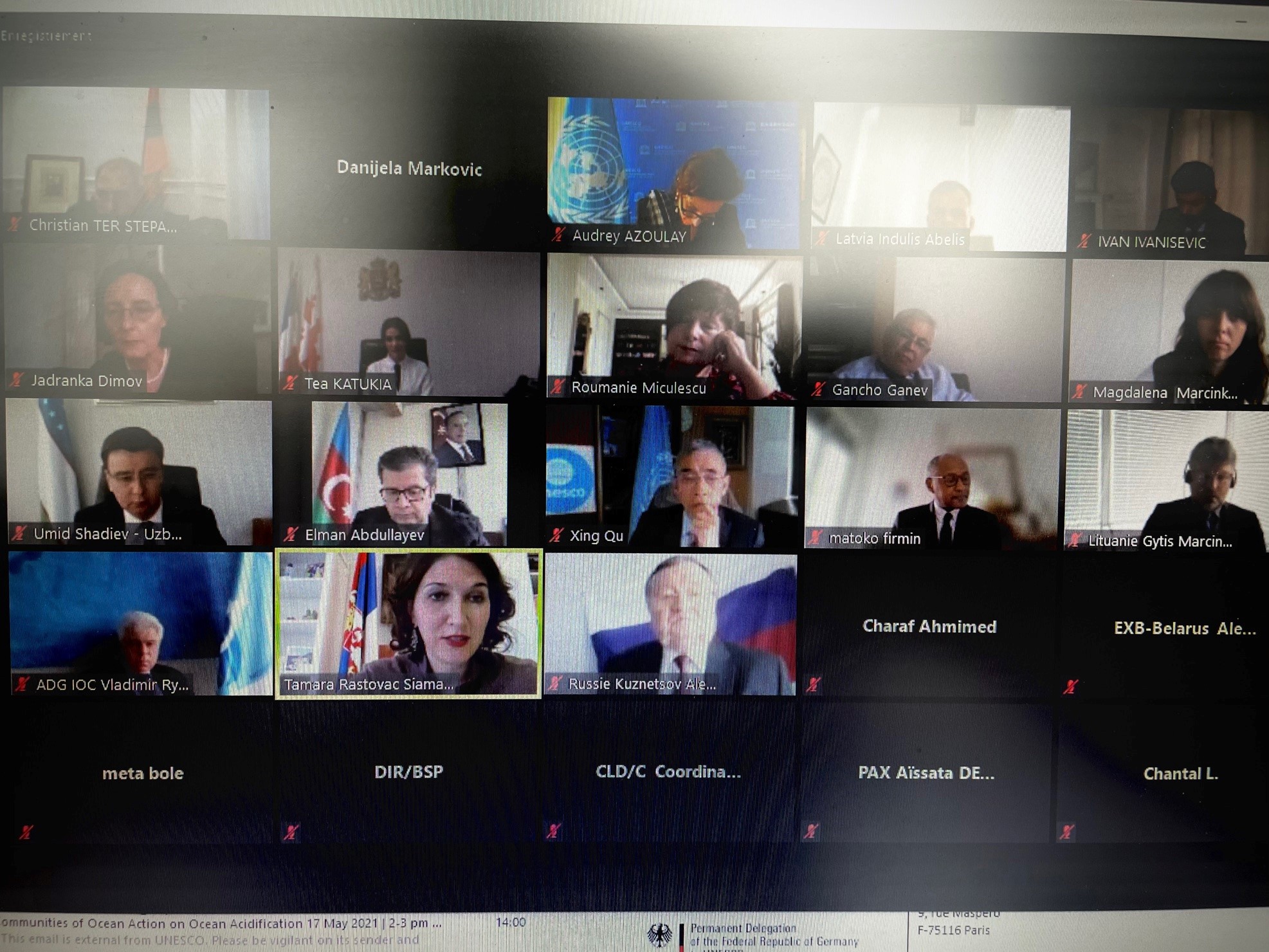
Under the chairmanship of the Permanent Delegation of Armenia to UNESCO, a virtual meeting of the members of Electoral Group II was held today, at which opinions were exchanged with the Director General of UNESCO Ms. Audrey Azoulay. The meeting was attended by ambassador Tamara Rastovac Siamashvili, Permanent Delegate of Serbia to UNESCO. Among other things, it was emphasized the importance of the update edition of the UNESCO Model Media and Information Literacy Curriculum for Educators and Learners, which was recently launched at an event in Belgrade. |
|
|
| UNICEF Regional Director on a visit to Serbia |
|
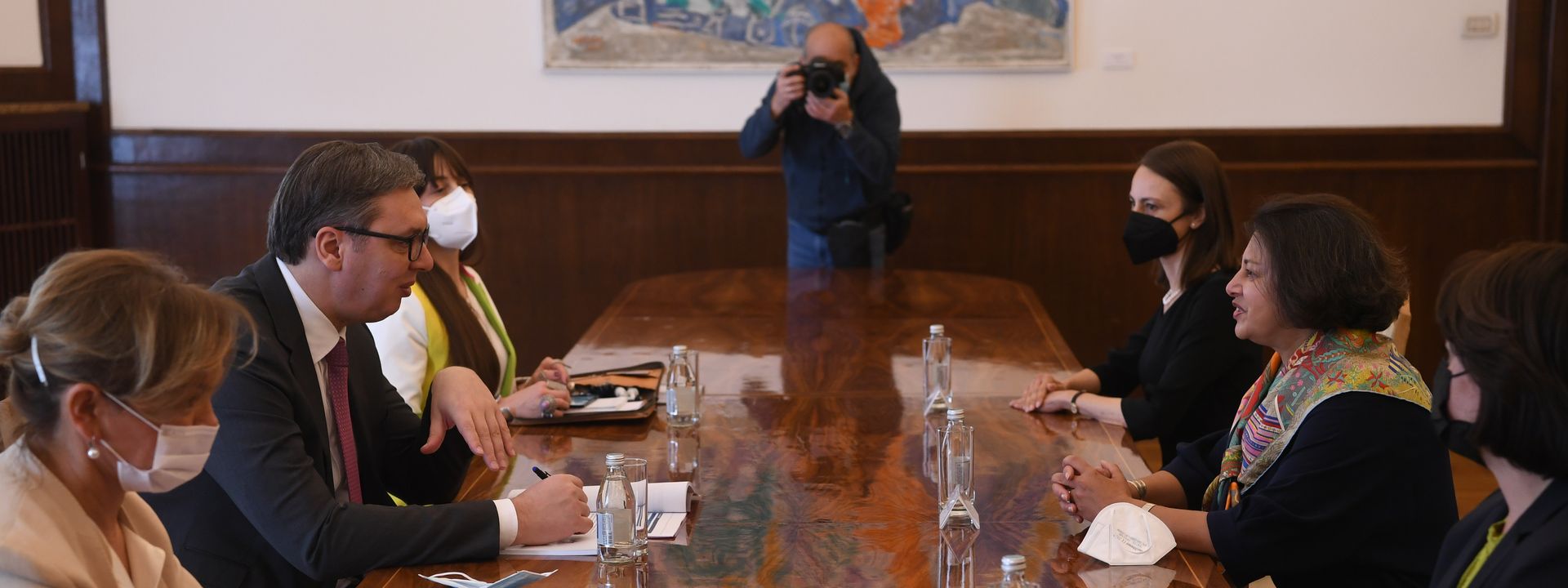 UNICEF Regional Director for Europe and Central Asia and Special Coordinator for the Refuge and Migrant Response in Europe Afshan Khan had talks today in separate meetings with President of the Republic of Serbia Aleksandar Vucic, Prime Minister Ana Brnabic and Minister of Foreign Affairs Nikola Selakovic. UNICEF Regional Director for Europe and Central Asia and Special Coordinator for the Refuge and Migrant Response in Europe Afshan Khan had talks today in separate meetings with President of the Republic of Serbia Aleksandar Vucic, Prime Minister Ana Brnabic and Minister of Foreign Affairs Nikola Selakovic.
In a meeting with the UNICEF Director, Serbian President Vucic underlined that our country remained committed to cooperation with this UN fund for helping children, while stressing that UNICEF could expect that Serbia would work on achieving the agreed common goals and specific projects.
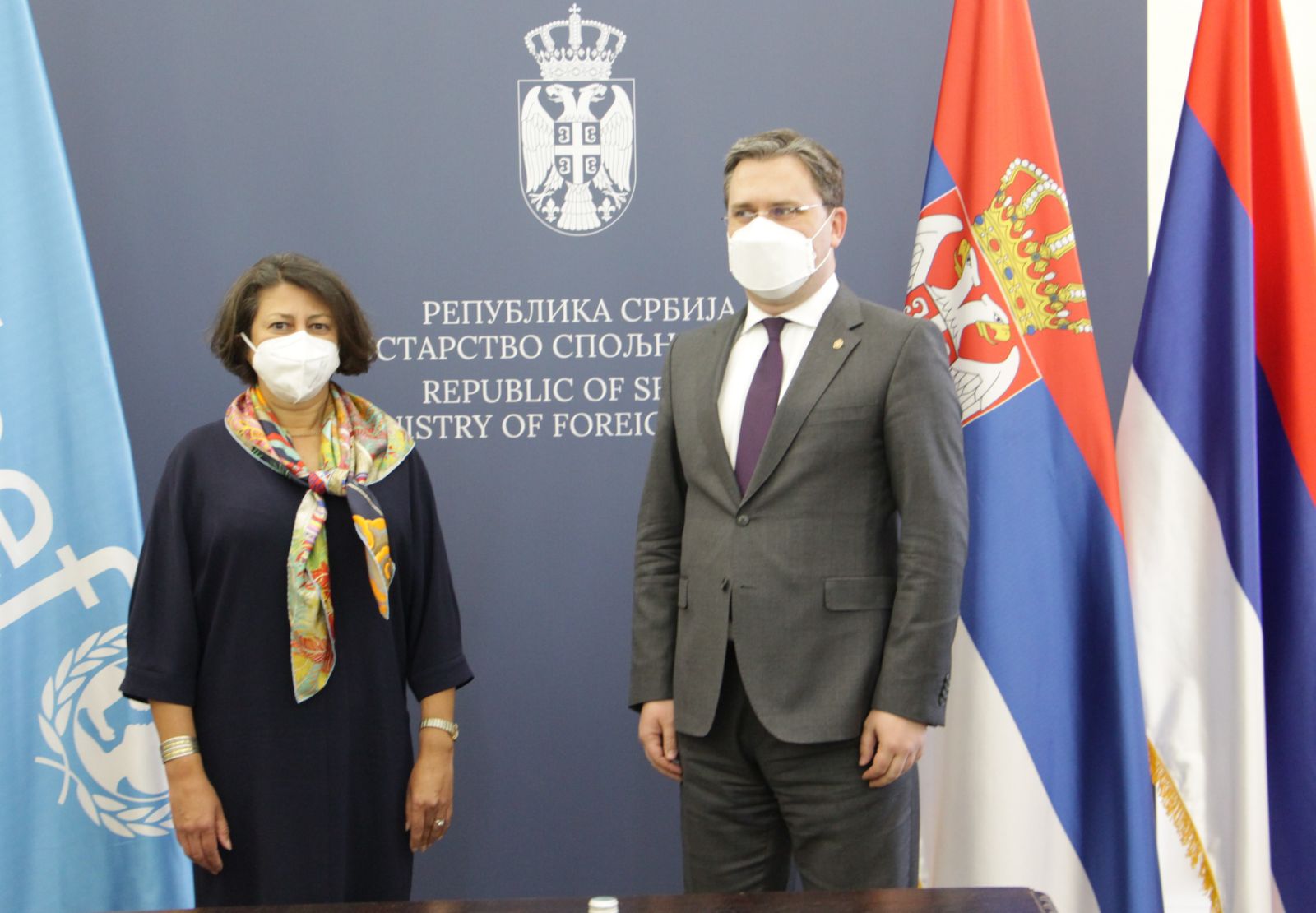 President Vucic thanked for the engagement of UNICEF within the COVAX mechanism, and to the representative office of that UN fund in Serbia for help and support in the fight against the pandemic. President Vucic thanked for the engagement of UNICEF within the COVAX mechanism, and to the representative office of that UN fund in Serbia for help and support in the fight against the pandemic.
President Vucic and Director Khan agreed to exchange experiences in different areas, especially in various forms of assistance for the most vulnerable social groups.
In a meeting with Director Khan, Prime Minister Ana Brnabic said that the care for mental health of the youth was a priority, and that when it comes to their education, all efforts were made to ensure continuous holding of online classes during the epidemic.
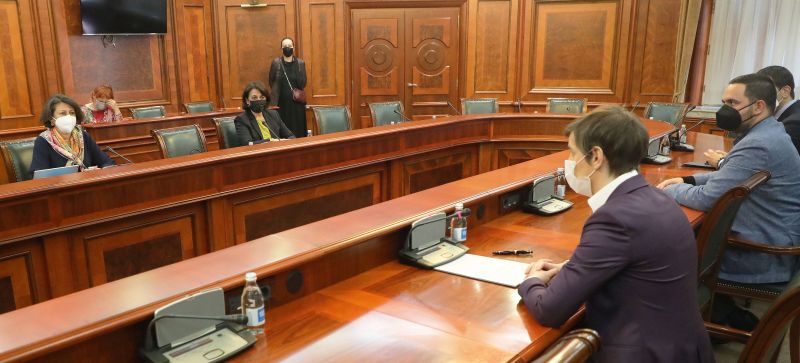 Brnabic concluded that Serbia was committed to cooperation with UNICEF and that her support and that of her team stood at UNICEF’s disposal. Brnabic concluded that Serbia was committed to cooperation with UNICEF and that her support and that of her team stood at UNICEF’s disposal.
|
|
|
| President Vučić met via video link with representatives of the IMF delegation |
|
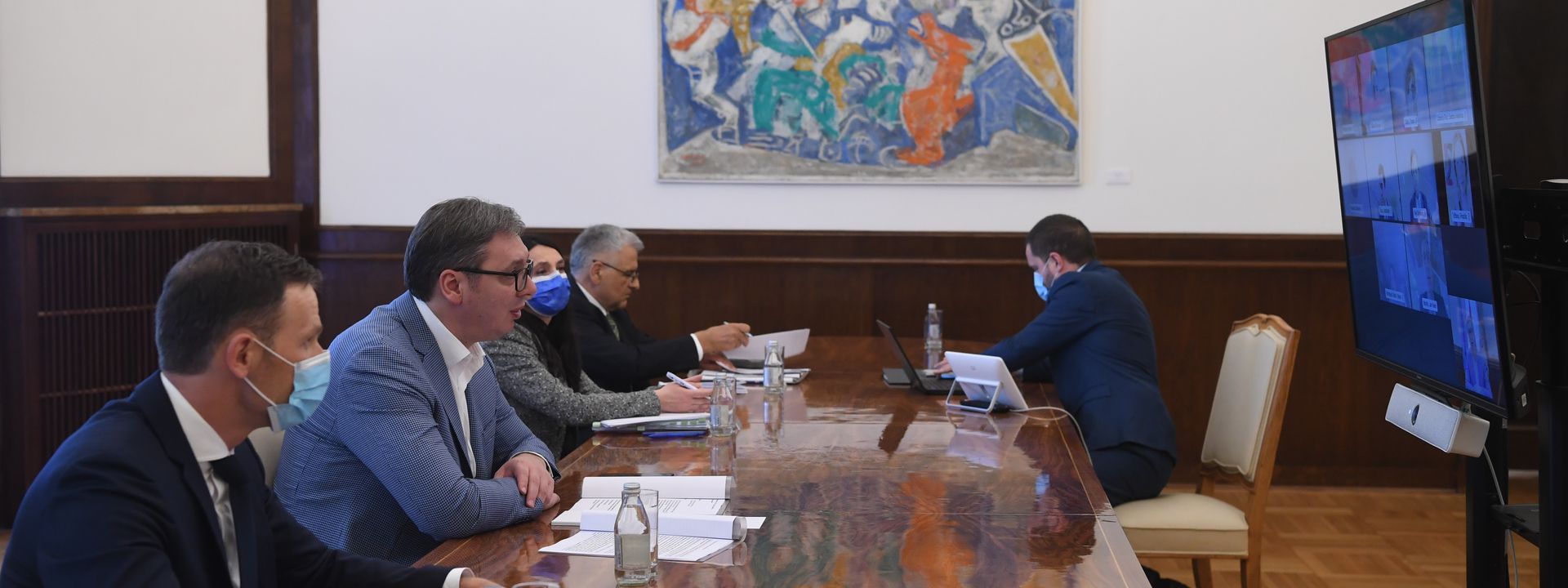
President of the Republic of Serbia Aleksandar Vučić talked today via a video link with the representatives of the delegation of the International Monetary Fund led by the Head of the Mission, Jan Kees Martijn. The interlocutors concluded that Serbia's main goal remains to preserve the hard-earned reputation of a fiscally secure country, as well as to continue with a responsible fiscal policy so that public debt does not exceed 60 per cent of GDP, whereby Serbia continues to work on further economic growth.
During the conversation, President Vučić and Jan Kees Martijn especially referred to the incentive measures and adopted three packages of measures to help the economy and citizens, which preserved macroeconomic stability and even achieved a higher employment rate. Martijn commended the responsible economic policy of Serbia and the successful crisis management during the pandemic. |
|
|
| Participation of the Permanent Delegation of the Republic of Serbia to UNESCO at the 211th session of the UNESCO Executive Board |
|
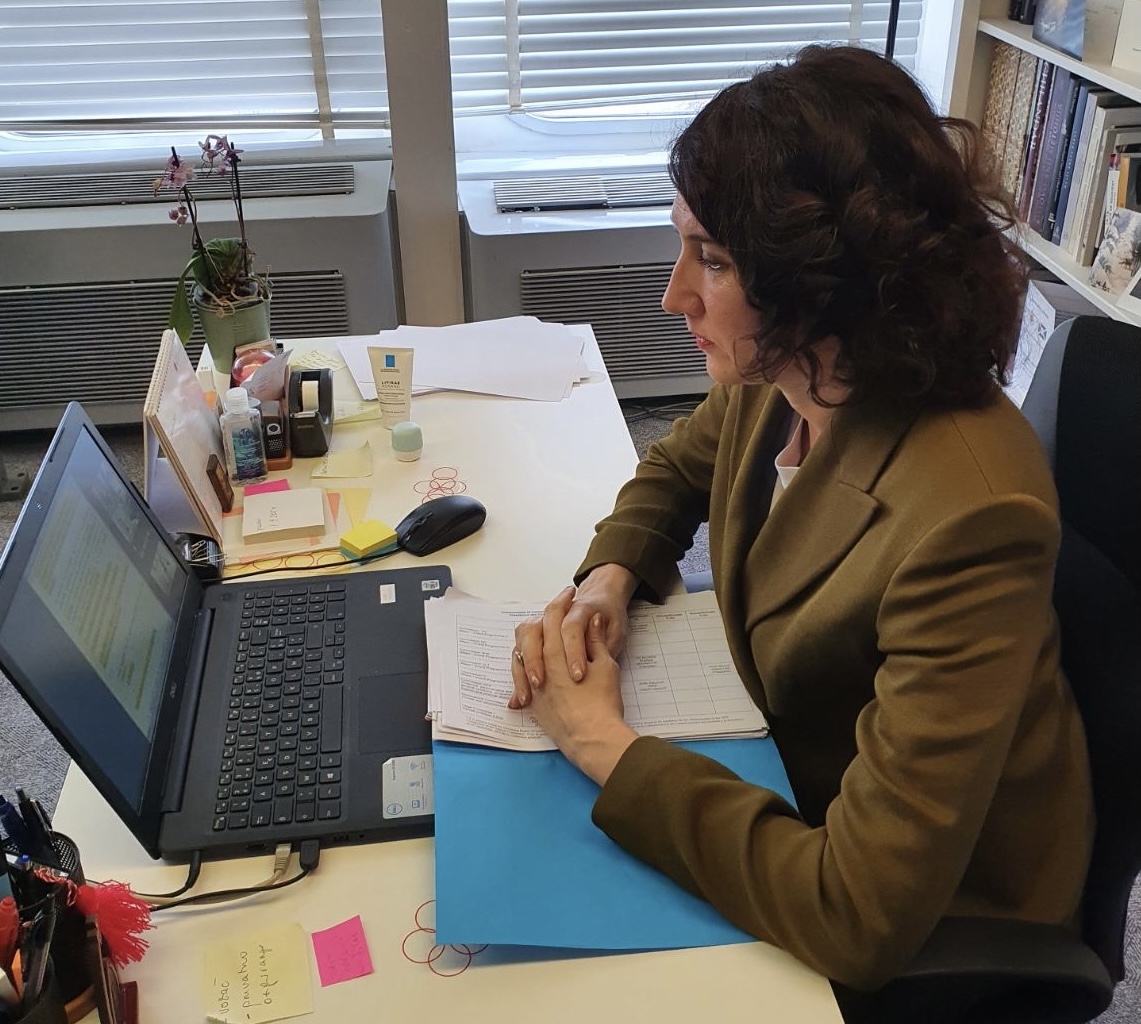 Permanent Delegation of the Republic of Serbia to UNESCO actively participated in the 211th session of the Executive Board of UNESCO, which was held in a virtual format from 7th until 21st April 2021. In addition to the participation of ambassador Tamara Rastovac Siamashvili in the meetings of the Bureau of the Executive Board, as chair of the Committee on Non-Governmental Partners, as well as in the plenary debate, the Permanent Delegation spoke on a number of other items on the agenda, such as global and regional coordination and support regarding SDG 4 dedicated to education, the Global Priority Africa, strategic transformation of UNESCO and the Small Island Developing States Action Plan. We also spoke about the UNESCO Strategy on Technological Innovation in Education for the period 2021-2025 and the Draft Medium-Term Strategy and Programme and Budget of UNESCO. Permanent Delegation of the Republic of Serbia to UNESCO actively participated in the 211th session of the Executive Board of UNESCO, which was held in a virtual format from 7th until 21st April 2021. In addition to the participation of ambassador Tamara Rastovac Siamashvili in the meetings of the Bureau of the Executive Board, as chair of the Committee on Non-Governmental Partners, as well as in the plenary debate, the Permanent Delegation spoke on a number of other items on the agenda, such as global and regional coordination and support regarding SDG 4 dedicated to education, the Global Priority Africa, strategic transformation of UNESCO and the Small Island Developing States Action Plan. We also spoke about the UNESCO Strategy on Technological Innovation in Education for the period 2021-2025 and the Draft Medium-Term Strategy and Programme and Budget of UNESCO.
At this session, among other things, the recommendation of the Executive Board for the General Conference of UNESCO on declaring the celebration of the 150th anniversary of the birth of Serbian painter and activist Nadežda Petrović as the anniversary with which UNESCO will be associated in the period 2022/2023 was adopted.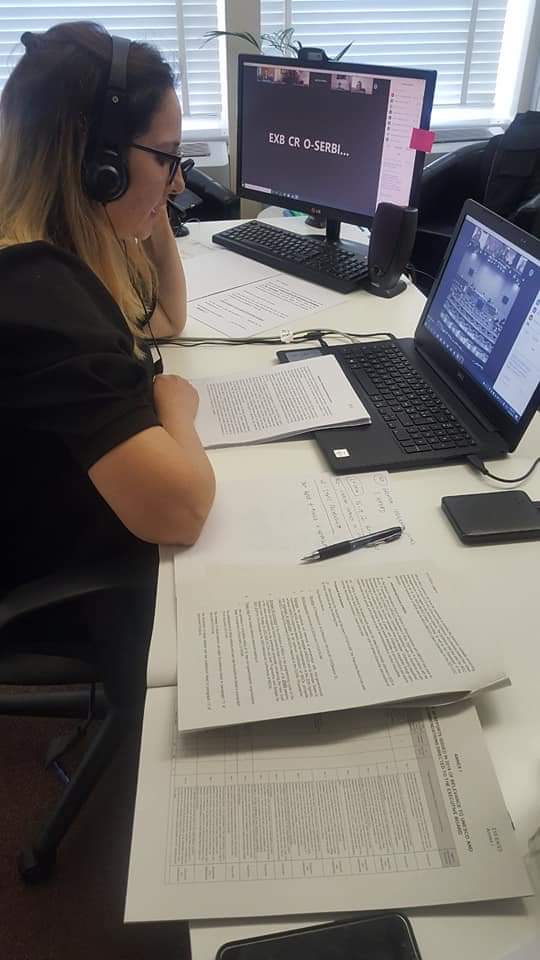 |
|
|
| Meeting with the World Health Organization Regional Director for Europe |
|
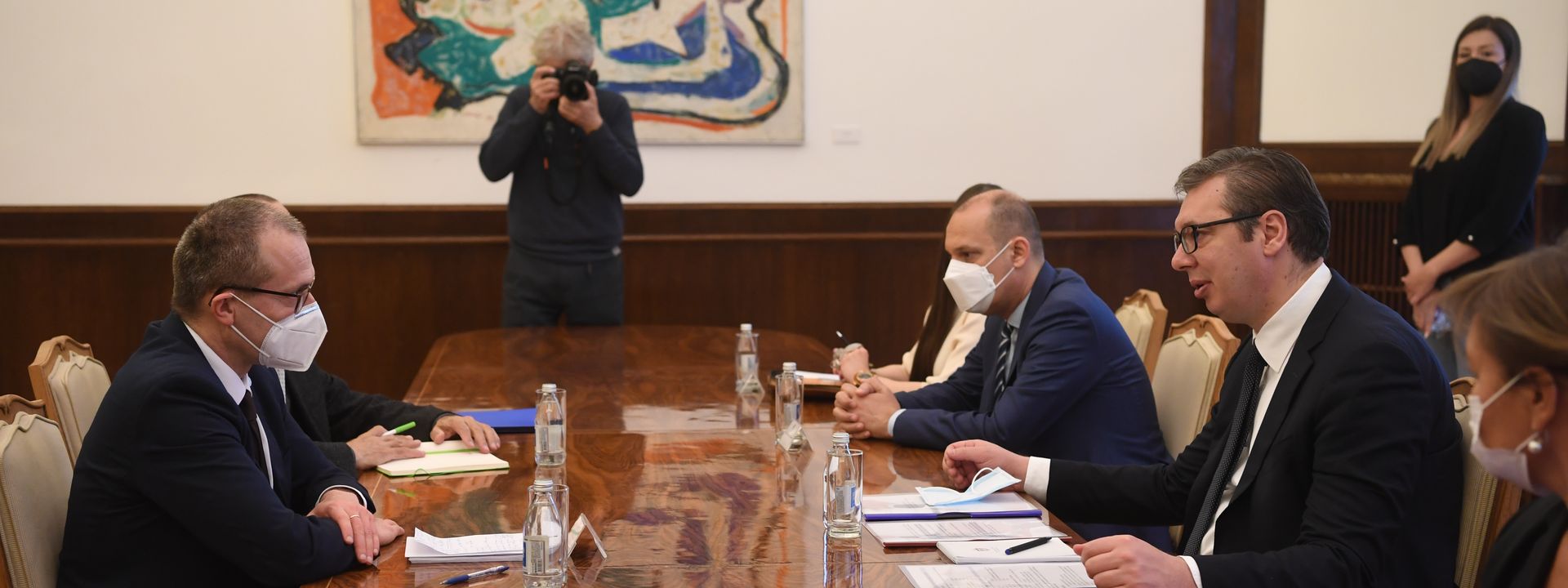
President of the Republic of Serbia Aleksandar Vučić met today with the Regional Director of the World Health Organisation for Europe Hans Kluge, to discuss cooperation in the fight against the COVID-19 pandemic, as well as cooperation in improving health care in our country and other joint activities.
President Vučić thanked Dr Kluge for his personal engagement and support during the current pandemic, especially for technical assistance and expertise. On this occasion, he informed the WHO official about the results of immunisation in Serbia and plans on how to provide the vaccine to all citizens who want to get it. |
|
|
| WHO describes immunisation process in Serbia as impressive |
|
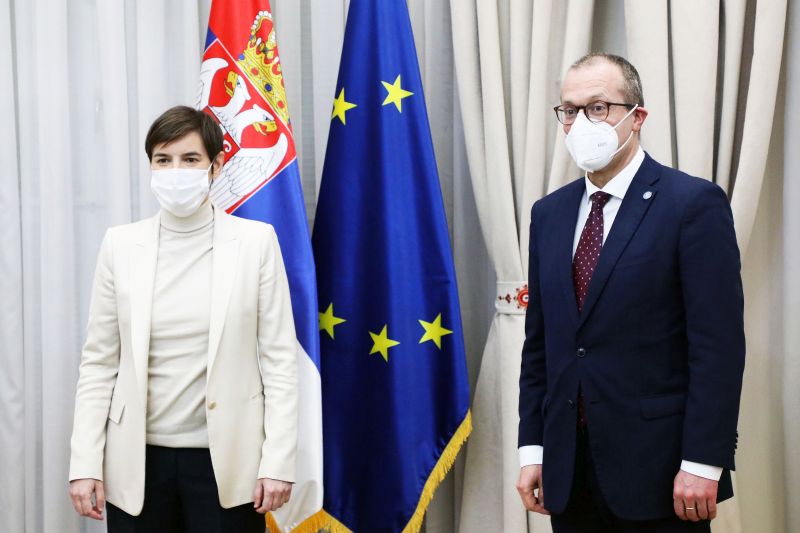 Prime Minister Ana Brnabic talked today with World Health Organisation (WHO) Regional Director for Europe Hans Kluge about the epidemiological situation and the course of immunisation of citizens in Serbia. Prime Minister Ana Brnabic talked today with World Health Organisation (WHO) Regional Director for Europe Hans Kluge about the epidemiological situation and the course of immunisation of citizens in Serbia.
Brnabic expressed gratitude for the cooperation in the fight against the pandemic, technical assistance and expertise, emphasising that the support of this organisation is very important for our country.
She informed the WHO Regional Director for Europe about the course of immunisation of citizens in Serbia, expressing her belief that, thanks to the large number of vaccinated people, we will be able to create collective immunity and return to normal life.
Kluge assessed the immunisation process in Serbia as impressive, and added that Serbia has made a good decision to offer citizens all available vaccines used in the fight against coronavirus. |
|
|
| Selakovic: Pristina persists in its campaign of hatred against the Serbian people |
|
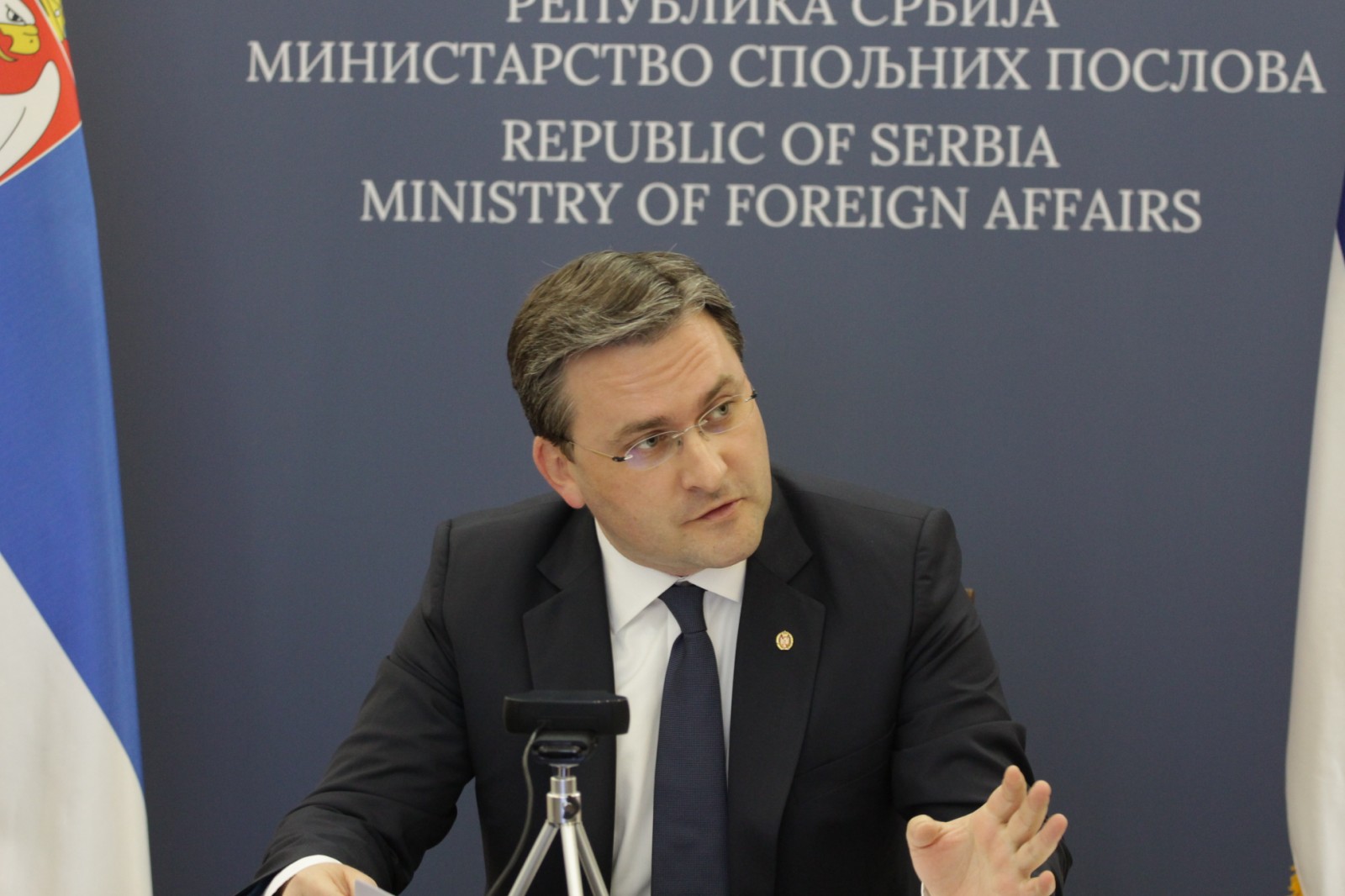 Minister of Foreign Affairs of Serbia Nikola Selakovic stated today that Pristina further persisted in its campaign of hatred against the Serbian people, which was most drastically seen in the unfounded accusations of mass rapes and genocide. Minister of Foreign Affairs of Serbia Nikola Selakovic stated today that Pristina further persisted in its campaign of hatred against the Serbian people, which was most drastically seen in the unfounded accusations of mass rapes and genocide.
At the UN Security Council meeting discussing the Report of the UN Secretary-General on the work of UNMIK, Selakovic emphasized that the efforts of the provisional institutions in Kosovo and Metohija to create a narrative about mass rapes of Albanian women were obvious, and that propaganda methods and lies were used for that purpose.
"It is clear that there were victims on all sides in the conflict, as well as that our side has evidence of numerous Serb victims. But the precondition for ensuring the protection of rights that belong to each individual victim is a rational and well-argued approach", Selakovic said responding to the slander of the Pristina representative. |
|
|
| Selakovic: Political extremism of Albanians in Kosovo and Metohija is becoming stronger |
|
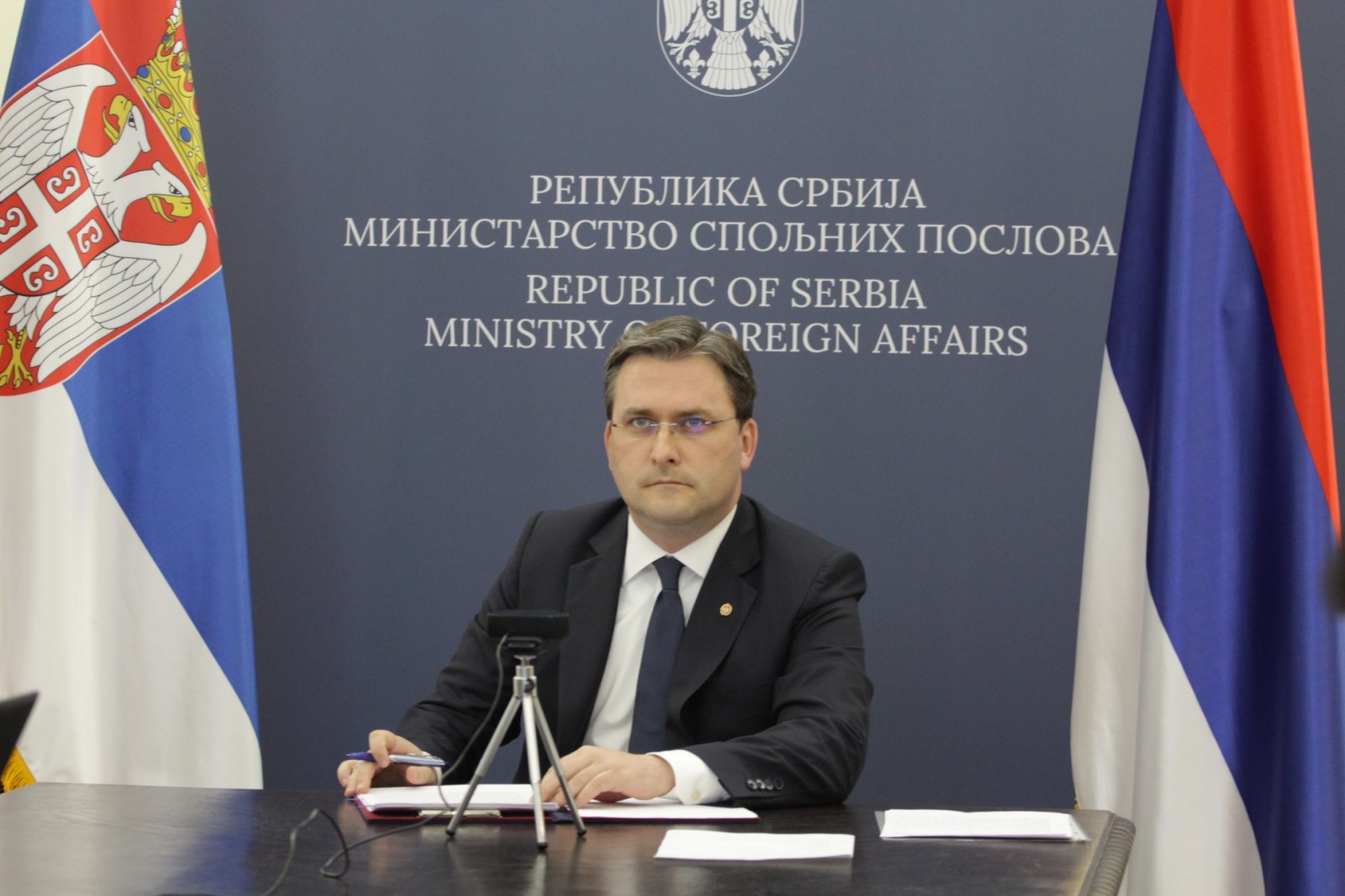 Minister of Foreign Affairs of Serbia Nikola Selakovic warned, at the United Nations Security Council meeting, that the political extremism among Albanians in Kosovo and Metohija was not decreasing, but on the contrary, was becoming stronger. Minister of Foreign Affairs of Serbia Nikola Selakovic warned, at the United Nations Security Council meeting, that the political extremism among Albanians in Kosovo and Metohija was not decreasing, but on the contrary, was becoming stronger.
At the meeting discussing the Report of the UN Secretary-General on the work of UNMIK, Minister Selakovic recalled that the obligation to form the Community of Serb Municipalities remained unfulfilled for 2,917 days now and that, in fact, 19 April marked eight full years since the agreement was reached in Brussels, while Pristina still refused to follow up on its commitment and enable the formation of the Community of Serb Municipalities.
The Minister reminded that the current Prime Minister of the provisional institutions of self-government in Pristina repeatedly threatened to unite the self-proclaimed Kosovo and Albania, and that he also stated that the dialogue with Belgrade was low on the list of his priorities. |
|
|
| Participation in the plenary debate of the 211th session of the Executive Board of UNESCO |
|
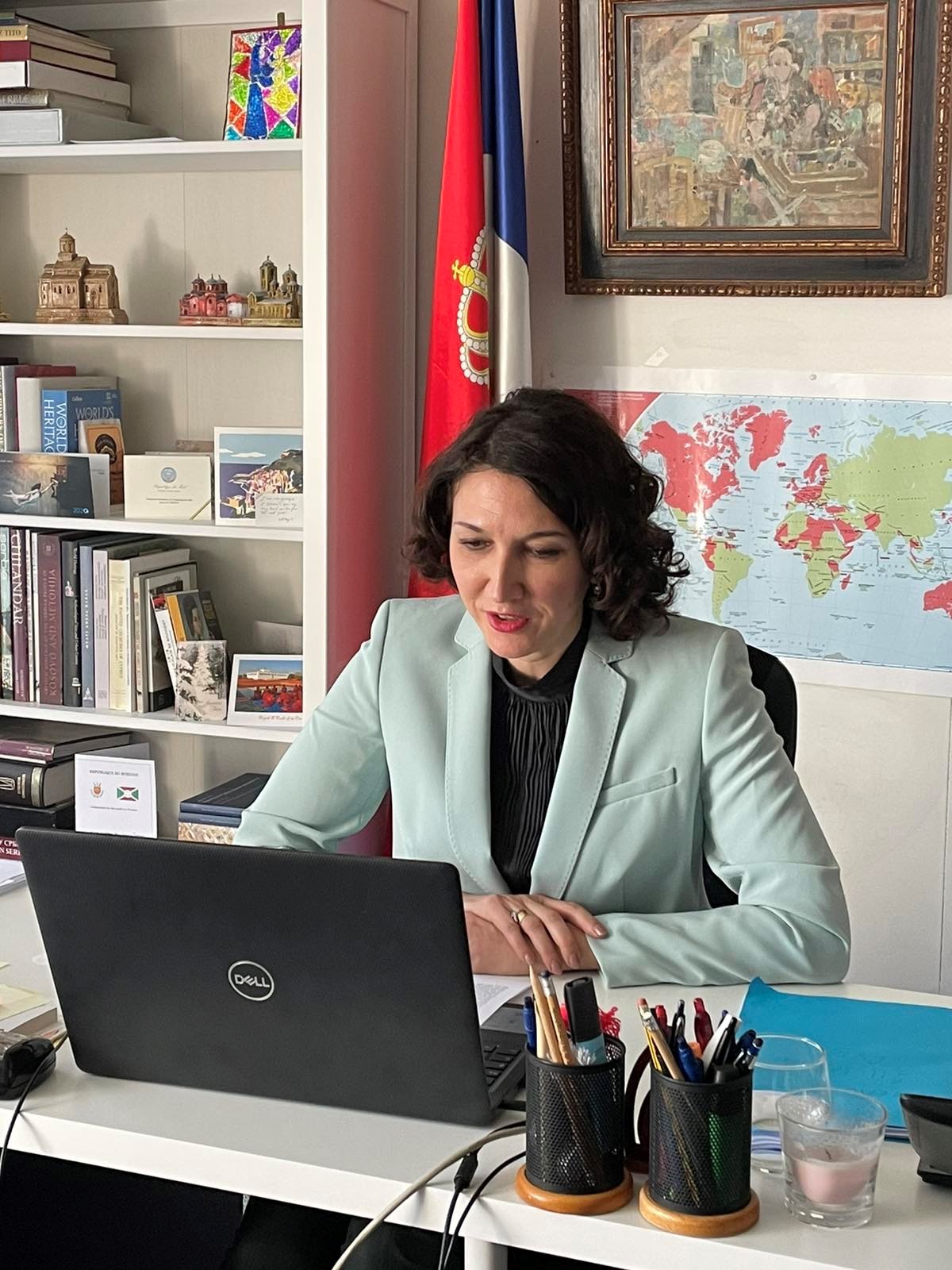 Within the 211th session of the UNESCO Executive Board, which is being held in a virtual format from 7th until 21st April 2021, a plenary debate was held, in which ambassador Tamara Rastovac Siamashvili, Permanent Delegate to UNESCO, spoke on behalf of the Republic of Serbia. In her speech, she emphasized, among other things, Serbia's traditional belief that the world needs stronger multilateralism in order to tackle the toughest challenges that go far beyond national borders, in which context UNESCO can play an indispensable role. Within the 211th session of the UNESCO Executive Board, which is being held in a virtual format from 7th until 21st April 2021, a plenary debate was held, in which ambassador Tamara Rastovac Siamashvili, Permanent Delegate to UNESCO, spoke on behalf of the Republic of Serbia. In her speech, she emphasized, among other things, Serbia's traditional belief that the world needs stronger multilateralism in order to tackle the toughest challenges that go far beyond national borders, in which context UNESCO can play an indispensable role.
She referred to the main issues on the Organization's agenda, such as strategic transformation, implementation of UNESCO's global priorities, with a special focus on Africa, as well as activities related to the Draft Medium-Term Strategy and the Organization's Programme and Budget. She emphasized the importance that Serbia dedicates to the issues of education, protection of cultural heritage, freedom of media, improvement of media and information literacy, safety of journalists, as well as the promotion of the diversity of cultural expressions and the development of creative industries.
|
|
|
| Participation in the meeting of the Bureau of the Executive Board |
|
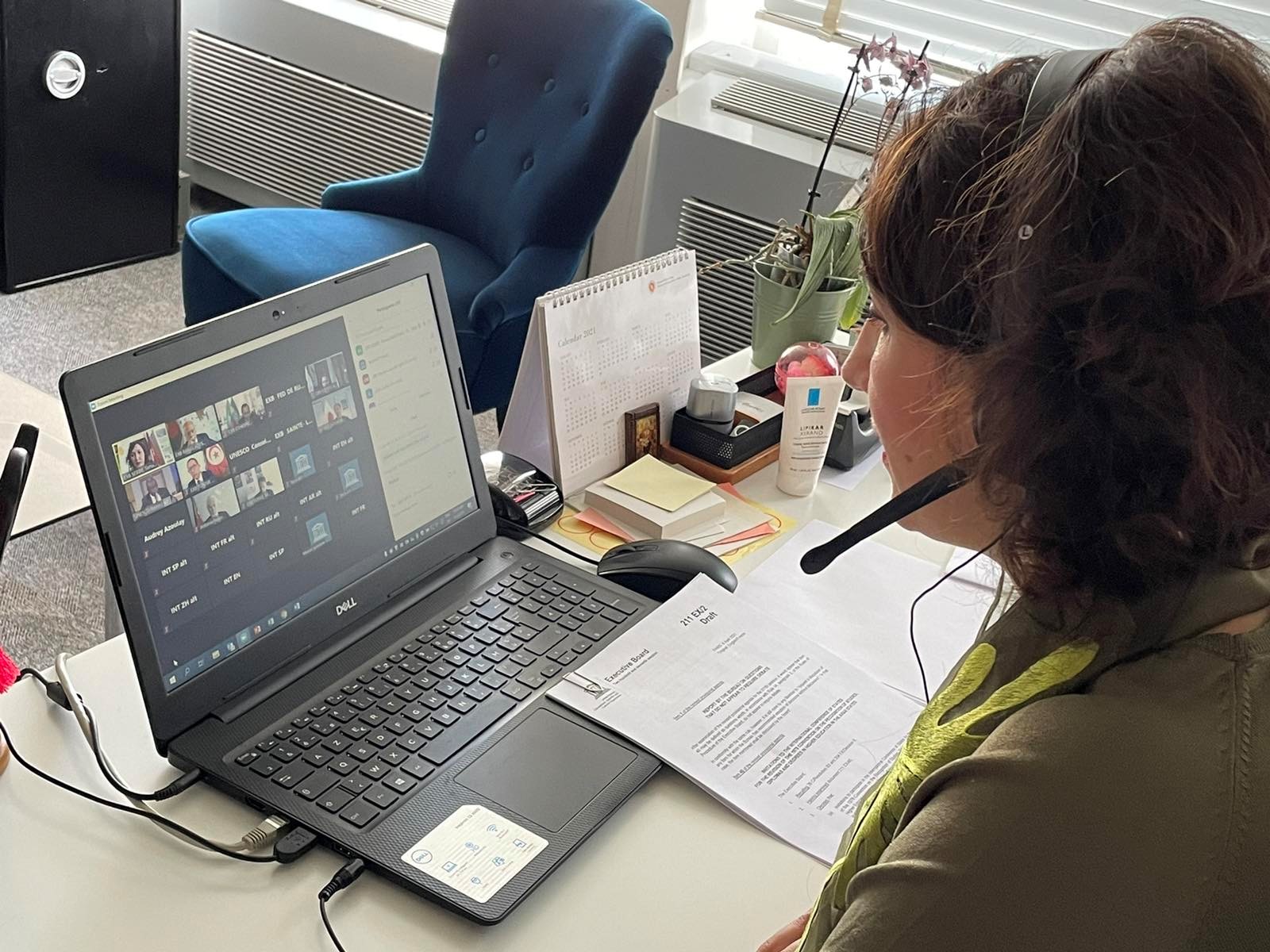
The first virtual meeting of the Bureau of the Executive Board was held today in order to prepare the upcoming 211th session of the Executive Board. The Permanent Representative of the Republic of Serbia, Ambassador Tamara Rastovac Siamashvili, participated at the meeting, as a member of the Bureau, in her capacity as Chair of the Committee for Non-Governmental Partners.
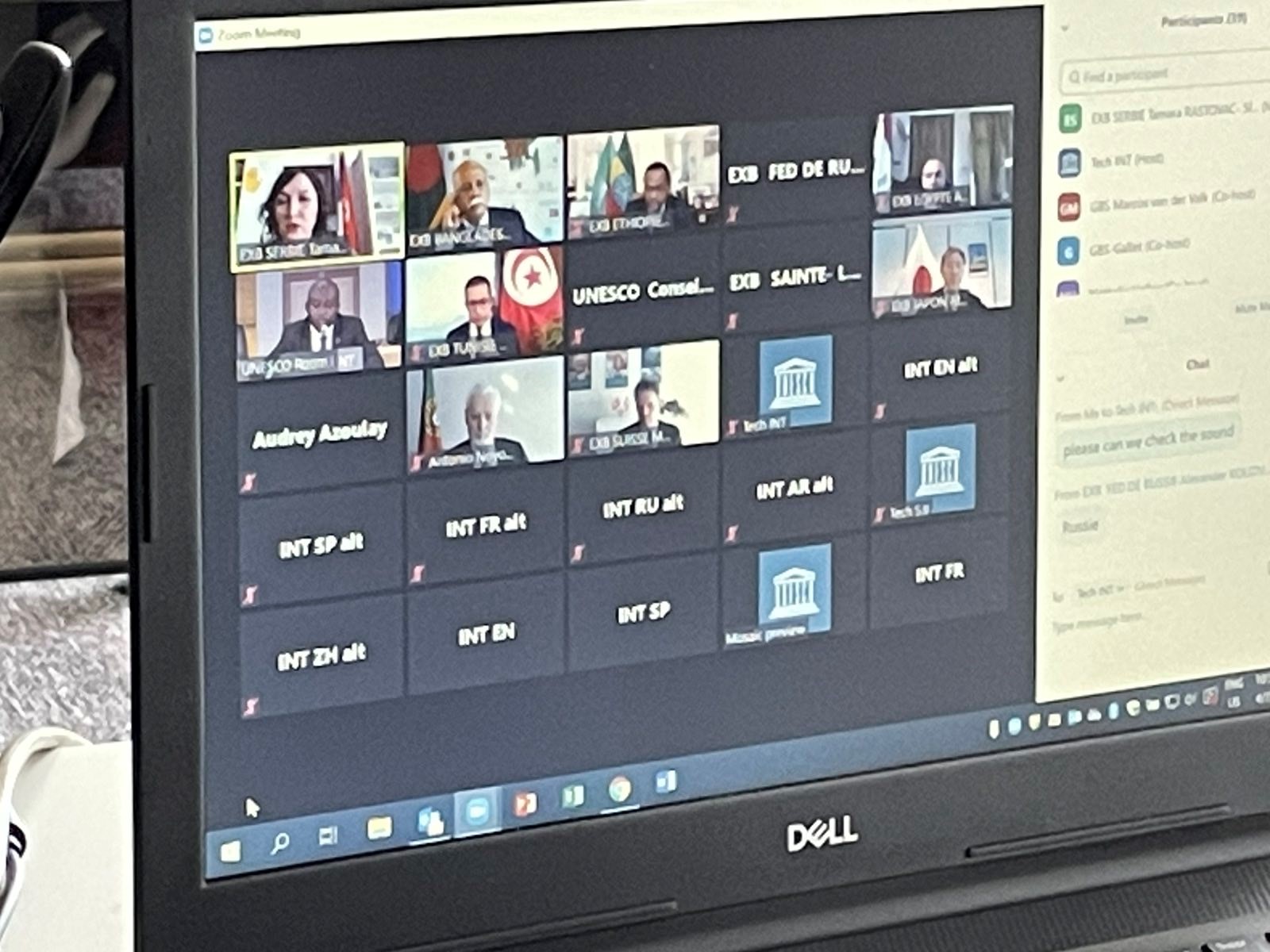 |
|
|
| Selakovic: The UN is the most important international organization for Serbia |
|
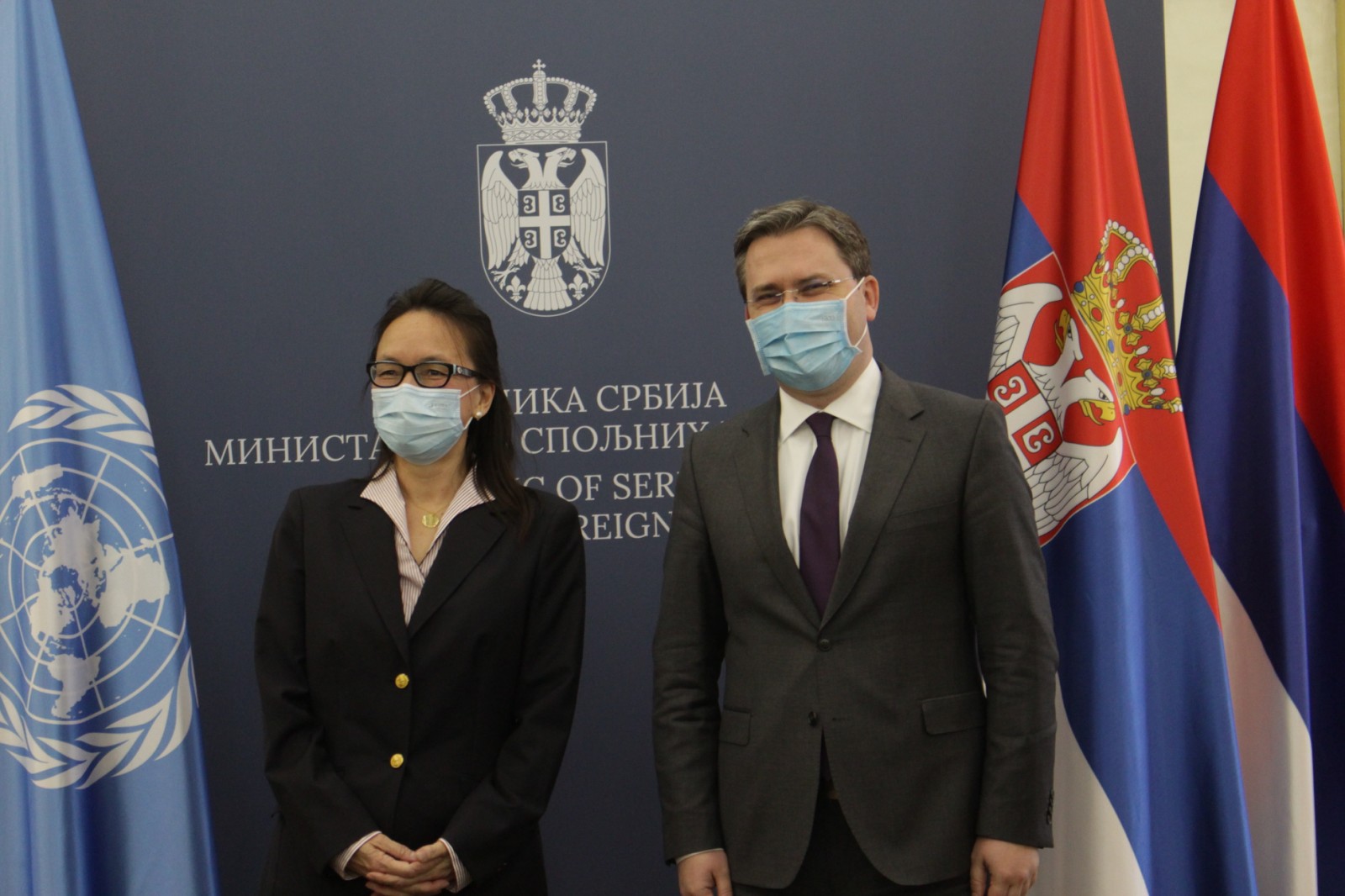 Minister of Foreign Affairs of Serbia Nikola Selakovic had talks today with Representative of the Secretary-General of the United Nations and Head of the UN Office in Belgrade Mari Yamashita. Minister of Foreign Affairs of Serbia Nikola Selakovic had talks today with Representative of the Secretary-General of the United Nations and Head of the UN Office in Belgrade Mari Yamashita.
Minister Selakovic emphasized that the United Nations was the most important international organization for Serbia and added that our country was committed to the priority areas of UN activity and to the continuation of excellent cooperation.
Furthermore, the Minister pointed out that the work of the UN Office in Belgrade was of major importance for Serbia, since it was the main channel of communication with the UN Mission in Kosovo and Metohija (UNMIK), whose presence and activity were of key importance for our country.
He underlined that Serbia attached great importance to the activity of UNMIK and emphasized that the mission needed to remain engaged on all issues of importance for the consistent implementation of UN Security Council Resolution 1244, in an undiminished scope and with an unchanged mandate.
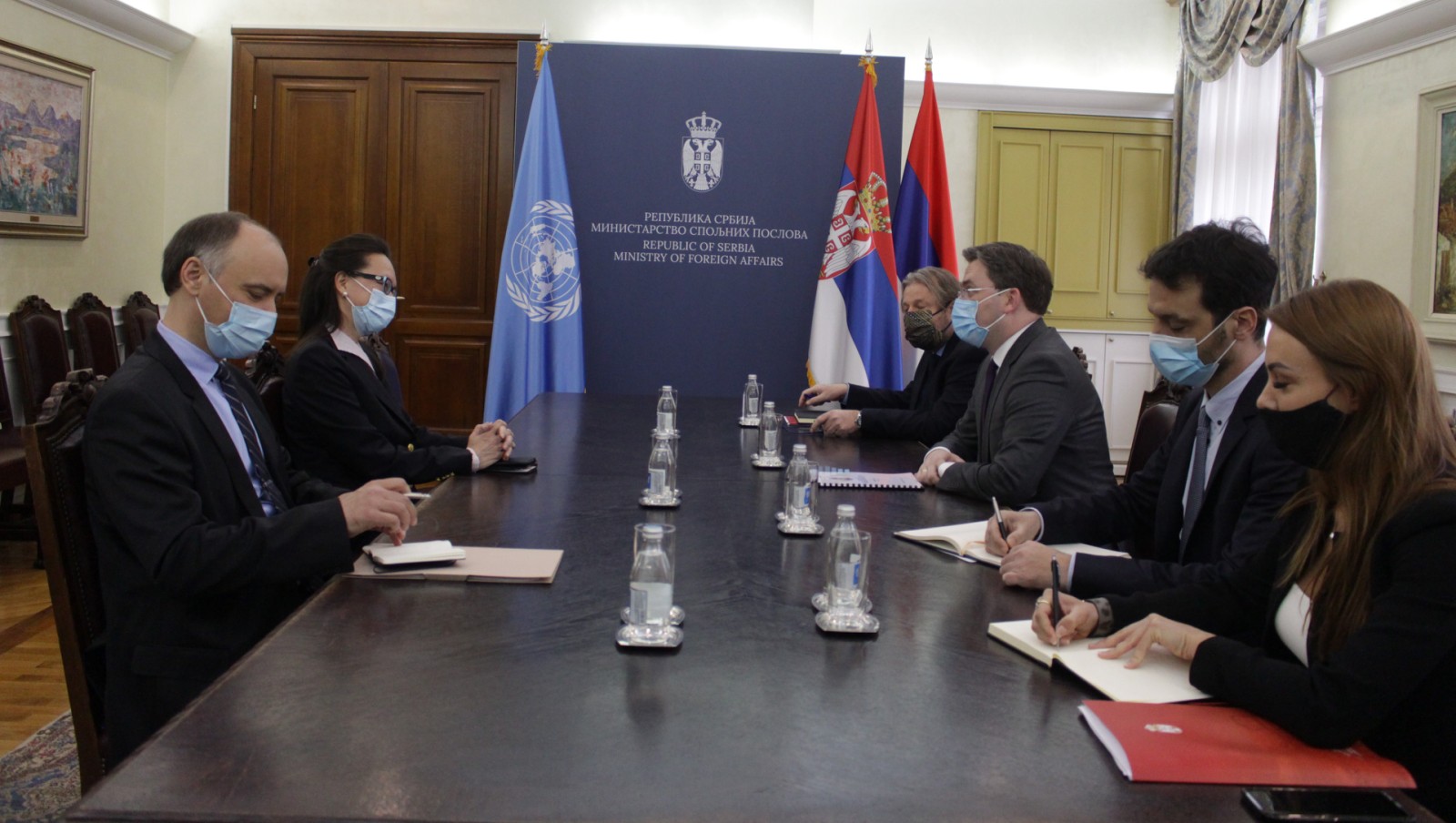 Selakovic underscored in particular that the continuous consideration of the issue of Kosovo and Metohija in the Security Council was of essential importance for Serbia, given that the situation on the ground was still unstable and sensitive, with numerous incidents, of which UNMIK itself was a direct witness. Selakovic underscored in particular that the continuous consideration of the issue of Kosovo and Metohija in the Security Council was of essential importance for Serbia, given that the situation on the ground was still unstable and sensitive, with numerous incidents, of which UNMIK itself was a direct witness.
The Serbian Foreign Minister also said that the upcoming session of the UN Security Council on the work of UNMIK, to be held on 13 April via video-conference, would be an excellent opportunity to discuss the current situation in the Province, the activities of the UN, UNMIK and of other international representatives in Kosovo and Metohija.
|
|
|
| Gojkovic: We nominated slivovitz for the UNESCO list |
|
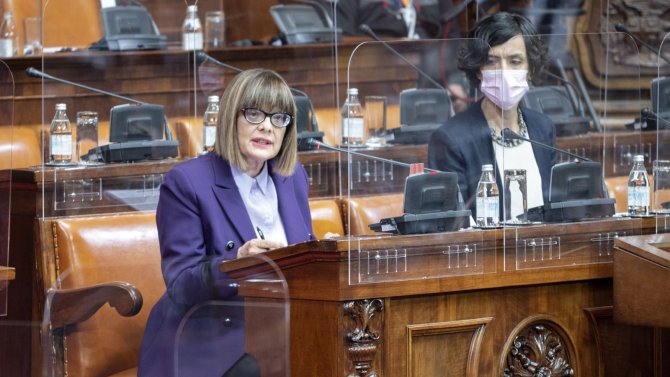 The Ministry of Culture and Information submitted a candidacy today for the slivovitz traditional plum spirit to be included on the UNESCO Representative List of the Intangible Cultural Heritage, Minister of Culture and Information Maja Gojkovic said. The Ministry of Culture and Information submitted a candidacy today for the slivovitz traditional plum spirit to be included on the UNESCO Representative List of the Intangible Cultural Heritage, Minister of Culture and Information Maja Gojkovic said.
"We submitted our slivovitz candidacy today, and I hope that next year we will be able to have it inscribed on the list, and then we will go on to nominate naive Slovak painting. We have also been working to that end", Gojkovic said at the session of the Serbian National Assembly, where she is defending the Law on Museum Activity.
The nomination of the element "social practice and knowledge related to the preparation of the traditional plum spirit - slivovitz" is part of the 2021-2022 nomination cycle. |
|
|
| Marking the Day of Remembrance of the victims of the NATO aggression |
|
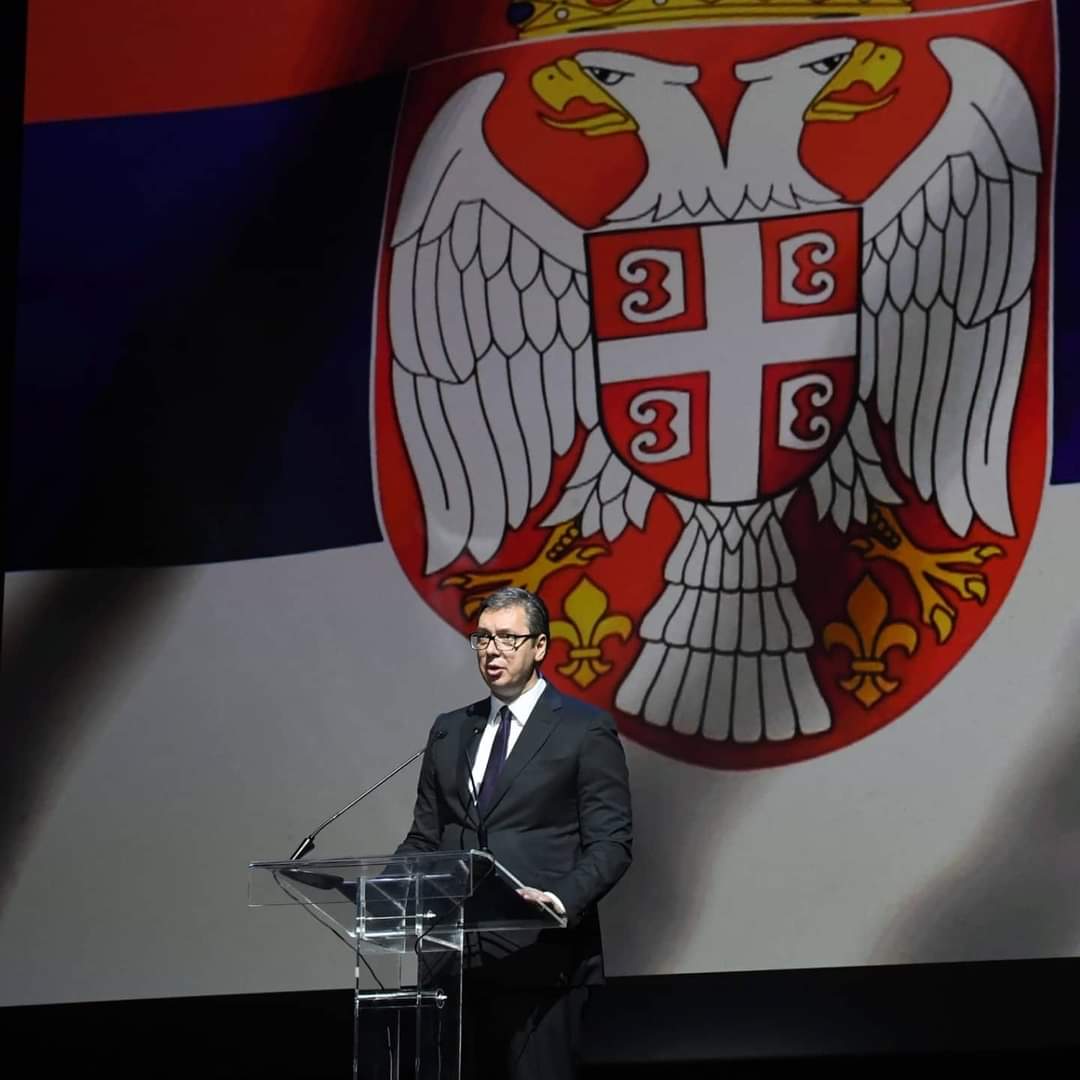 President of the Republic of Serbia Aleksandar Vucic made a statement on the occasion of marking the Day of Remembrance of the victims of the NATO aggression. President of the Republic of Serbia Aleksandar Vucic made a statement on the occasion of marking the Day of Remembrance of the victims of the NATO aggression.
"Your Holiness, distinguished Chairman of the Presidency of Bosnia and Herzegovina, distinguished Speakers of the National Assemblies of the Republic of Serbia and the Republic of Srpska, distinguished Prime Ministers of the Republic of Serbia and the Republic of Srpska, distinguished Ministers of both Governments, dear guests and friends, representatives of the Serbian People from Montenegro, North Macedonia, Croatia, thank you for the fact that we are all together tonight and that the Serbian spirit is unbreakable and invincible.
One child a day and a little more than that. That is the most difficult, sickening and painful number of the NATO aggression from 1999. Killed, stopped, guilty of nothing, having committed no sin, without the right to defence, without the right to justice and without the right to life. |
|
|
| Participation of the Permanent Delegation of the Republic of Serbia to UNESCO in marking the International Day for the Elimination of Racial Discrimination |
|
The Permanent Delegation of the Republic of Serbia to UNESCO took part in the celebration of the International Day for the Elimination of Racial Discrimination (21st March), including participation in the "Global Forum against Racism and Discrimination" organized on 22nd March 2021 by UNESCO and the Republic of Korea. Serbia was one of the initiators of the "Global Call against Racism", which was adopted by the Executive Board of UNESCO in December 2020 and is a member of the Group of Friends for Solidarity and Inclusion with Global Citizenship Education. This Group launched the "Voices Against Racial Discrimination" campaign, in the context of which video material was prepared with ambassadors of UNESCO Member States, including Serbian Ambassador Tamara Rastovac Siamashvili, reading quotes and slogans against racism.
https://vimeo.com/526382633/213640dbde |
|
|
| Commemorating Remembrance Day of 17 March 2004 - Pogrom in Kosovo and Metohija |
|
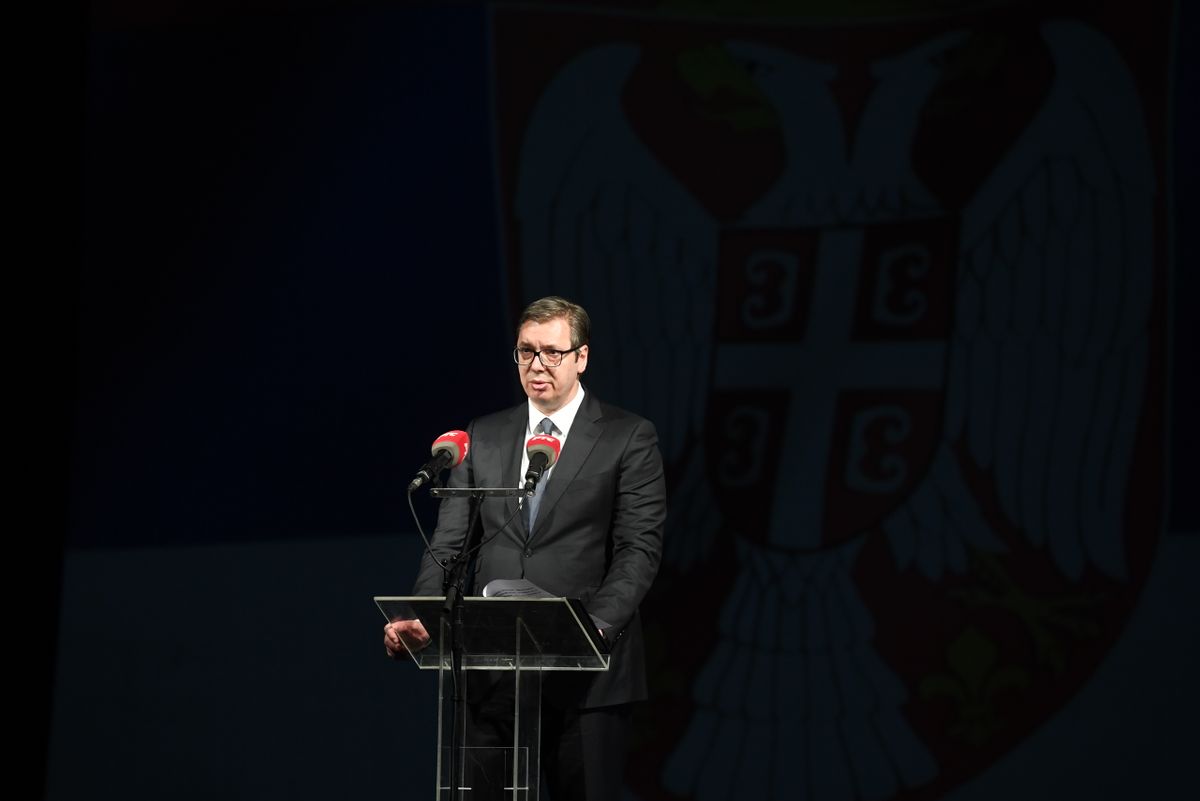 President of the Republic of Serbia Aleksandar Vucic participated today in the commemoration of the Remembrance Day of 17 March 2004 - Pogrom in Kosovo and Metohija. He said that exactly 17 years ago, a pogrom took place in Kosovo and Metohija, and that pogrom surpassed all other crimes. President of the Republic of Serbia Aleksandar Vucic participated today in the commemoration of the Remembrance Day of 17 March 2004 - Pogrom in Kosovo and Metohija. He said that exactly 17 years ago, a pogrom took place in Kosovo and Metohija, and that pogrom surpassed all other crimes.
"There may be times when we are powerless to prevent injustice, but there must never be a time when we fail to protest, these words of Elie Wiesel, a camp survivor and Nobel laureate, make it forever incumbent upon us not to remain silent against crime, regardless of who and for what reason committed it", President Vucic stated and added that we remembered and learned every lesson in which we were losers, each one in which we were silent to our own victims, and each one when we were ready to forget.
"Serbia is no longer weak today, nor is it a country of losers, it does not threaten, but it does not forget either, it is ready for talks, but not for humiliation. Serbia, just like everyone else, has the right to take care of its people, their safety and well-being. The right to life is a fundamental human right and we will always defend it", President Vucic said.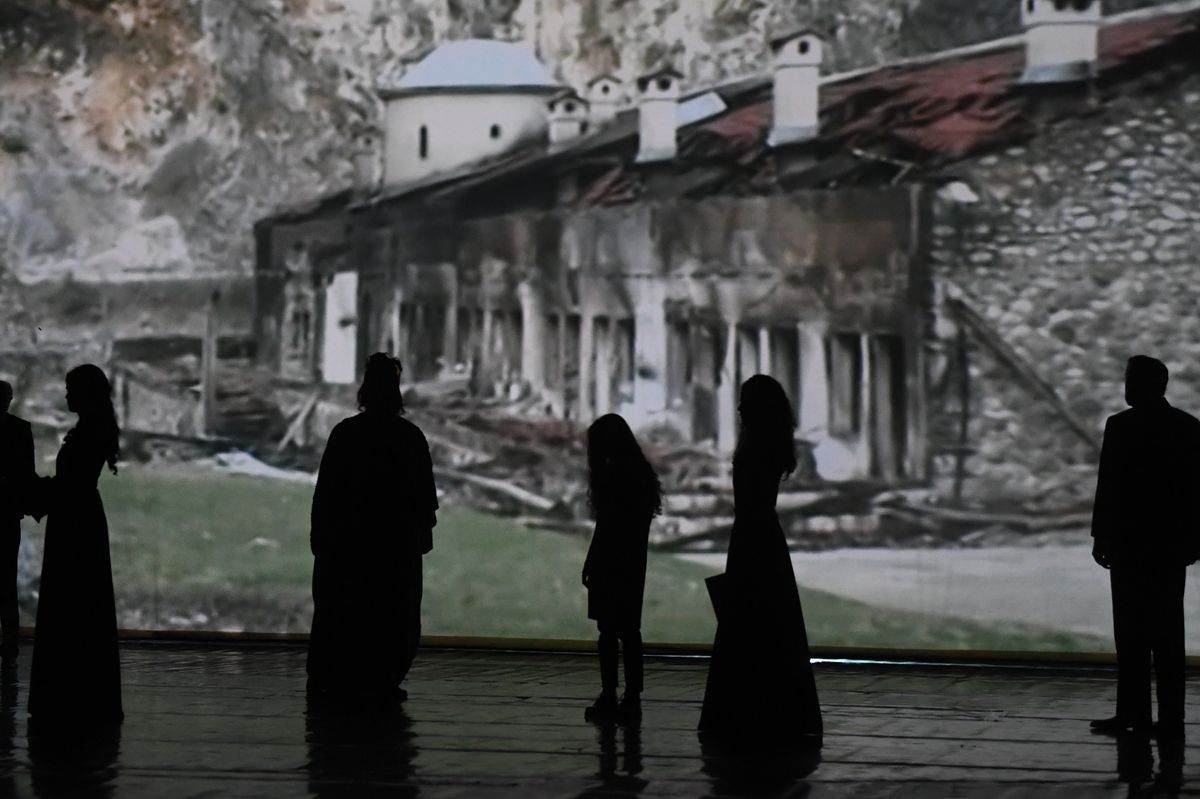
President Vucic said that pogrom surpasses all other crimes, because it is not only an act, but an intention, a policy, a premediated attempt to forcibly cleanse persons belonging to other peoples and faiths from a region or a country.
"We have no right to remain silent to that", said the President of Serbia, emphasizing that we have an obligation to be winners without blood spilled and war, to be the best in the economy, healthcare, sports, education and everything else that implies development and progress.
"We also wish others to work on themselves and be successful, because we are aware that crime is a tool for losers that winners do not need, as they remember, but forgive and move on, while the losers keep spinning in the same vicious circle. We Serbs do not want to be that anymore, we want a future in which we will remember, but from which we will not return. We know what happened and we call it by its real name", President Vucic concluded.
Photo: Dimitrije Goll |
|
|
| Selakovic: Fight against all forms of crime is a priority of the Serbian Government |
|
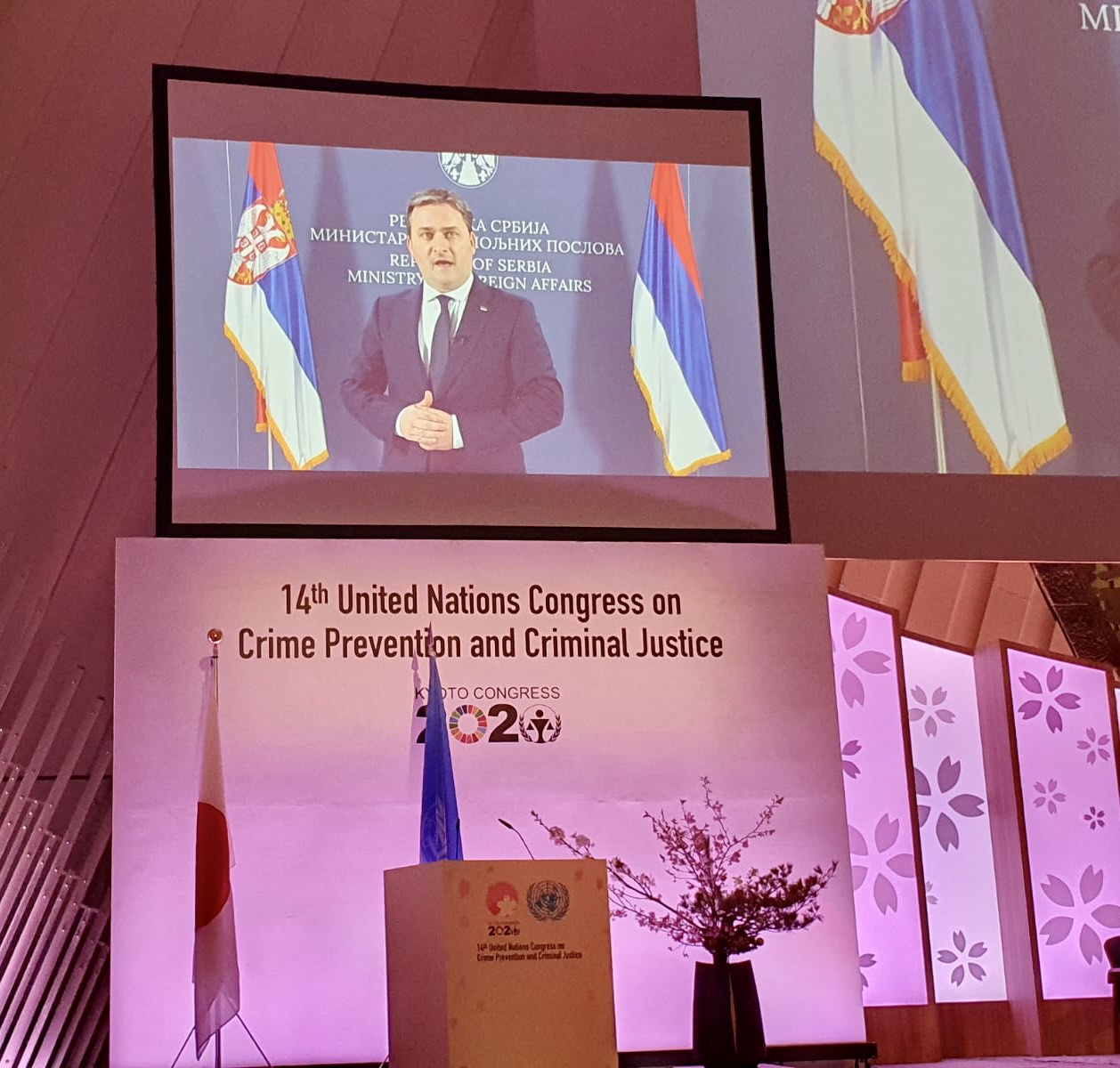 Minister of Foreign Affairs of Serbia Nikola Selakovic said today that the fight against all forms of crime was a top priority of the Serbian Government and an integral part of the EU accession process. Minister of Foreign Affairs of Serbia Nikola Selakovic said today that the fight against all forms of crime was a top priority of the Serbian Government and an integral part of the EU accession process.
"It is also our moral duty, in order to leave a better world for the generations to come", Selakovic said participating via video-link at the 14th UN Congress on Crime Prevention and Criminal Justice, held in Kyoto.
Minister Selakovic emphasized that Serbia, in its Second Serious and Organized Crime Threat Assessment from 2019, identified as its goal to eliminate cybercrime, human trafficking, terrorism and irregular migration.
The Serbian Foreign Minister pointed out that our country had established in a timely manner a normative and institutional framework that regulates prevention of abuse in this area, as well as that the Office of the Special Prosecutor for Cybercrime, a special court department and a special police unit were established.
|
|
|
| Participation of the Republic of Serbia in marking the International Mother Language Day in UNESCO |
|
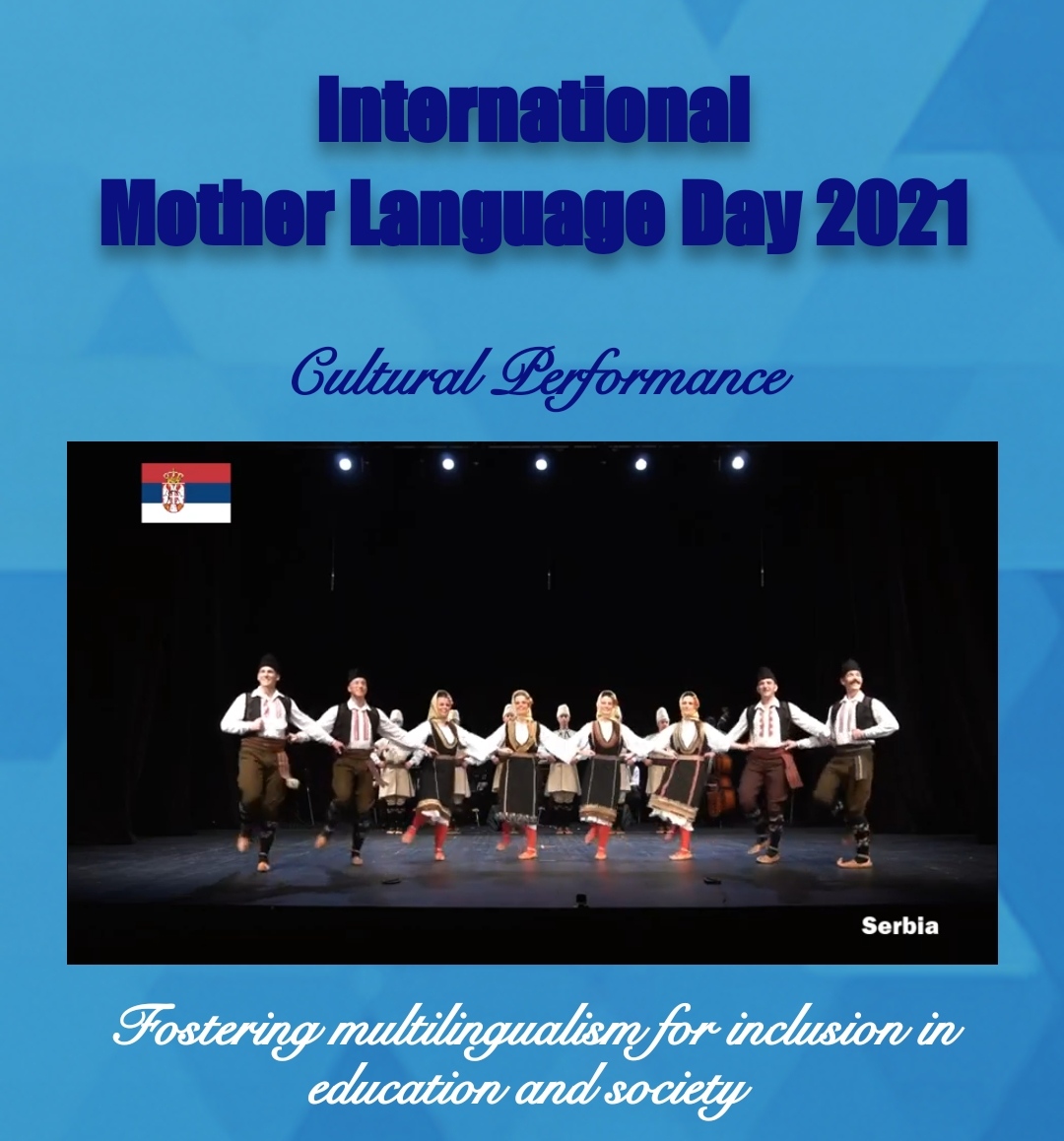 This year, the Republic of Serbia also participated in the celebration of the International Mother Language Day (21st February) in UNESCO, organized by the Permanent Delegation of Bangladesh to this Organization. On this occasion, an exhibition of languages was set up on a special website (www.eventsbangladeshinparis.fr) and a pre-recorded cultural program was presented. The Republic of Serbia was presented at the language exhibition with two banners showing the Cyrillic alphabet and the song "Fish and Girl". We also participated in a cultural program with video materials showing the performance of several songs in Serbian language and kolo by the ensemble "Kolo ", as well as the song "We are the children of heaven" by the children's choir "Lira" from the elementary school "Mica Stanojlovic" from Koceljeva. The presented materials were prepared by the relevant line ministries of culture and information and education, science and technological development. This year, the Republic of Serbia also participated in the celebration of the International Mother Language Day (21st February) in UNESCO, organized by the Permanent Delegation of Bangladesh to this Organization. On this occasion, an exhibition of languages was set up on a special website (www.eventsbangladeshinparis.fr) and a pre-recorded cultural program was presented. The Republic of Serbia was presented at the language exhibition with two banners showing the Cyrillic alphabet and the song "Fish and Girl". We also participated in a cultural program with video materials showing the performance of several songs in Serbian language and kolo by the ensemble "Kolo ", as well as the song "We are the children of heaven" by the children's choir "Lira" from the elementary school "Mica Stanojlovic" from Koceljeva. The presented materials were prepared by the relevant line ministries of culture and information and education, science and technological development. |
|
|
| Metropolitan Porfirije of Zagreb and Ljubljana elected as the new Patriarch of Serbia |
|
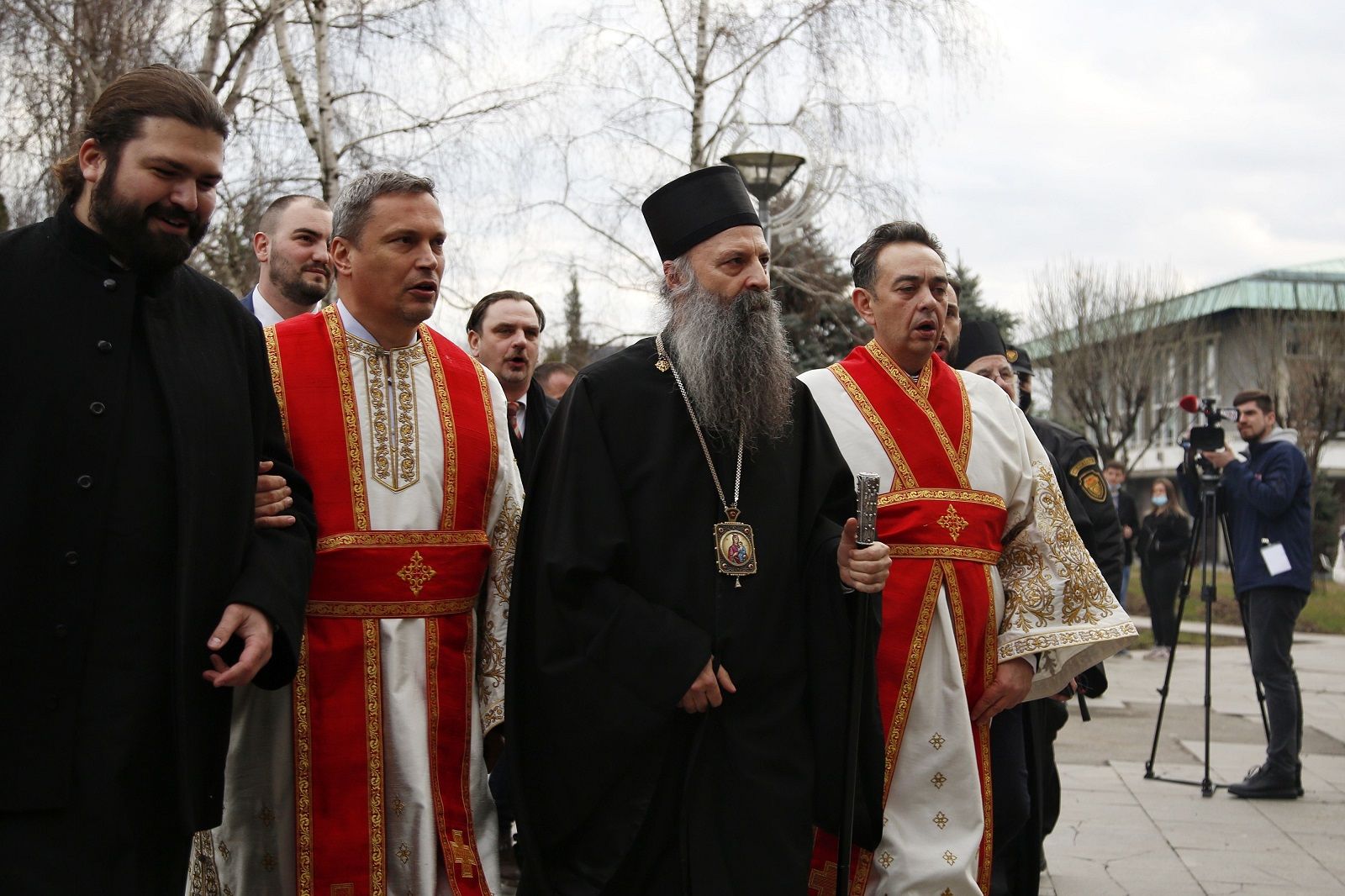 The Holy Assembly of Bishops of the Serbian Orthodox Church elected His Eminence Metropolitan Porfirije of Zagreb-Ljubljana, PhD, as the new Serbian Patriarch, in its convocation in Memorial Cathedral of Saint Sava in Belgrade on 18 February 2021. The Holy Assembly of Bishops of the Serbian Orthodox Church elected His Eminence Metropolitan Porfirije of Zagreb-Ljubljana, PhD, as the new Serbian Patriarch, in its convocation in Memorial Cathedral of Saint Sava in Belgrade on 18 February 2021.
Immediately after the election a thanksgiving service was officiated and Many Years was chanted to the Archbishop of Pec, Metropolitan of Belgrade-Karlovci and Serbian Patriarch Porfirije. Bells at Saint Sava Cathedral in the Vracar district of Belgrade rang a few minutes before 4:00 pm indicating that the 46th Patriarch of Serbia was elected.
Newly-elected Archbishop of Pec, Metropolitan of Belgrade-Karlovci and Serbian Patriarch Porfirije (Peric) was born on 22 July 1961 in Becej, to father Radivoje and Mother Radojka. He was baptized as Prvoslav. He finished primary school in Curug, and the “Jovan Jovanovic Zmaj” Grammar School in Novi Sad. He was ordained a monk according to the rite of small schime by his spiritual father, then hieromonk Dr. Irinej (Bulovic), at Decani Monastery on Sunday of St. Thomas in 1985.
|
|
|
| Statehood Day of the Republic of Serbia |
|
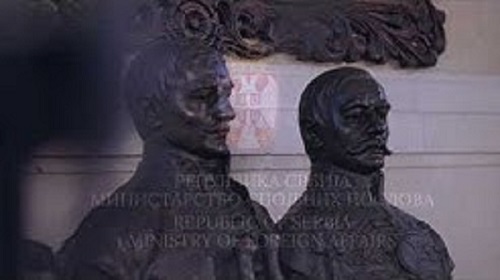 |
|
|
| President Vucic: Serbia is ready for dialogue on Kosovo and Metohija, but will refuse being humiliated |
|
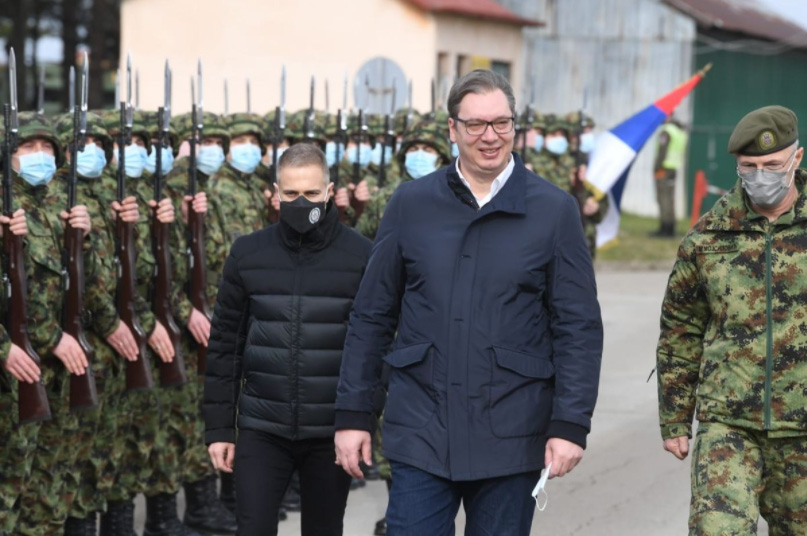 President of the Republic and Supreme Commander of the Serbian Army Aleksandar Vucic attended a demonstration of capabilities of one part of Serbian Army units in the "Rastko Nemanjić" barracks in Pancevo. On this occasion, President Vucic stated that Serbia was ready to continue the EU-facilitated dialogue with Pristina at any point, while respecting also the position of the United States as well as the positions of Russia and China. President of the Republic and Supreme Commander of the Serbian Army Aleksandar Vucic attended a demonstration of capabilities of one part of Serbian Army units in the "Rastko Nemanjić" barracks in Pancevo. On this occasion, President Vucic stated that Serbia was ready to continue the EU-facilitated dialogue with Pristina at any point, while respecting also the position of the United States as well as the positions of Russia and China.
The President said that he would rather put his "head on the chopping block" than sign any document with a recognition and reminded that he had already once refused to do so in Washington, where there were two versions of the agreement.
He stated that he immediately had his delegation leave the meeting, that he told the U.S. delegation that Serbia would not sign such an agreement, while conveying that Serbia would always endeavour to hold peaceful talks in order to preserve peace, but that it would not take any humiliation.
|
|
|
| Participation of the representatives of the Permanent Delegation of the Republic of Serbia to UNESCO in the online commemoration ceremony on the occasion of the International Day of Commemoration in Memory of the Victims of the Holocaust |
|
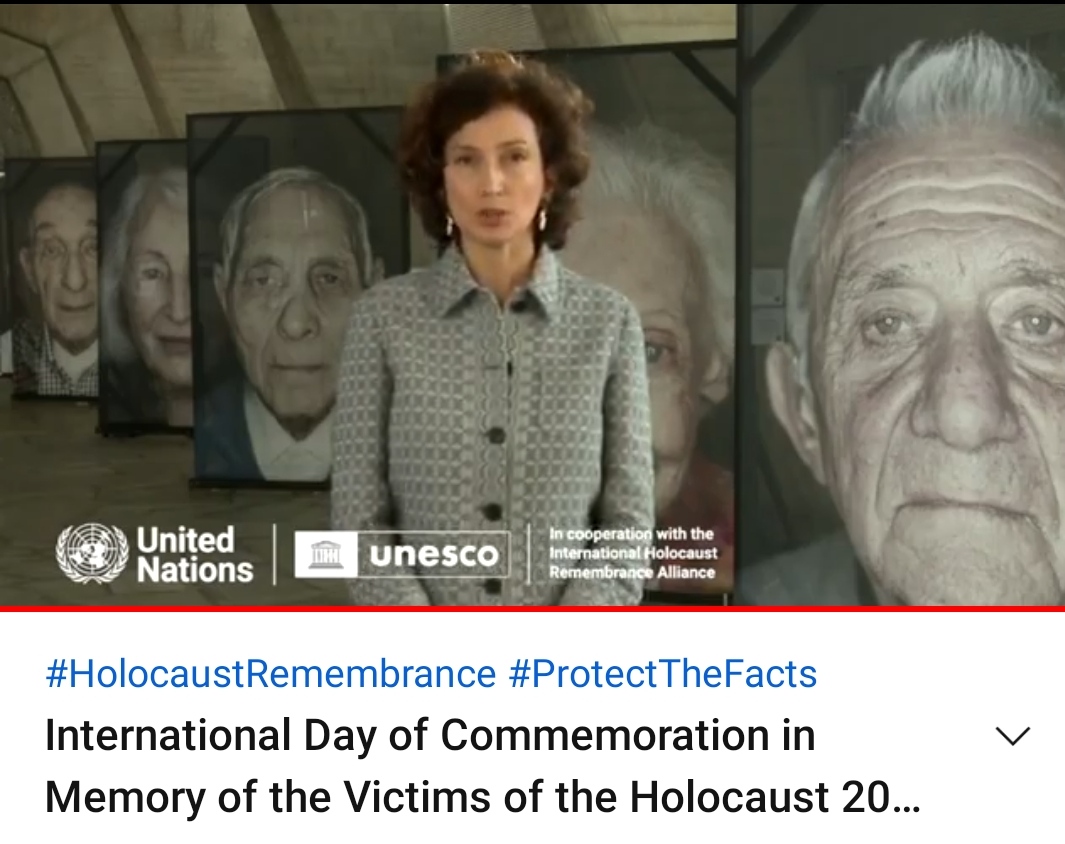 Representatives of the Permanent Delegation of the Republic of Serbia to UNESCO followed the online commemoration ceremony marking the International Day of Commemoration in Memory of the Victims of the Holocaust (January 27). The ceremony was organized by UNESCO and the United Nations, in cooperation with the International Holocaust Remembrance Alliance. UN Secretary General Antonio Guterres and UNESCO Director General Audrey Azoulay, as well as German Chancellor Angela Merkel participated at this ceremony. Representatives of the Permanent Delegation of the Republic of Serbia to UNESCO followed the online commemoration ceremony marking the International Day of Commemoration in Memory of the Victims of the Holocaust (January 27). The ceremony was organized by UNESCO and the United Nations, in cooperation with the International Holocaust Remembrance Alliance. UN Secretary General Antonio Guterres and UNESCO Director General Audrey Azoulay, as well as German Chancellor Angela Merkel participated at this ceremony. 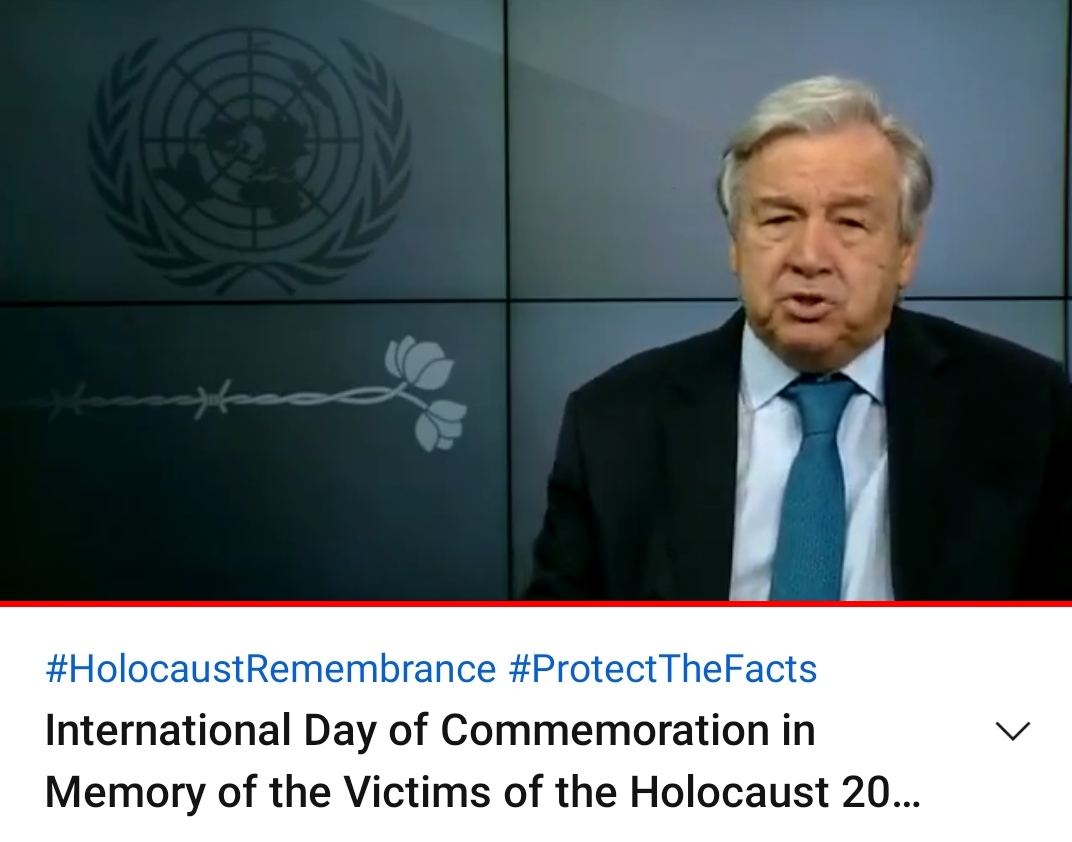 |
|
|
| Participation of the Permanent Delegation of the Republic of Serbia to UNESCO in the second part of the 210th session of the UNESCO Executive Board |
|
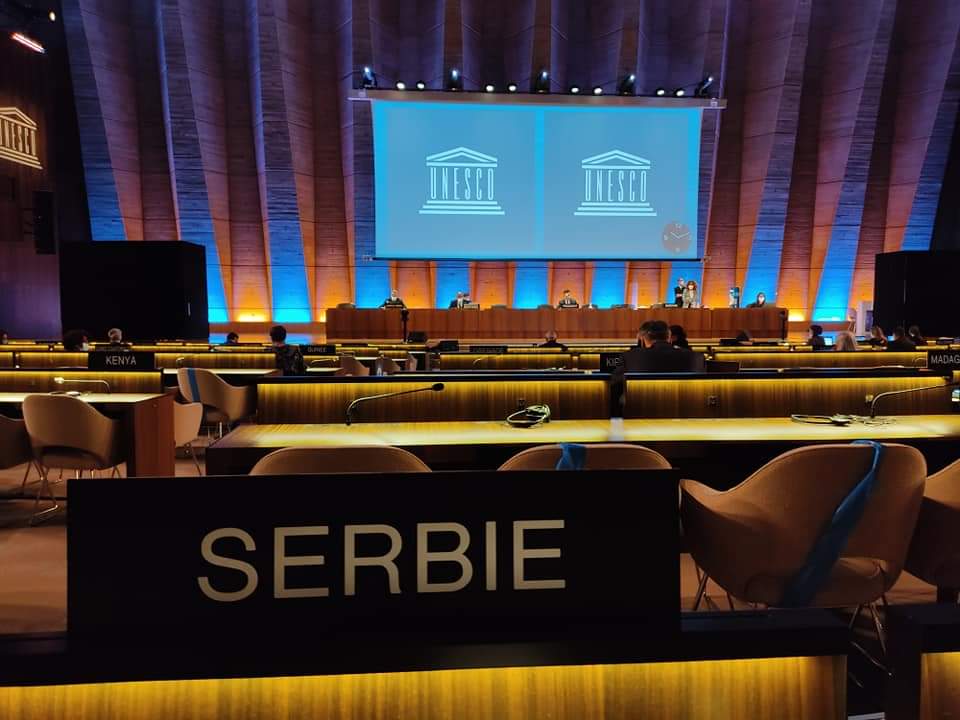 Representatives of the Permanent Delegation of the Republic of Serbia to UNESCO participated in the second part of the 210th session of the UNESCO Executive Board, which was held from 20 to 27 January 2021. At this session, various important issues from the domain of UNESCO's work were discussed, such as the strategic transformation of the Organization and the preparation of its Medium-Term Strategy for the period from 2022 to 2029, as well as the UNESCO Programme and Budget for the period from 2022 to 2025. Through its active participation in the work of the plenary meetings and the commissions of the Executive Board, the Permanent Delegation of the Republic of Serbia intended to contribute to the successful outcome of this session. Representatives of the Permanent Delegation of the Republic of Serbia to UNESCO participated in the second part of the 210th session of the UNESCO Executive Board, which was held from 20 to 27 January 2021. At this session, various important issues from the domain of UNESCO's work were discussed, such as the strategic transformation of the Organization and the preparation of its Medium-Term Strategy for the period from 2022 to 2029, as well as the UNESCO Programme and Budget for the period from 2022 to 2025. Through its active participation in the work of the plenary meetings and the commissions of the Executive Board, the Permanent Delegation of the Republic of Serbia intended to contribute to the successful outcome of this session. |
|
|
| Minister Selakovic speaks for Politika: The year of rejuvenation of Serbian diplomacy |
|
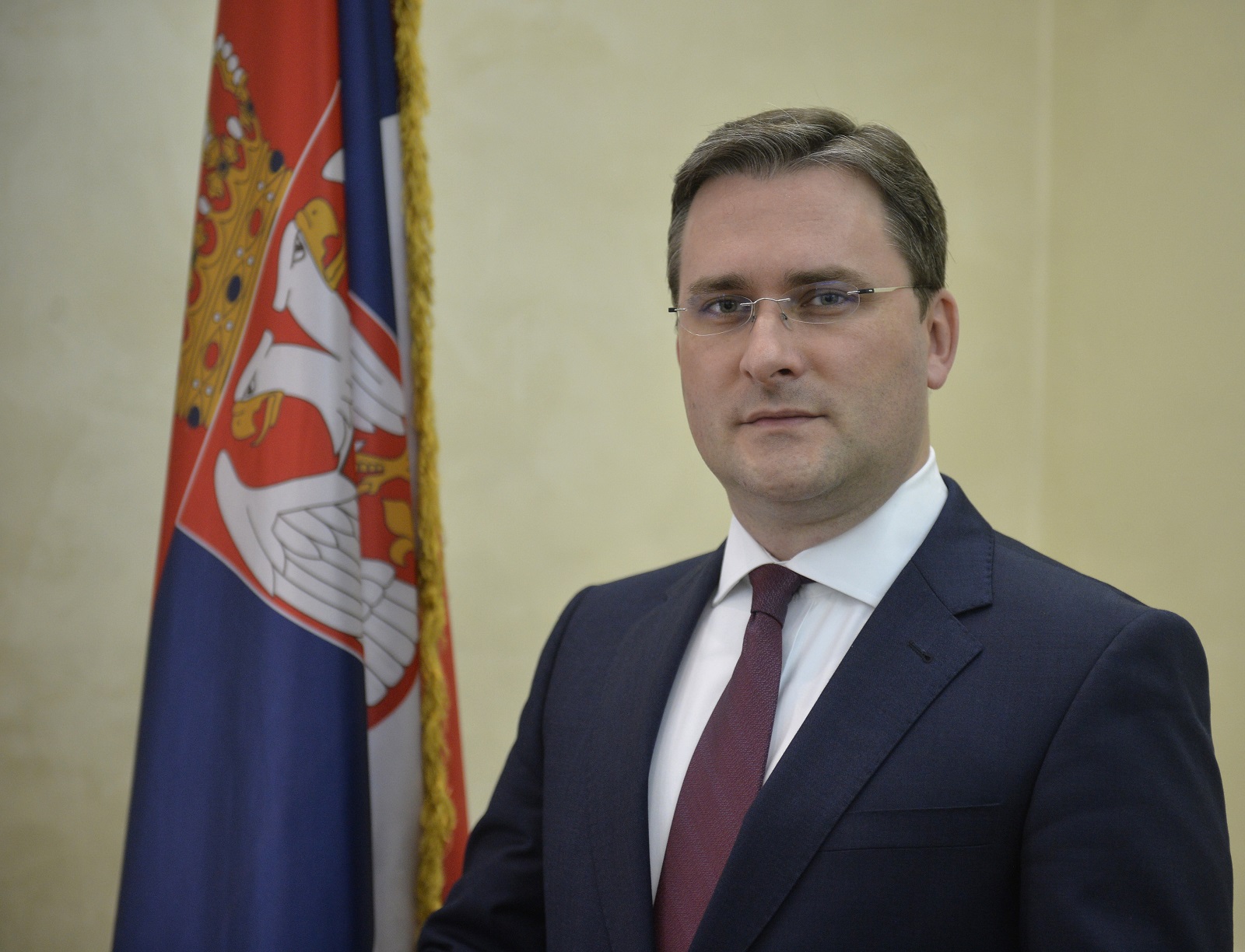 Serbia's foreign policy positions are naturally being adjusted to the new developments at the international level, but our foreign policy priorities have not changed in a long time. Our top and most important interest is to preserve good-neighbourly relations and stability and peace in the region and, in the same context, to find a peaceful and just solution to the problems in Kosovo and Metohija, Serbian Foreign Minister Nikola Selakovic said in an interview with Politika daily. Serbia's foreign policy positions are naturally being adjusted to the new developments at the international level, but our foreign policy priorities have not changed in a long time. Our top and most important interest is to preserve good-neighbourly relations and stability and peace in the region and, in the same context, to find a peaceful and just solution to the problems in Kosovo and Metohija, Serbian Foreign Minister Nikola Selakovic said in an interview with Politika daily.
Another lasting interest of ours is full membership of the European Union, because this is the type of society we strive for. At the bilateral level, our goal is to strengthen ties with traditional friends, the Russian Federation and the People's Republic of China, but also to build new partner relations with the United States. One of the most important tasks of our foreign policy is to improve the position and protect the rights and identity of our people in the region, as well as to provide various types of support to Serbs in the diaspora. All these are very important and more often than not complementary goals, Nikola Selakovic pointed out.
|
|
|
| President Vucic: Serbia is the first in Europe in terms of growth |
|
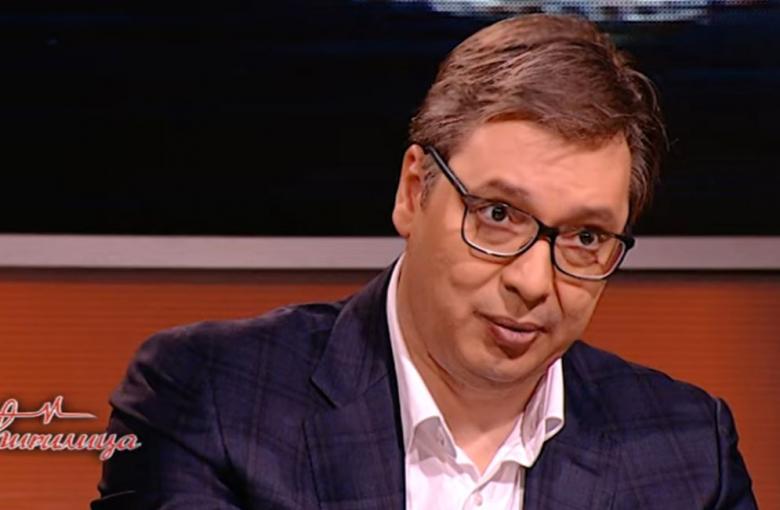 Serbian President Aleksandar Vucic pointed out that Serbia is the first in Europe in terms of economic growth, which will be officially confirmed at the end of March, and that this was possible owing to the reform measures taken since 2014 and the rapid opening of the country after the first wave of corona virus. Serbian President Aleksandar Vucic pointed out that Serbia is the first in Europe in terms of economic growth, which will be officially confirmed at the end of March, and that this was possible owing to the reform measures taken since 2014 and the rapid opening of the country after the first wave of corona virus.
The President pointed out that Serbia had a growth of 5.2 percent in the first quarter, while the Eurozone was at minus 3.2 percent, in the second quarter Serbia had a growth of minus 6.3 percent, while the Eurozone was at minus 14.7 percent, and in the third quarter, when the Eurozone was at minus 4.3 percent, Serbia's figure was only minus 1.4 percent.
Vucic stated that Montenegro, for example, recorded as much as 26 percent minus in the third quarter.
|
|
|
| Every Serb in the diaspora is potentially a lobbyist |
|
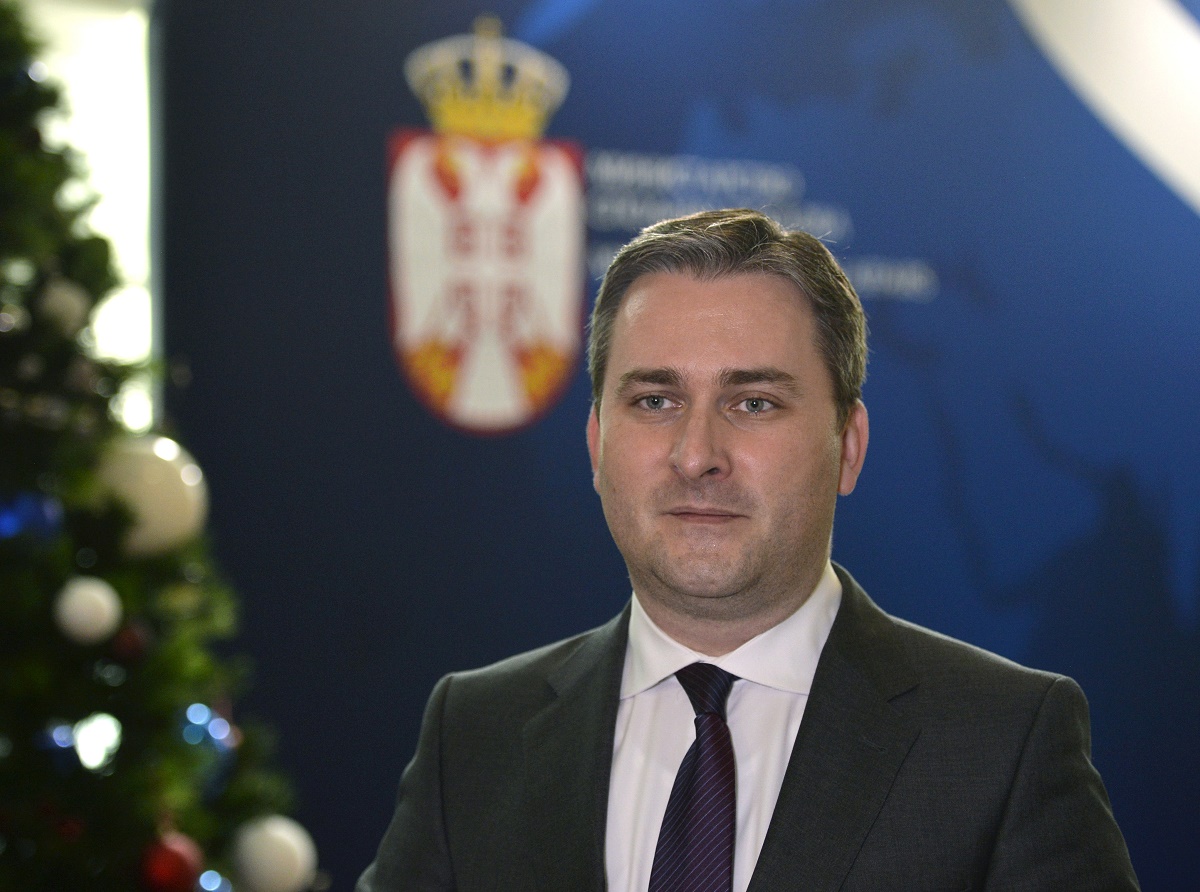 Our compatriots living abroad are one of the great potentials that the state has not recognized in the right way so far, which is why a different approach is needed to the issue of how to strengthen our diaspora and use the good will of people who are potential lobbyists for the interests of Serbia and the Serbian people, Foreign Minister Nikola Selakovic said. Our compatriots living abroad are one of the great potentials that the state has not recognized in the right way so far, which is why a different approach is needed to the issue of how to strengthen our diaspora and use the good will of people who are potential lobbyists for the interests of Serbia and the Serbian people, Foreign Minister Nikola Selakovic said.
"When it comes to Serbs in the diaspora, and especially in the region, this issue has been a kind of an unattended crop which requires a lot of work, and even when a lot is done at once this is not apparent immediately ", Minister Selakovic stated in an interview with Tanjug.
He emphasized that the appointment of the Director of the Office for Cooperation with the Diaspora and Serbs in the Region for the first time after almost seven years since this body was formed within the Ministry of Foreign Affairs, shows that it is one of the priorities of the Ministry he is at the helm of.
|
|
|
| Minister Selakovic: New ambassadors will be appointed this year, but the goals remain the same |
|
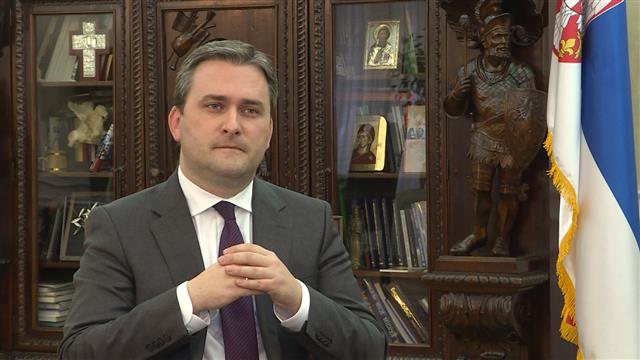 This year, Serbia could finally have Ambassadors and Consuls General appointed to about a third of the currently vacant positions in the country's diplomatic and consular missions in the world, and Minister of Foreign Affairs Nikola Selakovic is convinced that most of these positions will be filled, as he points out, by the best possible people. This year, Serbia could finally have Ambassadors and Consuls General appointed to about a third of the currently vacant positions in the country's diplomatic and consular missions in the world, and Minister of Foreign Affairs Nikola Selakovic is convinced that most of these positions will be filled, as he points out, by the best possible people.
"In the next year, I am convinced that the majority of these vacancies will be filled", Selakovic told Tanjug, emphasizing that the work is being done gradually, because the state wants to show that is has a quality staff who will represent Serbia's interests in the best possible way.
|
|
|
| President Vucic: Serbia to remain on the course of a winning policy of stability |
|
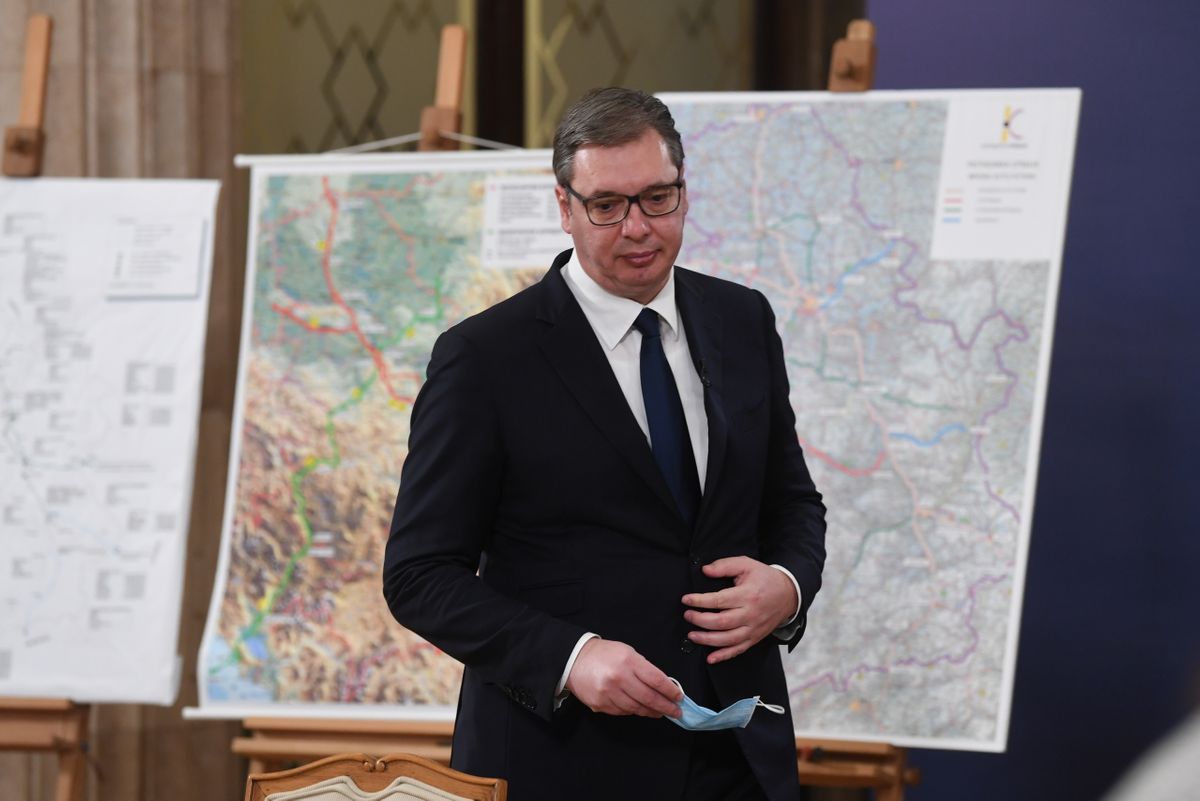 Preservation of peace, taking care of the health and better living standard are key for Serbia in 2021, underlined President of the Republic Aleksandar Vucic, convinced that even though the completion of this ambitious and by no means easy task will be anything but straightforward, best results can be achieved by working in concert with the Government, while ensuring security and a future of certainty for the citizens. Preservation of peace, taking care of the health and better living standard are key for Serbia in 2021, underlined President of the Republic Aleksandar Vucic, convinced that even though the completion of this ambitious and by no means easy task will be anything but straightforward, best results can be achieved by working in concert with the Government, while ensuring security and a future of certainty for the citizens.
The President said that Serbia has set for itself great and ambitious goals for the next year, notwithstanding the complex international and regional circumstances, and that it will endeavour to fully preserve peace and stability in the region and the country, while safeguarding the vital national and state interests.
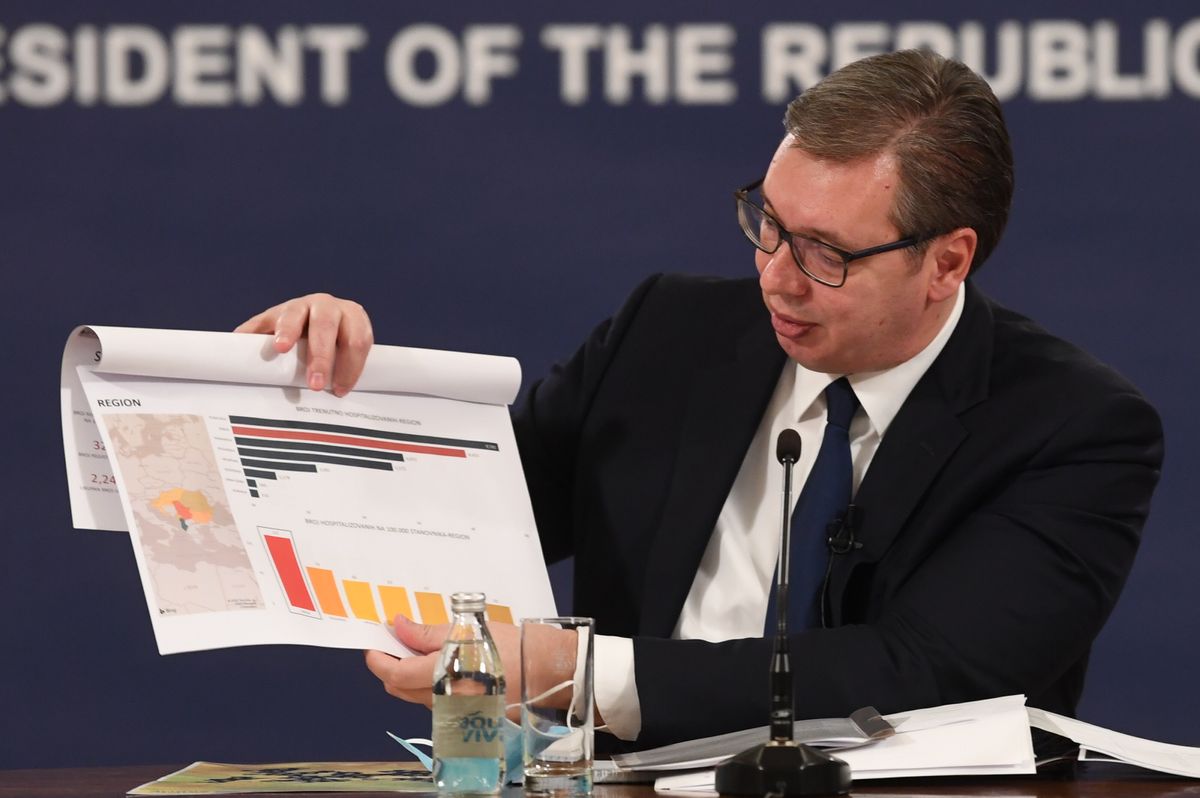 "Serbia will remain on the course of a winning policy - the policy of stability", President Vucic said and stressed that our country remains on the European integration path and that it will carefully foster its friendship with Russia and China, while building a friendship with the United States as well. "Serbia will remain on the course of a winning policy - the policy of stability", President Vucic said and stressed that our country remains on the European integration path and that it will carefully foster its friendship with Russia and China, while building a friendship with the United States as well.
According to the President, Serbia will continue to pursue a winning policy, with the country itself as a top priority, i.e., a policy that will enable Serbia to continue being one of the top three countries in Europe in terms of growth rate in the next two years.
A precondition for that, the President noted, is to crack down on criminal groups, but also to ensure even bigger investments in the police and army forces.
|
|
|
| Serbian Prime Minister the first PM in Europe to receive a Covid-19 vaccine |
|
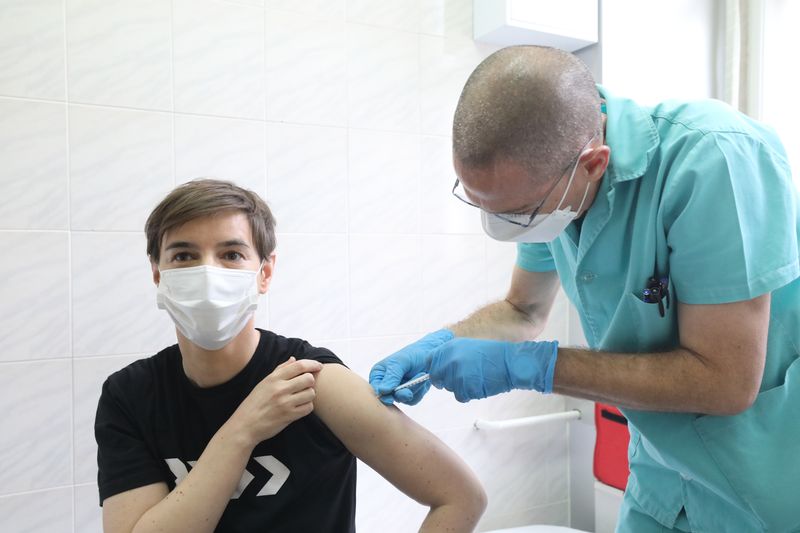 Prime Minister of the Republic of Serbia Ana Brnabic received today the first vaccine against the coronavirus made by Pfizer company, at the Torlak Institute of Virology, Vaccines and Sera. Prime Minister of the Republic of Serbia Ana Brnabic received today the first vaccine against the coronavirus made by Pfizer company, at the Torlak Institute of Virology, Vaccines and Sera.
Brnabic, who is the first European Prime Minister to receive the vaccine, pointed out that this day may be the first since 6 March that we have a reason for a smile on our faces as it marks the beginning of the end of the coronavirus pandemic in Serbia, but also in Europe and the world.
As Prime Minister and as someone who leads the COVID-19 Crisis Response Team, I felt obliged to be the first to receive the vaccine, to show that we believe in it, as well as in our institutions - the Medicines and Medical Devices Agency of Serbia and experts who worked round the clock to test the vaccine, she said.
|
|
|
| Rastovac Siamashvili: Pristina has no support for UNESCO - |
|
.jpg) In a statement for Tanjug news agency, Serbian Ambassador to UNESCO Tamara Rastovac Siamashvili said that Pristina is aware that it has no support to apply for UNESCO, primarily because of how well-regarded Serbia is in this organization, but also owing to the active engagement of Belgrade in the organization's bodies. In a statement for Tanjug news agency, Serbian Ambassador to UNESCO Tamara Rastovac Siamashvili said that Pristina is aware that it has no support to apply for UNESCO, primarily because of how well-regarded Serbia is in this organization, but also owing to the active engagement of Belgrade in the organization's bodies.
The Ambassador said that the fact that Zlakusa pottery making was inscribed on the UNESCO list of intangible cultural heritage is very important in the context of Serbia's visibility and international promotion of our cultural heritage, stressing that the nomination for the inscription was prepared applying a high level of expertise.
Speaking for Tanjug she said that there is always a threat that Pristina might apply for membership, but that there is a lot going to their disadvantage in this context.
In the first place, she stressed, Serbia was re-elected last year to the UNESCO Executive Board (EB) which discusses all issues before being submitted to the General Assembly of the organization. Furthermore, Serbia is also on the Bureau of the Executive Board, an even more specific body which discusses all issues before the EB does.
"Taking into account that we are a member of both the Executive Board and the Bureau, such application would be first considered in these bodies where Serbia has played a highly active role", Ambassador Rastovac Siamashvili said.
|
|
|
| Minister Selakovic: The Role of the UN is of special importance for the protection of sovereignty and territorial integrity of Serbia |
|
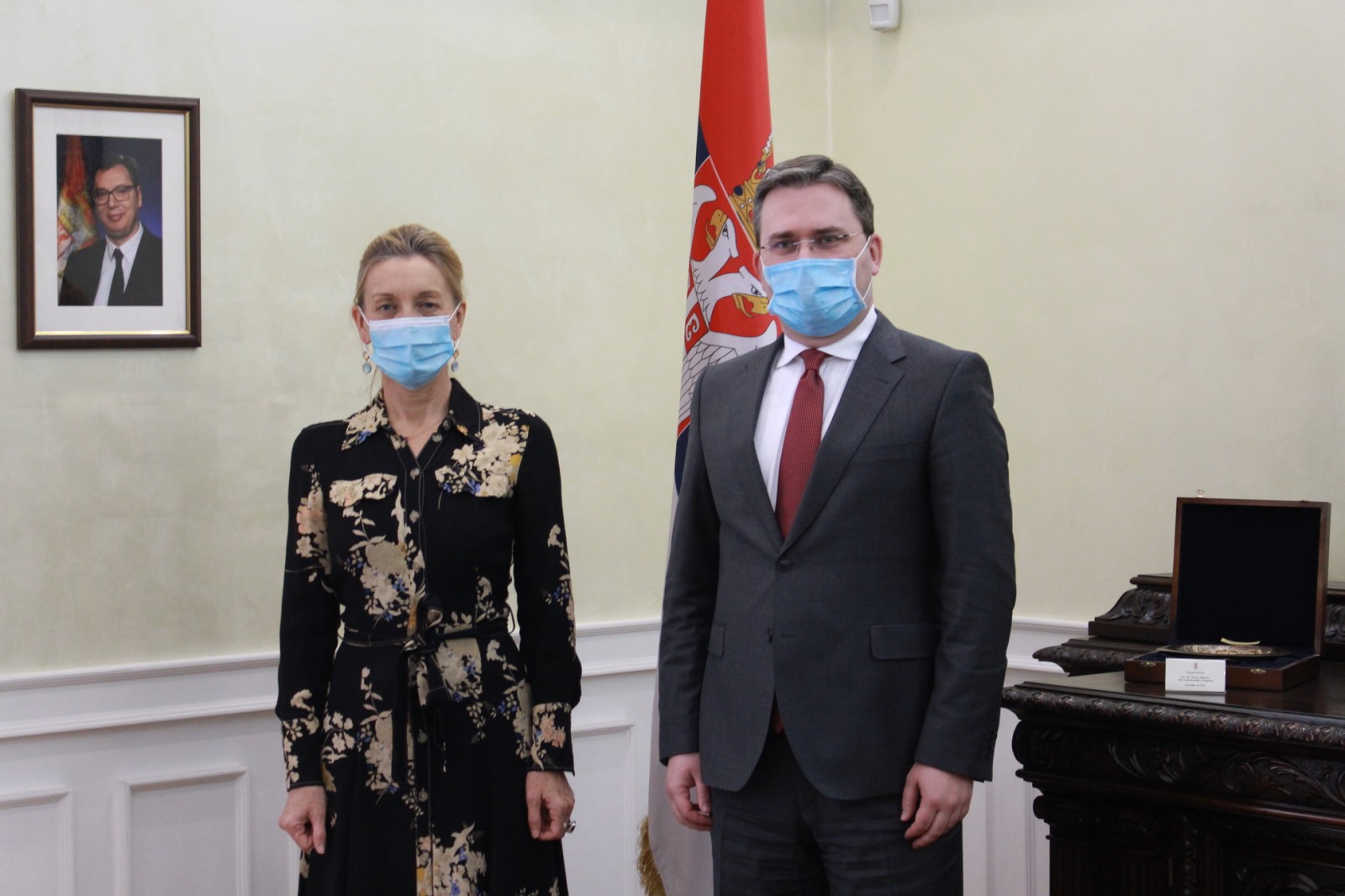 Minister of Foreign Affairs of the Republic of Serbia Nikola Selakovic had talks today with United Nations Resident Coordinator in Serbia Françoise Jacob. Minister of Foreign Affairs of the Republic of Serbia Nikola Selakovic had talks today with United Nations Resident Coordinator in Serbia Françoise Jacob.
The Serbian Foreign Minister pointed out that the UN Resident Coordinator was very important in harmonizing the activity of the 19 UN agencies active in the promotion of economic and social development in Serbia, on resident or non-resident basis.
The Minister said that Serbia considers the UN to be one of the most important multilateral organizations that is of special significance for the protection of our sovereignty and territorial integrity, and which represents a unique platform for the discussion and identification of sustainable solutions in various fields.
|
|
|
| Inscription of the Zlakusa pottery making on the UNESCO Representative List of the Intangible Cultural Heritage of Humanity |
|
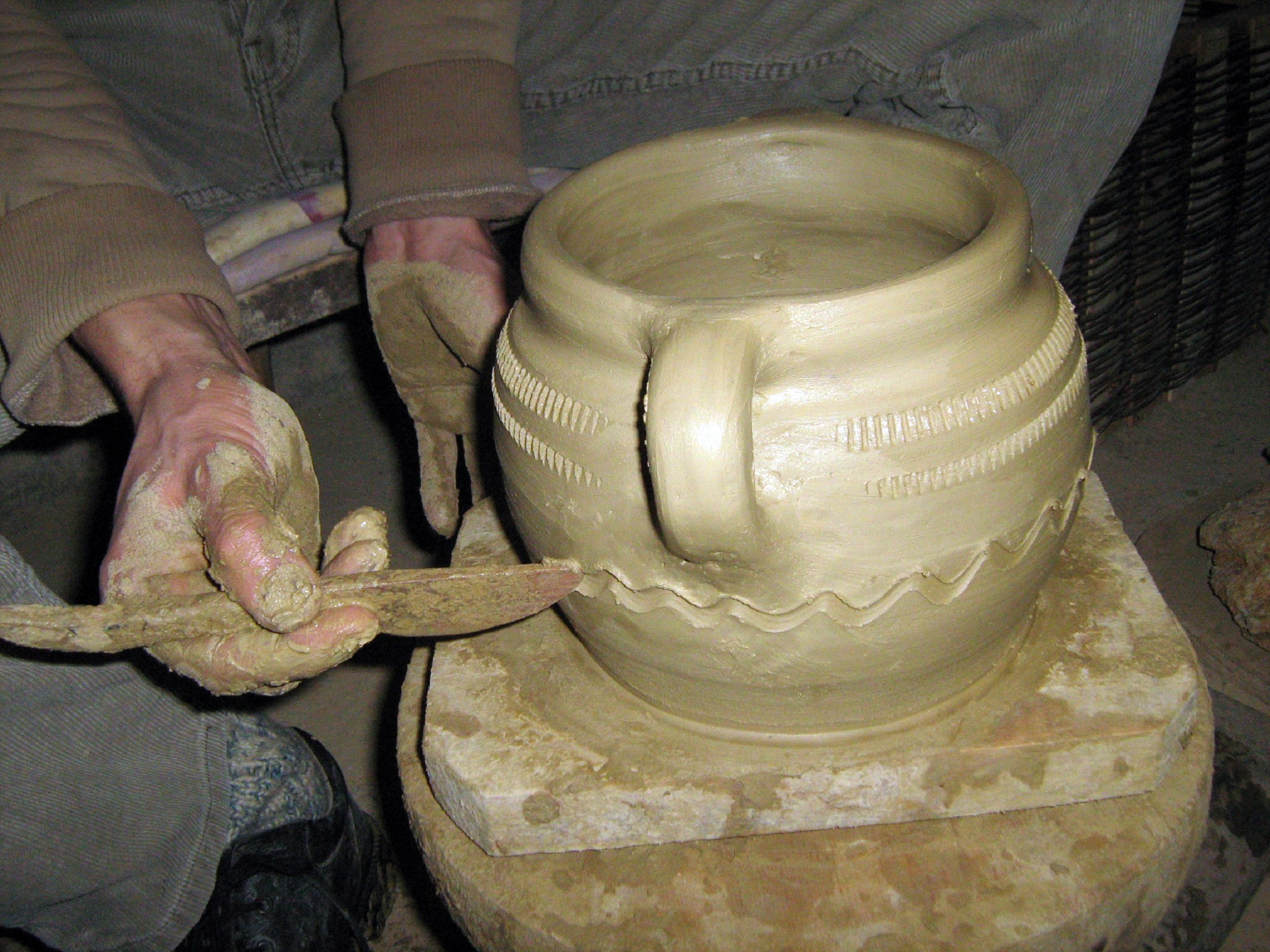 Delegation of the Republic of Serbia, composed of representatives of the Permanent Delegation of the to UNESCO and the Center for the Intangible Cultural Heritage of Serbia, within the Ethnographic Museum in Belgrade, participated at the fifteenth session of the Intergovernmental Committee for the Safeguarding of the Intangible Cultural Heritage that took place online from 14 to 19 December 2020. At this session, a decision was made to inscribe Zlakusa pottery making, based on the proposal of the Republic of Serbia, on the UNESCO Representative List of the Intangible Cultural Heritage of Humanity. In addition to Zlakusa pottery making, three more elements from the Republic of Serbia have so far been inscribed to this list: Slava - celebration of family saint patron’s day, traditional folk dance „Kolo“ as well as singing to the accompaniment of the Gusle, by which means these segments of Serbia's cultural heritage are recognized also on a wider, international level. Delegation of the Republic of Serbia, composed of representatives of the Permanent Delegation of the to UNESCO and the Center for the Intangible Cultural Heritage of Serbia, within the Ethnographic Museum in Belgrade, participated at the fifteenth session of the Intergovernmental Committee for the Safeguarding of the Intangible Cultural Heritage that took place online from 14 to 19 December 2020. At this session, a decision was made to inscribe Zlakusa pottery making, based on the proposal of the Republic of Serbia, on the UNESCO Representative List of the Intangible Cultural Heritage of Humanity. In addition to Zlakusa pottery making, three more elements from the Republic of Serbia have so far been inscribed to this list: Slava - celebration of family saint patron’s day, traditional folk dance „Kolo“ as well as singing to the accompaniment of the Gusle, by which means these segments of Serbia's cultural heritage are recognized also on a wider, international level. |
|
|
| STATEMENT BY THE MINISTRY OF FOREIGN AFFAIRS |
|
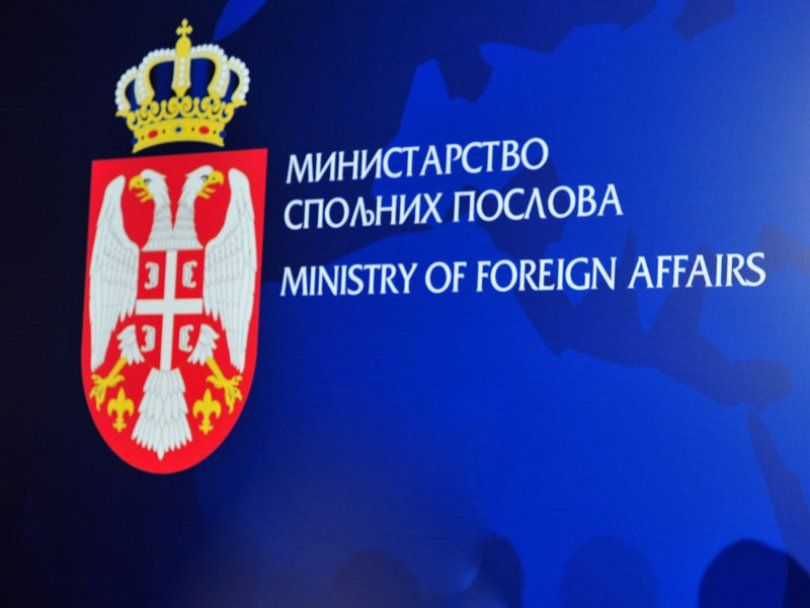 On the occasion of 10 December, the international Human Rights Day, the Ministry of Foreign Affairs of the Republic of Serbia reaffirms its commitment to the principles and values of the Universal Declaration of Human Rights, adopted on this day in 1948. On the occasion of 10 December, the international Human Rights Day, the Ministry of Foreign Affairs of the Republic of Serbia reaffirms its commitment to the principles and values of the Universal Declaration of Human Rights, adopted on this day in 1948.
The principles enshrined in the Universal Declaration of Human Rights have been the foundation for the development of international law in this field, and of the international system for the promotion and protection of human rights, as a unique achievement of modern civilization. It is incumbent upon us today to safeguard and strengthen the international system ensuring respect for human rights, to develop human rights standards, control the implementation of commitments, and also to continue cooperating with international and regional institutions on the protection of human rights.
|
|
|
| Chairmanship of the UNESCO Executive Board Committee on Non-Governmental Partners by the Republic of Serbia |
|
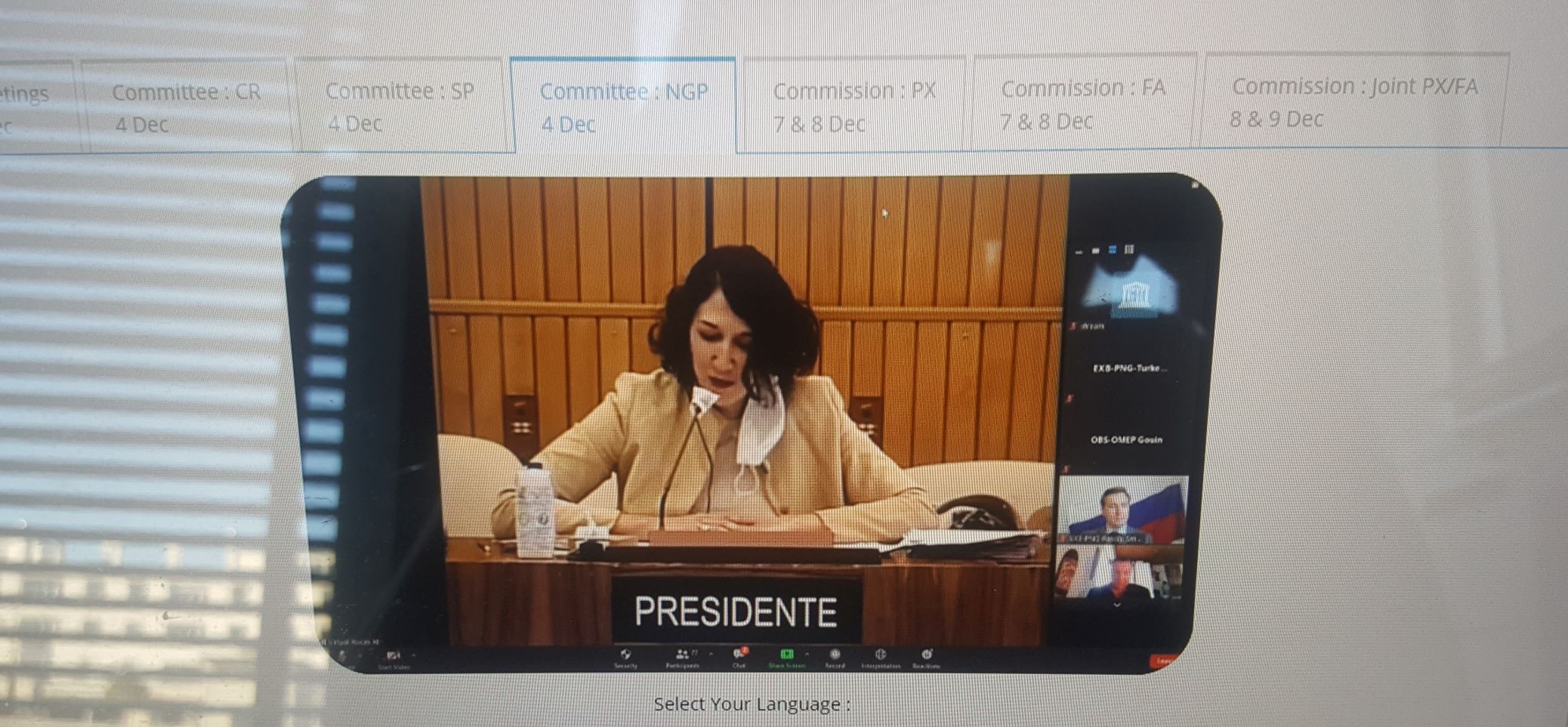 As part of the 210th session of the UNESCO Executive Board, a meeting of the Committee on Non-Governmental Partners was held on 4th December 2020, chaired by the Permanent Delegate of the Republic of Serbia to UNESCO, Ambassador Tamara Rastovac Siamashvili. At the meeting, various issues in the field of UNESCO's cooperation with the non-governmental sector were discussed, including the admission of certain organizations to the status of official partners of the Organization. As part of the 210th session of the UNESCO Executive Board, a meeting of the Committee on Non-Governmental Partners was held on 4th December 2020, chaired by the Permanent Delegate of the Republic of Serbia to UNESCO, Ambassador Tamara Rastovac Siamashvili. At the meeting, various issues in the field of UNESCO's cooperation with the non-governmental sector were discussed, including the admission of certain organizations to the status of official partners of the Organization.
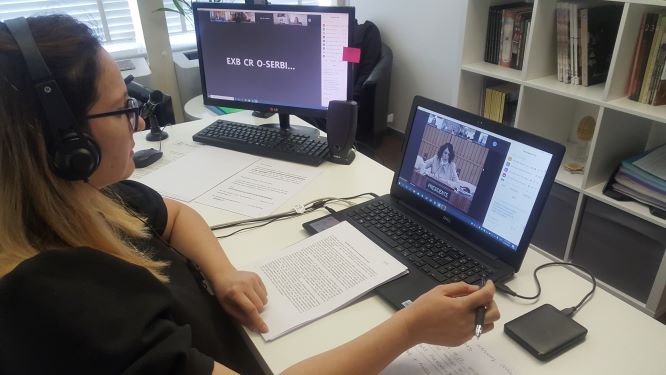
The Permanent Delegation of the Republic of Serbia to UNESCO also took an active part in the discussions within this very important committee of the UNESCO Executive Board. |
|
|
| Participation in the general debate of the 210th session of the Executive Board of UNESCO |
|
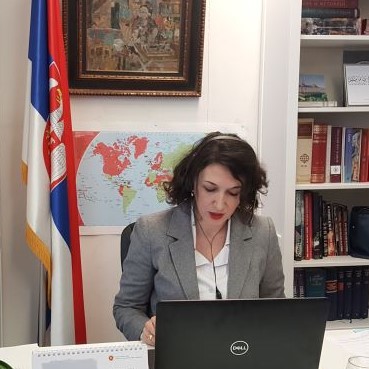 As part of the 210th session of the Executive Board of UNESCO, the first part of which will be held in virtual meetings from December 2 to 10, 2020, a general debate took place, during which Ambassador Tamara Rastovac Siamashvili spoke as a Permanent Delegate of the Republic of Serbia to UNESCO. In her speech, among others, she underlined Serbia's strong support for the principle of multilateralism and the irreplaceable role of UNESCO. She referred to the main issues on the Organization's agenda, such as strategic transformation, the implementation of UNESCO's global priorities, with particular emphasis on Africa, as well as on the forthcoming activities related to the Medium-Term Strategy and the Draft Program and Budget of the Organization. She underlined the importance that the Republic of Serbia attaches to the issues of education, protection of cultural heritage, promotion of the diversity of cultural expressions and development of creative industries, as well as the impact of climate change on cultural and natural heritage. As part of the 210th session of the Executive Board of UNESCO, the first part of which will be held in virtual meetings from December 2 to 10, 2020, a general debate took place, during which Ambassador Tamara Rastovac Siamashvili spoke as a Permanent Delegate of the Republic of Serbia to UNESCO. In her speech, among others, she underlined Serbia's strong support for the principle of multilateralism and the irreplaceable role of UNESCO. She referred to the main issues on the Organization's agenda, such as strategic transformation, the implementation of UNESCO's global priorities, with particular emphasis on Africa, as well as on the forthcoming activities related to the Medium-Term Strategy and the Draft Program and Budget of the Organization. She underlined the importance that the Republic of Serbia attaches to the issues of education, protection of cultural heritage, promotion of the diversity of cultural expressions and development of creative industries, as well as the impact of climate change on cultural and natural heritage.
Statement of the Republic of Serbia in the plenary debate of the 210th session of the UNESCO Executive Board |
|
|
| Participation at the 5th International Conference on Global Citizenship Education |
|
 Permanent Delegate of the Republic of Serbia to UNESCO, Ambassador Tamara Rastovac Siamashvili participated at the closing panel of the virtual 5th International Conference on Global Citizenship Education, which was organized from 3rd until 5th November 2020 by the Ministries of Foreign Affairs and Education of the Republic of Korea and the Asia-Pacific Centre of Education for International Understanding, in collaboration with UNESCO. Her participation was on behalf of the Group of Friends for Solidarity and Inclusion with Global Citizenship Education, of which the Republic of Serbia is a member. On this occasion, Ambassador Tamara Rastovac Siamashvili spoke about the prospects of Global Citizenship Education, especially in the context of the current COVID -19 pandemic, as well as the possibilities for achieving as better results in practice. She also referred to the achievements of the Group of Friends and the Republic of Serbia in this field. Permanent Delegate of the Republic of Serbia to UNESCO, Ambassador Tamara Rastovac Siamashvili participated at the closing panel of the virtual 5th International Conference on Global Citizenship Education, which was organized from 3rd until 5th November 2020 by the Ministries of Foreign Affairs and Education of the Republic of Korea and the Asia-Pacific Centre of Education for International Understanding, in collaboration with UNESCO. Her participation was on behalf of the Group of Friends for Solidarity and Inclusion with Global Citizenship Education, of which the Republic of Serbia is a member. On this occasion, Ambassador Tamara Rastovac Siamashvili spoke about the prospects of Global Citizenship Education, especially in the context of the current COVID -19 pandemic, as well as the possibilities for achieving as better results in practice. She also referred to the achievements of the Group of Friends and the Republic of Serbia in this field. |
|
|
| Participation of the Permanent Delegation of the Republic of Serbia in the informal virtual meeting of the members of the Executive Board of UNESCO |
|
 At the initiative of the Chairman of the Executive Board of UNESCO, an informal virtual meeting of the members of the Executive Board was held on November 4. During the meeting, further steps were discussed regarding the holding of the 210th session of the Executive Board, which was initially planned for the period from 4 - 18 November. Ambassador Tamara Rastovac Siamashvili spoke at the meeting on behalf of the Republic of Serbia. At the initiative of the Chairman of the Executive Board of UNESCO, an informal virtual meeting of the members of the Executive Board was held on November 4. During the meeting, further steps were discussed regarding the holding of the 210th session of the Executive Board, which was initially planned for the period from 4 - 18 November. Ambassador Tamara Rastovac Siamashvili spoke at the meeting on behalf of the Republic of Serbia. |
|
|
| Participation at the session of the General Assembly of the States Parties to the Convention for the Safeguarding of the Intangible Cultural Heritage |
|
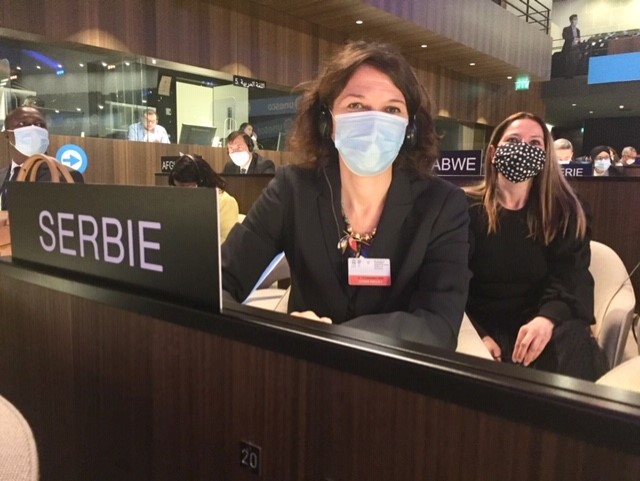 The representatives of the Permanent Delegation of the Republic of Serbia to UNESCO participated at the 8th session of the General Assembly of the States Parties to the Convention for the Safeguarding of the Intangible Cultural Heritage, which was held at the UNESCO headquarters in Paris, from September 8 to 10, 2020. The session was dedicated to the consideration of a number of important issues in the domain of this Convention, including the adoption of the Declaration on support to Lebanon. The Republic of Serbia attaches great importance to this Convention and so far has inscribed three elements on the UNESCO Representative List of the Intangible Cultural Heritage of Humanity (Slava - celebration of family saint patron’s day, traditional folk dance „Kolo“ and singing to the accompaniment of the Gusle). The representatives of the Permanent Delegation of the Republic of Serbia to UNESCO participated at the 8th session of the General Assembly of the States Parties to the Convention for the Safeguarding of the Intangible Cultural Heritage, which was held at the UNESCO headquarters in Paris, from September 8 to 10, 2020. The session was dedicated to the consideration of a number of important issues in the domain of this Convention, including the adoption of the Declaration on support to Lebanon. The Republic of Serbia attaches great importance to this Convention and so far has inscribed three elements on the UNESCO Representative List of the Intangible Cultural Heritage of Humanity (Slava - celebration of family saint patron’s day, traditional folk dance „Kolo“ and singing to the accompaniment of the Gusle). |
|
|
| Participation in a virtual meeting on support for Lebanon after the tragic explosion in Beirut |
|
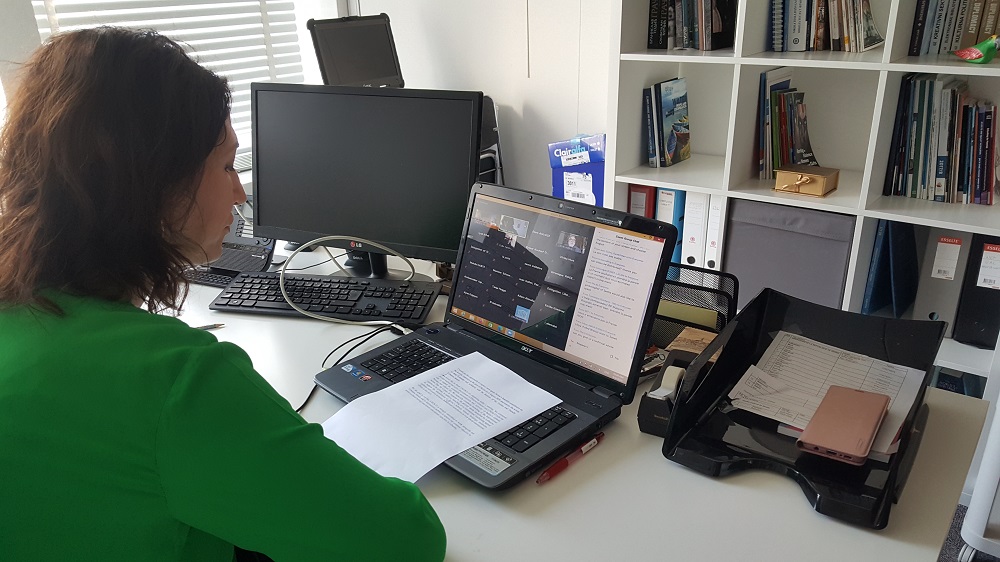 On 4th September 2020, the Permanent Delegation of the Republic of Serbia to UNESCO participated in a virtual meeting organized by the Director -General of UNESCO, in cooperation with the Permanent Delegation of Lebanon to UNESCO, to present UNESCO’s activities in the context of the tragic explosion in Beirut exactly one month ago. On this occasion, the Permanent Delegate of the Republic of Serbia to UNESCO, Ambassador Tamara Rastovac Siamashvili, among other things, once again expressed condolences and solidarity with the families of the victims and the friendly people of Lebanon. She commended prompt reaction and active involvement of the Director-General and UNESCO to support the sustainable reconstruction and recovery of cultural heritage and cultural life in the Lebanese capital, including the launch of the International Action Plan for Culture and a fundraising appeal to rehabilitate schools, historic buildings, museums and creative economy. On 4th September 2020, the Permanent Delegation of the Republic of Serbia to UNESCO participated in a virtual meeting organized by the Director -General of UNESCO, in cooperation with the Permanent Delegation of Lebanon to UNESCO, to present UNESCO’s activities in the context of the tragic explosion in Beirut exactly one month ago. On this occasion, the Permanent Delegate of the Republic of Serbia to UNESCO, Ambassador Tamara Rastovac Siamashvili, among other things, once again expressed condolences and solidarity with the families of the victims and the friendly people of Lebanon. She commended prompt reaction and active involvement of the Director-General and UNESCO to support the sustainable reconstruction and recovery of cultural heritage and cultural life in the Lebanese capital, including the launch of the International Action Plan for Culture and a fundraising appeal to rehabilitate schools, historic buildings, museums and creative economy. |
|
|
| Proclamation of "Djerdap" as the first UNESCO Global Geopark in Serbia |
|
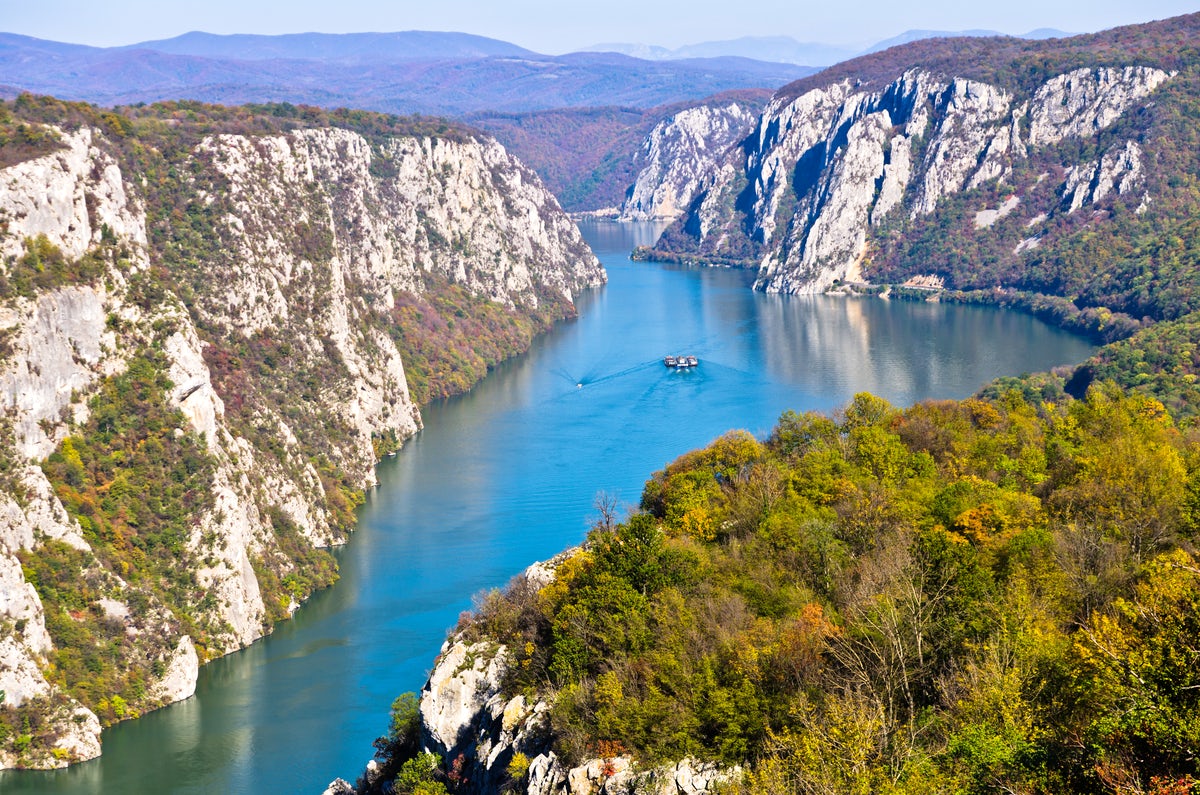 At its just concluded 209th session, the Executive Board of UNESCO endorsed the proclamation of "Djerdap" as a UNESCO Global Geopark, in accordance with the decision of the UNESCO Global Geoparks Council from the meeting held in Lombok (Indonesia), from 31st August to 2nd September 2019. "Djerdap" is the first UNESCO Global Geopark in the Republic of Serbia. Its proclamation and acceptance to the UNESCO Global Geoparks Network is a recognition and encouragement for the protection, preservation and promotion of diverse natural and cultural heritage of this area. At its just concluded 209th session, the Executive Board of UNESCO endorsed the proclamation of "Djerdap" as a UNESCO Global Geopark, in accordance with the decision of the UNESCO Global Geoparks Council from the meeting held in Lombok (Indonesia), from 31st August to 2nd September 2019. "Djerdap" is the first UNESCO Global Geopark in the Republic of Serbia. Its proclamation and acceptance to the UNESCO Global Geoparks Network is a recognition and encouragement for the protection, preservation and promotion of diverse natural and cultural heritage of this area. |
|
|
| Participation of the Permanent Delegation of the Republic of Serbia to UNESCO in the plenary debate of the 209th session of the UNESCO Executive Board |
|
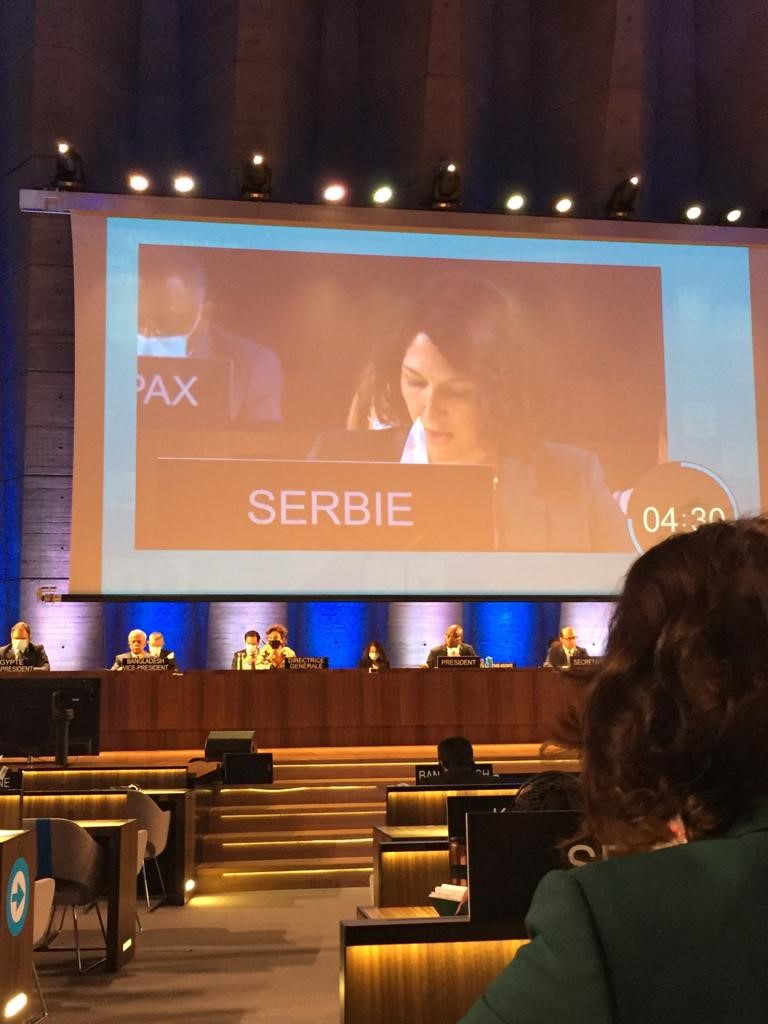 The Permanent Delegation of the Republic of Serbia to UNESCO participated in the plenary debate of the 209th session of the UNESCO Executive Board, which was held on 2nd and 3rd July 2020. On behalf of the Republic of Serbia, the Permanent Delegate to UNESCO, Ambassador Tamara Rastovac Siamashvili, spoke. The Permanent Delegation of the Republic of Serbia to UNESCO participated in the plenary debate of the 209th session of the UNESCO Executive Board, which was held on 2nd and 3rd July 2020. On behalf of the Republic of Serbia, the Permanent Delegate to UNESCO, Ambassador Tamara Rastovac Siamashvili, spoke.
In her speech, emphasizing Serbia's commitment to multilateralism and international cooperation, as well as to the mandate and values of UNESCO, she referred to the role of UNESCO in today's world, especially in the context of the crisis caused by the Covid-19 pandemic. She also spoke about other concrete issues on the agenda of UNESCO, including the strategic transformation of the Organization, education, engagement of UNESCO in the context of its Global Priority Africa, etc.
Statement of the Republic of Serbia in the plenary debate of the 209th session of the UNESCO Executive Board |
|
|
| Participation of the Permanent Delegation of the Republic of Serbia to UNESCO at the special session of the UNESCO Executive Board |
|
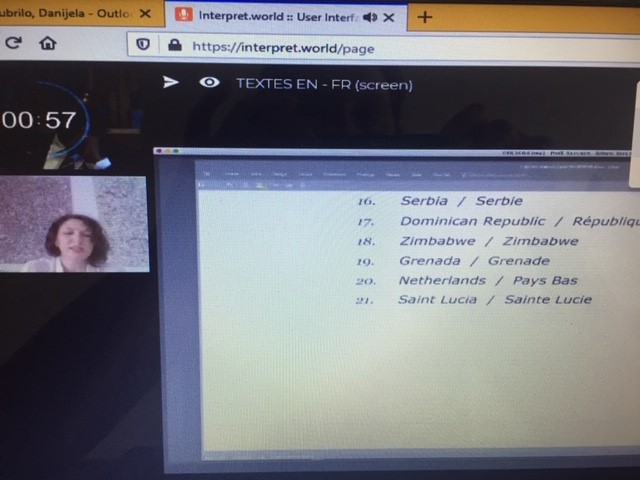 The Permanent Delegation of the Republic of Serbia to UNESCO participated on 8th and 9th June 2020 at the special session of the UNESCO Executive Board, which was held for the first time in a virtual format. The session was dedicated to the activities of UNESCO in the context of the Covid-19 pandemic and the methods of work of the Executive Board in these conditions. The Permanent Delegation of the Republic of Serbia to UNESCO participated on 8th and 9th June 2020 at the special session of the UNESCO Executive Board, which was held for the first time in a virtual format. The session was dedicated to the activities of UNESCO in the context of the Covid-19 pandemic and the methods of work of the Executive Board in these conditions. |
|
|
| Permanent Delegation of Serbia to UNESCO joins Group of Friends of Solidarity and Inclusion with Global Citizenship Education |
|
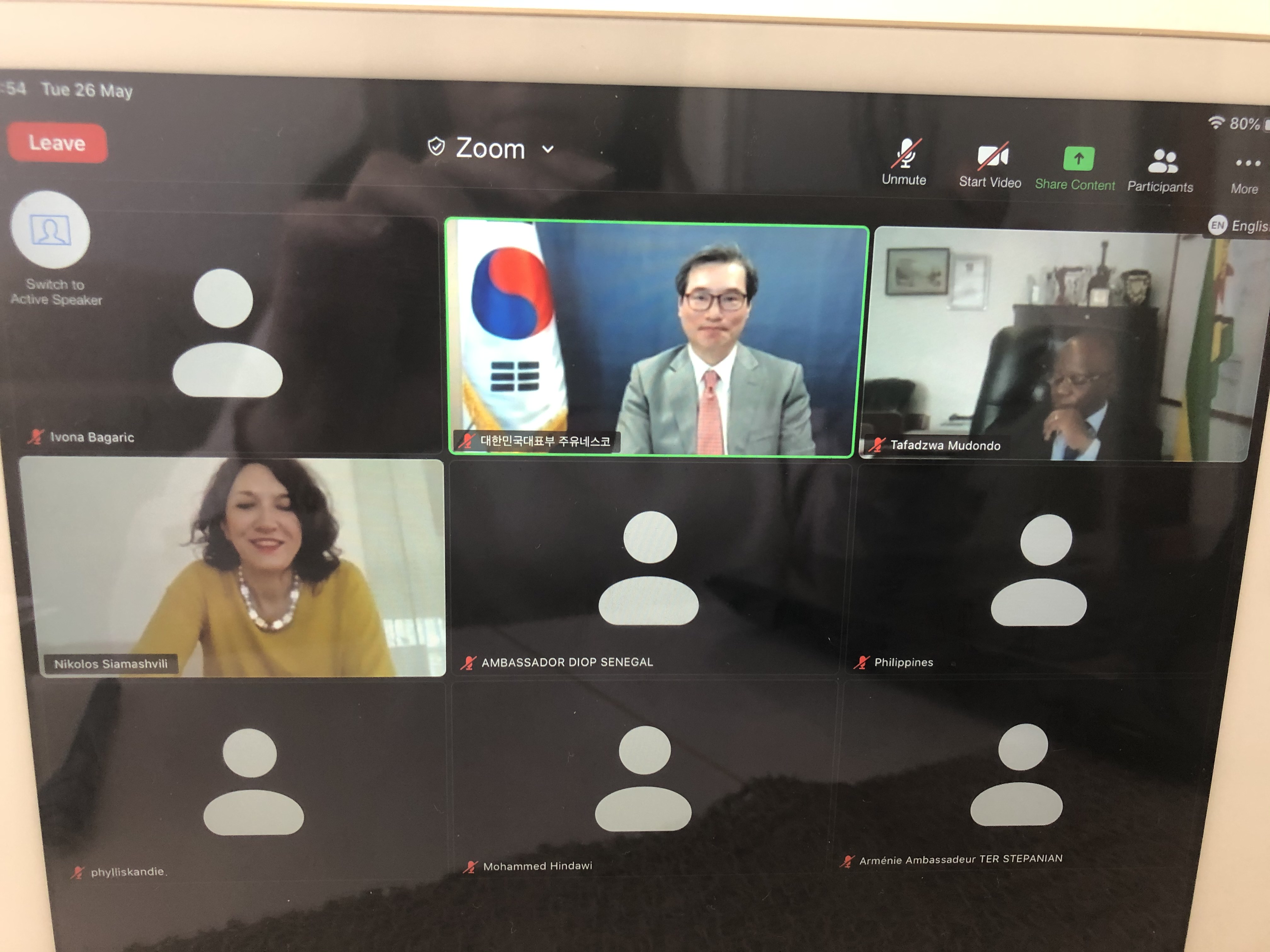 The Group of Friends of Solidarity and Inclusion with Global Citizenship Education -Covid-19 and Beyond was established in UNESCO, at the level of permanent delegations at the initiative of the Republic of Korea. The aim of the Group is to reflect about and exchange the most efficient responses to challenges posed by the Covid-19 pandemic, namely the stigmatization and discrimination. The Group of Friends of Solidarity and Inclusion with Global Citizenship Education -Covid-19 and Beyond was established in UNESCO, at the level of permanent delegations at the initiative of the Republic of Korea. The aim of the Group is to reflect about and exchange the most efficient responses to challenges posed by the Covid-19 pandemic, namely the stigmatization and discrimination.
The Permanent Delegation of Serbia to UNESCO is among eleven delegations to join the Group of Friends. |
|
|
| Special message of the First Deputy Prime Minister and Minister of Foreign Affairs of the Republic of Serbia Ivica Dačić on the occasion of 25 May, Africa Day and Day of Friendship of the Republic of Serbia with the Peoples of Africa |
|
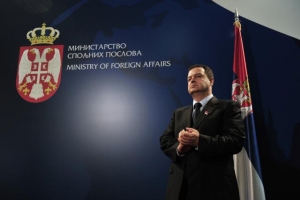 On 25th May 2020 the Africa Day is marked in UNESCO. On the same day, the Republic of Serbia celebrates the Day of Friendship with the Peoples of Africa. On that occasion, the First Deputy Prime Minister and Minister of Foreign Affairs of the Republic of Serbia H.E. Mr. Ivica Dačić sent a special message to the Ministers of Foreign Affairs of African countries, which the Permanent Delegation of the Republic of Serbia to UNESCO distributed to the permanent delegations of these countries. The special message states: "On the occasion of Africa Day, I take this opportunity to extend to you my most cordial greetings and congratulations. I am glad that this day is duly observed this year too, including in UNESCO, despite the ongoing crisis amid the global Covid-19 pandemic. On 25th May 2020 the Africa Day is marked in UNESCO. On the same day, the Republic of Serbia celebrates the Day of Friendship with the Peoples of Africa. On that occasion, the First Deputy Prime Minister and Minister of Foreign Affairs of the Republic of Serbia H.E. Mr. Ivica Dačić sent a special message to the Ministers of Foreign Affairs of African countries, which the Permanent Delegation of the Republic of Serbia to UNESCO distributed to the permanent delegations of these countries. The special message states: "On the occasion of Africa Day, I take this opportunity to extend to you my most cordial greetings and congratulations. I am glad that this day is duly observed this year too, including in UNESCO, despite the ongoing crisis amid the global Covid-19 pandemic.
|
|
|
| VIRTUAL TOURS THROUGH CULTURAL CONTENTS |
|
 |
|
|
| Meeting for EU candidate countries |
|
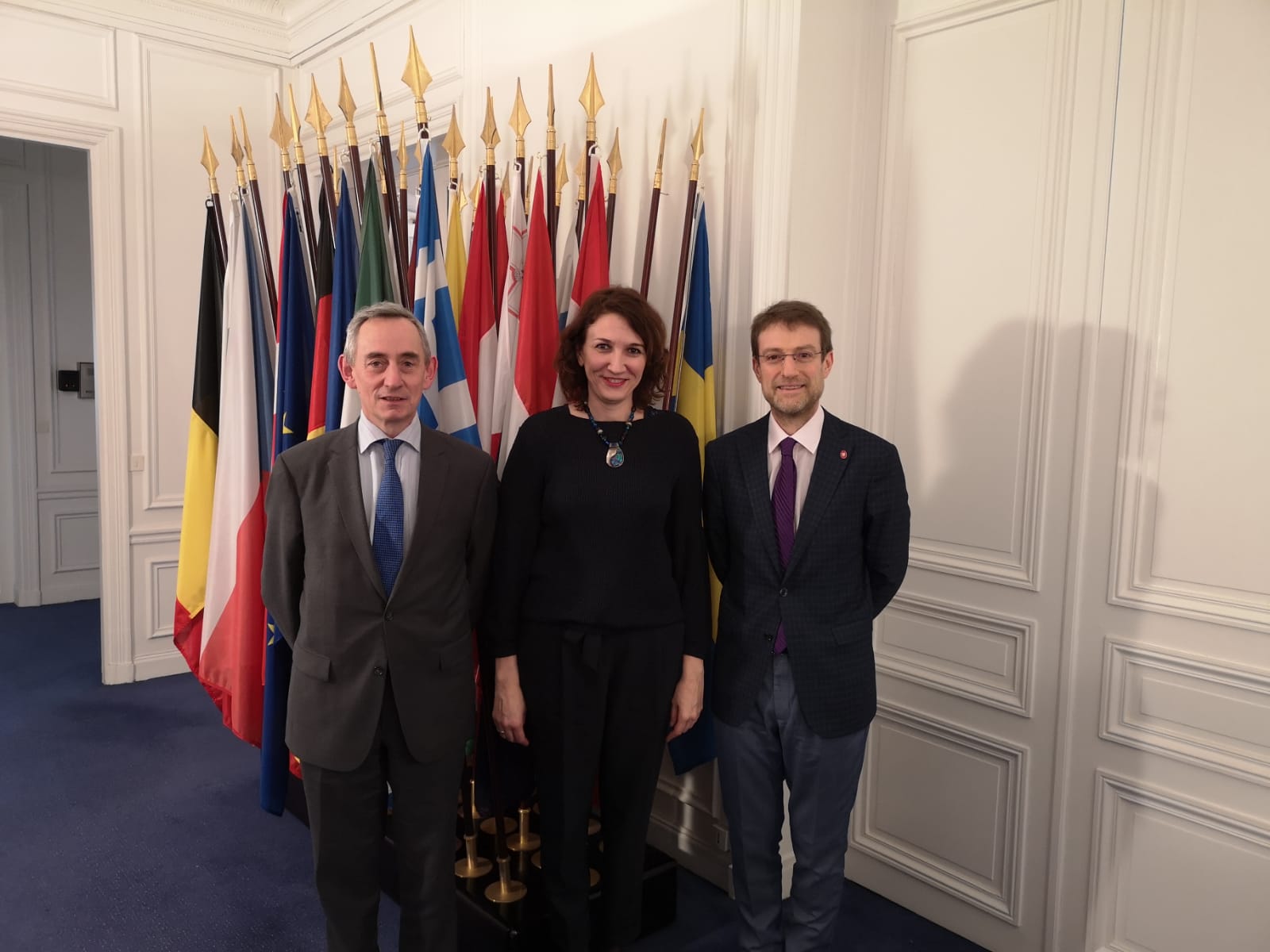 Ambassador Tamara Rastovac Siamashvili, Permanent Delegate of the Republic of Serbia to UNESCO, attended on 10th March 2020, a meeting organized by the Head of the Delegation of the European Union to UNESCO Mr. Didier Lenoir for EU candidate countries. The meeting was organized in the context of the preparations for the 209th session of the UNESCO Executive Board. Ambassador Tamara Rastovac Siamashvili, Permanent Delegate of the Republic of Serbia to UNESCO, attended on 10th March 2020, a meeting organized by the Head of the Delegation of the European Union to UNESCO Mr. Didier Lenoir for EU candidate countries. The meeting was organized in the context of the preparations for the 209th session of the UNESCO Executive Board. |
|
|
| Celebration of the International Mother Language Day in UNESCO |
|
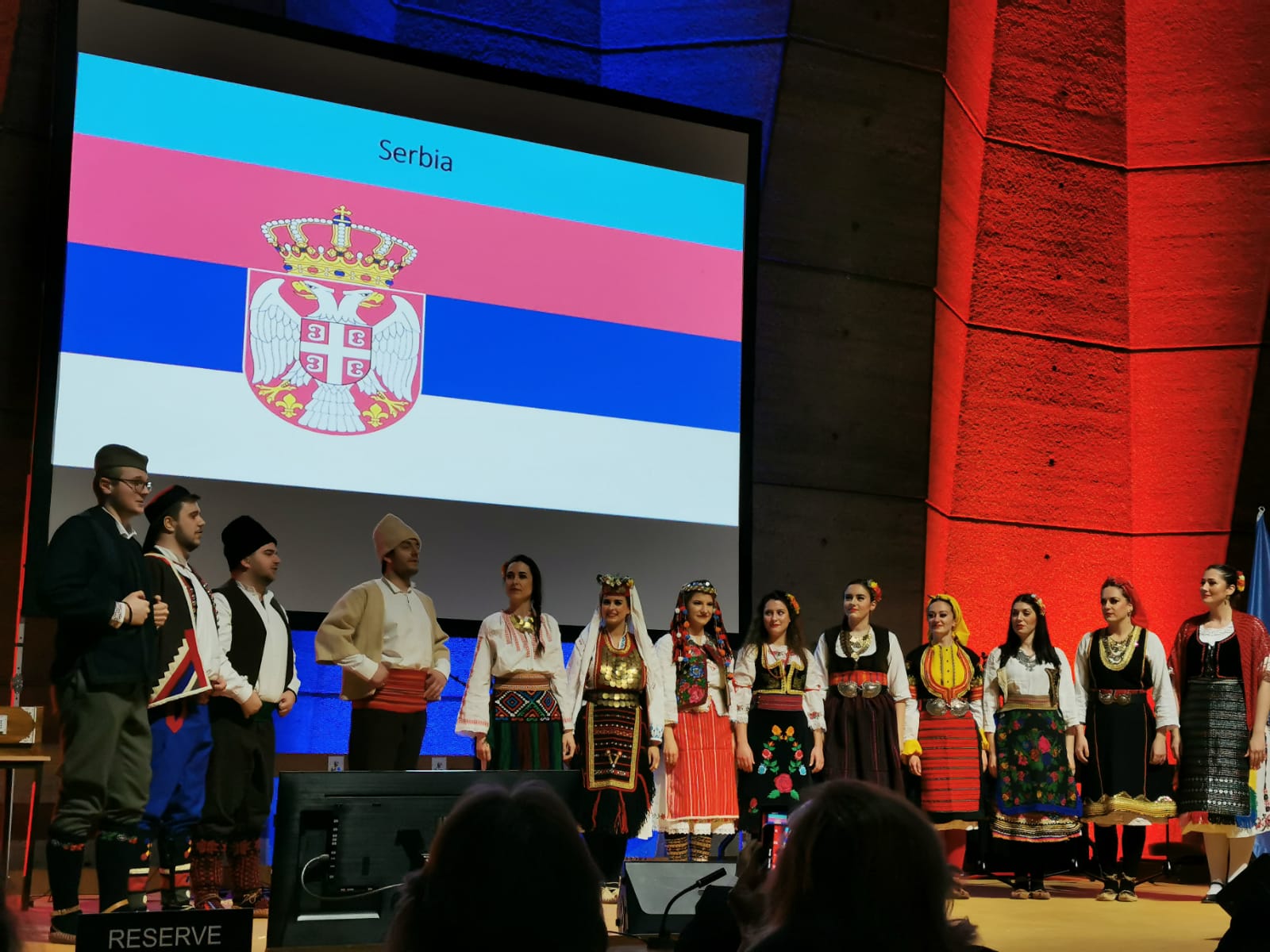 The Permanent Delegation of the Republic of Serbia to UNESCO also participated in this year's event in UNESCO, organized by the Permanent Delegation of Bangladesh, to mark the International Mother Language Day (21 February). We participated in a language exhibition in the form of presentation of posters with Cyrillic letters and inscription. The local cultural and artistic association "Izvor" from Paris sang several traditional songs in Serbian language as part of a segment dedicated to cultural performance. In addition, we participated in a food festival, with national gastronomic specialties and rakija (national drink). The Permanent Delegation of the Republic of Serbia to UNESCO also participated in this year's event in UNESCO, organized by the Permanent Delegation of Bangladesh, to mark the International Mother Language Day (21 February). We participated in a language exhibition in the form of presentation of posters with Cyrillic letters and inscription. The local cultural and artistic association "Izvor" from Paris sang several traditional songs in Serbian language as part of a segment dedicated to cultural performance. In addition, we participated in a food festival, with national gastronomic specialties and rakija (national drink). |
|
|
| Opening of the exhibition "Celebrating the International Mother Language Day in Serbia - The case of Kovačica village" |
|
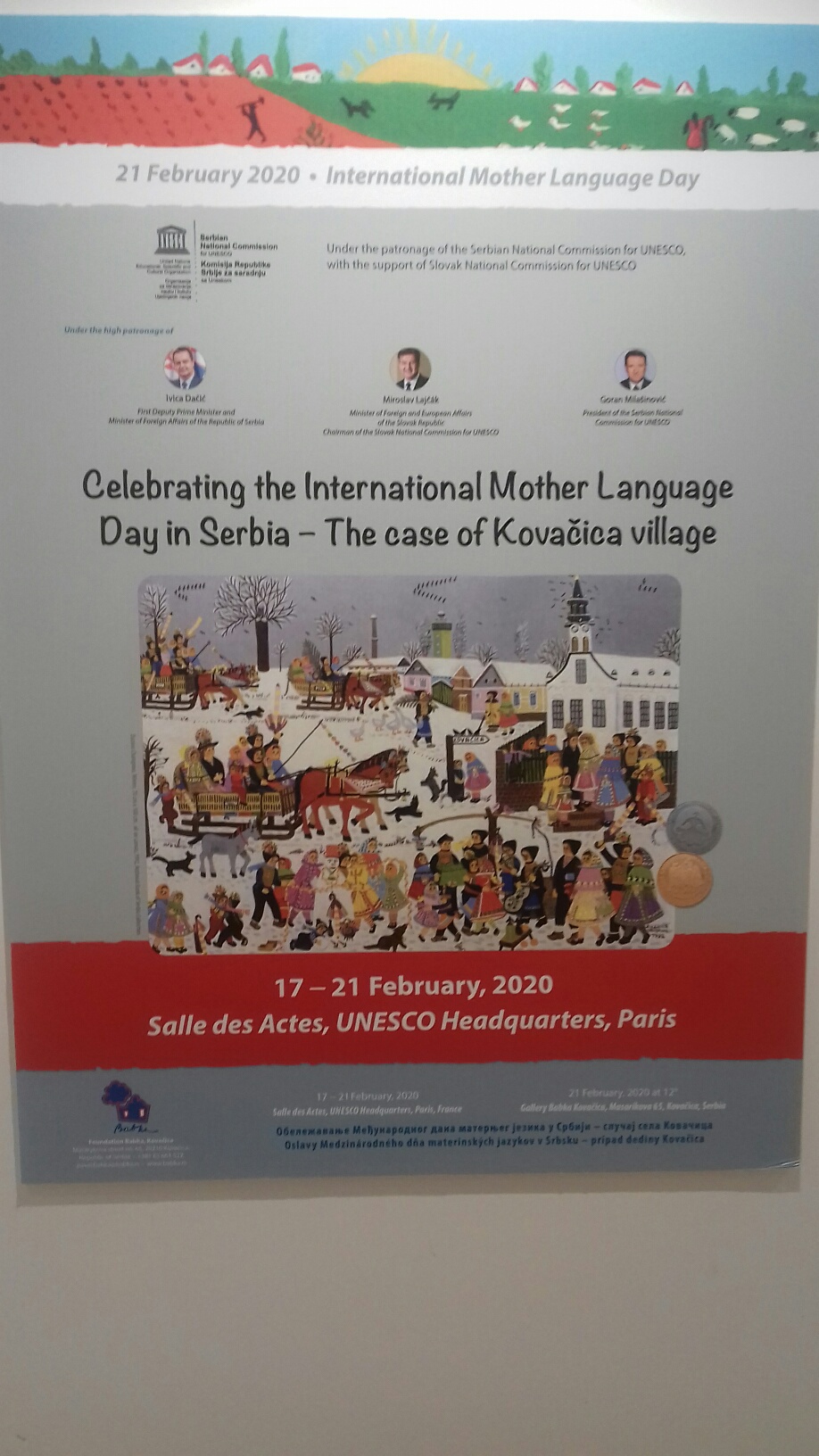 The opening of the exhibition "Celebrating the International Mother Language Day in Serbia - The case of Kovačica village" was held at UNESCO on 18th February 2020. The exhibition is under the high patronage of the First Deputy Prime Minister and Minister of Foreign Affairs of Serbia H. E. Mr. Ivica Dačić, Minister of Foreign and European Affairs of Slovakia and the Chairman of the Slovak National Commission for UNESCO H. E. Mr. Miroslav Lajčak, as well as the President of the Serbian National Commission for UNESCO Mr. Goran Milašinović. The opening of the exhibition "Celebrating the International Mother Language Day in Serbia - The case of Kovačica village" was held at UNESCO on 18th February 2020. The exhibition is under the high patronage of the First Deputy Prime Minister and Minister of Foreign Affairs of Serbia H. E. Mr. Ivica Dačić, Minister of Foreign and European Affairs of Slovakia and the Chairman of the Slovak National Commission for UNESCO H. E. Mr. Miroslav Lajčak, as well as the President of the Serbian National Commission for UNESCO Mr. Goran Milašinović.
The opening of the exhibition was attended by a large number of representatives of permanent delegations of UNESCO Member States and the UNESCO Secretariat. Permanent delegates of Serbia and Slovakia to UNESCO Ms. Tamara Rastovac Siamashvili and Mr. Igor Grexa spoke at the opening of the exhibition, as well as the UNESCO Deputy Director-General Mr. Xing Qu. Mr. Pavel Babka also addressed the guests on behalf of the Foundation Babka Kovačica as the organizer of the exhibition. The exhibition will be open until 21st February 2020. |
|
|
| Participation of the Republic of Serbia at the session of the Intergovernmental Committee for the Protection and Promotion of the Diversity of Cultural Expressions |
|
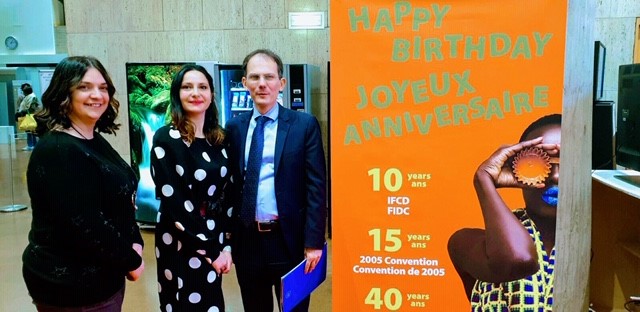 The delegation of the Republic of Serbia, led by Vuk Vukićević, PhD, Director of the Center for Studies in Cultural Development, which also included representatives of the Permanent Delegation of the Republic of Serbia to UNESCO, participated in the 13th session of the Intergovernmental Committee for the Protection and Promotion of the Diversity of Cultural Expressions. This session was held at the UNESCO headquarters in Paris, from 11 to 14 February 2020. The participation in this session has also been used for talks with representatives of the UNESCO Secretariat regarding further improvement of cooperation between the Republic of Serbia and UNESCO in this area. The delegation of the Republic of Serbia, led by Vuk Vukićević, PhD, Director of the Center for Studies in Cultural Development, which also included representatives of the Permanent Delegation of the Republic of Serbia to UNESCO, participated in the 13th session of the Intergovernmental Committee for the Protection and Promotion of the Diversity of Cultural Expressions. This session was held at the UNESCO headquarters in Paris, from 11 to 14 February 2020. The participation in this session has also been used for talks with representatives of the UNESCO Secretariat regarding further improvement of cooperation between the Republic of Serbia and UNESCO in this area. |
|
|
| Reception on the occasion of the Statehood Day of the Republic of Serbia |
|
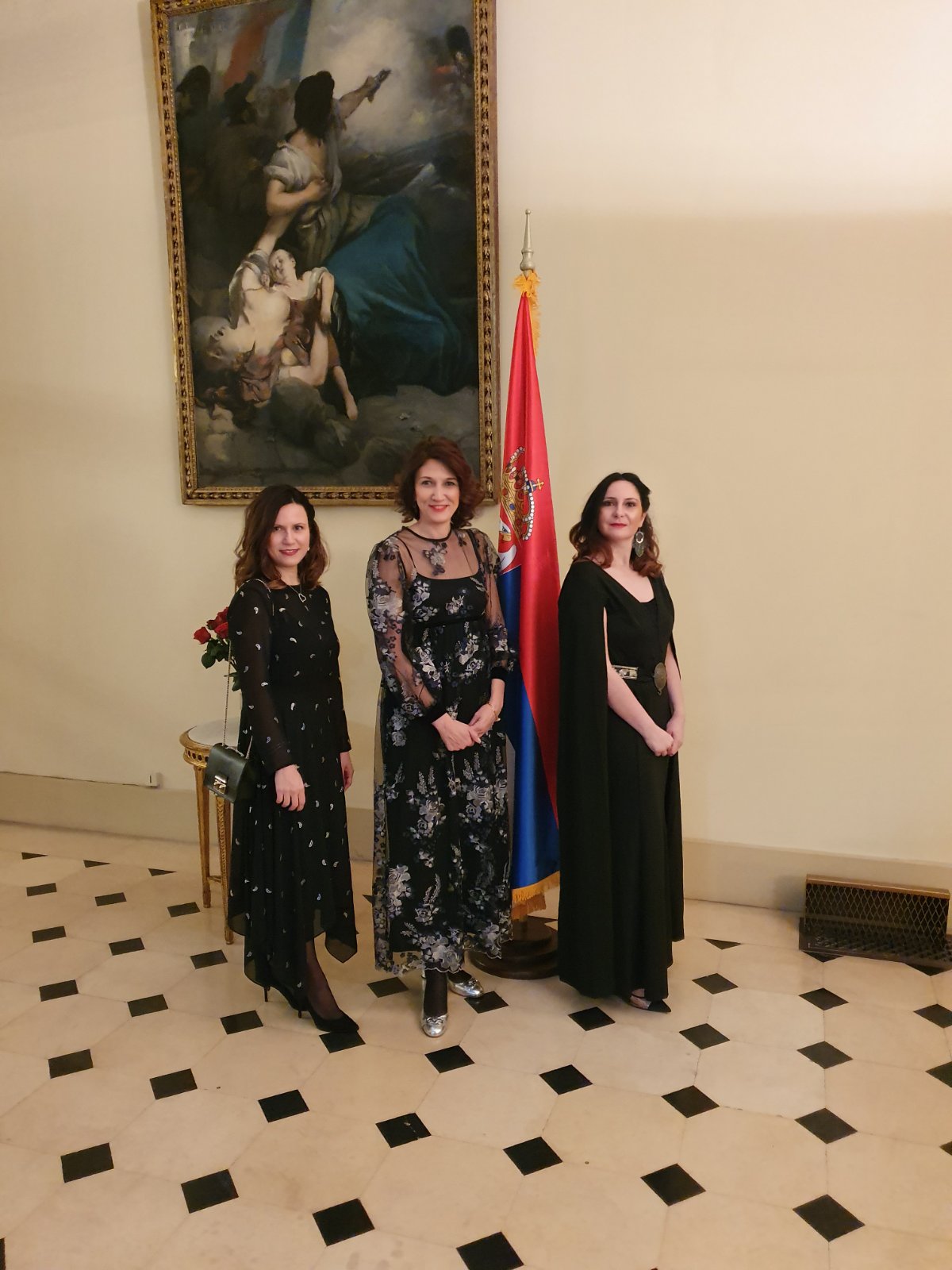 On 13th February 2020, the Permanent Delegation of the Republic of Serbia to UNESCO and the Embassy of the Republic of Serbia in France organized a reception on the occasion of the Statehood Day of the Republic of Serbia.The reception was attended by numerous representatives of the Permanent Delegations of UNESCO Member States and the UNESCO Secretariat, including the Deputy Director-General of UNESCO Mr. Xing Qu, the President of the General Conference of UNESCO Mr. Altay Cengizer and the Chairperson of the Executive Board of UNESCO Mr. Agapito Mba Mokuy. On 13th February 2020, the Permanent Delegation of the Republic of Serbia to UNESCO and the Embassy of the Republic of Serbia in France organized a reception on the occasion of the Statehood Day of the Republic of Serbia.The reception was attended by numerous representatives of the Permanent Delegations of UNESCO Member States and the UNESCO Secretariat, including the Deputy Director-General of UNESCO Mr. Xing Qu, the President of the General Conference of UNESCO Mr. Altay Cengizer and the Chairperson of the Executive Board of UNESCO Mr. Agapito Mba Mokuy. |
|
|
| International Day of Women and Girls in Science |
|
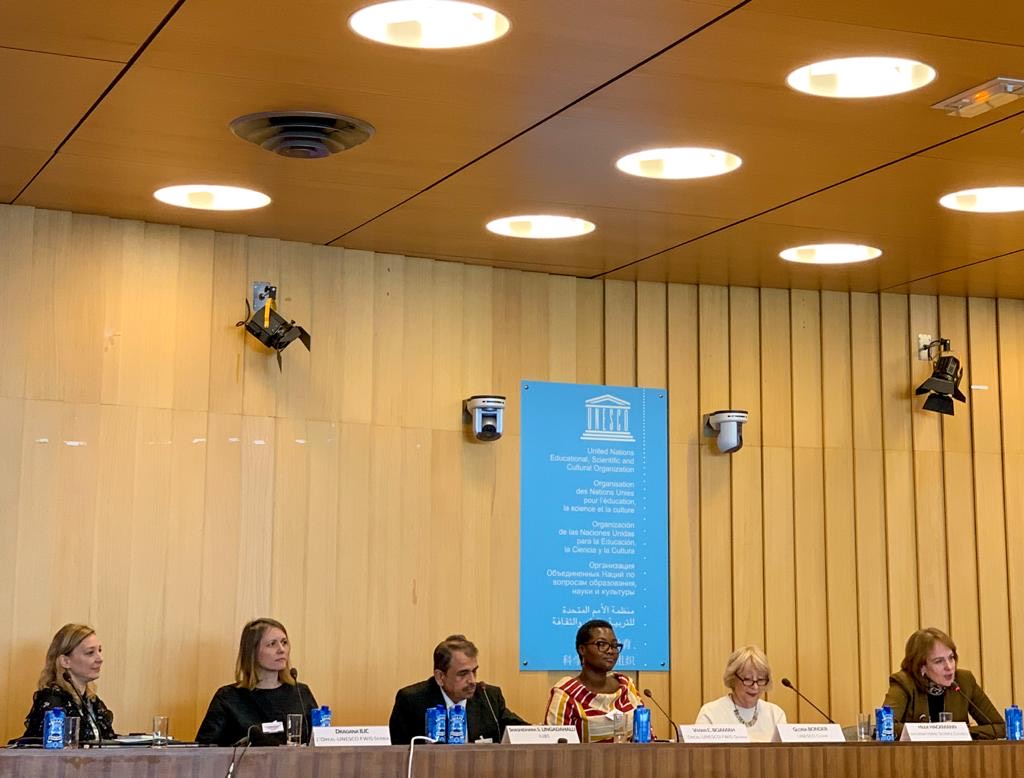 On the occasion of the International Day of Women and Girls in Science, an event dedicated to the issue of the gender gap in science was held in UNESCO HQ on 11 February 2020. Participants at the event were the representatives of UNESCO’s scientific network, including Ms Dragana Ilić, Associate Professor at the Faculty of Mathematics, University of Belgrade, Fellow of the L’Oreal-UNESCO For Women in Science Serbia Programme. On the occasion of the International Day of Women and Girls in Science, an event dedicated to the issue of the gender gap in science was held in UNESCO HQ on 11 February 2020. Participants at the event were the representatives of UNESCO’s scientific network, including Ms Dragana Ilić, Associate Professor at the Faculty of Mathematics, University of Belgrade, Fellow of the L’Oreal-UNESCO For Women in Science Serbia Programme. |
|
|
| Signing the nomination dossier for the extension of the serial World Heritage site “Ancient and Primeval Beech Forests of the Carpathians and Other Regions of Europe” |
|
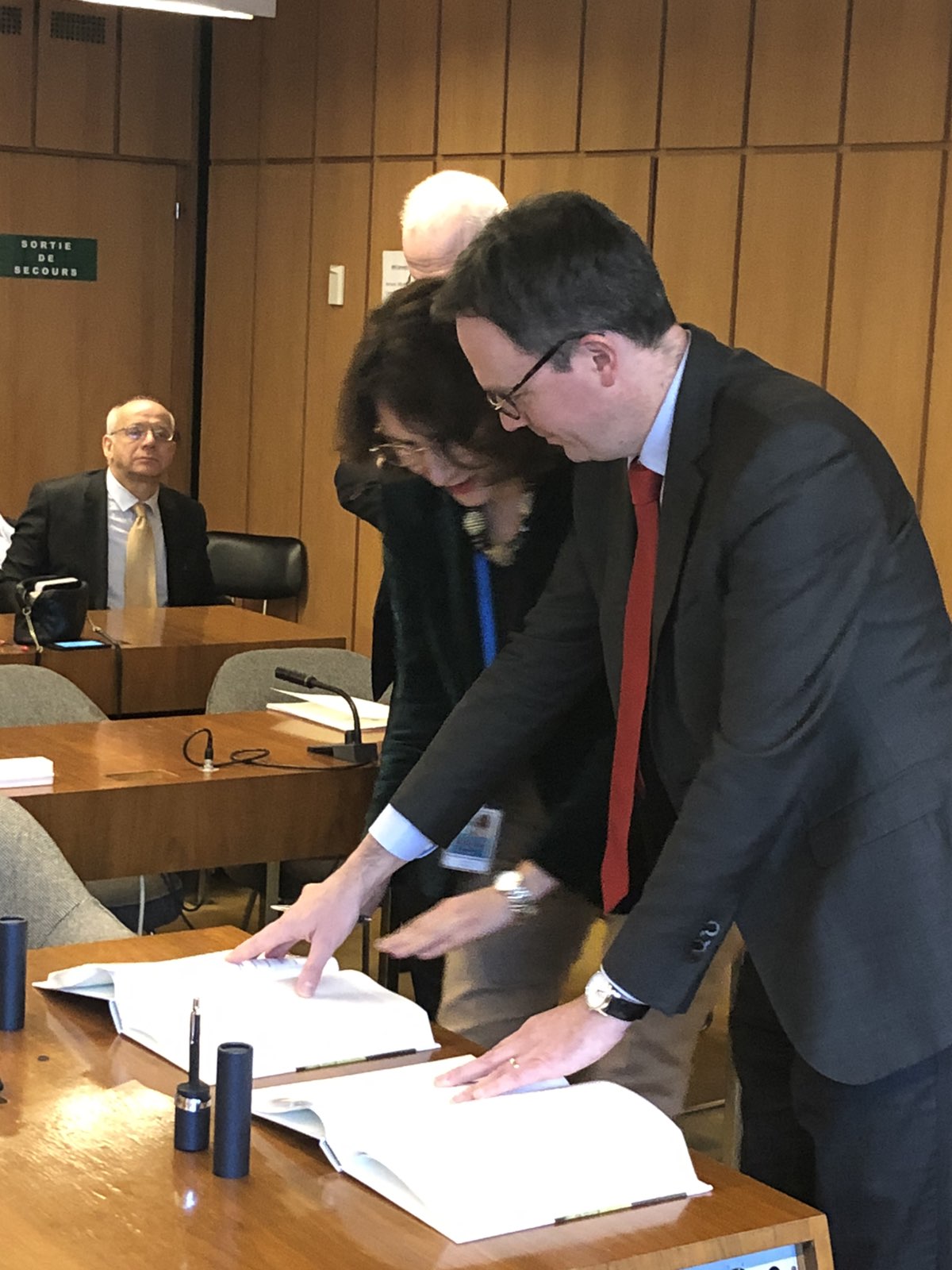 In UNESCO, on 24 January 2020, the Permanent Delegation of Switzerland to this organization, organized a ceremony for signing the nomination dossier for the extension of the serial site “Ancient and Primeval Beech Forests of the Carpathians and Other Regions of Europe”, inscribed on the UNESCO World Heritage List. Representatives of the Republic of Serbia, Switzerland, Bosnia and Herzegovina, France, Italy, North Macedonia, Montenegro, Poland, Slovakia and the Czech Republic have signed nomination dossier. On behalf of the Republic of Serbia, the Permanent Delegate to UNESCO, Ambassador Tamara Rastovac Siamashvili has signed the dossier resulting from the intensive work of the competent ministries and institutions. In UNESCO, on 24 January 2020, the Permanent Delegation of Switzerland to this organization, organized a ceremony for signing the nomination dossier for the extension of the serial site “Ancient and Primeval Beech Forests of the Carpathians and Other Regions of Europe”, inscribed on the UNESCO World Heritage List. Representatives of the Republic of Serbia, Switzerland, Bosnia and Herzegovina, France, Italy, North Macedonia, Montenegro, Poland, Slovakia and the Czech Republic have signed nomination dossier. On behalf of the Republic of Serbia, the Permanent Delegate to UNESCO, Ambassador Tamara Rastovac Siamashvili has signed the dossier resulting from the intensive work of the competent ministries and institutions. |
|
|
| International Day of Commemoration in Memory of the Victims of the Holocaust |
|
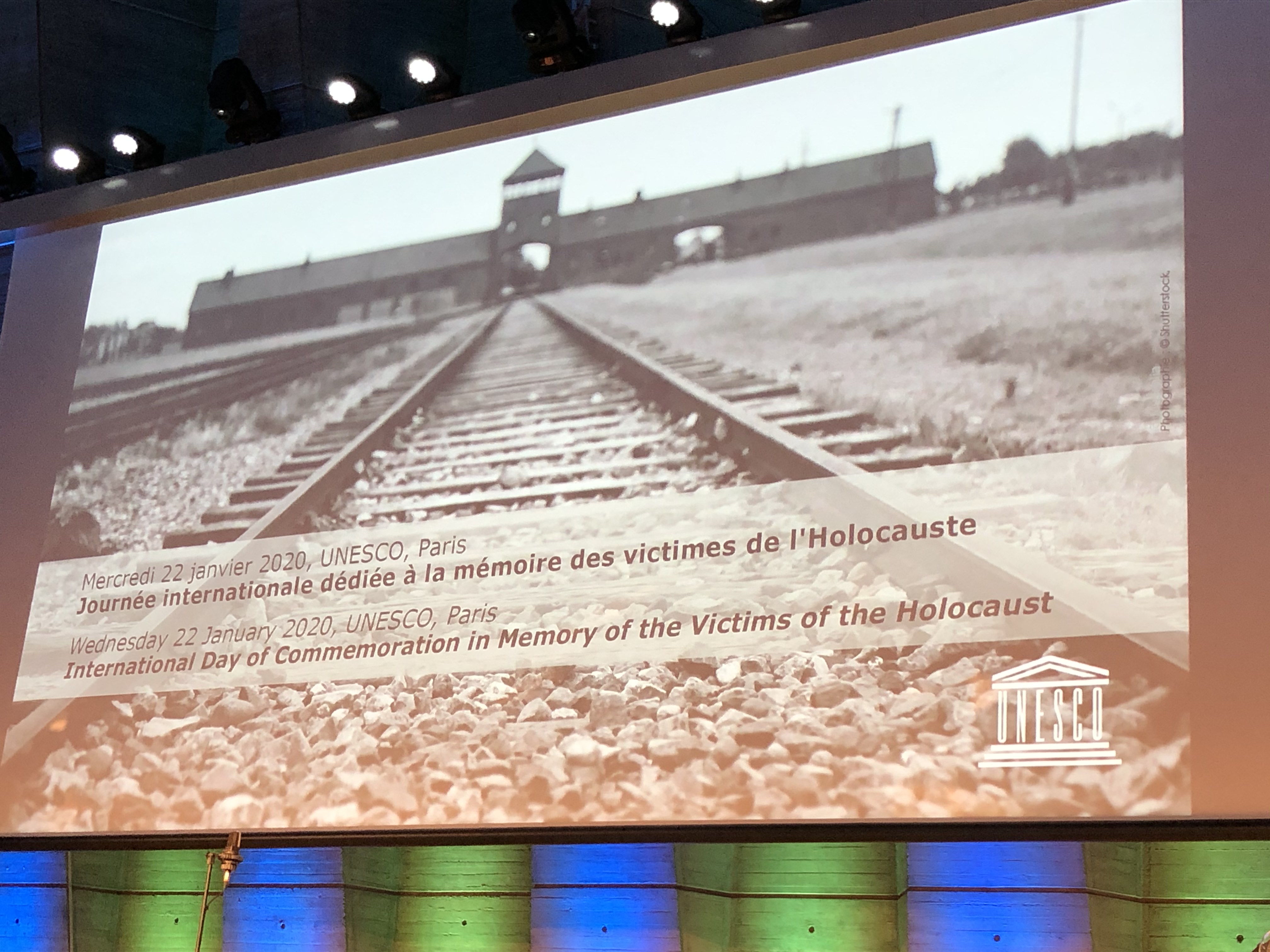 On the occasion of the International Day of Commemoration in Memory of the Victims of the Holocaust, a ceremony was held in the UNESCO Headquarters on 22 January 2020. The Permanent Delegation of Serbia attended the said event. On the occasion of the International Day of Commemoration in Memory of the Victims of the Holocaust, a ceremony was held in the UNESCO Headquarters on 22 January 2020. The Permanent Delegation of Serbia attended the said event. |
|
|
| Meeting with the Chairperson of the Executive Board of UNESCO |
|
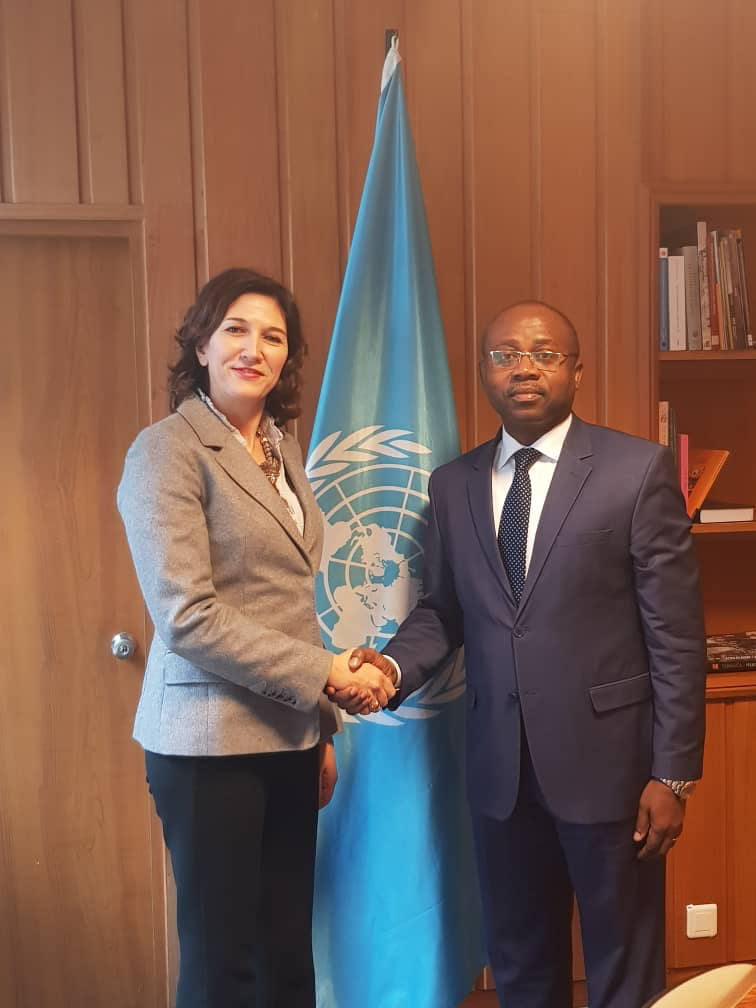 Ambassador Tamara Rastovac Siamashvili, Permanent Delegate of the Republic of Serbia to UNESCO, met the Chairperson of the UNESCO Executive Board Mr. Agapito Mba Mokuy. Views were exchanged regarding further activities of this body of which the Republic of Serbia is a member until 2023. Ambassador Tamara Rastovac Siamashvili, Permanent Delegate of the Republic of Serbia to UNESCO, met the Chairperson of the UNESCO Executive Board Mr. Agapito Mba Mokuy. Views were exchanged regarding further activities of this body of which the Republic of Serbia is a member until 2023. |
|
|
| Participation of the Permanent Delegation of the Republic of Serbia to UNESCO at the 208th session of the UNESCO Executive Board |
|
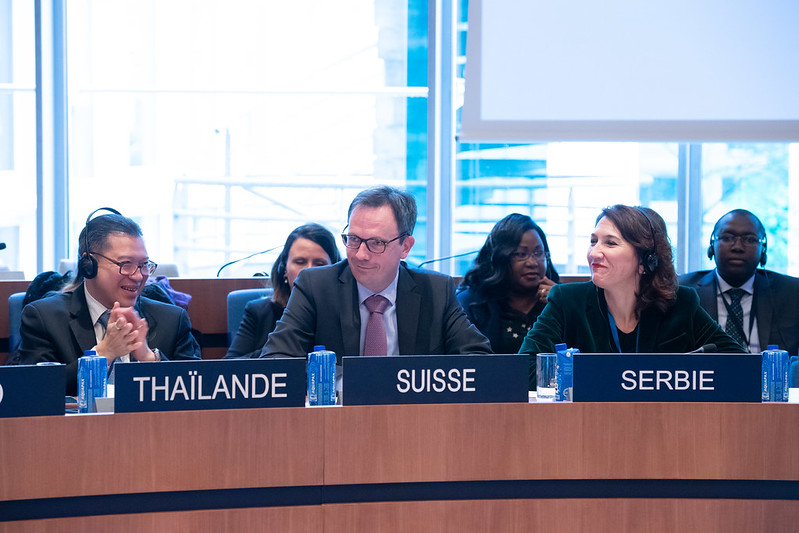 Following the re-election of the Republic of Serbia to membership of the UNESCO Executive Board for a new four-year term, the Permanent Delegation of the Republic of Serbia to UNESCO participated in the 208th session of the Executive Board held on 29th November 2019. On this occasion, Permanent Delegate of the Republic of Serbia, Ambassador Tamara Rastovac Siamashvili has been elected as a Chair of the Executive Board Committee on Non-Governmental Partners, and therefore a member of the Executive Board Bureau. Following the re-election of the Republic of Serbia to membership of the UNESCO Executive Board for a new four-year term, the Permanent Delegation of the Republic of Serbia to UNESCO participated in the 208th session of the Executive Board held on 29th November 2019. On this occasion, Permanent Delegate of the Republic of Serbia, Ambassador Tamara Rastovac Siamashvili has been elected as a Chair of the Executive Board Committee on Non-Governmental Partners, and therefore a member of the Executive Board Bureau. |
|
|
| Participation of Minister of Education, Science and Technological Development Mladen Šarčević at the 40th Session of the UNESCO General Conference |
|
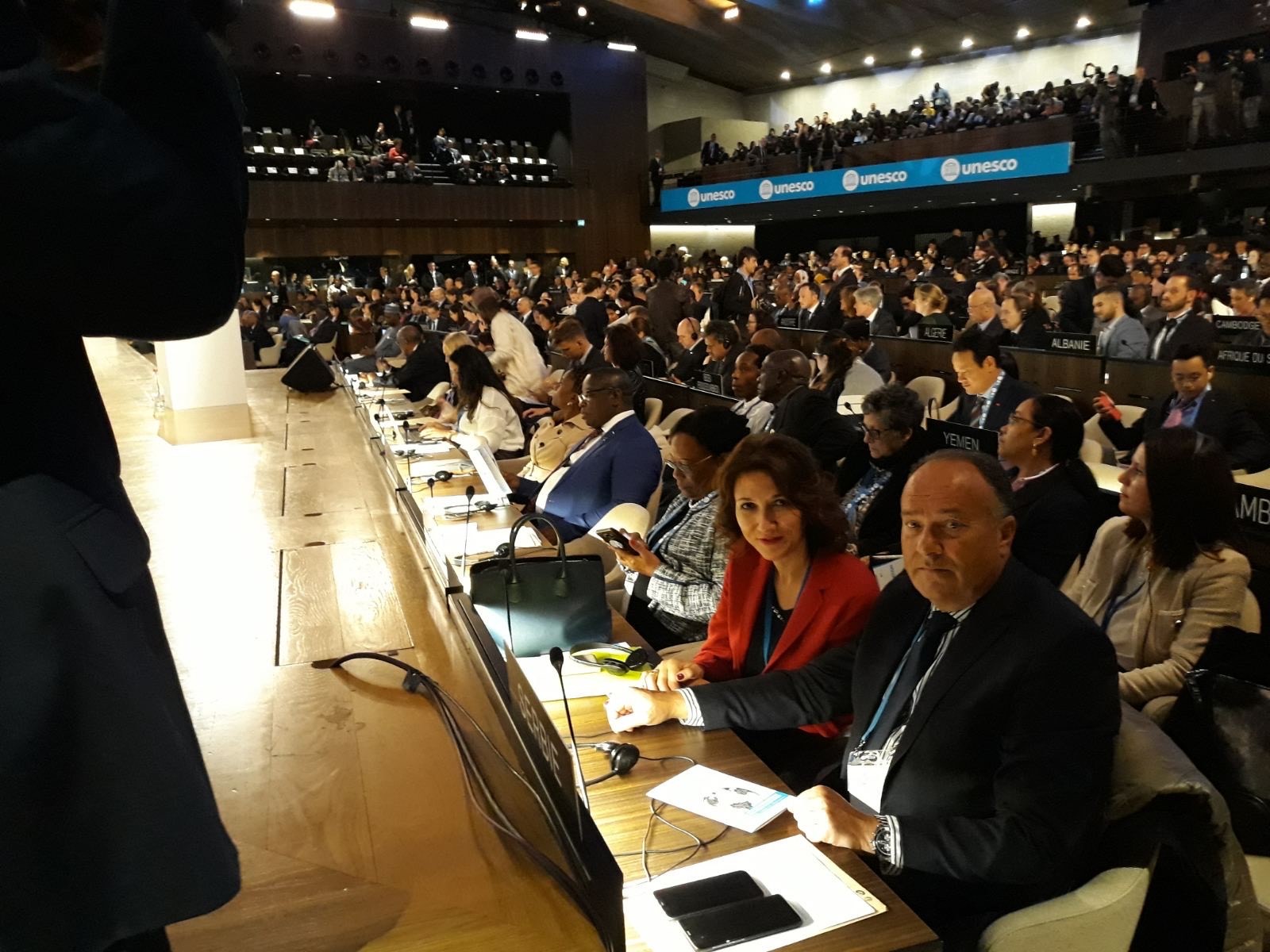 Minister of Education, Science and Technological Development of Serbia, Mr Mladen Šarčević, was in Paris from 12 to 15 November 2019 in the framework of 40th Session of the UNESCO General Conference. As a member of the delegation of the President of Serbia, Minister Šarčević attended a high-level panel of the heads of states and governments with youth leaders from around the world “Youth Perspectives on Multilateralism”. Minister Šarčević also participated at the high-level meeting on inclusion and mobility in higher education which was attended by more than 100 ministers in charge of education. He spoke about the mobility in higher education in Serbia. During his stay in Paris, minister Šarčević met with the Assistant Director-General of UNESCO for education Ms Stefania Giannini whom he informed about the reforms in the educational system in Serbia. Minister Šarčević also met with ministers of education from Uganda and Greece and discussed prospects of further developing cooperation in the area of education. Minister of Education, Science and Technological Development of Serbia, Mr Mladen Šarčević, was in Paris from 12 to 15 November 2019 in the framework of 40th Session of the UNESCO General Conference. As a member of the delegation of the President of Serbia, Minister Šarčević attended a high-level panel of the heads of states and governments with youth leaders from around the world “Youth Perspectives on Multilateralism”. Minister Šarčević also participated at the high-level meeting on inclusion and mobility in higher education which was attended by more than 100 ministers in charge of education. He spoke about the mobility in higher education in Serbia. During his stay in Paris, minister Šarčević met with the Assistant Director-General of UNESCO for education Ms Stefania Giannini whom he informed about the reforms in the educational system in Serbia. Minister Šarčević also met with ministers of education from Uganda and Greece and discussed prospects of further developing cooperation in the area of education. |
|
|
| Participation of the Minister of Culture and Media of the Republic of Serbia Mr. Vladan Vukosavljevic at the 40th Session of the UNESCO General Conference |
|
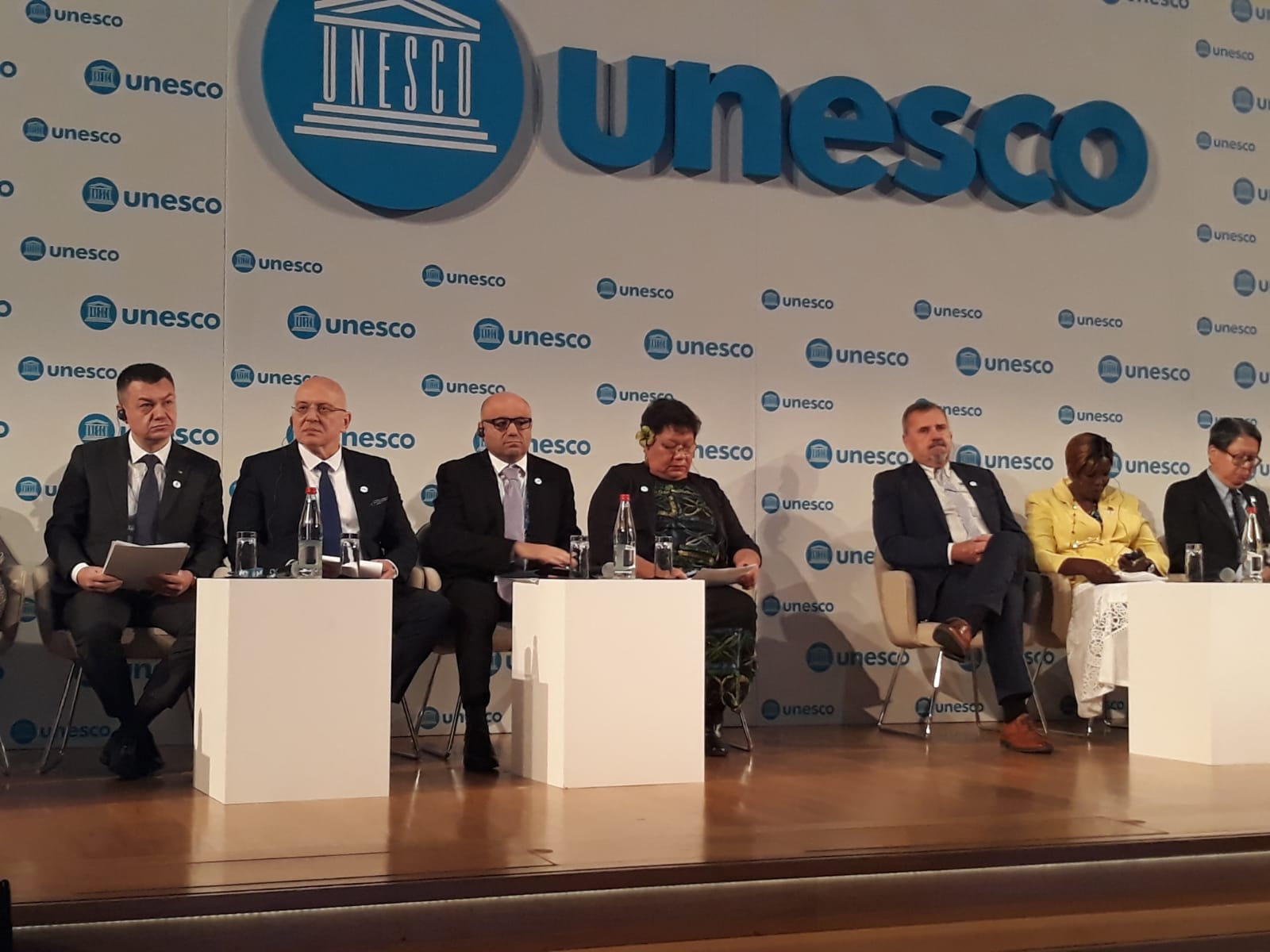 From 18 until 20 November 2019, Minister of Culture and Media of the Republic of Serbia Mr. Vladan Vukosavljevic, with the delegation, attended the 40th session of the UNESCO General Conference in Paris. Minister Vukosavljević participated in the UNESCO Forum of Ministers of Culture on 19 November 2019. This is the first time such an event has been organized in UNESCO after 21 years, with the participation of more than 120 ministers from countries all around the world. Minister Vukosavljevic made a presentation as part of the panel "Culture at the heart of education, a fundamental dimension for human development and innovation" and has numerous meetings with colleagues from other countries and UNESCO representatives. He spoke with the Director of the World Heritage Center Ms. Mechtild Rössler and reiterated concerns about the state of Serbian cultural heritage in Kosovo and Metohija. He also met Director of the UNESCO Regional Bureau for Science and Culture in Europe, based in Venice, Anna Liuza Thompson – Flores and, among others, Ministers of Culture of Albania and Northern Macedonia. In addition, he held a meeting with Ministers of Culture of Slovenia, Croatia and Montenegro and the Director-General for Culture and Art of Austria, with the presence of the Director of the UNESCO Regional Bureau for Science and Culture in Europe and other representatives of the UNESCO Secretariat dedicated to the renovation of Pavilion 17 (the so-called "Yugoslav Pavilion") at the Auschwitz-Birkenau State Museum in Poland. He also attended a high-level lunch hosted by UNESCO Assistant Director-General for Culture Mr. Ernesto Ottone, at which UNESCO's work in the field of culture in emergency situations was presented, with the participation of States that had received support from the Heritage Emergency Fund in the previous period. Minister Vukosavljevic also gave an interview for UNESCO social networks. From 18 until 20 November 2019, Minister of Culture and Media of the Republic of Serbia Mr. Vladan Vukosavljevic, with the delegation, attended the 40th session of the UNESCO General Conference in Paris. Minister Vukosavljević participated in the UNESCO Forum of Ministers of Culture on 19 November 2019. This is the first time such an event has been organized in UNESCO after 21 years, with the participation of more than 120 ministers from countries all around the world. Minister Vukosavljevic made a presentation as part of the panel "Culture at the heart of education, a fundamental dimension for human development and innovation" and has numerous meetings with colleagues from other countries and UNESCO representatives. He spoke with the Director of the World Heritage Center Ms. Mechtild Rössler and reiterated concerns about the state of Serbian cultural heritage in Kosovo and Metohija. He also met Director of the UNESCO Regional Bureau for Science and Culture in Europe, based in Venice, Anna Liuza Thompson – Flores and, among others, Ministers of Culture of Albania and Northern Macedonia. In addition, he held a meeting with Ministers of Culture of Slovenia, Croatia and Montenegro and the Director-General for Culture and Art of Austria, with the presence of the Director of the UNESCO Regional Bureau for Science and Culture in Europe and other representatives of the UNESCO Secretariat dedicated to the renovation of Pavilion 17 (the so-called "Yugoslav Pavilion") at the Auschwitz-Birkenau State Museum in Poland. He also attended a high-level lunch hosted by UNESCO Assistant Director-General for Culture Mr. Ernesto Ottone, at which UNESCO's work in the field of culture in emergency situations was presented, with the participation of States that had received support from the Heritage Emergency Fund in the previous period. Minister Vukosavljevic also gave an interview for UNESCO social networks. |
|
|
| Re - election of the Republic of Serbia to the membership of the UNESCO Executive Board |
|
 The Republic of Serbia, with 155 votes of UNESCO Member States, has been re - elected as a member of the UNESCO Executive Board for the term 2019-2023, at the elections held on 20th November 2019, during the 40th session of the UNESCO General Conference. The Republic of Serbia, with 155 votes of UNESCO Member States, has been re - elected as a member of the UNESCO Executive Board for the term 2019-2023, at the elections held on 20th November 2019, during the 40th session of the UNESCO General Conference. |
|
|
| Visit of the President of the Republic of Serbia to UNESCO |
|
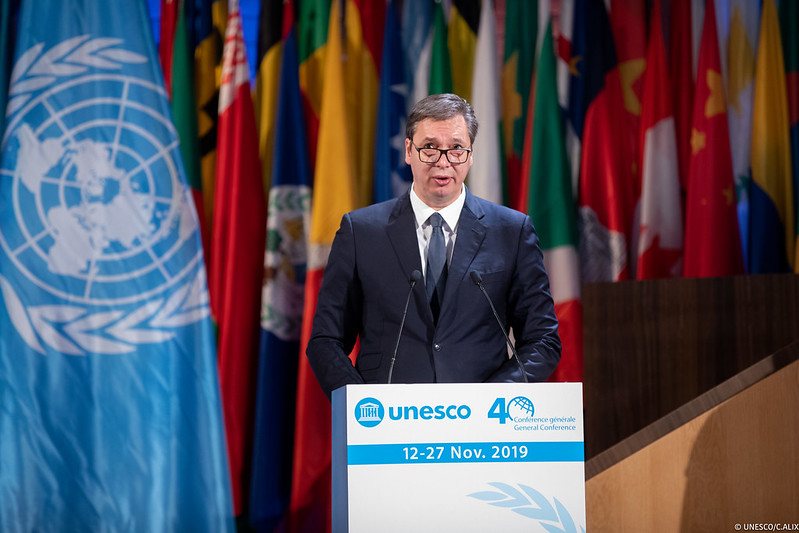 President of the Republic of Serbia H.E. Mr. Aleksandar Vucic delivered a statement in the plenary debate of the 40th session of the UNESCO General Conference on 13th November 2019. During his visit to UNESCO, President Vucic also met the UNESCO Director-General Ms. Audrey Azoulay with whom he discussed further strengthening the cooperation of the Republic of Serbia with this Organization. President of the Republic of Serbia H.E. Mr. Aleksandar Vucic delivered a statement in the plenary debate of the 40th session of the UNESCO General Conference on 13th November 2019. During his visit to UNESCO, President Vucic also met the UNESCO Director-General Ms. Audrey Azoulay with whom he discussed further strengthening the cooperation of the Republic of Serbia with this Organization. |
|
|
| Emir Kusturica's lecture and concert in UNESCO and the visit of the Minister of Culture and Media H.E. Mr. Vladan Vukosavljevic |
|
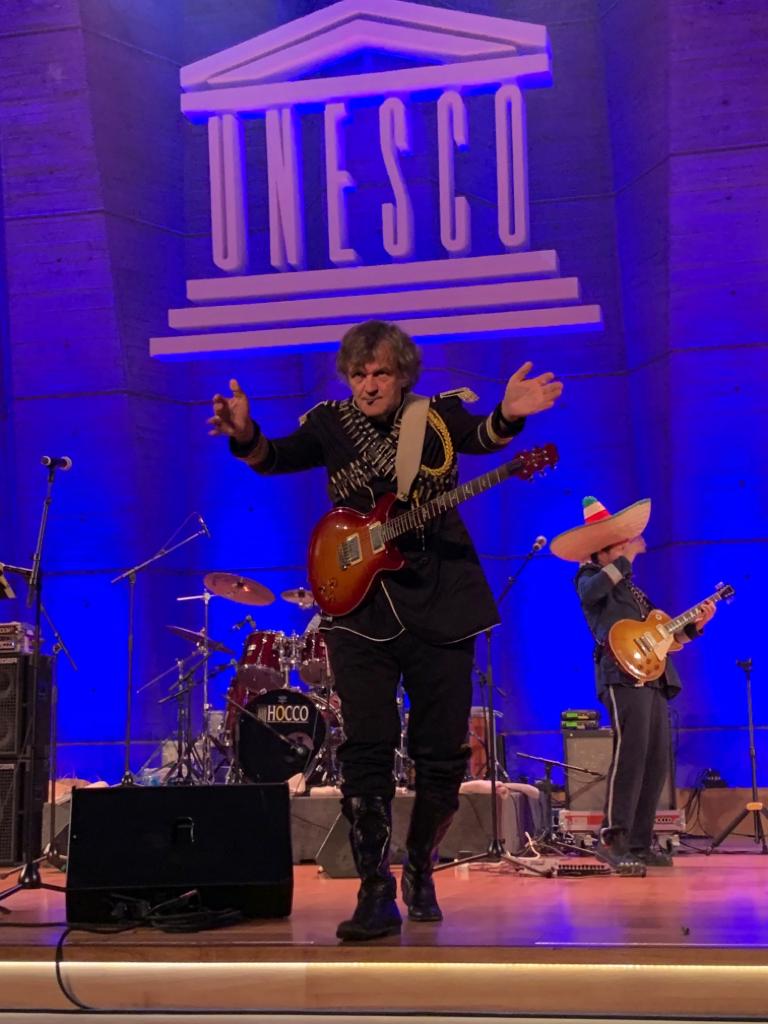 The celebrated Serbian director and musician Emir Kusturica and his "No Smoking Orchestra" held a spectacular concert on 22nd October 2019, at UNESCO headquarters in Paris, attended by numerous representatives of the UNESCO Permanent Delegations and the UNESCO Secretariat, as well as other invitees. The concert was preceded by a lecture by Emir Kusturica on the cultural diversity, which was also addressed by the Minister of Culture and Media of the Republic of Serbia H.E. Mr. Vladan Vukosavljević. Ambassador Tamara Rastovac Siamashvili, Permanent Delegate of Serbia to UNESCO, announced the concert as a unique trip through Serbia's rich and diverse intangible cultural heritage. Assistant Director-General of UNESCO for culture Mr. Ernesto Ottone Ramírez also spoke at the beginning of the concert. Minister Vukosavljevic and Emir Kusturica also met with UNESCO Director-General Ms. Audrey Azoulay, as well as with her assistant for culture Mr. Ottone Ramírez. The celebrated Serbian director and musician Emir Kusturica and his "No Smoking Orchestra" held a spectacular concert on 22nd October 2019, at UNESCO headquarters in Paris, attended by numerous representatives of the UNESCO Permanent Delegations and the UNESCO Secretariat, as well as other invitees. The concert was preceded by a lecture by Emir Kusturica on the cultural diversity, which was also addressed by the Minister of Culture and Media of the Republic of Serbia H.E. Mr. Vladan Vukosavljević. Ambassador Tamara Rastovac Siamashvili, Permanent Delegate of Serbia to UNESCO, announced the concert as a unique trip through Serbia's rich and diverse intangible cultural heritage. Assistant Director-General of UNESCO for culture Mr. Ernesto Ottone Ramírez also spoke at the beginning of the concert. Minister Vukosavljevic and Emir Kusturica also met with UNESCO Director-General Ms. Audrey Azoulay, as well as with her assistant for culture Mr. Ottone Ramírez.
|
|
|
| Exhibition on the intangible cultural heritage of Serbia |
|
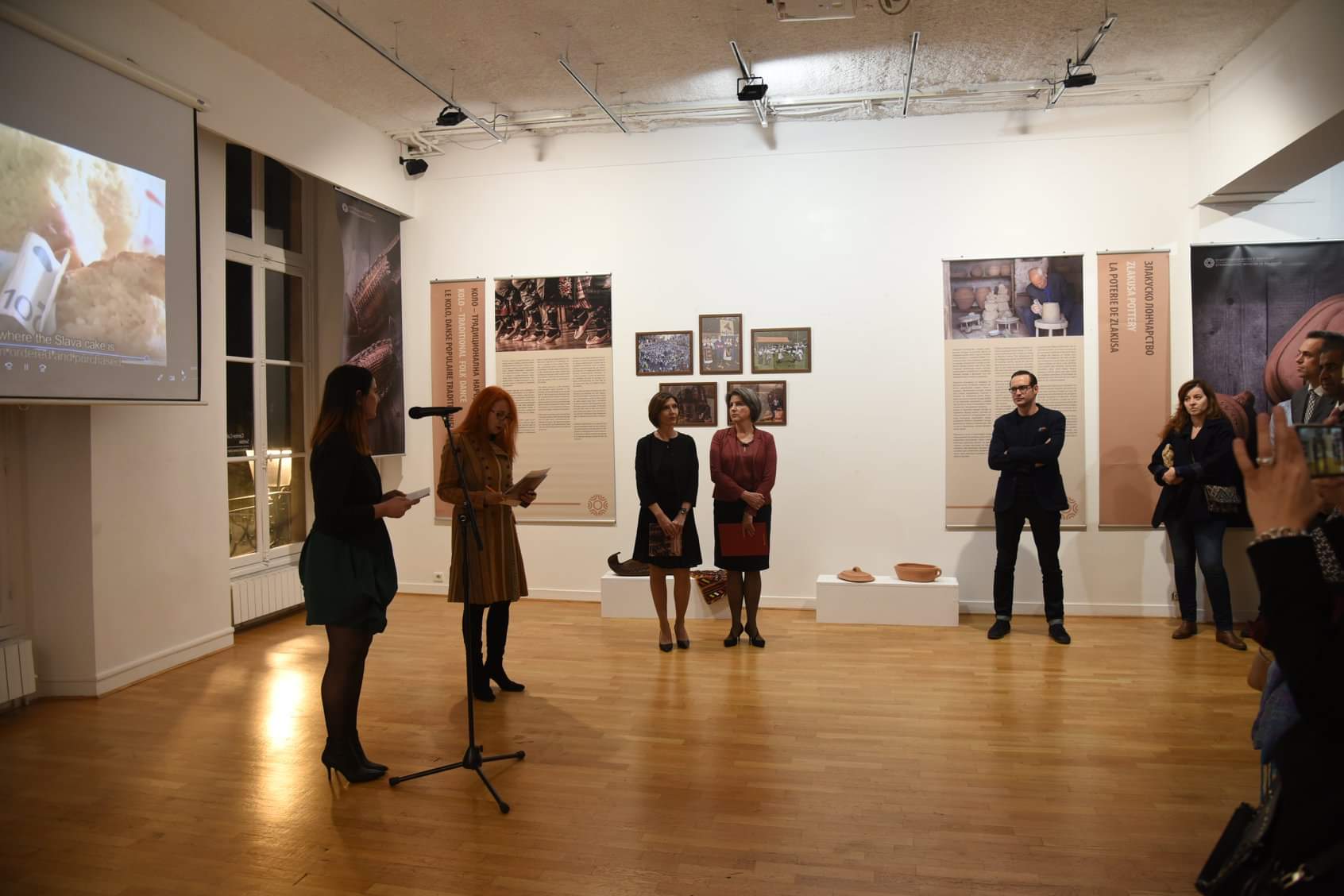 Deputy Permanent Delegate of Serbia to UNESCO Ms. Danijela Cubrilo opened on 21 October 2019 an exhibition at the Cultural Center of Serbia in Paris dedicated to the intangible cultural heritage of Serbia, which is listed in the National Register, as well as to the UNESCO Representative List of the Intangible Cultural Heritage of Humanity (kolo, slava and singing accompanied by gusle). The exhibition is organized by the Center for the Intangible Cultural Heritage of Serbia at the Ethnographic Museum in Belgrade. Deputy Permanent Delegate of Serbia to UNESCO Ms. Danijela Cubrilo opened on 21 October 2019 an exhibition at the Cultural Center of Serbia in Paris dedicated to the intangible cultural heritage of Serbia, which is listed in the National Register, as well as to the UNESCO Representative List of the Intangible Cultural Heritage of Humanity (kolo, slava and singing accompanied by gusle). The exhibition is organized by the Center for the Intangible Cultural Heritage of Serbia at the Ethnographic Museum in Belgrade. |
|
|
| Participation of the Permanent Delegation of the Republic of Serbia to UNESCO at the 207th session of the UNESCO Executive Board |
|
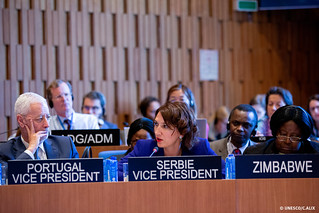 The Permanent Delegation of Serbia to UNESCO participated at the 207th session of the UNESCO Executive Board, held from 9 to 23 October 2019. Ambassador Tamara Rastovac Siamashvili attended the meetings of the Bureau of the Executive Board, as a Vice - President of this body on behalf of the Electoral Group II. In addition to the participation in the plenary debate, the representatives of the Permanent Delegation of Serbia also delivered statements on many other important topics on the agenda of the session, such as the International Fund for the Promotion of Culture, Participation Programme and Emergency Assistance, Comprehensive Partnership Strategy, Human Resources Management Strategy for 2017 - 2022, report on the measures to ensure equitable geographical distribution at all levels, the Executive Board’s Preparatory Group and its working methods, and the Draft Programme and Budget (40 C/5). They also addressed the issues of the reform of the UN system, artificial intelligence, the Sustainable Development Goal 4 - Education 2030 and the prevention of violent extremism. The Permanent Delegation of Serbia to UNESCO participated at the 207th session of the UNESCO Executive Board, held from 9 to 23 October 2019. Ambassador Tamara Rastovac Siamashvili attended the meetings of the Bureau of the Executive Board, as a Vice - President of this body on behalf of the Electoral Group II. In addition to the participation in the plenary debate, the representatives of the Permanent Delegation of Serbia also delivered statements on many other important topics on the agenda of the session, such as the International Fund for the Promotion of Culture, Participation Programme and Emergency Assistance, Comprehensive Partnership Strategy, Human Resources Management Strategy for 2017 - 2022, report on the measures to ensure equitable geographical distribution at all levels, the Executive Board’s Preparatory Group and its working methods, and the Draft Programme and Budget (40 C/5). They also addressed the issues of the reform of the UN system, artificial intelligence, the Sustainable Development Goal 4 - Education 2030 and the prevention of violent extremism.
Statement of the Republic of Serbia in the plenary debate of the 207th session of the UNESCO Executive Board |
|
|
| Meeting of the Preparatory Group of the Executive Board |
|
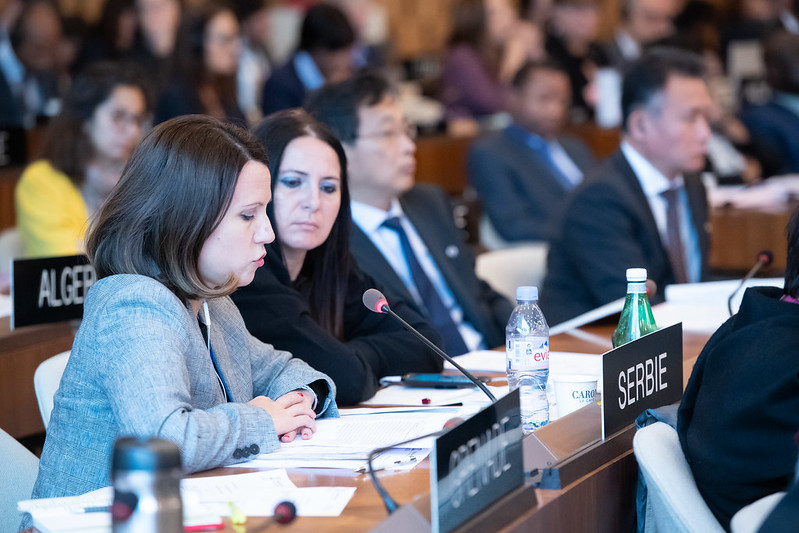 The representatives of the Permanent Delegation of Serbia to UNESCO participated at the meeting of the Preparatory Group of the Executive Board, on 24 and 25 September 2019. At the Preparatory Group meeting, representatives of the Permanent Delegation addressed the topics of UNESCO's strategic transformation, evaluation of UNESCO's Internal Oversight Service, Draft Programme and Budget (40 C/5) and a consolidated roadmap for a possible UNESCO recommendation on open science. The representatives of the Permanent Delegation of Serbia to UNESCO participated at the meeting of the Preparatory Group of the Executive Board, on 24 and 25 September 2019. At the Preparatory Group meeting, representatives of the Permanent Delegation addressed the topics of UNESCO's strategic transformation, evaluation of UNESCO's Internal Oversight Service, Draft Programme and Budget (40 C/5) and a consolidated roadmap for a possible UNESCO recommendation on open science. |
|
|
| Participation at the traditional working lunch of Ambassadors of Member States and Candidate Countries for membership in the European Union with Director-General of UNESCO Ms. Audrey Azoulay |
|
Ambassador Tamara Rastovac Siamashvili, Permanent Delegate of the Republic of Serbia to UNESCO, participated at the traditional working lunch of Ambassadors of Member States and Candidate Countries for membership in the European Union with Ms. Audrey Azoulay, Director-General of UNESCO. The lunch was organized in the framework of Finnish EU Presidency by the Permanent Delegate of Finland to OECD and UNESCO, Ambassador Tuomas Tapi. On this occasion, UNESCO's activities and initiatives of importance to the EU were discussed, in particular in the fields of education, human rights, climate change and biodiversity, as well as technological development (above all the segment of ethical principles of artificial intelligence). During the meeting, the Director-General also referred to her visit to Serbia (12-13 September) and her presence at the ministerial panel of the expert meeting on media and information literacy.
|
|
|
| Visit of the Director-General of Unesco Ms Audray Azoulay to the Republic of Serbia |
|
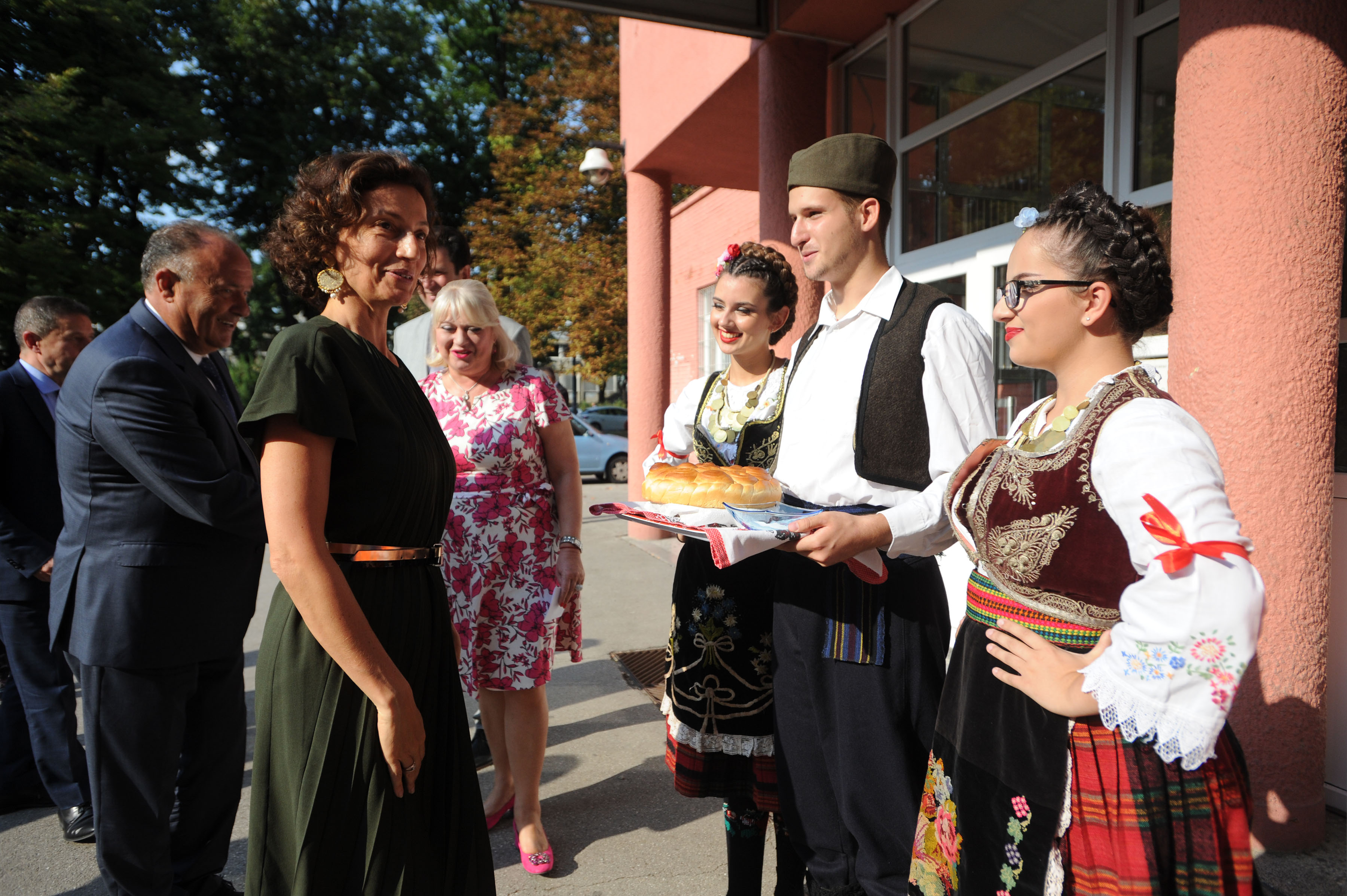 The Director-General of Unesco Ms Audray Azoulay, visited Serbia on 12 and 13 September 2019. in what is the first official visit the UNESCO Director-General to Serbia. Together with the First Vice Prime-Minister and Minister of Foreign Affairs of Serbia H.E. Mr Ivica Dačić, Director-General opened the ministerial panel within the international consultative meeting about updating UNESCO’s model curriculum on media and information literacy (MIL). The Director-General of Unesco Ms Audray Azoulay, visited Serbia on 12 and 13 September 2019. in what is the first official visit the UNESCO Director-General to Serbia. Together with the First Vice Prime-Minister and Minister of Foreign Affairs of Serbia H.E. Mr Ivica Dačić, Director-General opened the ministerial panel within the international consultative meeting about updating UNESCO’s model curriculum on media and information literacy (MIL).
During her stay in Serbia, Ms Azoulay met with the President of the Republic of Serbia H.E. Mr Aleksandar Vučić and Prime Minister of the Republic of Serbia H.E. Ms Ana Brnabić. Director-General visited also “Mihajlo Petrović – Alas” high school which developed a special programme for students excelling in information technology, an exhibition about the First World War in the Historical Museum of Serbia, as well as the Museum of the National Film Archives of Serbia.
|
|
|
| Candidature of the Republic of Serbia for re-election to the Executive Board of UNESCO |
|
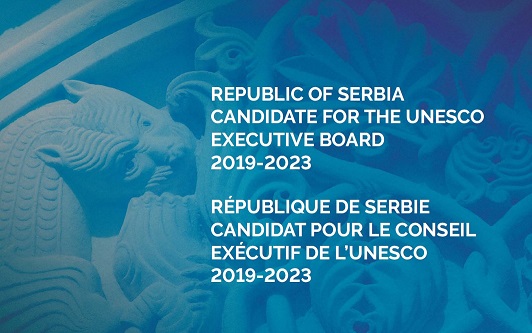 |
|
|
| Participation of the Republic of Serbia at the session of the World Heritage Committee |
|
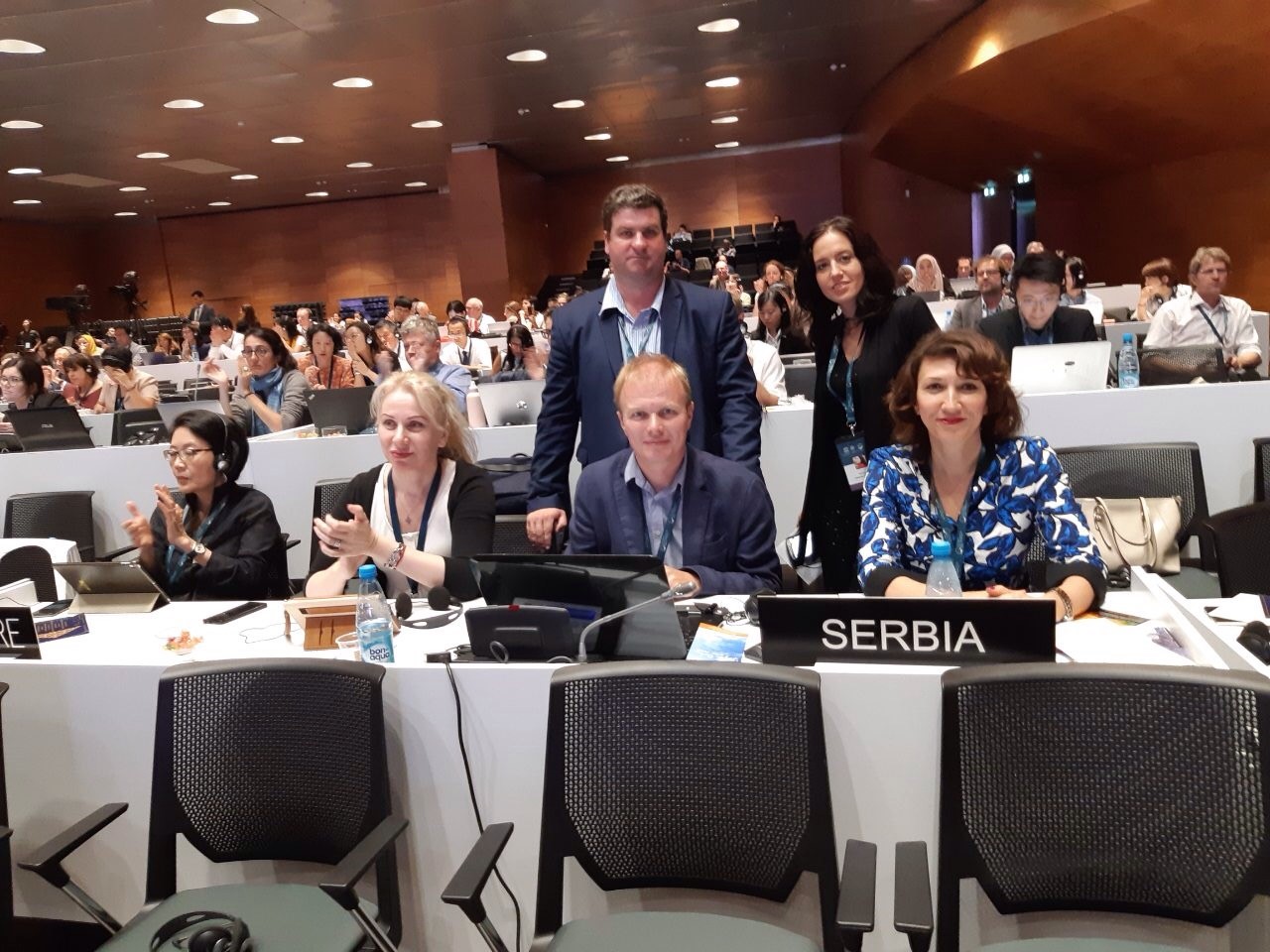 The Delegation of the Republic of Serbia participated at the 43rd Session of the World Heritage Committee held in Baku (Azerbaijan) from 30th June 30 to 10th July 2019. The delegation, which included representatives of the Republic Institute for the Protection of Cultural Monuments, the Institute for Nature Conservation of Serbia and the Archaeological Institute, was led by the Permanent Delegate of the Republic of Serbia to UNESCO H.E. ambassador Tamara Rastovac Siamashvili. There are five properties inscribed to the World Heritage List on the territory of the Republic of Serbia: Stari Ras and Sopocani (1979), Studenica Monastery (1986), Medieval Monuments in Kosovo and Metohia – Decani Monastery (2004), Patriarchate of Pec, Gracanica Monastery and the Church of Our Lady of Ljevis (2006), Gamzigrad-Felix Romuliana (2007) and Stecci – Medieval Tombstones (2016). Medieval monuments in Kosovo and Metohija are also included on the List of World Heritage in Danger. The Delegation of the Republic of Serbia participated at the 43rd Session of the World Heritage Committee held in Baku (Azerbaijan) from 30th June 30 to 10th July 2019. The delegation, which included representatives of the Republic Institute for the Protection of Cultural Monuments, the Institute for Nature Conservation of Serbia and the Archaeological Institute, was led by the Permanent Delegate of the Republic of Serbia to UNESCO H.E. ambassador Tamara Rastovac Siamashvili. There are five properties inscribed to the World Heritage List on the territory of the Republic of Serbia: Stari Ras and Sopocani (1979), Studenica Monastery (1986), Medieval Monuments in Kosovo and Metohia – Decani Monastery (2004), Patriarchate of Pec, Gracanica Monastery and the Church of Our Lady of Ljevis (2006), Gamzigrad-Felix Romuliana (2007) and Stecci – Medieval Tombstones (2016). Medieval monuments in Kosovo and Metohija are also included on the List of World Heritage in Danger. |
|
|
| Participation at the G7 France-UNESCO international conference |
|
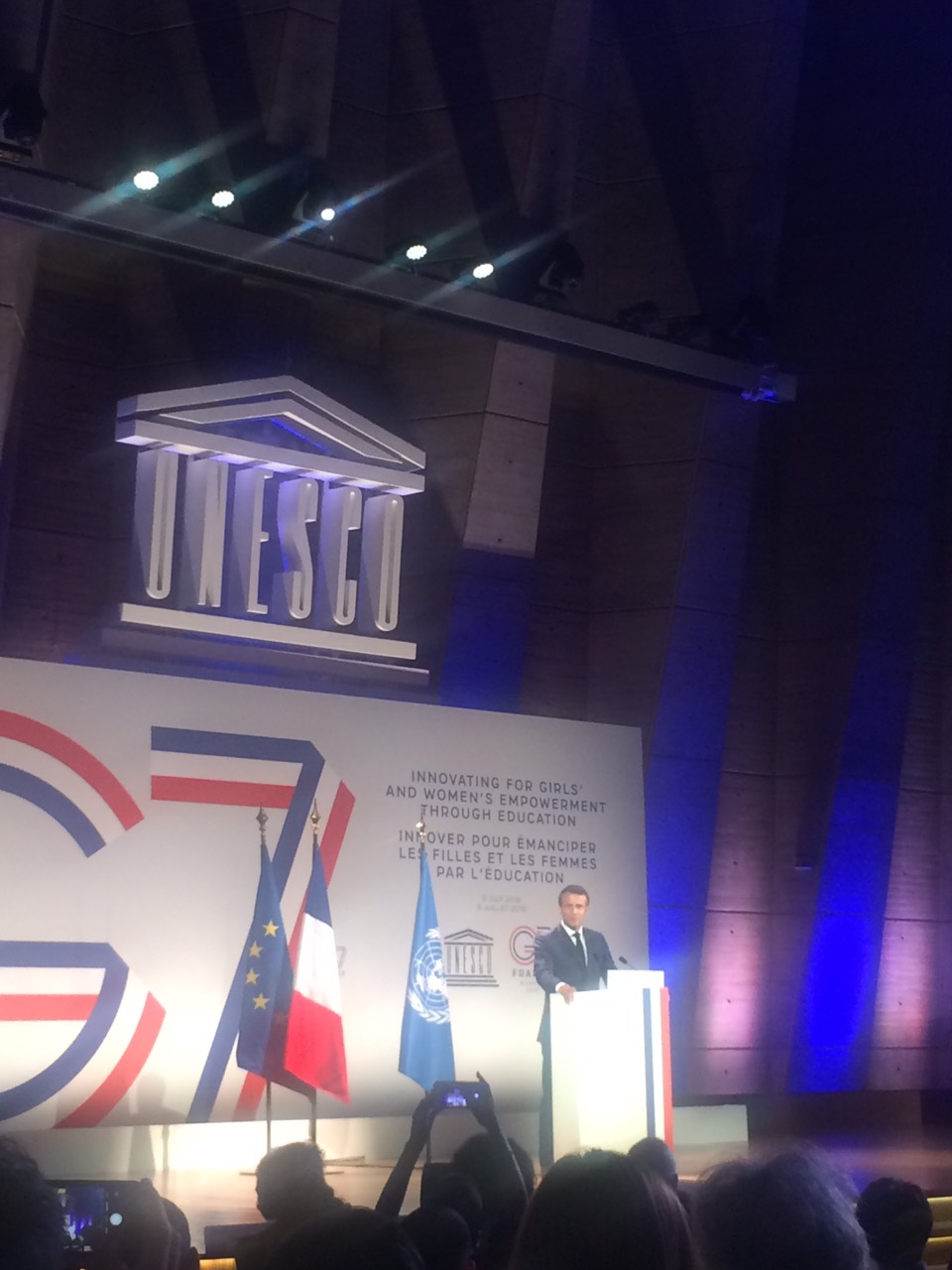 Representatives of the Permanent Delegation of the Republic of Serbia to UNESCO attended the G7 France-UNESCO International conference "Innovating for girls’ and women's empowerment through education", held on 5th July 2019 at UNESCO Headquarters. The President of the French Republic H. E. Mr. Emmanuel Macron concluded this conference. Representatives of the Permanent Delegation of the Republic of Serbia to UNESCO attended the G7 France-UNESCO International conference "Innovating for girls’ and women's empowerment through education", held on 5th July 2019 at UNESCO Headquarters. The President of the French Republic H. E. Mr. Emmanuel Macron concluded this conference. |
|
|
| Participation at the conference within the framework of the UNESCO-led project "Revive the Spirit of Mosul" |
|
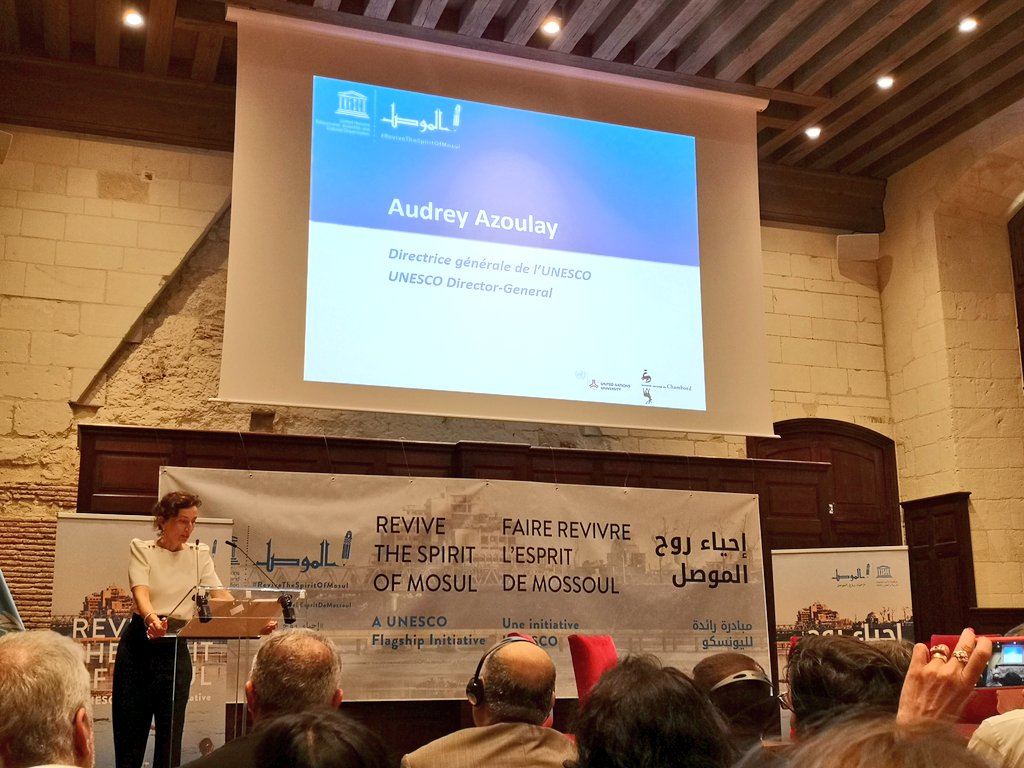 Representative of the Permanent Delegation of the Republic of Serbia to UNESCO participated at the international conference organized on 26 June 2019 by UNESCO, the United Nations University and the National Estate of Chambord (France), at the château Chambord, within the framework of the UNESCO-led project "Revive the Spirit of Mosul" dedicated to the reconstruction and safeguarding heritage of this Iraqi city. Representative of the Permanent Delegation of the Republic of Serbia to UNESCO participated at the international conference organized on 26 June 2019 by UNESCO, the United Nations University and the National Estate of Chambord (France), at the château Chambord, within the framework of the UNESCO-led project "Revive the Spirit of Mosul" dedicated to the reconstruction and safeguarding heritage of this Iraqi city.
|
|
|
| Cocktail reception on the completion of the chairmanship of the Republic of Serbia of the Electoral Group II (Eastern European Countries) |
|
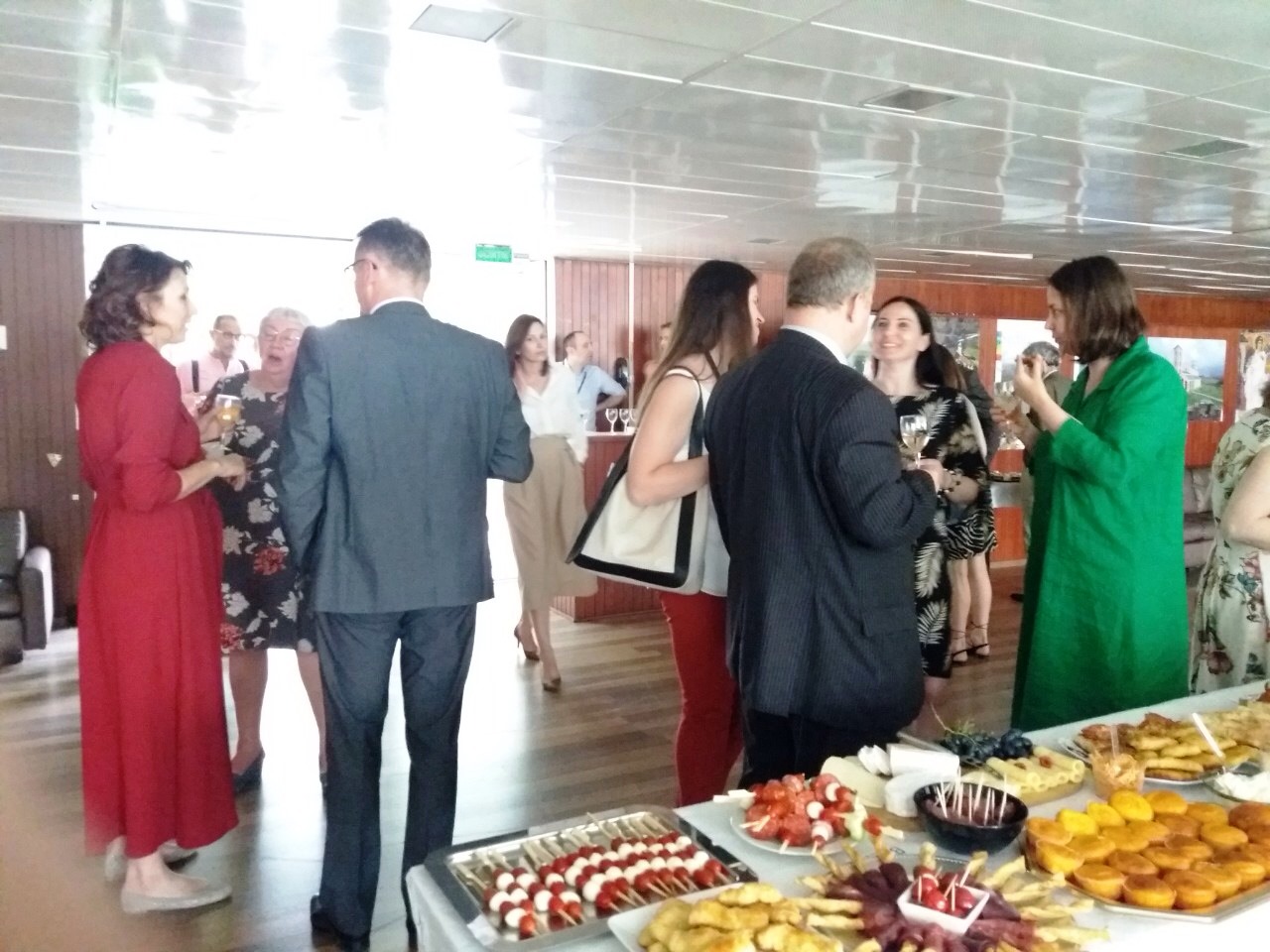 The Permanent Delegation of the Republic of Serbia to UNESCO organized a cocktail reception on 25th June 2019, on the occasion of the completion of the six-month chairmanship of the Republic of Serbia of the Electoral Group II (Eastern European Countries), which brings together 25 UNESCO Member States. The cocktail reception was attended by the representatives of the Member States of the Electoral Group II and chairpersons of other electoral groups in UNESCO. It was also used for the presentation of photographs, videos and other promotional materials about Serbia. The Permanent Delegation of the Republic of Serbia to UNESCO organized a cocktail reception on 25th June 2019, on the occasion of the completion of the six-month chairmanship of the Republic of Serbia of the Electoral Group II (Eastern European Countries), which brings together 25 UNESCO Member States. The cocktail reception was attended by the representatives of the Member States of the Electoral Group II and chairpersons of other electoral groups in UNESCO. It was also used for the presentation of photographs, videos and other promotional materials about Serbia. |
|
|
| Participation of the Republic of Serbia at the meeting of the International Co-ordinating Council of the UNESCO Man and the Biosphere (MAB) Programme |
|
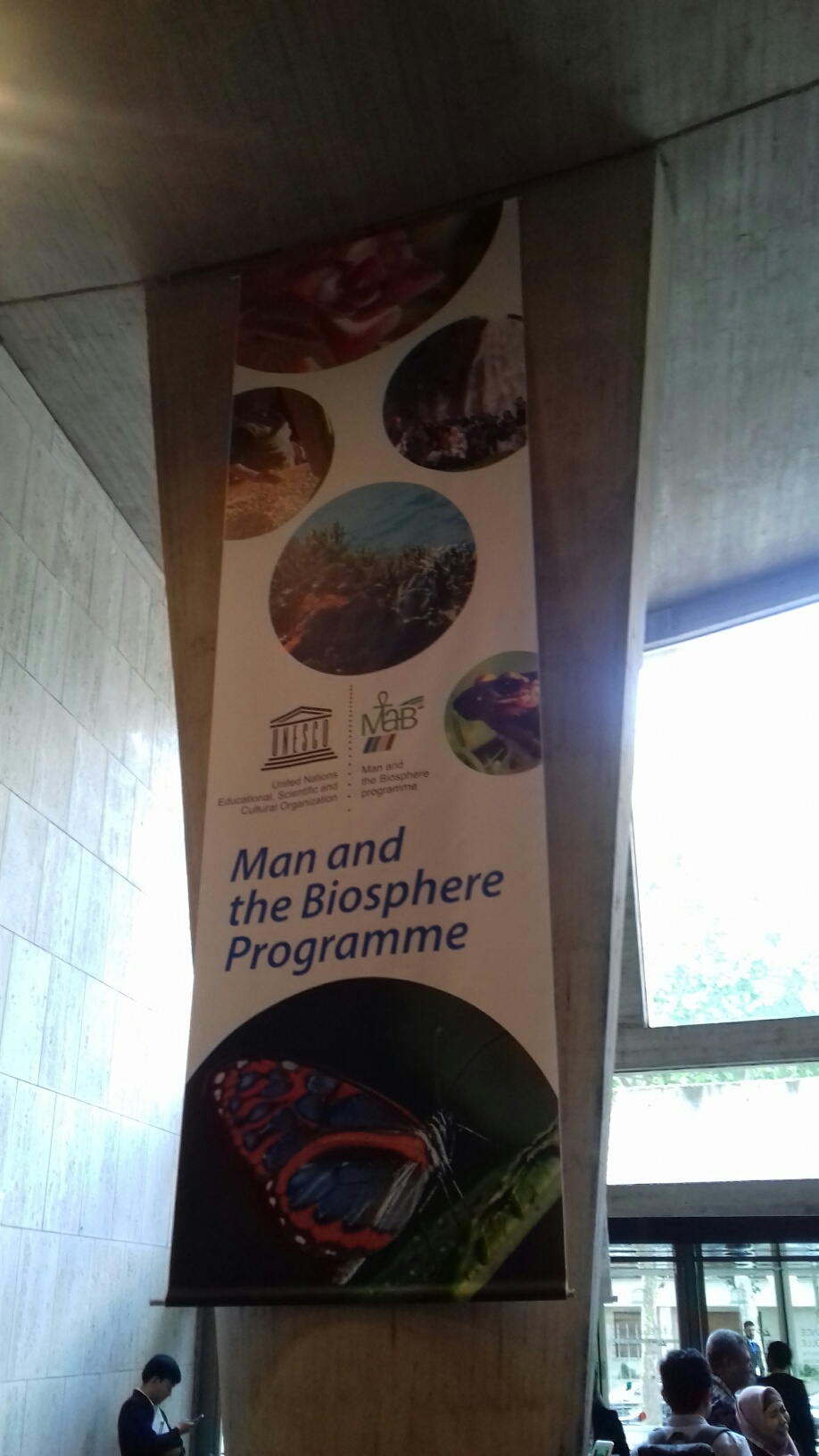 The delegation of the Republic of Serbia consisted of the Director of the Institute for Nature Conservation of Serbia Mr. Aleksandar Dragišić and the representatives of the Permanent Delegation of the Republic of Serbia to UNESCO participated, as an observer, at the 31st session of the International Co-ordinatig Council of the UNESCO Program "Man and Biosphere" held at UNESCO Headquarters, 17-21 June 2019. So far, at the territory of the Republic of Serbia "Golija - Studenica" (2001) and "Bačko Podunavlje" (2017) have been inscribed into the World Network of Biosphere Reserves. The delegation of the Republic of Serbia consisted of the Director of the Institute for Nature Conservation of Serbia Mr. Aleksandar Dragišić and the representatives of the Permanent Delegation of the Republic of Serbia to UNESCO participated, as an observer, at the 31st session of the International Co-ordinatig Council of the UNESCO Program "Man and Biosphere" held at UNESCO Headquarters, 17-21 June 2019. So far, at the territory of the Republic of Serbia "Golija - Studenica" (2001) and "Bačko Podunavlje" (2017) have been inscribed into the World Network of Biosphere Reserves. |
|
|
| Meeting of electoral groups in UNESCO |
|
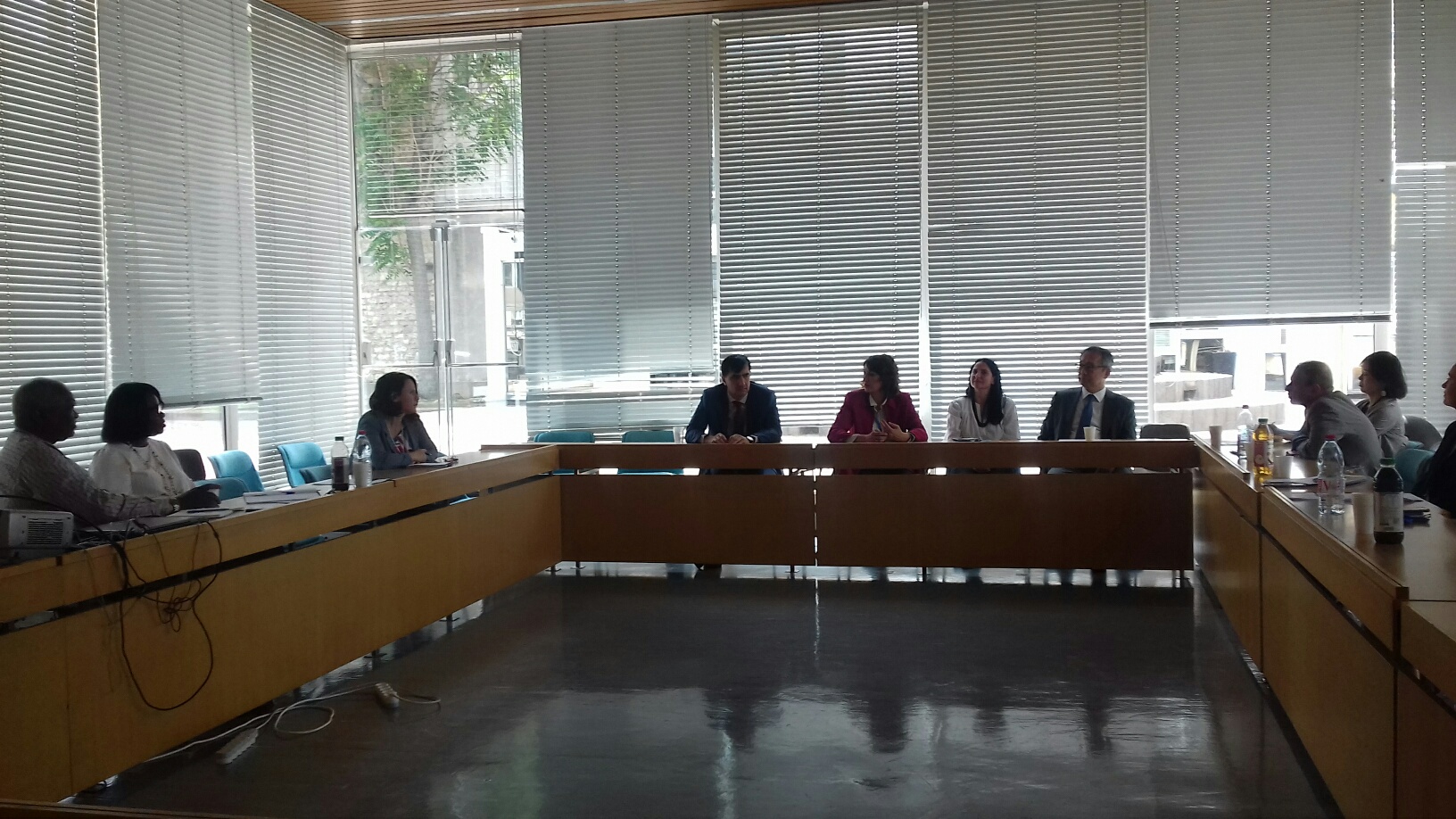 In the context of the Presidency of the Permanent Delegation of the Republic of Serbia to UNESCO of the Electoral Group II (Eastern European Countries), during the first six months of 2019, a joint meeting of UNESCO electoral groups on the improvement of cooperation and exchange of the information on the candidatures for UNESCO bodies was held on 14th June 2019. In the context of the Presidency of the Permanent Delegation of the Republic of Serbia to UNESCO of the Electoral Group II (Eastern European Countries), during the first six months of 2019, a joint meeting of UNESCO electoral groups on the improvement of cooperation and exchange of the information on the candidatures for UNESCO bodies was held on 14th June 2019. |
|
|
| Participation of the Republic of Serbia at the Conference of Parties to the Convention on the Protection and Promotion of the Diversity of Cultural Expressions (2005 Convention) |
|
 The Delegation of the Republic of Serbia, led by Vuk Vukićević, PhD, Director of the Center for Studies in Cultural Development, participated at the 7th Conference of the Parties to the Convention on the Protection and Promotion of the Diversity of Cultural Expressions, held in Paris, from 4 until 7 June 2019. On the first day of the session, the Republic of Serbia was elected as a Vice-Chairperson of the Conference. During the general debate, the commitment of our country to the implementation of the 2005 Convention was highlighted, as well as concrete measures and activities of the competent institutions of the Republic of Serbia that were carried out in that context. The Delegation of the Republic of Serbia, led by Vuk Vukićević, PhD, Director of the Center for Studies in Cultural Development, participated at the 7th Conference of the Parties to the Convention on the Protection and Promotion of the Diversity of Cultural Expressions, held in Paris, from 4 until 7 June 2019. On the first day of the session, the Republic of Serbia was elected as a Vice-Chairperson of the Conference. During the general debate, the commitment of our country to the implementation of the 2005 Convention was highlighted, as well as concrete measures and activities of the competent institutions of the Republic of Serbia that were carried out in that context. |
|
|
| African Week in UNESCO |
|
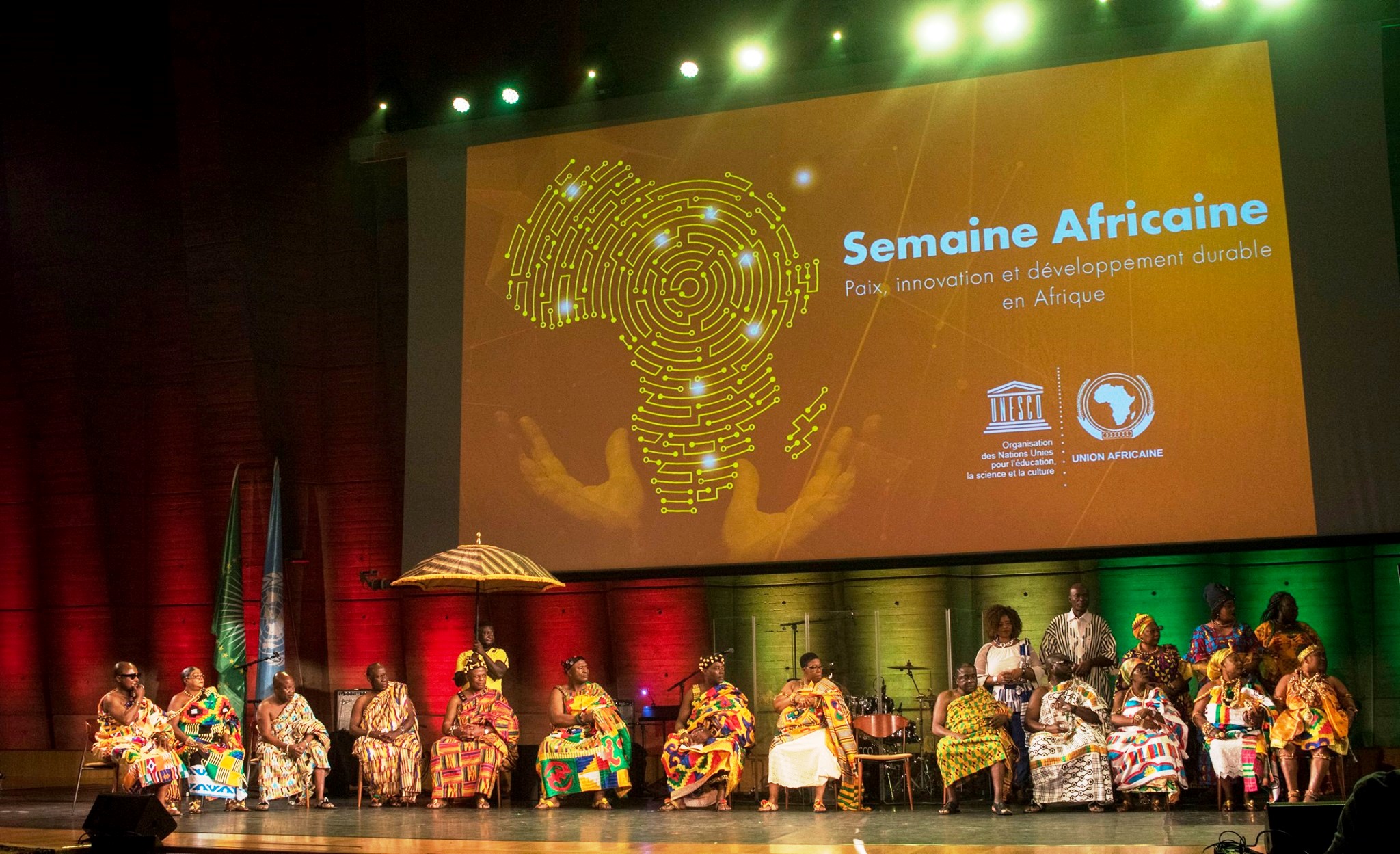 Representatives of the Permanent Delegation of the Republic of Serbia to UNESCO attended various activities organized within the African Week at the UNESCO Headquarters from 20th until 24th May 2019. Representatives of the Permanent Delegation of the Republic of Serbia to UNESCO attended various activities organized within the African Week at the UNESCO Headquarters from 20th until 24th May 2019.
|
|
|
| Special message of the First Deputy Prime Minister and Minister of Foreign Affairs of the Republic of Serbia Ivica Dačić on the occasion of 25 May, Day of Friendship of the Republic of Serbia with the Peoples of Africa |
|
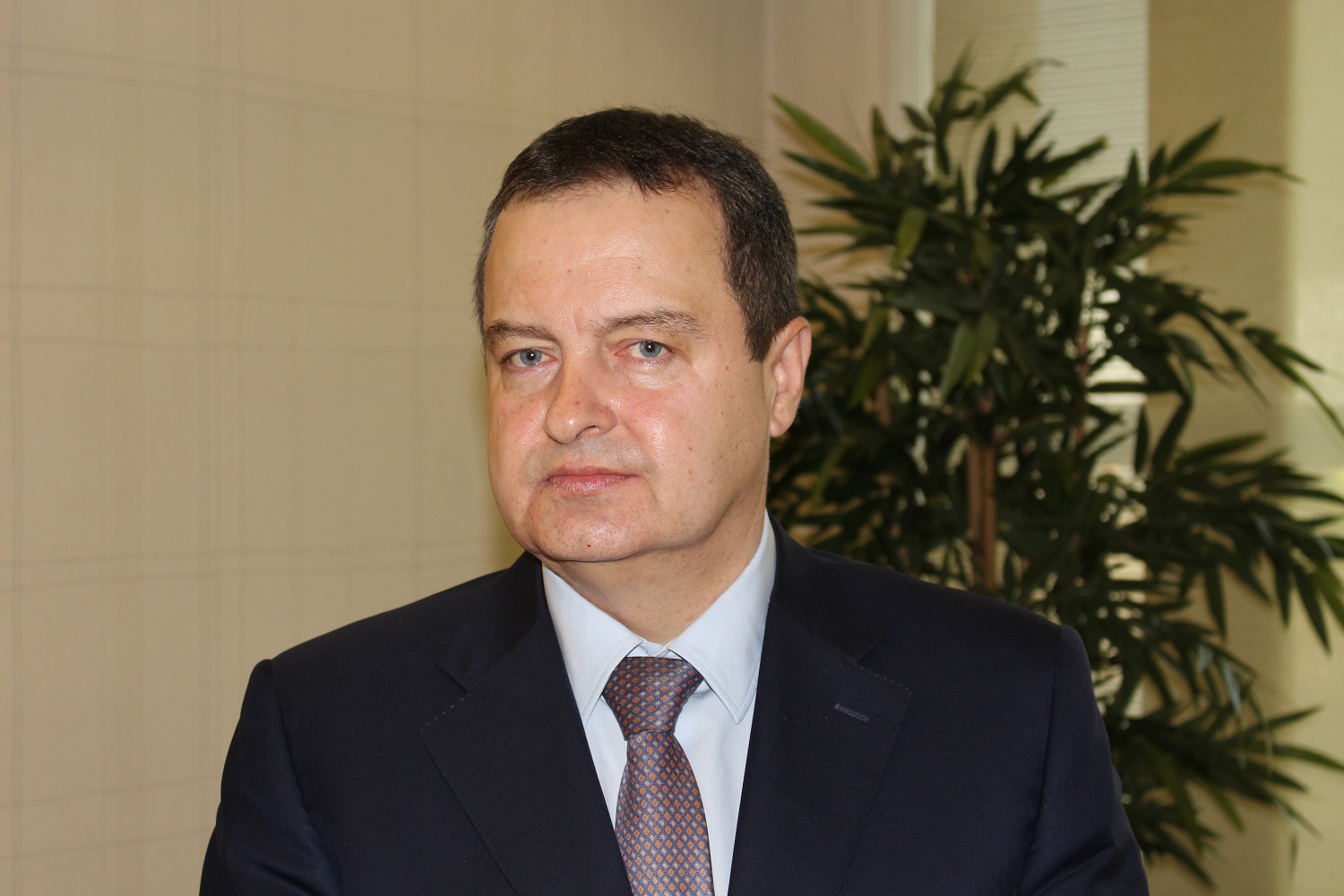 First Deputy Prime Minister and Minister of Foreign Affairs of the Republic of Serbia H.E. Mr. Ivica Dačić, sent a special message on the occasion of 25th May, celebrated in the Republic of Serbia as the Day of Friendship with African Peoples. First Deputy Prime Minister and Minister of Foreign Affairs of the Republic of Serbia H.E. Mr. Ivica Dačić, sent a special message on the occasion of 25th May, celebrated in the Republic of Serbia as the Day of Friendship with African Peoples.
In the message, that the Permanent Delegation of the Republic of Serbia to UNESCO distributed to the delegations of African countries in UNESCO, it is said:
“We in Serbia have been for a long time jointly celebrating Africa Day which our friends from Africa celebrate as their own holiday. So, in 2017, the Government of the Republic of Serbia formally decided to include 25th of May, in the calendar of most important dates in our country as the Day of Friendship with African Peoples. To us, that day symbolizes primarily our sincere wish to foster and painstakingly build our relations with Africa which we have been linked to by decades-long traditional friendship dating back to the times of the former Socialist Federal Republic of Yugoslavia.
The relations between Serbia and African countries have been based on solid foundations of togetherness, mutual understanding and support, cooperation and solidarity. These relations are not just about the past that we are extremely proud of, but about a promising future as well.
The Republic of Serbia is strongly committed to the development of comprehensive cooperation with African countries and within the limits of its possibilities it is dedicated to the further strengthening of political and economic ties as well as those in the fields of culture, education and other segments falling within the purview of UNESCO.
Designating 25th of May as the Day of Friendship with the Peoples of Africa is a symbolic way of reaffirming this commitment. At the same time, it represents an additional impetus to enriching our relations with a new content where a prominent place is undoubtedly assigned to UNESCO activities. In that context, along with the engagement in the field of humanitarian and development activities in Africa, we shall continue to grant scholarships to African students attending Serbian universities. It will be an honor for us to host those young people representing an important bridge between our cultures and true Ambassadors of Serbian-African friendship.
The Republic of Serbia is heartened by any progress made by the African continent and we support the efforts of African countries to meet strategic African goals including ensuring a peaceful and safe future, eradication of poverty and disease, preservation and strengthening of cultural identity, common heritage and values as well as the continent's political, economic and cultural unity with a view to creating a united and powerful Africa as a global factor and partner. This is the place that Africa and its peoples, we deeply believe, undoubtedly deserve.
In Serbia, Africa has always had and will have a friend and partner for cooperation in the interest of well-being and prosperity for all of us. In that spirit, please accept, Your Excellencies, the assurances of my highest consideration.”
|
|
|
| Participation of the Republic of Serbia at the Fifth Meeting of States Parties to the 1970 Convention |
|
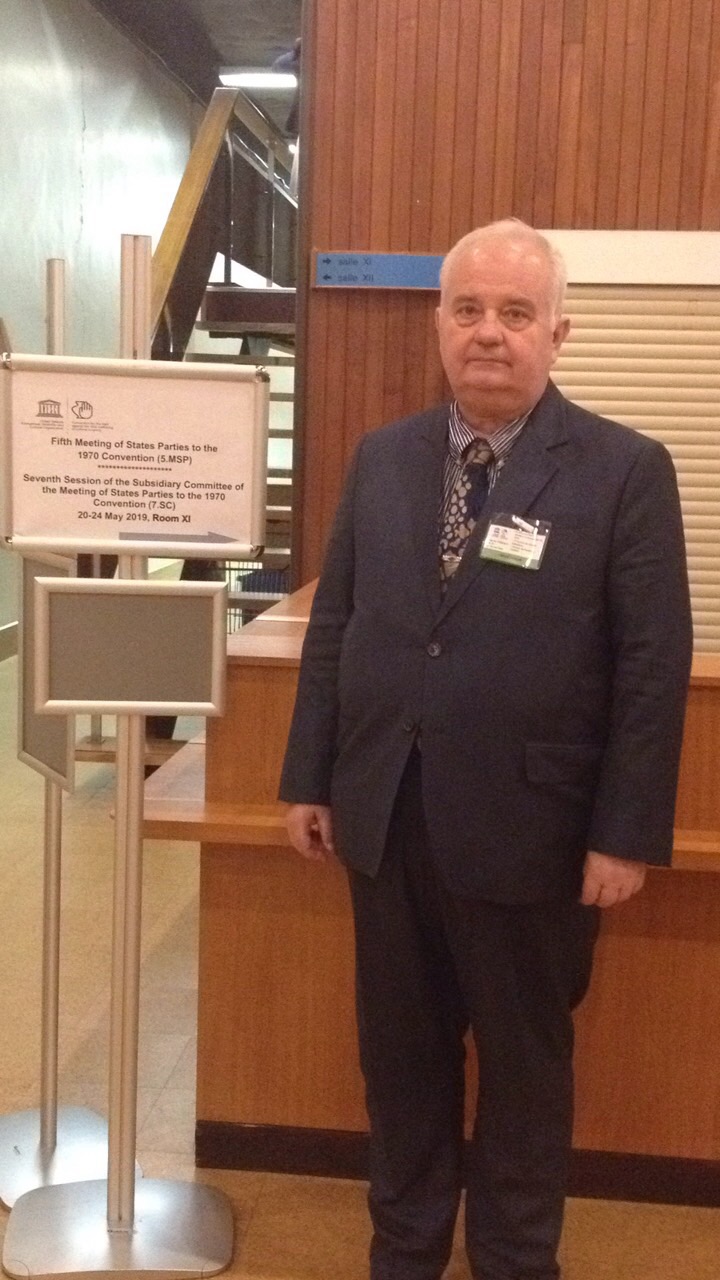 Mr. Vladimir Davidovic, Assistant Minister of Justice of the Republic of Serbia, participated at the Fifth Meeting of States Parties to the 1970 Convention on the Means of Prohibiting and Preventing the Illicit Import, Export and Transfer of Ownership of Cultural Property that took place on 20 and 21 May 2019 at UNESCO Headquarters in Paris. Mr. Davidovic also participated at the Seventh Session of the Subsidiary Committee of the Meeting of States Parties to the 1970 Convention, on 22 and 23 May 2019. Mr. Vladimir Davidovic, Assistant Minister of Justice of the Republic of Serbia, participated at the Fifth Meeting of States Parties to the 1970 Convention on the Means of Prohibiting and Preventing the Illicit Import, Export and Transfer of Ownership of Cultural Property that took place on 20 and 21 May 2019 at UNESCO Headquarters in Paris. Mr. Davidovic also participated at the Seventh Session of the Subsidiary Committee of the Meeting of States Parties to the 1970 Convention, on 22 and 23 May 2019. |
|
|
| Participation of the delegation of the Republic of Serbia at the UNESCO International Water Conference, 13-14th May 2019 |
|
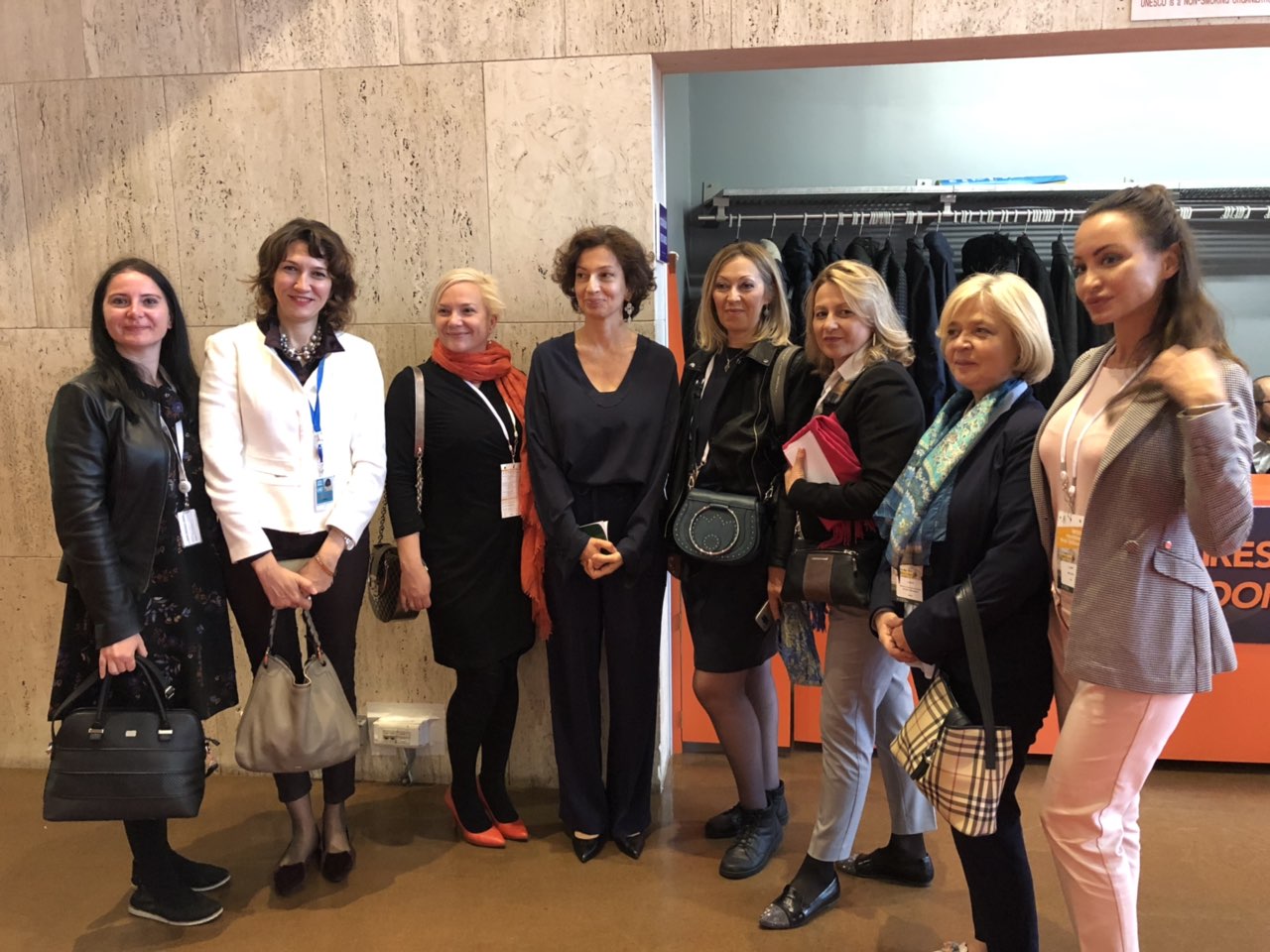 Delegation of the Republic of Serbia, led by Ms. Natasa Milic, Acting Director of the Republic Directorate for Water of the Ministry of Agriculture, Forestry and Water Management of the Republic of Serbia, participated at the UNESCO International Water Conference held on 13-14th May 2019. Delegation of the Republic of Serbia, led by Ms. Natasa Milic, Acting Director of the Republic Directorate for Water of the Ministry of Agriculture, Forestry and Water Management of the Republic of Serbia, participated at the UNESCO International Water Conference held on 13-14th May 2019. |
|
|
| Delegation of UNESCO met the President of the Republic of France H.E. Mr. Emmanuel Macron |
|
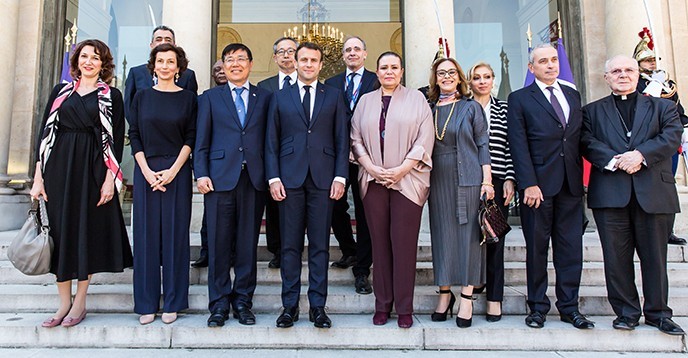 On 19 April 2019, the Delegation of UNESCO met H.E. Mr. Emmanuel Macron, the President of the Republic of France, in order to present him the Statement by the Executive Board of UNESCO following the tragic fire at Notre-Dame Cathedral in Paris, France. Director-General Ms. Audrey Azoulay, President of the Executive Board of UNESCO H.E Mr. Lee Byong-hyun and the President of the General Conference of UNESCO H.E. Ms. Zohour Alaoui headed delegation, accompanied by several ambassadors representing Member States of UNESCO. Ambassador Tamara Rastovac Siamashvili, Permanent Delegate of the Republic of Serbia to UNESCO, attended this meeting as a Vice-Chair of the Executive Board of UNESCO. On 19 April 2019, the Delegation of UNESCO met H.E. Mr. Emmanuel Macron, the President of the Republic of France, in order to present him the Statement by the Executive Board of UNESCO following the tragic fire at Notre-Dame Cathedral in Paris, France. Director-General Ms. Audrey Azoulay, President of the Executive Board of UNESCO H.E Mr. Lee Byong-hyun and the President of the General Conference of UNESCO H.E. Ms. Zohour Alaoui headed delegation, accompanied by several ambassadors representing Member States of UNESCO. Ambassador Tamara Rastovac Siamashvili, Permanent Delegate of the Republic of Serbia to UNESCO, attended this meeting as a Vice-Chair of the Executive Board of UNESCO. |
|
|
| Presentation of the Letter of Credentials of Ambassador Tamara Rastovac Siamashvili |
|
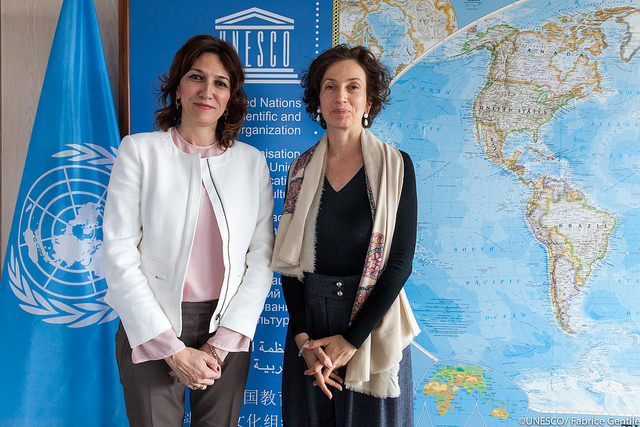 Her Excellency Ms. Tamara RASTOVAC-SIAMASHVILI has presented to Ms. Audrey AZOULAY, Director-General of UNESCO, the Letter of Credentials accrediting her as Ambassador and Permanent Delegate of the Republic of Serbia to UNESCO, on 28th March 2019. Her Excellency Ms. Tamara RASTOVAC-SIAMASHVILI has presented to Ms. Audrey AZOULAY, Director-General of UNESCO, the Letter of Credentials accrediting her as Ambassador and Permanent Delegate of the Republic of Serbia to UNESCO, on 28th March 2019. |
|
|
| Performance of the national ensemble "Kolo" in UNESCO |
|
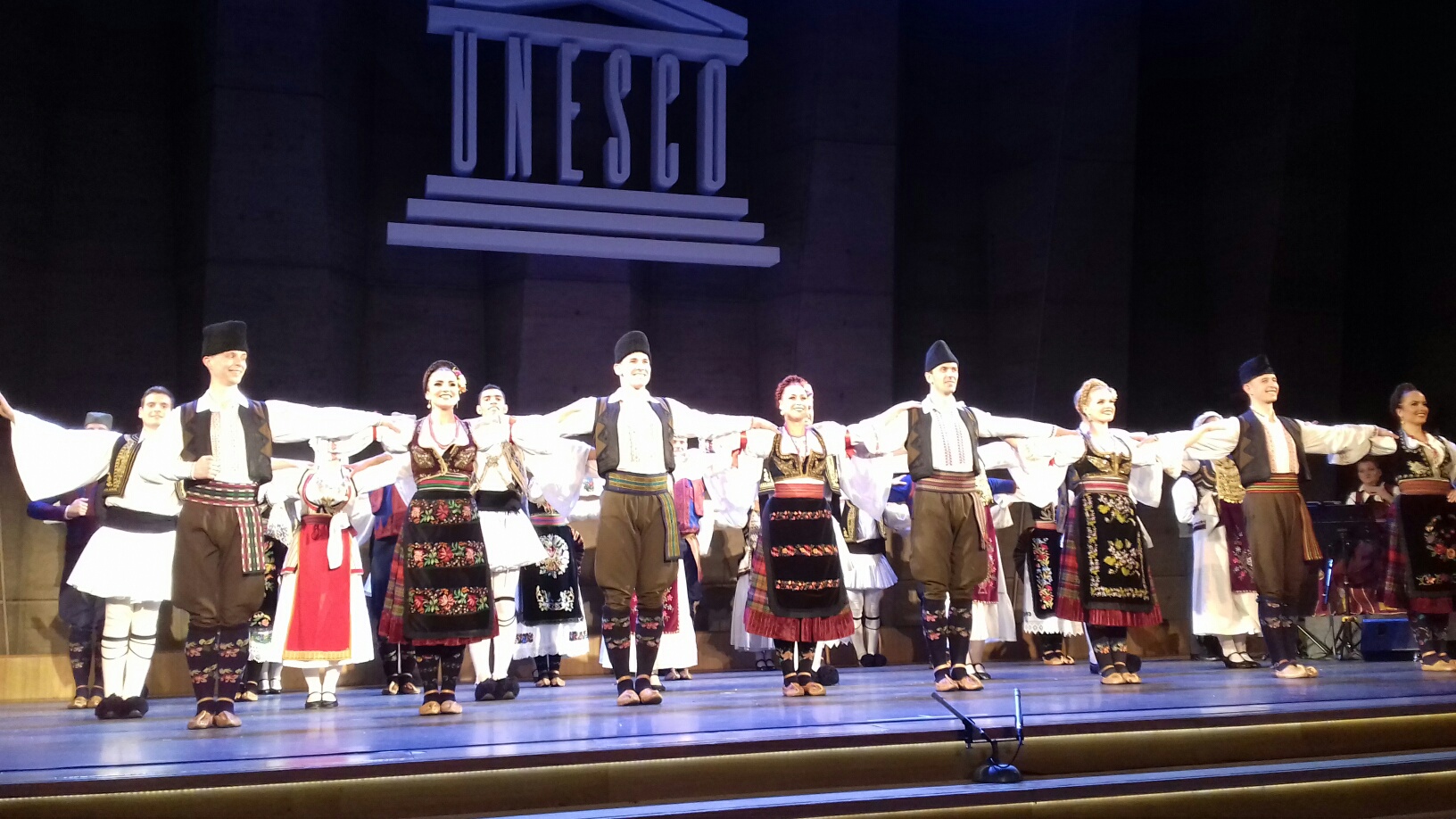 The joint performance of the Academy of traditional Greek dances "Parthenon" and the national ensemble "Kolo" from Serbia was held in UNESCO on 23 March 2019. The performance was opened with short statements by the representatives of the Permanent Delegations of Greece and the Republic of Serbia to UNESCO, Ms. Maria Corantis and Ms. Danijela Cubrilo, who emphasized the traditional friendship between the two countries and two peoples, that has been confirmed on many occasions in the most difficult historical circumstances. Dances and songs from different parts of Greece and Serbia were presented and two ensembles performed several dances jointly. The joint performance of the Academy of traditional Greek dances "Parthenon" and the national ensemble "Kolo" from Serbia was held in UNESCO on 23 March 2019. The performance was opened with short statements by the representatives of the Permanent Delegations of Greece and the Republic of Serbia to UNESCO, Ms. Maria Corantis and Ms. Danijela Cubrilo, who emphasized the traditional friendship between the two countries and two peoples, that has been confirmed on many occasions in the most difficult historical circumstances. Dances and songs from different parts of Greece and Serbia were presented and two ensembles performed several dances jointly.
|
|
|
| Evening of Gastronomy in UNESCO |
|
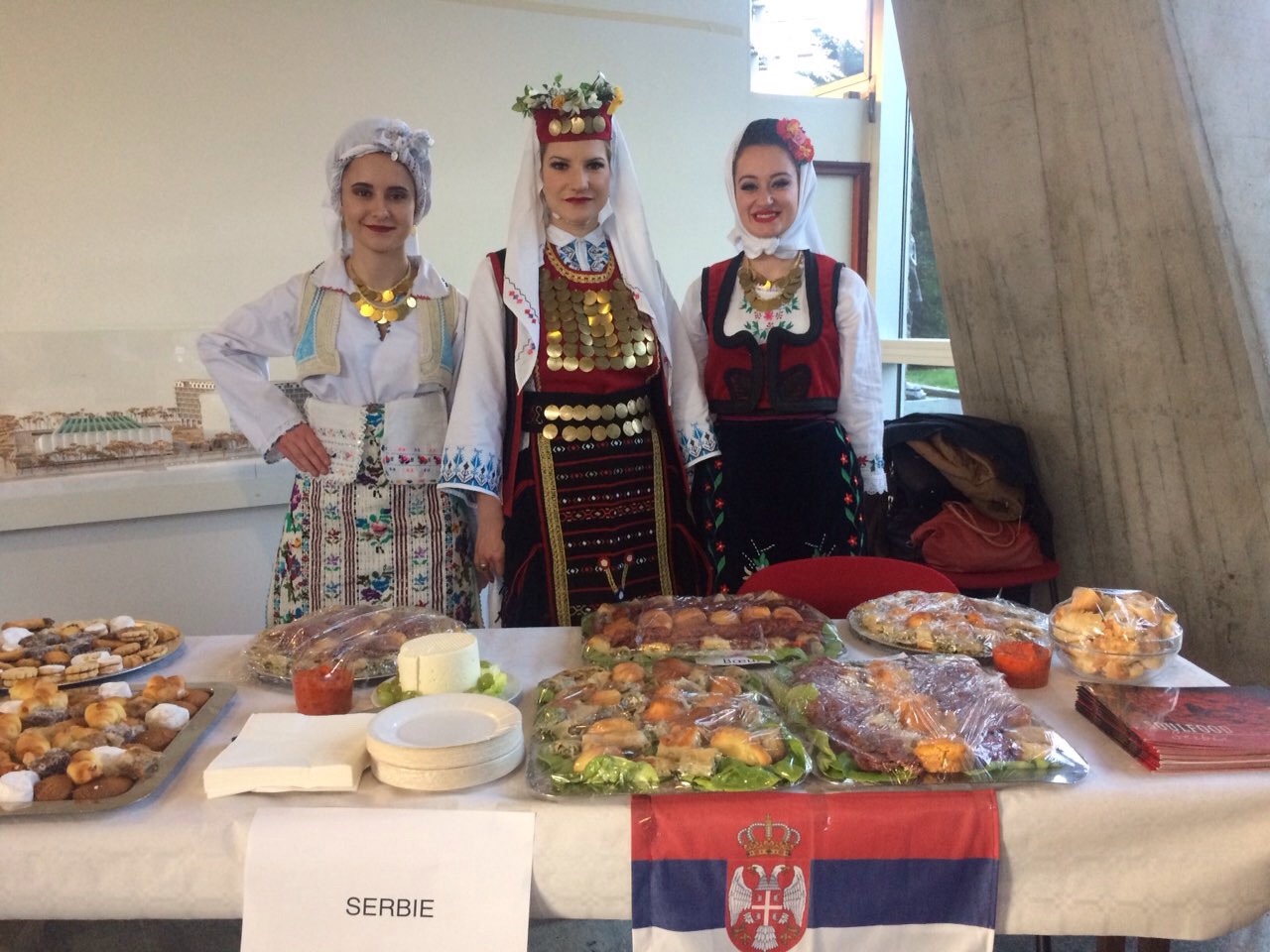 On the occasion of the International Day of Francophonie, the Permanent Delegation of the Republic of Serbia to UNESCO participated in the event "Evening of Gastronomy", organized by the Group of Francophonie in Unesco, with the presentation of the Serbian national cuisine. Director-General of UNESCO, Ms. Audrey Azoulay and Secretary-General of the International Organization of Francophonie, Ms. Lousie Mushikiwabo welcomed participants at this event. On the occasion of the International Day of Francophonie, the Permanent Delegation of the Republic of Serbia to UNESCO participated in the event "Evening of Gastronomy", organized by the Group of Francophonie in Unesco, with the presentation of the Serbian national cuisine. Director-General of UNESCO, Ms. Audrey Azoulay and Secretary-General of the International Organization of Francophonie, Ms. Lousie Mushikiwabo welcomed participants at this event. |
|
|
| Participation at UNESCO Global Conference "Principles of Artificial Intelligence: Towards a Humanistic Approach?". |
|
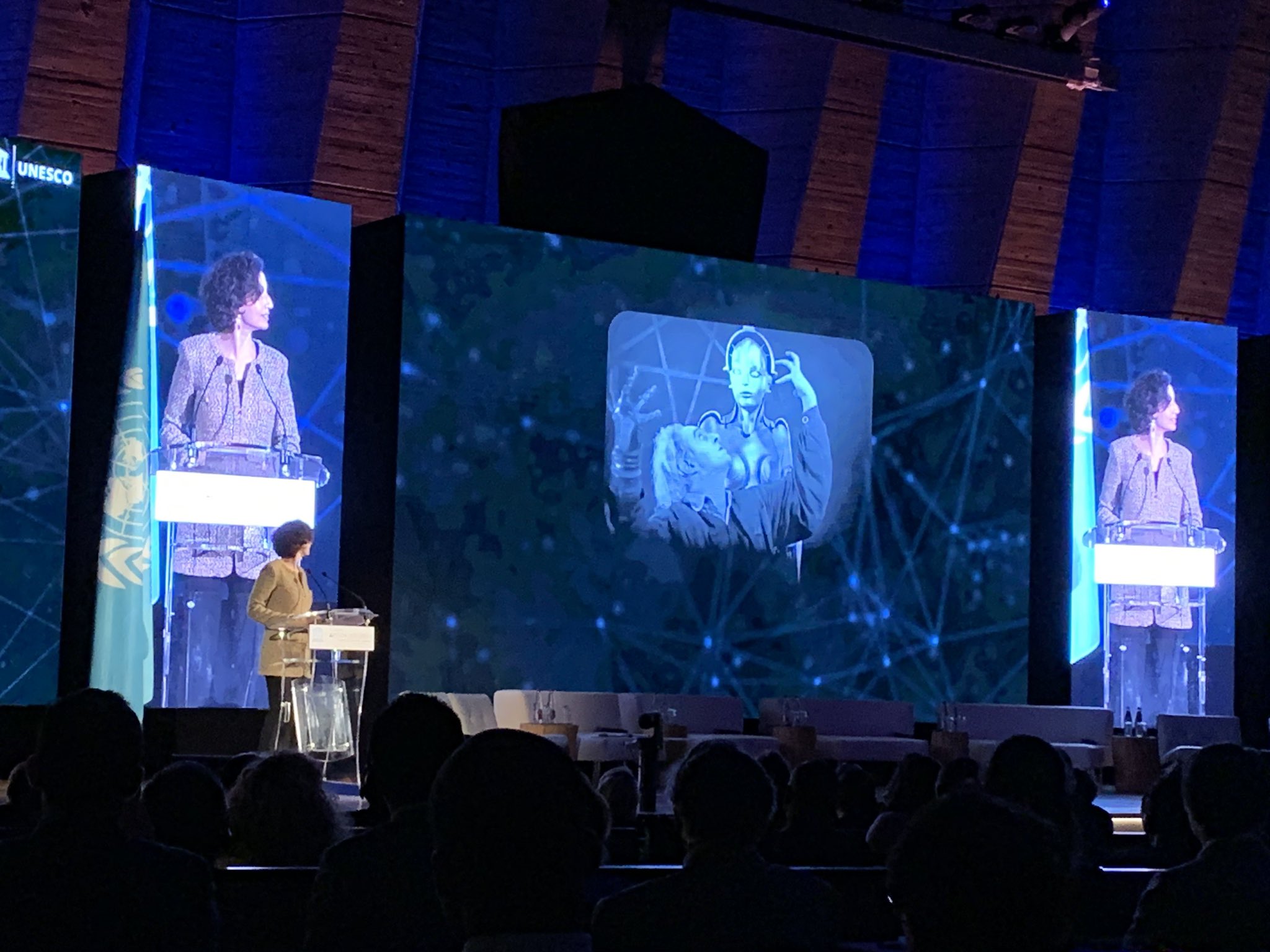 Representatives of the Permanent Delegation of the Republic of Serbia to UNESCO participated on March 4, 2019 at UNESCO Global Conference entitled "Principles of Artificial Intelligence: Towards a Humanistic Approach?". Representatives of the Permanent Delegation of the Republic of Serbia to UNESCO participated on March 4, 2019 at UNESCO Global Conference entitled "Principles of Artificial Intelligence: Towards a Humanistic Approach?". |
|
|
| Presentation of Serbian cuisine |
|
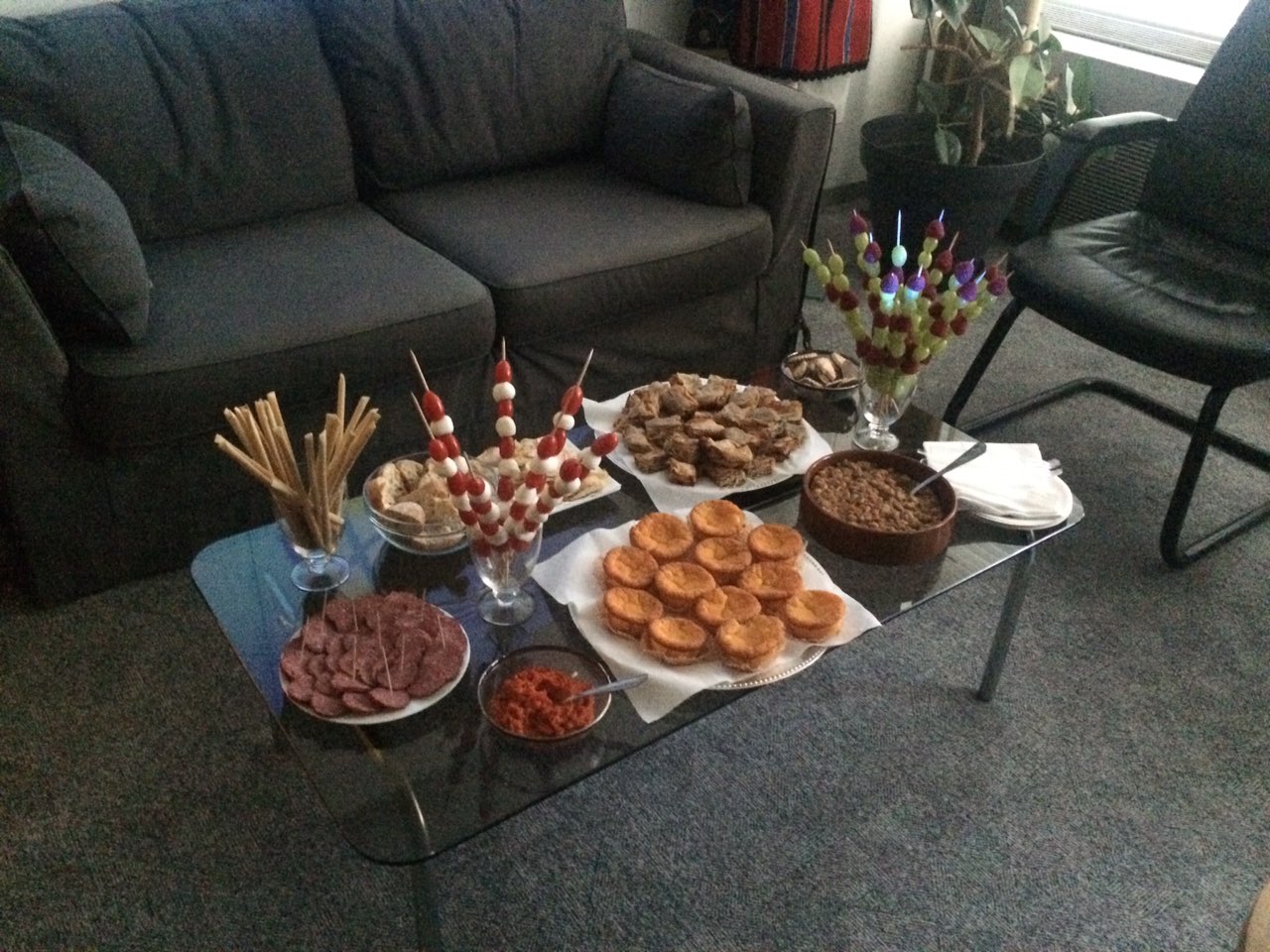 The Permanent Delegation of the Republic of Serbia to UNESCO organized a presentation of Serbian national cuisine in its premises on February 25, 2019. The video material of the Tourist Organization of Serbia "Soulfood Serbia" was presented, and the participants could try some of the specialties of Serbian national cuisine prepared by the members of our Permanent Delegation to UNESCO. The Permanent Delegation of the Republic of Serbia to UNESCO organized a presentation of Serbian national cuisine in its premises on February 25, 2019. The video material of the Tourist Organization of Serbia "Soulfood Serbia" was presented, and the participants could try some of the specialties of Serbian national cuisine prepared by the members of our Permanent Delegation to UNESCO.
|
|
|
| International Mother Language Day in UNESCO |
|
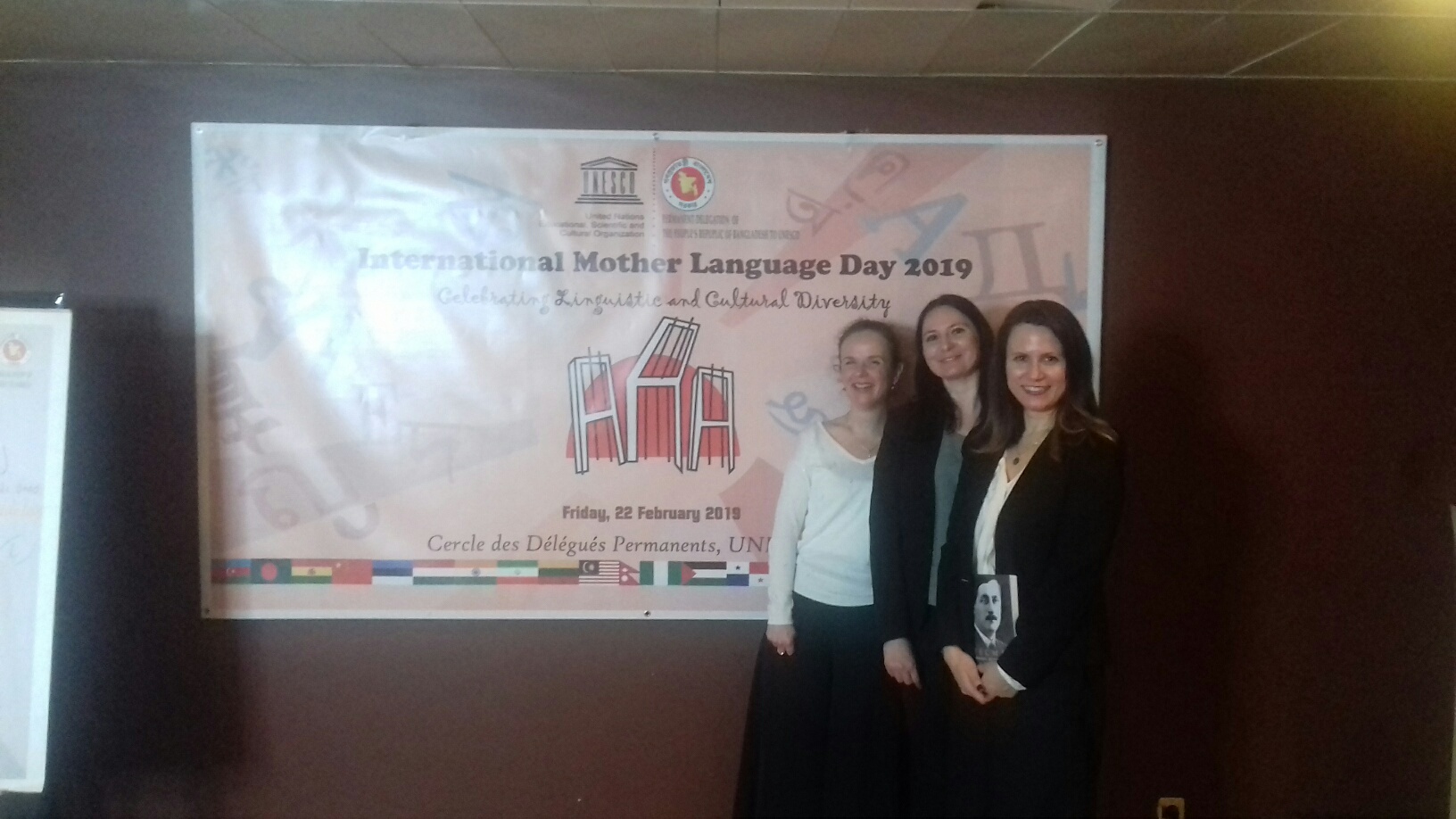 Permanent Delegation of the Republic of Serbia to UNESCO took part in this year's celebration of the International Mother Language Day (21st February) in UNESCO. The participation was realized through presentation of publications in Serbian language about the world heritage of Serbia (elements that were inscribed to the UNESCO World Heritage List based on the proposals of the Republic of Serbia) and Isidora Sekulić's work, as well as through the participation in the festival of the national food prepared by the members of the Permanent Delegation. Also, representatives of the Permanent Delegation of the Republic of Serbia participated in the presentation of the national culture by reciting the poetry of Jovan Ducic in Serbian and French. Permanent Delegation of the Republic of Serbia to UNESCO took part in this year's celebration of the International Mother Language Day (21st February) in UNESCO. The participation was realized through presentation of publications in Serbian language about the world heritage of Serbia (elements that were inscribed to the UNESCO World Heritage List based on the proposals of the Republic of Serbia) and Isidora Sekulić's work, as well as through the participation in the festival of the national food prepared by the members of the Permanent Delegation. Also, representatives of the Permanent Delegation of the Republic of Serbia participated in the presentation of the national culture by reciting the poetry of Jovan Ducic in Serbian and French. |
|
|
| Presentation of the Serbian traditional music |
|
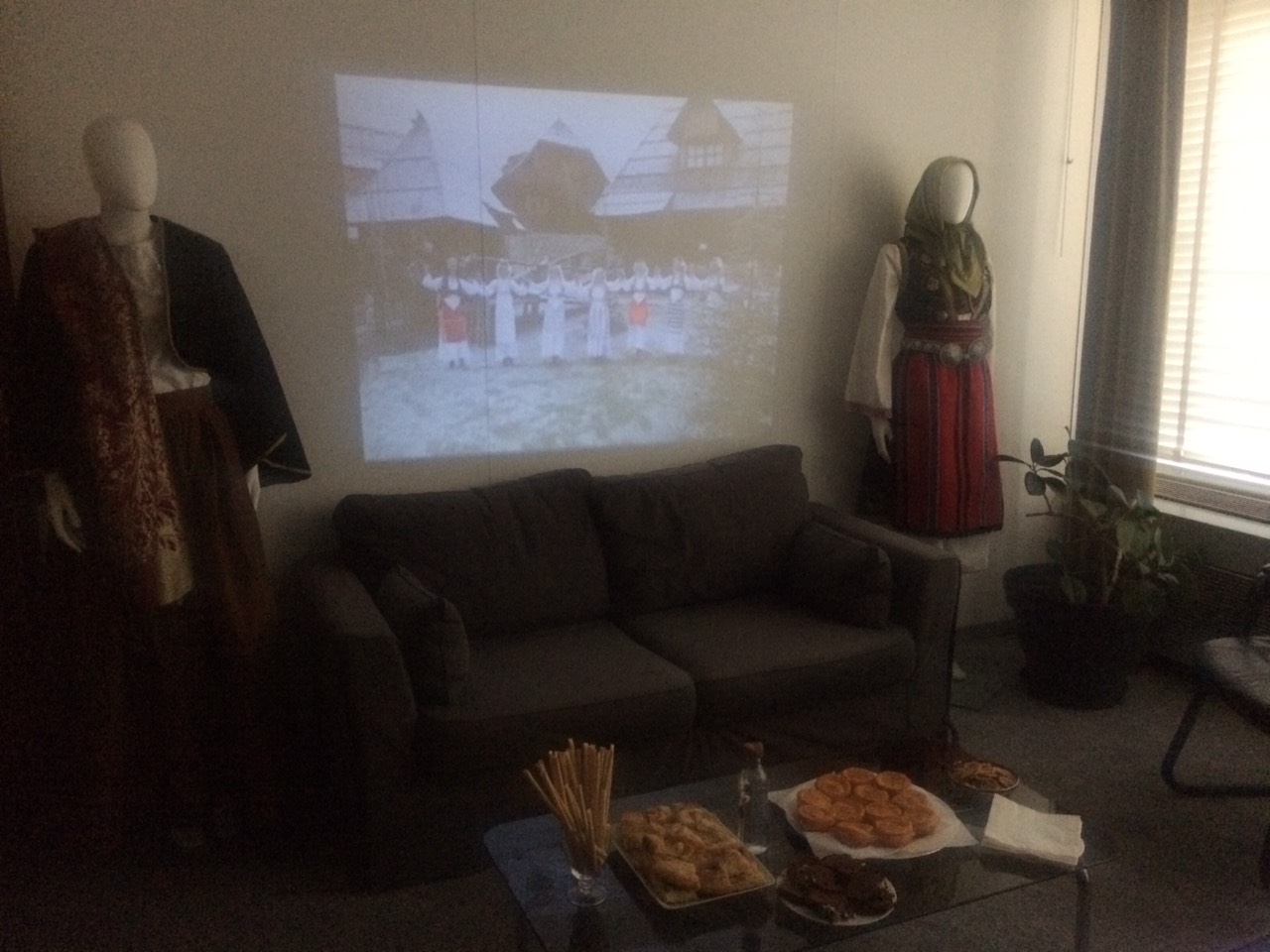 A presentation of the Serbian traditional music, focusing on music from Kosovo and Metohija, was held in the premises of the Permanent Delegation of Serbia to UNESCO on 21 February 2019. With comments and explanations provided by our young musicologist and music critic, Vojin Jagličić, the event was an occasion for attending diplomats to learn more about this important part of our cultural heritage. A presentation of the Serbian traditional music, focusing on music from Kosovo and Metohija, was held in the premises of the Permanent Delegation of Serbia to UNESCO on 21 February 2019. With comments and explanations provided by our young musicologist and music critic, Vojin Jagličić, the event was an occasion for attending diplomats to learn more about this important part of our cultural heritage.
In cooperation with the National Dance Ensemble “Kolo”, the event featured their video performance of the song “Bilbil pile, ne poj rano”, specifically prepared for this occasion. In the video, “Kolo” announced their joint performance with the Greek Dance Academy “Partenon”, to be held in UNESCO on 23 March 2019.
|
|
|
| Reception on the occasion of the Statehood Day of the Republic of Serbia |
|
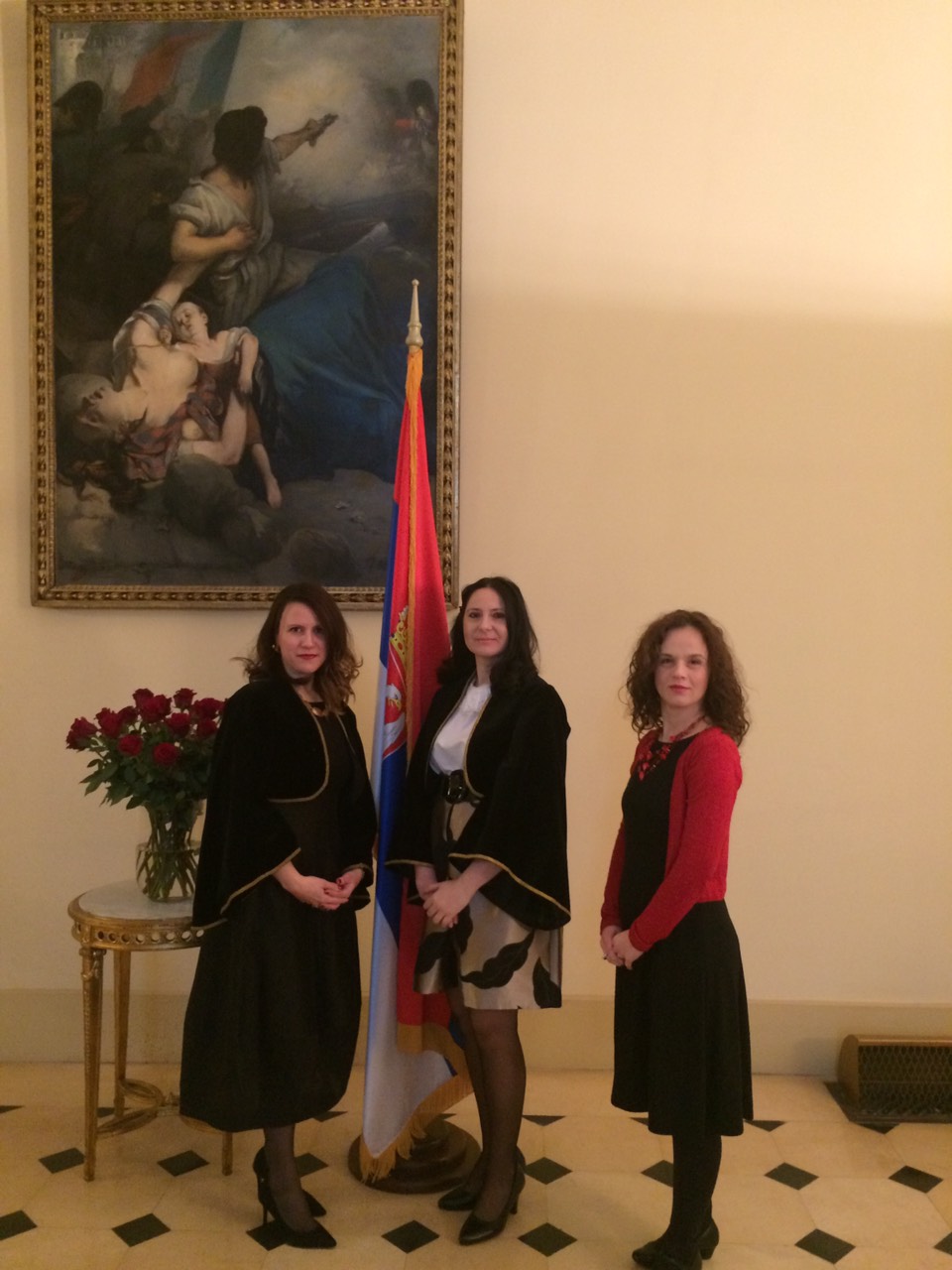 On February 14th, a reception was held in the residence of the ambassador of the Republic of Serbia to France on the occasion of the Statehood Day of the Republic of Serbia. The reception was attended by representatives of the Permanent Delegation of the Republic of Serbia to UNESCO, as well as ambassadors and other representatives of permanent delegations of UNESCO member states and the Secretariat. The Statehood Day of the Republic of Serbia, February 15th, was marked in the UNESCO by raising the flag of the Republic of Serbia in the Headquarters of the Organization. On February 14th, a reception was held in the residence of the ambassador of the Republic of Serbia to France on the occasion of the Statehood Day of the Republic of Serbia. The reception was attended by representatives of the Permanent Delegation of the Republic of Serbia to UNESCO, as well as ambassadors and other representatives of permanent delegations of UNESCO member states and the Secretariat. The Statehood Day of the Republic of Serbia, February 15th, was marked in the UNESCO by raising the flag of the Republic of Serbia in the Headquarters of the Organization. |
|
|
| Presentation of “Slava” as the intangible cultural heritage of Serbia |
|
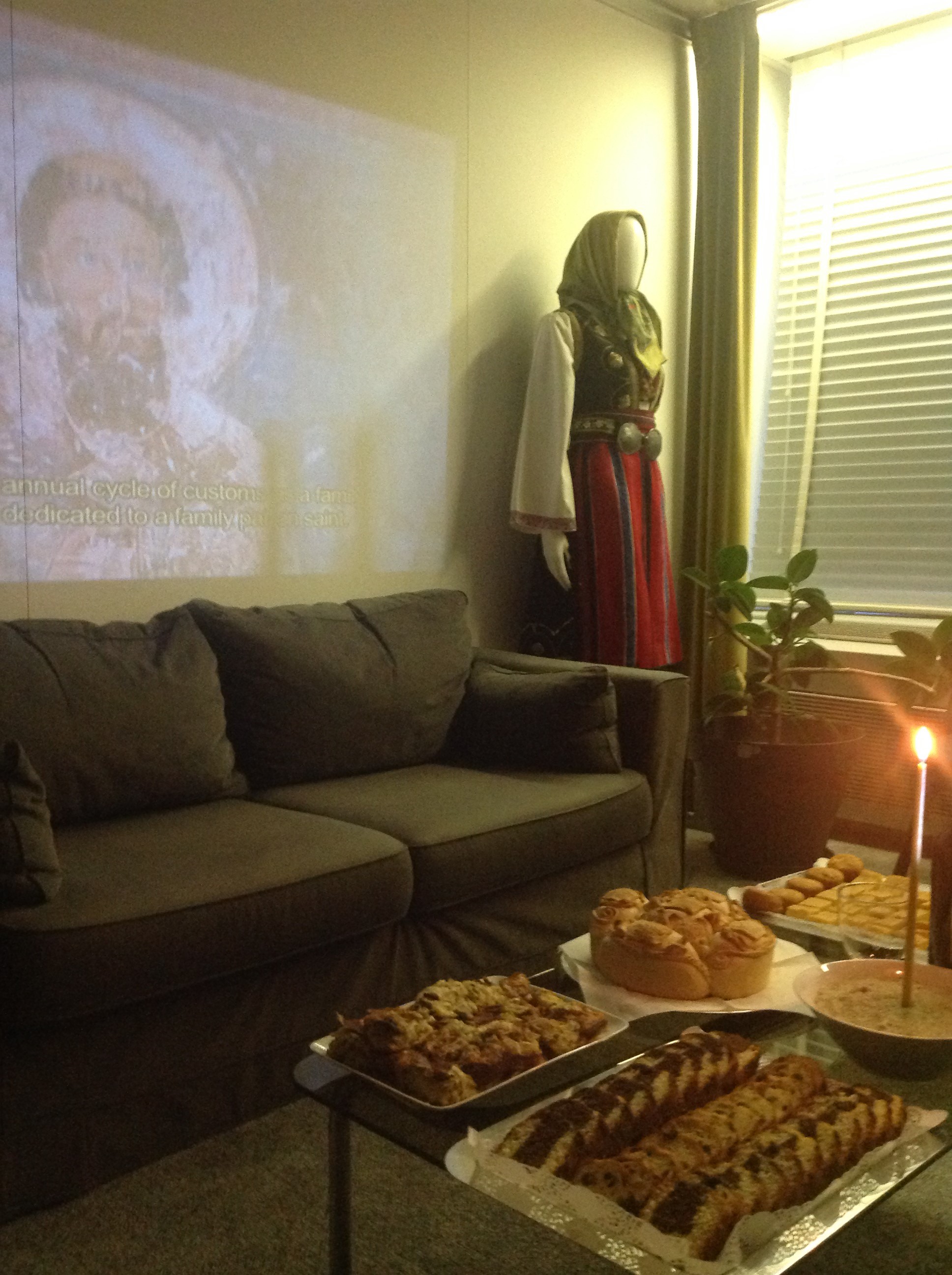 The presentation of “Slava”, inscribed on the List of the Intangible Cultural Heritage of Humanity in 2014, has been held in the premises of the Permanent Delegation of Serbia to Unesco, on 31 January 2019. For this occasion, members of our delegation prepared and presented traditional festive table, as an important element in celebration of the family saint patron’s day. In an interactive debate enabled by the video-link with Ms Danijela Filipovic from the Centre for intangible cultural heritage of Serbia, invitees were able to familiarize themselves with “Slava” as an example of vivid, intangible cultural heritage, which had been internationally recognized by the inscription on the UNESCO’s Representative List. The presentation of “Slava”, inscribed on the List of the Intangible Cultural Heritage of Humanity in 2014, has been held in the premises of the Permanent Delegation of Serbia to Unesco, on 31 January 2019. For this occasion, members of our delegation prepared and presented traditional festive table, as an important element in celebration of the family saint patron’s day. In an interactive debate enabled by the video-link with Ms Danijela Filipovic from the Centre for intangible cultural heritage of Serbia, invitees were able to familiarize themselves with “Slava” as an example of vivid, intangible cultural heritage, which had been internationally recognized by the inscription on the UNESCO’s Representative List. |
|
|
| Permanent Delegation of the Republic of Serbia to UNESCO chairs UNESCO Electoral Group II (Eastern European States) |
|
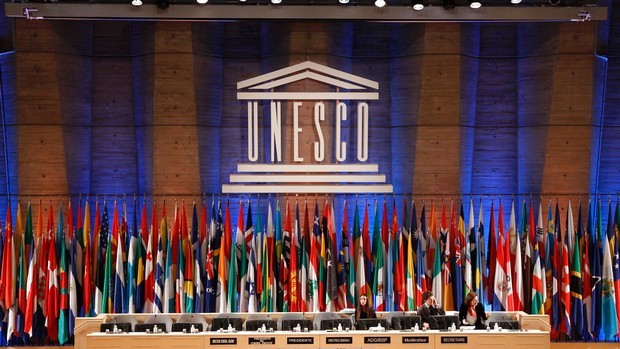 The Permanent Delegation of the Republic of Serbia to UNESCO assumed the Presidency of the UNESCO Electoral Group II (Eastern European States) for the six months period from 1 January until 30 June 2019. Electoral Group II encompasses 25 UNESCO Member States. The Permanent Delegation of the Republic of Serbia to UNESCO assumed the Presidency of the UNESCO Electoral Group II (Eastern European States) for the six months period from 1 January until 30 June 2019. Electoral Group II encompasses 25 UNESCO Member States. |
|
|
| Presentation of the elements inscribed to the UNESCO Representative List of the Intangible Cultural Heritage of Humanity |
|
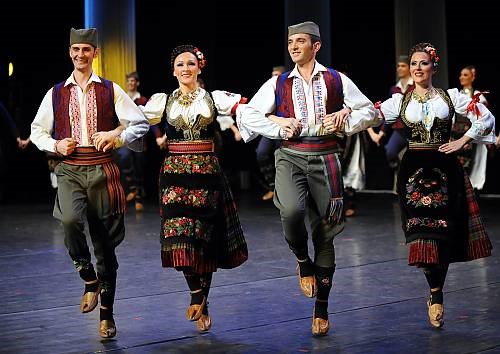 On 13 December 2018, the Permanent Delegation of the Republic of Serbia to UNESCO organized in its premises a presentation of video materials on the elements inscribed by the Republic of Serbia to the UNESCO Representative List of the Intangible Cultural Heritage of Humanity (Slava - celebration of family saint patron’s day, traditional folk dance „Kolo“ as well as singing to the accompaniment of the Gusle). On 13 December 2018, the Permanent Delegation of the Republic of Serbia to UNESCO organized in its premises a presentation of video materials on the elements inscribed by the Republic of Serbia to the UNESCO Representative List of the Intangible Cultural Heritage of Humanity (Slava - celebration of family saint patron’s day, traditional folk dance „Kolo“ as well as singing to the accompaniment of the Gusle). |
|
|
| „Singing to the accompaniment of the Gusle“ inscribed on the UNESCO Representative List of the Intangible Cultural Heritage of Humanity |
|
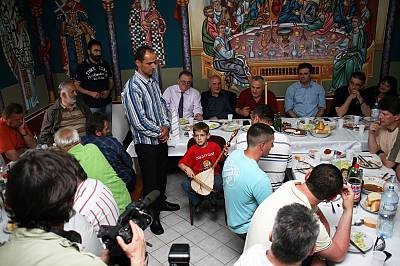 Тhe Intergovernmental Committee for the Safeguarding of the Intangible Cultural Heritage аt its 13th session that takes place in Port Louis, Republic of Mauritius, from 26 November to 1 December 2018, decided to inscribe „Singing to the accompaniment of the Gusle“, nominated by the Republic of Serbia, on the UNESCO Representative List of the Intangible Cultural Heritage of Humanity. Тhe Intergovernmental Committee for the Safeguarding of the Intangible Cultural Heritage аt its 13th session that takes place in Port Louis, Republic of Mauritius, from 26 November to 1 December 2018, decided to inscribe „Singing to the accompaniment of the Gusle“, nominated by the Republic of Serbia, on the UNESCO Representative List of the Intangible Cultural Heritage of Humanity. |
|
|
| Documentary “Serbs on the Corfu – one hundred years since Albanian Golgotha” |
|
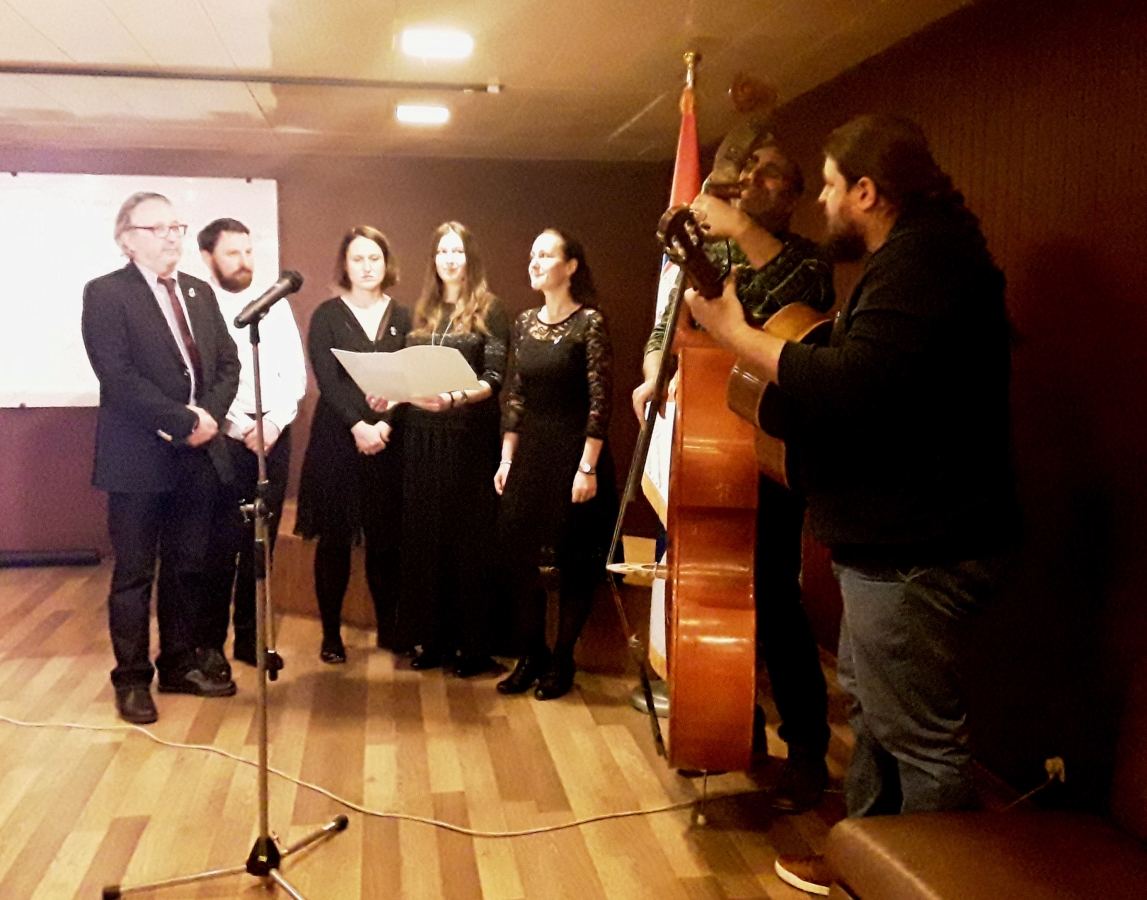 The Permanent Delegation of the Republic of Serbia to UNESCO organized for the representatives of Permanent Delegations and UNESCO staff screening of a documentary “Serbs on the Corfu – one hundred years since Albanian Golgotha” on 22 November 2018. The Permanent Delegation of the Republic of Serbia to UNESCO organized for the representatives of Permanent Delegations and UNESCO staff screening of a documentary “Serbs on the Corfu – one hundred years since Albanian Golgotha” on 22 November 2018. |
|
|
| Participation of the Permanent Delegation of the Republic of Serbia to UNESCO at the 205th Session of the Executive Board |
|
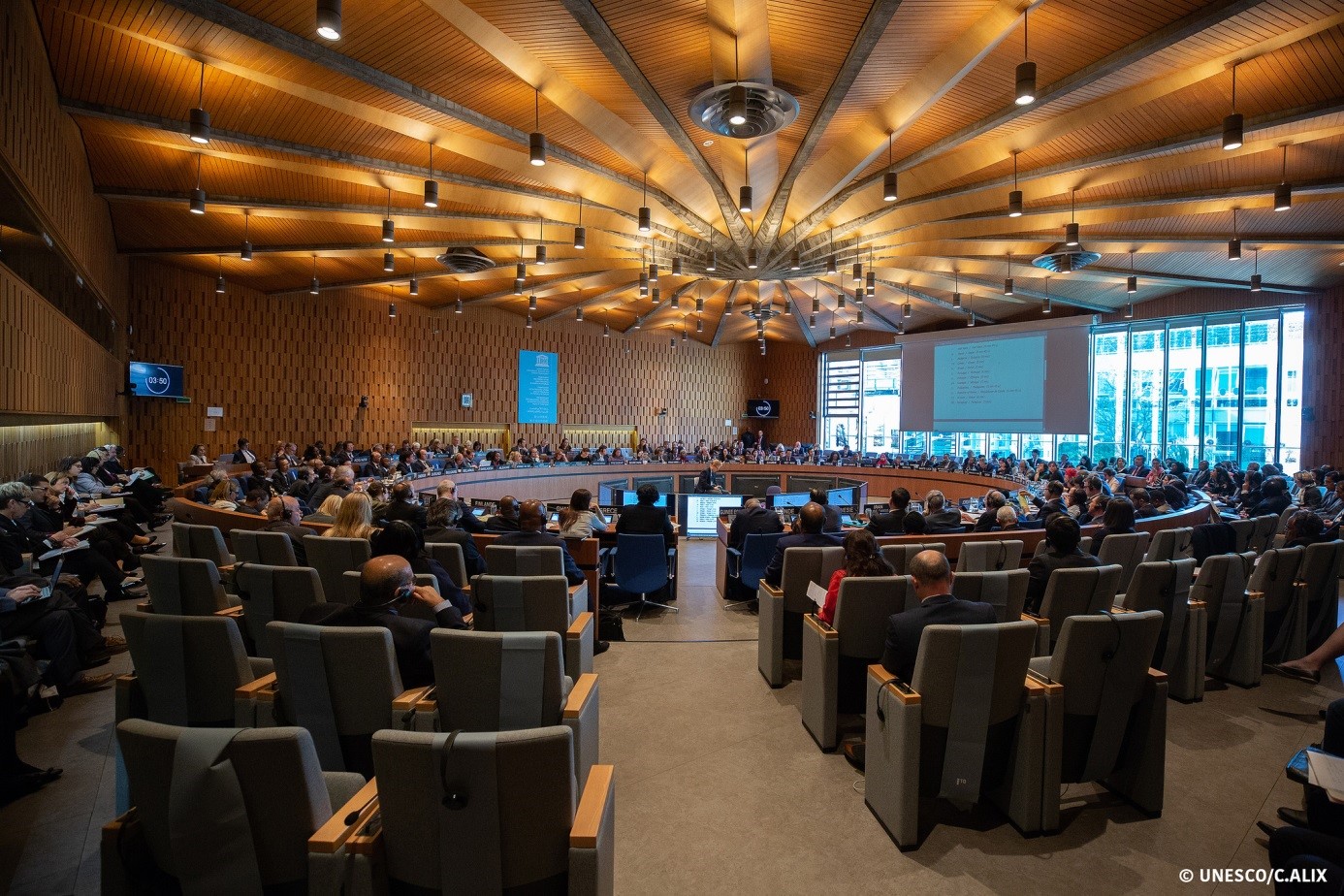 Permanent Delegation of the Republic of Serbia to UNESCO participated at the 205th session of UNESCO Executive Board which took place from 3 until 17 October 2018. The Republic of Serbia is a member of the UNESCO Executive Board in the period from 2015 until 2019. Permanent Delegation of the Republic of Serbia to UNESCO participated at the 205th session of UNESCO Executive Board which took place from 3 until 17 October 2018. The Republic of Serbia is a member of the UNESCO Executive Board in the period from 2015 until 2019.
|
|
|
| Кosovo and Мetohija - Тhe request to become a member of the UNESCO (2015) |
|
Letter of Prime Minister of the Republic of Serbia Mr Aleksandar Vučić to UNESCO Member States - download here.
Official document of the UN Security Council containing the letter of the First Deputy Prime Minister and Minister of Foreign Affairs of the Republic of Serbia Mr Ivica Dačić to the President of the UN Security Council - download here.
Statement of the Ambassador of the Republic of Serbia to the UNESCO Mr. Darko Tanasković in the general debate of the 197th session of the UNESCO Executive Board, 13 October 2015 - download here.
Address by H.E. Mr. Tomislav Nikolic, President of the Republic of Serbia, to the ambassadors accredited in Belgrade following Albania's proposal concerning the admission of so-called Kosovo to UNESCO, Belgrade, 16 October 2015 - download here
Statement of the Ambassador of the Republic of Serbia to UNESCO H. E. Mr. Darko Tanasković on the adoption of the decision regarding the Item 43 at the Plenary Meeting of the 197th session of the UNESCO Executive Board, 21 October 2015 - download here
STATEMENT by the First Deputy Prime Minister and Minister of Foreign Affairs of the Republic of Serbia H.E. Mr. Ivica Dacic in the general debate at the 38th session of the General Conference of UNESCO, Paris, 4 November 2015
Non-paper containing arguments of the Republic of Serbia on "Kosovo's" ineligibility for membership in UNESCO - download here
Extracts from the international documents regarding the destruction of the Serbian cultural heritage in Kosovo and Metohija - download here.
International documents on the situation of Serbian cultural heritage in Kosovo and Metohija - download here.
MAP of Serbian Cultural and Religious Heritage in the Province of Kosovo and Metohija
Please check the detailed map of Serbian Cultural and Religious Heritage in the southern Province of Kosovo and Metohija, with 1,996 monuments and sites (churches, monasteries, graveyards, fortified cities, citadels, castles, chapels, mausoleums) registered throughout the territory.
The map contains the non-exhaustive list of 1,181 churches and church lands, 115 monasteries and monastic lands, 48 hermitages, 8 chapels and mausoleums, 534 old cemeteries, 96 fortresses and old fortified cities and 14 castles, many of which were named cultural monuments of high and exceptional importance for the state of Serbia.
It also provides the list of more than 100 religious sites, dated from X century, which were damaged or demolished since 1999, and also all cultural monuments which were destroyed and looted since 2004 until today.
To remind, since June 1999, after the end of the armed conflict, 236 churches, monasteries and other objects owned by the Serbian Orthodox Church were targets of attacks; 174 religious sites, 33 cultural and historic monuments, some of which of exceptional importance, were demolished; more than 10,000 icons, ecclesiastical, art and liturgical items, were stolen; 5,261 tombs at 256 orthodox cemeteries were demolished or damaged while more than 50 of those have not a single headstone standing.
Four gems of this Serbian heritage - Decani Monastery, Patriarchate of Pec, Gracanica and the Church of Virgin Ljeviska – are inscribed on the UNESCO World Heritage in Danger List.
.jpg)
Film about destruction of Serbian cultural heritage in Kosovo and Metohija - watch here
Four pearls of world heritage: the Monastery of Decani, Patriarchate of Peć, Gracanica and Bogorodica Ljeviska Church are still inscribed on the UNESCO List of the world heritage in danger. The ones requesting UNESCO membership today are the ones who exposed it to danger. Not even today can we hear the words of condemnation of such crimes, or detect readiness to find and punish the perpetrators. - watch here
Photos about destruction of Serbian cultural heritage in Kosovo and Metohija are available here. |
|
|
|
|
|